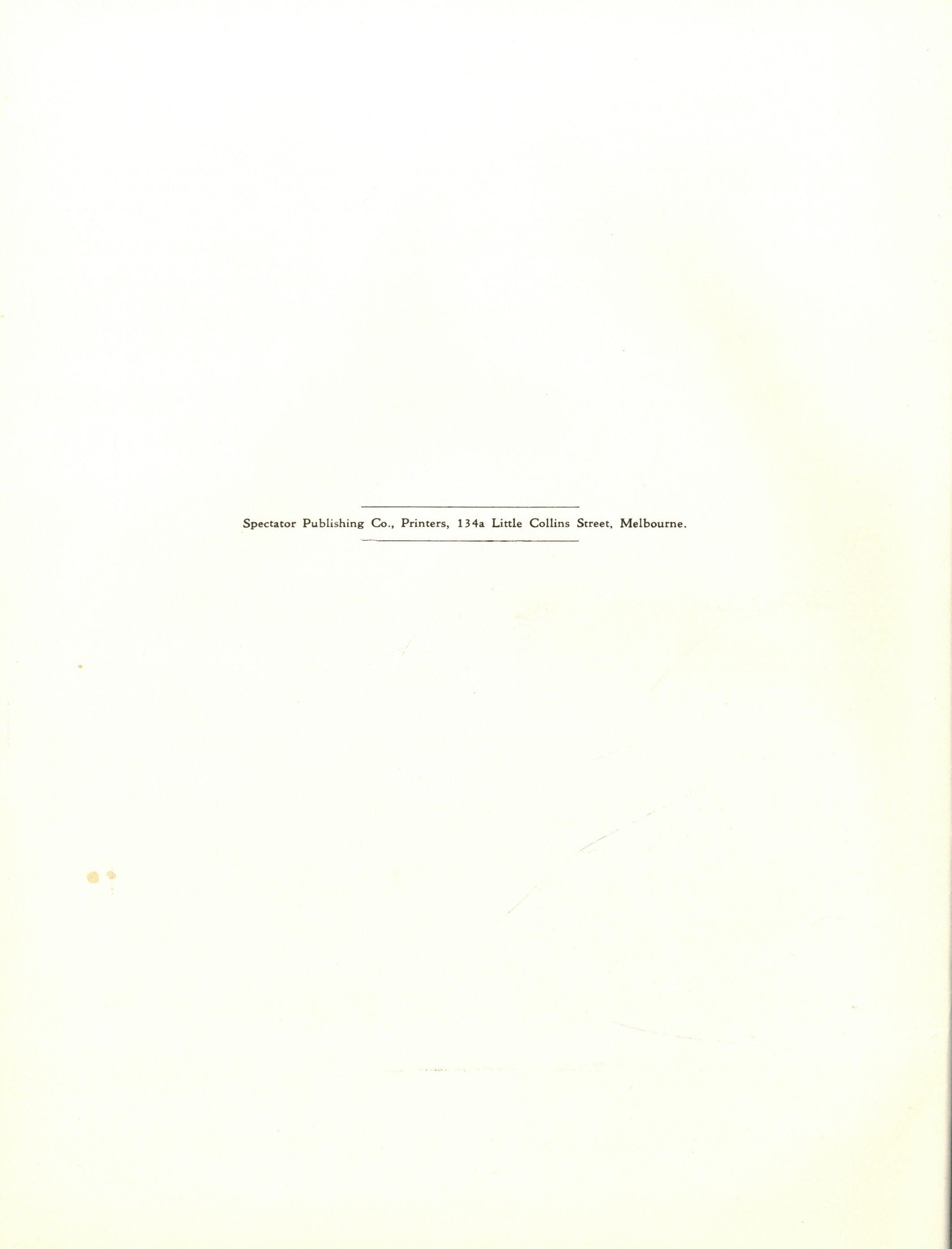Silver and Green
with which is incorporated THE OLD COLLEGIAN HAWTHORN June, 1958

Magazine


Magazine
®tf e Jftagazm e o f % JHctJjnbis t Rabies ' Qlolkge , ^afotljort t

Editor:
Sub-Editors: RHYL L CLARK, GILLIA N LENNOX
In life it is essential that we "belong," that we be members of a particular body. The wearing of uniform while we are at school serves to show that there is something that binds us together The uniform outwardly shows we belong to one body: we work and serve with one accord An d yet we have our individual personalities. God has given us individuality; we can offer our opinions and use our various talents
Together we blend into one body, as the various instruments in an orchestra blend into one euphonious voice
The whole purpose of life is "to love and serve." By being part of a unified body we forget our own particular problems we show love towards fellow beings, we desire to make their lives easier, and if this maxim of life is adhered to, we are serving our Lord above
Our oneness with what we believe in is carried into the community The grey uniform is not there, but the ideals are: those high stan dards of love and service taught since earliest youth, which must surely mould us into useful citizens.
In present days of international friction and nuclear tests, there is the need for people to stand fast When the people of the world unite with a common aim and purpose, that of universal peace and happiness, then, and only then, will fear, distrust and war be stamped out Colour barriers, too, such as seen in the tragic apartheid system of South Africa, and the hostility towards the American negroes, can only be destroyed when Christ's teaching of the equality of all men in the sight of God is accepted.
"I n unity there is strength."
Each of us contributes her talents, ideas and personalities to the whole Submerge ourselves in duty to the other person, and God will give us grace to accomplish our own work. But it is important we realise we are separate entities forming integral parts of that whole.
How beautiful are the words in the Book of Common Prayer: "Whose service is perfect freedom."
If we always remember these words, then we may achieve the greatest happiness from life
-—Joan Pilkington.
JOA N PILKINGTON Committee: Miss M BETTS, Miss L MITCHELL , Miss C GREENWOOD , Miss C PATERSON '(Exam Results School Officers), PAMEL A CORNELL, DOROTH Y D A VIES LESLEY DUNN , ROSALIE HOLT MARGARE T LANCASTER, PENELOPE MORRIS, SONI A REIDY, PA M TER NOUTH , AN N TOMLINSON , MARGARE T DUNKIN , LYNETT E HODGSON , DIAN E KERR, ELAINE McCONKEY , WEND Y McGILL, ROSSLYN WORTLEY .of work she had time to help others She did all this cheerfully, without a thought of it being unusual, and not desiring a word of recognition Junior School speech day and concerts, functions at the Elsternwick School (here her sister, Miss Mary Horsman, was a devoted teacher.), afternoon teas in the dining hall on Parents' Days—there was never an event at M.L.C but Miss Nora Horsman would be found giving quiet and efficient assistance
Miss Horsman was indeed one of the most remarkable women any of us at M.L.C has known Judged by any intellectual or spiritual standard, she was outstanding
Confronted with the tragedy of her sudden death, we thank God for such a life as hers, and we assert the triumph of Christian faith, hope and love even in the face of this temporary separation—-the triumph of Christ Himself and of eternal life found in Him
Her home life in England and her church life in the Church of England nourished her calm, strong faith and her practical piety. She was educated first at Reading School, of which she spoke affectionately as being undistinguished, but it must have been a remarkable school to have developed her sound learning At London Uni versity she pursued her studies in the classical tradition Her scholarship and her devoted char acter showed the true standards of English education and English religion
For 31 years Miss Horsman taught in Australian schools, for 21 years in our school. She was, as we all knew, a most capable teacher She taught with easy confidence, with the mastery of her subjects Four times her girls won the Greek and Roman Exhibition at the Matriculation exam ination, and it was pathetic but fitting that the last was won in December—the news not being known until after she was killed There was a remarkable range in her teaching subjects— English, Latin, History, Economics, Mathematics Her knowledge of individual pupils and her personal interest in them all were the secret of her success and the strongest reason for their gratitude Her control, her discipline never faltered As a teacher she had the respect of her classes because she knew her subject thoroughly and she knew her pupils personally
Superlative terms are not exaggerated when speaking of Miss Horsman's ability and influence Perhaps what amazed us always was her readi ness to give extra time to others How many girls recall the additional time she cheerfully gave out of class to personal tuition One thinks of the extra tasks she undertook-—in the school book room for a whole week every year before the opening of school; in writing mark schedules and lists for other members of staff. All she did was so well regulated, so systematically arranged, so accurately and punctually prepared, that after doing her own very full programme
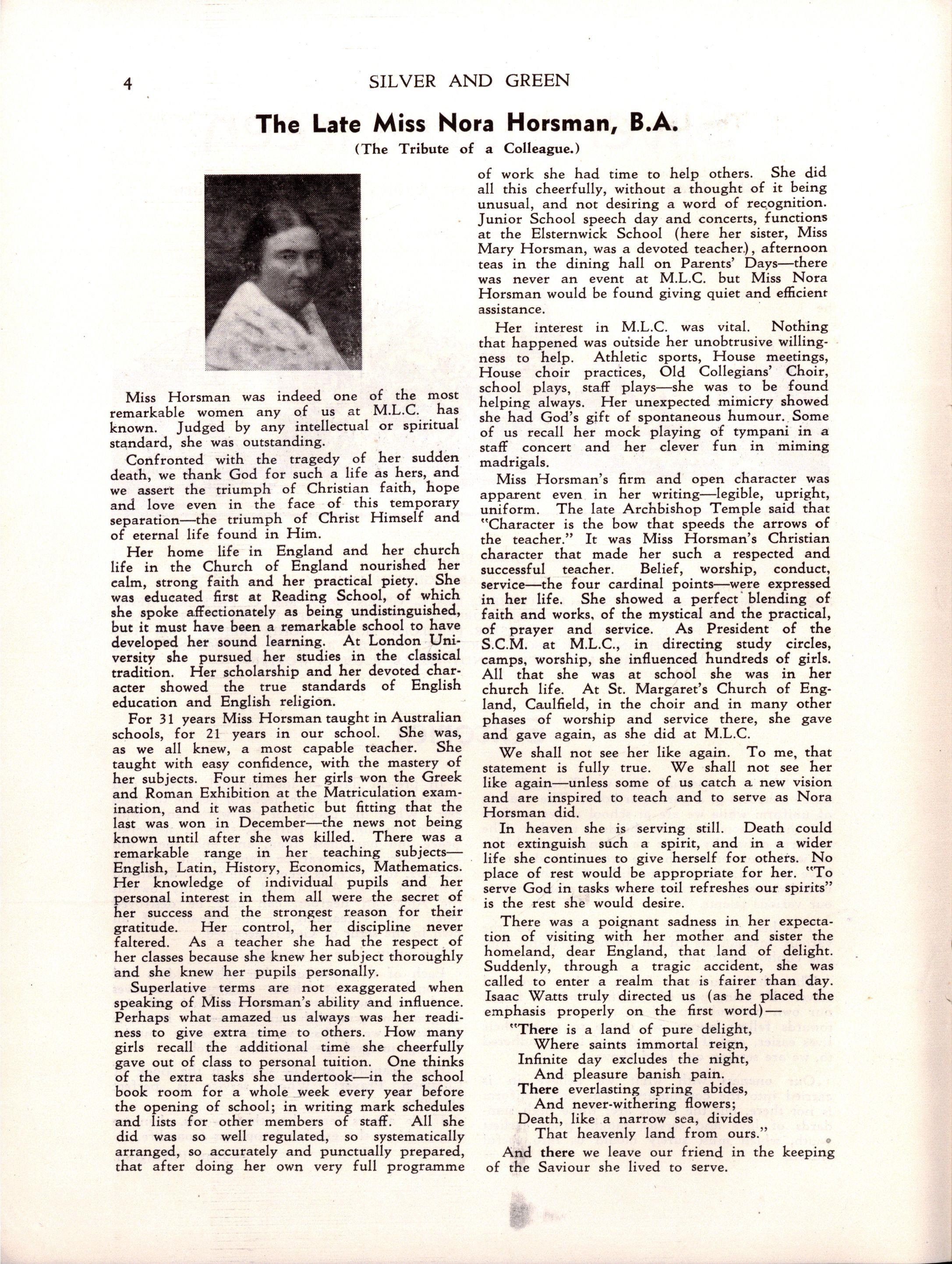
Her interest in M.L.C was vital Nothing that happened was outside her unobtrusive willing ness to help Athletic sports, House meetings, House choir practices, Old Collegians' Choir, school plays, staff plays—she was to be found helping always Her unexpected mimicry showed she had God's gift of spontaneous humour Some of us recall her mock playing of tympani in a staff concert and her clever fun in miming madrigals
Miss Horsman's firm and open character was apparent even in her writing—legible, upright, uniform The late Archbishop Temple said that "Character is the bow that speeds the arrows of the teacher." It was Miss Horsman's Christian character that made her such a respected and successful teacher Belief, worship, conduct, service—the four cardinal points—-were expressed in her life She showed a perfect blending of faith and works, of the mystical and the practical, of prayer and service As President of the S.C.M at M.L.C., in directing study circles, camps, worship, she influenced hundreds of girls All that she was at school she was in her church life. At St. Margaret's Church of Eng land, Caulfield, in the choir and in many other phases of worship and service there, she gave and gave again, as she did at M.L.C
W e shall not see her like again. T o me, that statement is fully true W e shall not see her like again—unless some of us catch a new vision and are inspired to teach and to serve as Nora Horsman did
In heaven she is serving still. Death could not extinguish such a spirit, and in a wider life she continues to give herself for others N o place of rest would be appropriate for her "T o serve God in tasks where toil refreshes our spirits" is the rest she would desire.
There was a poignant sadness in her expecta tion of visiting with her mother and sister the homeland, dear England, that land of delight Suddenly, through a tragic accident, she was called to enter a realm that is fairer than day. Isaac Watts truly directed us (as he placed the emphasis properly on the first word) — "There is a land of pure delight, Where saints immortal reign, Infinite day excludes the night, An d pleasure banish pain There everlasting spring abides, An d never-withering flowers; Death, like a narrow sea, divides That heavenly land from ours."
And there we leave our friend in the keeping of the Saviour she lived to serve
On 30th June, 1958, a former Headmaster of M.L.C., Mr P R Le Couteur, died in New South Wales. Mr. Le Couteur is remembered with grati tude and affection by Old Collegians of the period 1918-28. Throughout the long Principalship of Dr Fitchett M.L.C had Headmasters also, and, following the death of Mr. Otto Krome in 1917, Mr Le Couteur was appointed Headmaster
Mr Le Couteur was an outstanding student at the University of Melbourne, and was chosen Rhodes Scholar in 1908. He continued his studies, particularly in Philosophy, at Oxford and at the University of Bonn, Germany He was a noted cricketer, and played in England for the Players versus the Gentlemen, a traditional English match, and afterwards for Victoria in Sheffield Shield matches While at M.L.C he encouraged tennis coaching and stimulated all branches of sport
The School has been very pleased to welcome these new members of Staff:—
Miss L Bamford (Old Collegian), returned from travels overseas
Miss L Howie, B.A., returned from travels overseas
Mr. H. J. Fearn-Wannan, B.Sc., Dip.Ed., Chemis try, General Science
Miss U M Gottschalk, B.A (Hons.), from England, Senior German Mistress
Miss F Parsons, B.A (Hons.), History, English
Miss R. Brauns, B.A., French, History.
Mrs M Brownbill, B.A., Dip.Ed., English, His tory, Geography
Miss A Forbes, B.A., Dip.Ed., Lower Middle School
Miss L. Leya, French.
Mrs B Lister, General Science, English
Miss Y Ryail, from England, Lower Middle School
Mrs J E Segal, Lower Middle School
Miss B. Scarlett, Mus.Bac. (Old Collegian), Musi cal Appreciation, Class Singing
Miss U Steel, Junior School
Miss A Crawford, Sportsmistress
Miss M. Holt, Sportsmistress.
Miss Sonia Manning (Old Collegian), Sports mistress
Miss Marion Hall (Old Collegian), Studio
Miss M Hann (Old Collegian), Middle School and Laboratory Assistant.
Miss D Jeffrey, Laboratory Assistant
Mrs S Tanner, Geography, Mathematics
Miss A Hull (Old Collegian), English, History
Miss H Hamilton, Sportsmistress
Miss G. Lang, Class Singing.
Miss M Leahy, Mus.Bac., Pianoforte
Miss P Dixson (Old Collegian), Pianoforte
Miss P Elliott (Old Collegian), Orchestra and Violin
Miss G. White (Resident).
Sister A Davidson (Resident Nurse)
In the eleven years Mr. Le Couteur was at M.L.C he directed the academic life of the School with sympathy and administrative ability. The M.L.C results at University entrance examina tions during that period showed his influence A Christian gentleman in every respect, he was unfail ingly courteous and thoughtful towards staff and girls
At the end of 1928 Mr Le Couteur became Headmaster of the Hale School, Perth, and in 1931 Headmaster of Newington College, Sydney, where he remained until his retirement in 1948.' His wife was a daughter of the Rev. Dr. E. H . Sugden, Master of Queen's College, University of Melbourne
M.L.C joins with the Methodist Church and other schools with which Mr Le Couteur was connected in honouring his memory and in offer ing deep sympathy to the members of his family
The School regretted to say farewell to the following members of Staff in December, 1957:
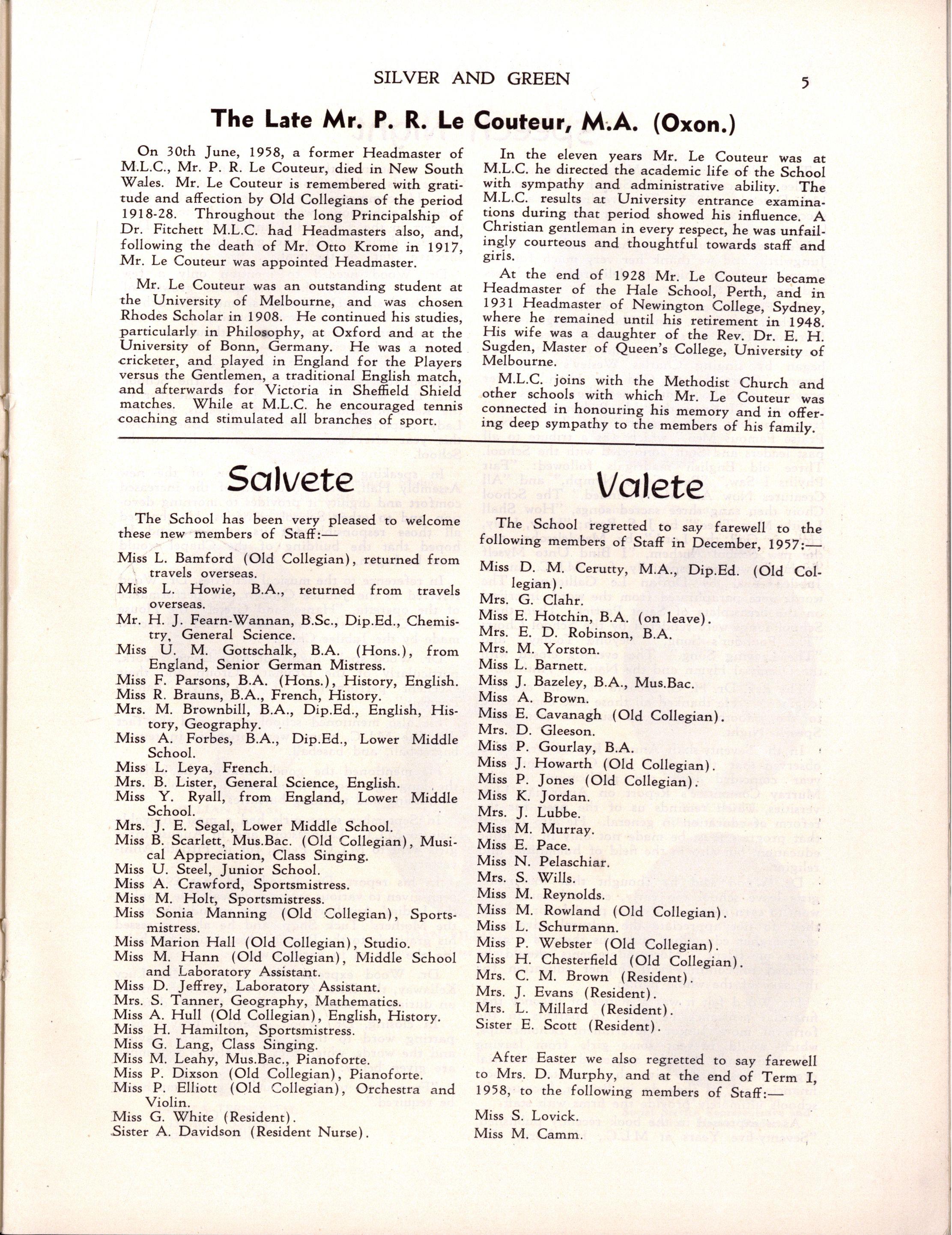
Miss D M Cerutty, M.A., Dip.Ed (Old Col legian) Mrs G Clahr
Miss E Hotchin, B.A (on leave) Mrs. E. D. Robinson, B.A. Mrs M Yorston Miss L Barnett Miss J. Bazeley, B.A., Mus.Bac. Miss A Brown Miss E Cavanagh (Old Collegian) Mrs D Gleeson Miss P. Gourlay, B.A. Miss J Howarth (Old Collegian) Miss P Jones (Old Collegian) Miss K Jordan Mrs. J. Lubbe. Miss M Murray Miss E Pace Miss N. Pelaschiar. Mrs. S. Wills. Miss M Reynolds Miss M Rowland (Old Collegian) Miss L Schurmann Miss P Webster (Old Collegian) Miss H. Chesterfield (Old Collegian). Mrs C M Brown (Resident) Mrs J Evans (Resident) Mrs L Millard (Resident) Sister E. Scott (Resident).
After Easter we also regretted to say farewell to Mrs D Murphy, and at the end of Term I 1958, to the following members of Staff:—
Miss S Lovick Miss M Camm
The celebrations of M.L.C.'s seventy-fifth Jubilee Year culminated in Speech Night on the 13th December, 1957 The evening was a great success, and will remain in our memories for a long time
W e were fortunate to have with us Lady Jungwirth, and we thank her very much for the charming way in which she delivered the address and presented the prizes
Miss Flockart, our indefatigable Music Director, with the help of Mr Lance Hardy as organist and Meredith Day as school pianist, directed the musical part of the programme excellently W e began by singing Charles Wesley's wonderful hymn, "Glory be to God on High." After prayers, the School entertained the parents with two songs: " I Know that My Redeemer Liveth," from Handel's "The Messiah," and "Let Us Now Praise Famous Men," which was a tribute to all past leaders and Staff connected with the School Three old English madrigals followed: "Fair Phyllis I Saw," "Rest, Sweet Nymph," and "All Creatures Now Are Merry-minded." The School Choir then sang three sacred songs, "How Shall I Fitly Meet Thee?" by J S Bach; "Holy, Holy, Holy is God the Lord," by Mendelssohn, and the new School Anthem, " I Bind Unto Myself To-day," written especially for M.L.C in its Jubilee Year by Dorian Le Gallienne The words were paraphrased from the words inscribed on the breastplate of Saint Patrick Then three School songs were rendered by the School Choir: "Th e Founder's Song," "Beyond To-day," and "Th e Leaving Song." The evening closed with the Dismissal Hymn and the National Anthem.
The Rev Dr H G Secomb made the acknow ledgments He thanked all those who contributed to the smooth running of such a memorable Speech Night
In the Seventy-sixth Annual Report Dr Woo d observed that the end of M.L.C.'s seventy-sixth year coincided with the publication of the Murray Committee's Report on Australian Uni versities, which reminds us of the need for the reform of education in general He also stressed that progress must be made not only in scientific education, but also in the field of humanities and religion
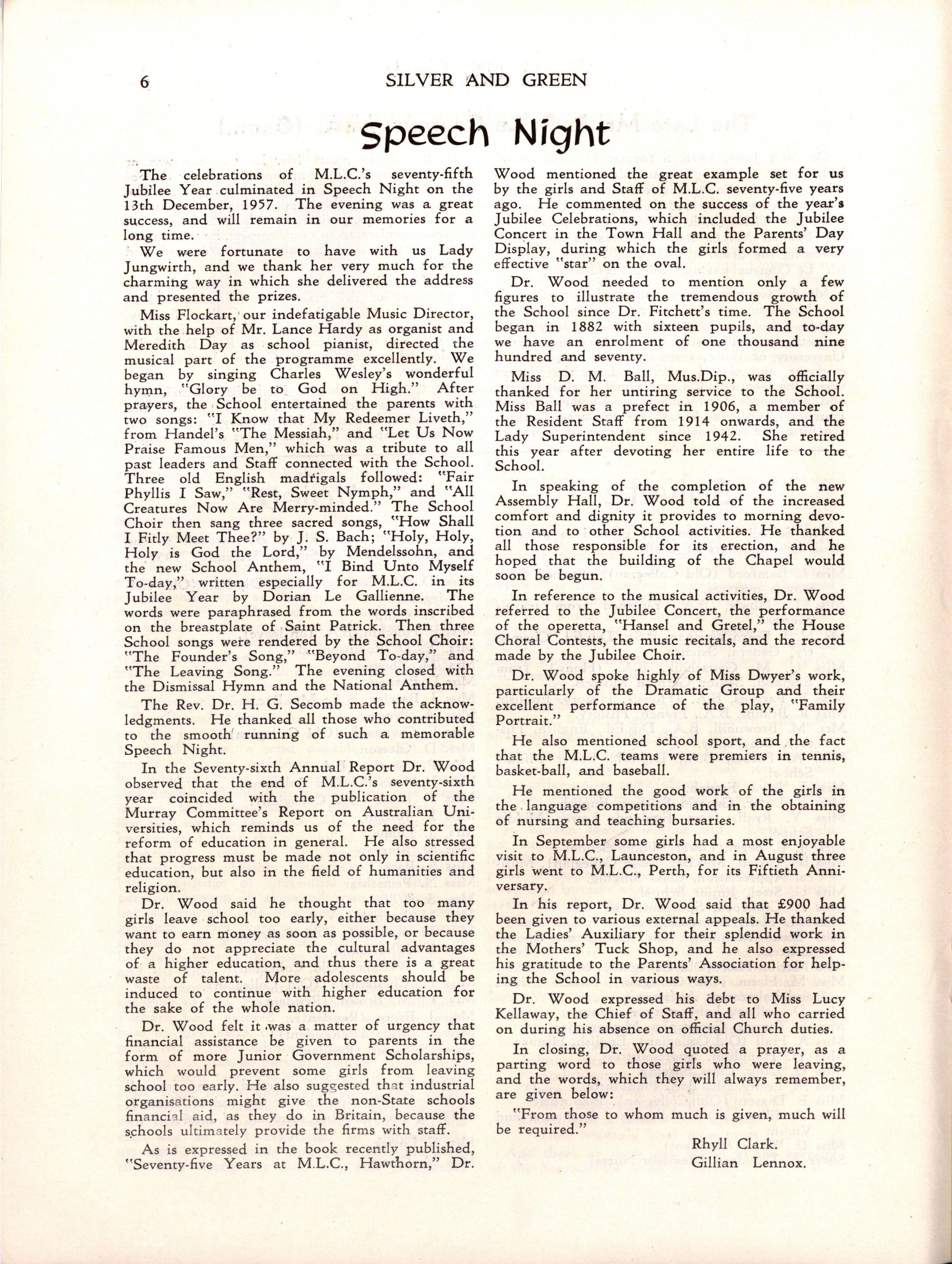
Dr Woo d said he thought that too many girls leave school too early, either because they want to earn money as soon as possible, or because they do not appreciate the cultural advantages of a higher education, and thus there is a great waste of talent More adolescents should be induced to continue with higher education for the sake of the whole nation
Dr Woo d felt it .was a matter of urgency that financial assistance be given to parents in the form of more Junior Government Scholarships, which would prevent some girls from leaving school too early He also suggested that industrial organisations might give the non-State schools financial aid, as they do in Britain, because the schools ultimately provide the firms with staff
As is expressed in the book recently published, "Seventy-five Years at M.L.C., Hawthorn," Dr.
Woo d mentioned the great example set for us by the girls and Staff of M.L.C. seventy-five years ago He commented on the success of the year's Jubilee Celebrations, which included the Jubilee Concert in the Town Hall and the Parents' Day Display, during which the girls formed a very effective "star" on the oval.
Dr Woo d needed to mention only a few figures to illustrate the tremendous growth of the School since Dr Fitchett's time The School began in 1882 with sixteen pupils, and to-day we have an enrolment of one thousand nine hundred and seventy
Miss D M Ball, Mus.Dip., was officially thanked for her untiring service to the School Miss Ball was a prefect in 1906, a member of the Resident Staff from 1914 onwards, and the Lady Superintendent since 1942. She retired this year after devoting her entire life to the School
In speaking of the completion of the new Assembly Hall, Dr. Woo d told of the increased comfort and dignity it provides to morning devo tion and to other School activities H e thanked all those responsible for its erection, and he hoped that the building of the Chapel would soon be begun
In reference to the musical activities, Dr Woo d referred to the Jubilee Concert, the performance of the operetta, "Hansel and Gretel," the House Choral Contests, the music recitals, and the record made by the Jubilee Choir.
Dr Woo d spoke highly of Miss Dwyer's work, particularly of the Dramatic Group and their excellent performance of the play, "Family Portrait."
He also mentioned school sport, and the fact that the M.L.C teams were premiers in tennis, basket-ball, and baseball
He mentioned the good work of the girls in the language competitions and in the obtaining of nursing and teaching bursaries
In September some girls had a most enjoyable visit to M.L.C., Launceston, and in August three girls went to M.L.C., Perth, for its Fiftieth Anni versary.
In his report, Dr. Woo d said that £900 had been given to various external appeals He thanked the Ladies' Auxiliary for their splendid work in the Mothers' Tuck Shop, and he also expressed his gratitude to the Parents' Association for help ing the School in various ways
Dr Woo d expressed his debt to Miss Lucy Kellaway, the Chief of Staff, and all who carried on during his absence on official Church duties.
In closing, Dr Woo d quoted a prayer, as a parting word to those girls who were leaving, and the words, which they will always remember, are given below:
"From those to whom much is given, much will be required."
Rhyll Clark Gillian Lennox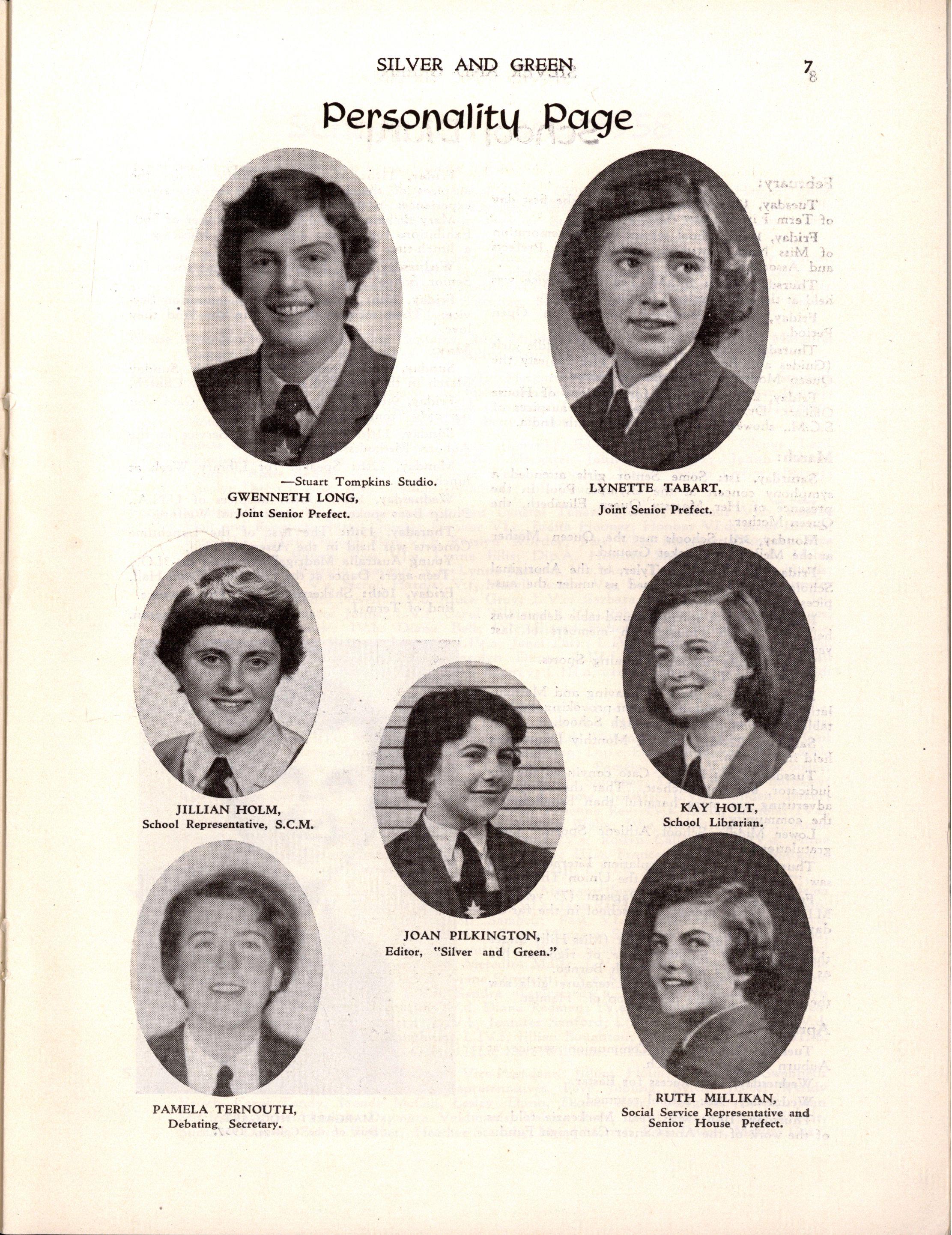
Tuesday, 12th: W e assembled for the first day of Term I in our new Assembly Hall
Friday, 14th: School service in commemoration of Miss Nora Horsman Induction of Prefects and Associate Prefects
Thursday, 20th: S.C.M Tea and service was held at the Presbyterian Church, Hawthorn Friday, 21st: Combined Societies in Open Period
Thursday, 27th: A party of Lower Middle girls (Guides and Brownies) greeted Her Majesty the Queen Mother at Government House Friday, 28th: Meetings for elections of House Officers Dr Horace Thomas, under auspices of S.C.M., showed colour slides of South India
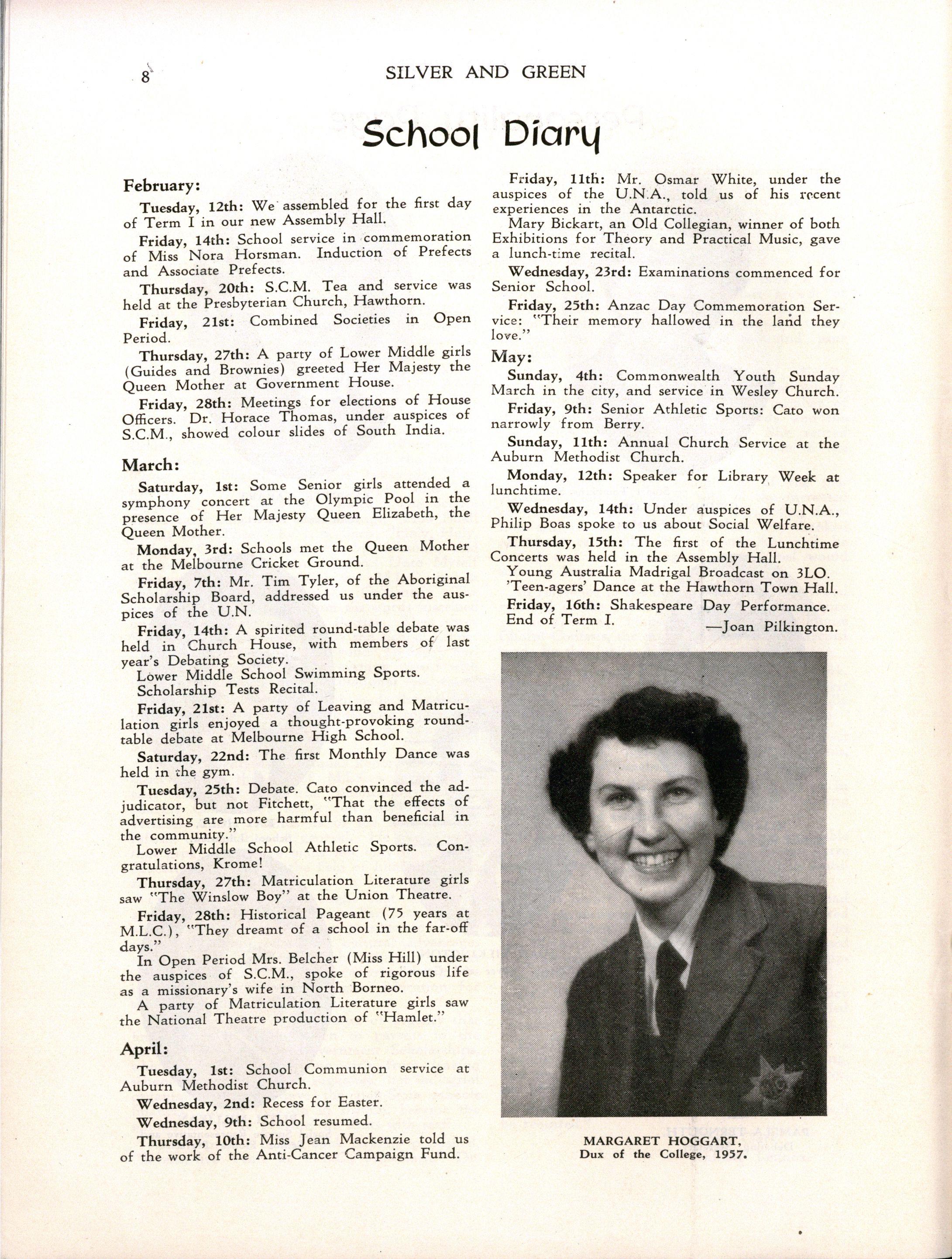
Saturday, 1st: Some Senior girls attended a symphony concert at the Olympic Pool in the presence of Her Majesty Queen Elizabeth, the Queen Mother
Monday, 3rd: Schools met the Queen Mother at the Melbourne Cricket Ground Friday, 7th: Mr Tim Tyler, of the Aboriginal Scholarship Board, addressed us under the aus pices of the U.N Friday, 14th: A spirited round-table debate was held in Church House, with members of last year's Debating Society
Lower Middle School Swimming Sports Scholarship Tests Recital
Friday, 21st: A party of Leaving and Matricu lation girls enjoyed a thought-provoking round table debate at Melbourne High School.
Saturday, 22nd: The first Monthly Dance was held in the gym.
Tuesday, 25th: Debate Cato convinced the ad judicator, but not Fitchett, "That the effects of advertising are more harmful than beneficial in the community."
Lower Middle School Athletic Sports Con gratulations, Krome!
Thursday, 27th: Matriculation Literature girls saw "The Winslow Boy" at the Union Theatre
Friday, 28th: Historical Pageant (75 years at M.L.C.), "They dreamt of a school in the far-off days."
In Open Period Mrs Belcher (Miss Hill) under the auspices of S.C.M., spoke of rigorous life as a missionary's wife in North Borneo.
A party of Matriculation Literature girls saw the National Theatre production of "Hamlet."
Tuesday, 1st: School Communion service at Auburn Methodist Church.
Wednesday, 2nd: Recess for Easter Wednesday, 9th: School resumed.
Thursday, 10th: Miss Jean Mackenzie told us of the work of the Anti-Cancer Campaign Fund
Friday, 11th: Mr Osmar White, under the auspices of the U. N A., told us of his recent experiences in the Antarctic.
Mary Bickart, an Old Collegian, winner of both Exhibitions for Theory and Practical Music, gave a lunch-time recital Wednesday, 23rd: Examinations commenced for Senior School
Friday, 25th: Anzac Day Commemoration Ser vice: "Their memory hallowed in the land they lore."
Sunday, 4th: Commonwealth Youth Sunday March in the city, and service in Wesley Church
Friday, 9th: Senior Athletic Sports: Cato won narrowly from Berry Sunday, 11th: Annual Church Service at the Auburn Methodist Church Monday, 12th: Speaker for Library Week at lunchtime.
Wednesday, 14th: Under auspices of U.N.A., Philip Boas spoke to us about Social Welfare Thursday, 15th: The first of the Lunchtime Concerts was held in the Assembly Hall Young Australia Madrigal Broadcast on 3LO 'Teen-agers' Dance at the Hawthorn Town Hall Friday, 16th: Shakespeare Day Performance End of Term I. __ Joa n p ilkingto n
Joint Senior Prefects: Gwenneth Long, Lynette Tabart
Prefects: Anne Ballantyne, Rosemary Benjamin, Rhyll Clark, Gillian Davies, Margaret Hagger, Edith Hatt, Jillian Holm, Kay Holt, Margaret Lancaster, Gillian Lennox, Janet Mclvor, Ruth Milli kan, Joan Pilkington, Elizabeth Sampson, Heather Stainsby, Pamela Ternouth, An n Tom linson ' J
Associate Prefects: Rosalie Holt, Rosemary Jams (Joint Senior Associate Prefects), Joy Carter, Amelda Craigie, Elizabeth Druitt, Lesley Dunn, Margaret Fitzgerald, Judith Frederick, Lucy Gil liam, Denise Jones, Jill Kennedy, Glenys Lord, Lois Lyndon, Elizabeth McLeod, Penelope Morris, Janice Orton, Pamela Riessen, Robin Sheather, Margaret Stevens, Allison Tudor, Judith Tweddle, Susan Webber, Robin Wilson

House (Boarders') Prefects and Wing Captains: Ruth Millikan (Senior), Anne Ballantyne, Margaret Hagger, Lois Lyndon, Robin Sheather, Pauline Benjamin, Beverley Clarke, Elaine Lade.
House Captains—Senior: Anne Ballantyne (Berry) ; Margaret Hagger (Cato) ; Heather Stainsby (Fitchett); Denise Jones (Krome) Middle: Dawn Jelbart (Berry); Merryn Gardner (Cato); Margaret Johns (Fitchett); Cynthia Cook (Krome) Junior: Tiina Randmae (Berry); Valerie Monk (Cato); Judith Tyquin (Fitchett); Betty Bristow (Krome)
House Sports Captains—Senior: Margaret Stevens (Berry);! Edith Hal;t (Cato); Glenys Lord (Fitchett); Jan Taylor (Krome) Middle: Margaret Johnson (Berry); Judith Abbott (Cato); Anne Bowyer (Fitchett); Gillian Weeks (Krome) Junior: Susan Leffler (Berry); Carolyn Dunn (Cato); Elwyn Balmer (Fittchett) ; Jill Coulson (Krome)
Form Captains: Honour VI.a, Gwenneth Long and Lynette Tabart (Joint) ; Honour VI.b, Rosalie Holt and Rosemary Jame (Joint) ; Honour VI.c, Judith Hooper; Honour Vl.d , Ailsa Brown; Pass VI.a, Judith Doolan; Pass VI.b, Rosslyn Wortley; Pass VI.c, Margaret Dunkin; Pass Vl.d, Miriam Bilney; Pass VI.e, Lynne Ellis; Dip.A, Heather Stainsby; Dip B, Helen Cother; Dip.C, Patricia Stevens; V.a, Lynne Jackson, V.b, Anne Turnbull; V.c, Kay Hobbs; V.d, Peggy Day; V.e, Neroli Hardie; V.f , Macyll Gaunt; V.g, Sandra Nelson; V.h, Jennifer Cowen; L.V.a, Sandra Powell; L.V.b, Anne Gray; L.V.c, Barbara Pollard; L.V.d, Dawn Jel bart; L.V.e, Margaret Johns; L.V.f, Carol Williams; L.V.g, Robyn Muir; L.V.h, Susan Mues; IV.a, Beris Turnley; IV.b, Diana Bell; IV.c, Elayne Fisher; IV.d, Christine Fyfe; IV.e, Helen Brian; IV.f, Patricia Hooper; LlV.a, Janet Dick; L.IV.b, Claire Esler; L.IV.c, Tina Randmae; L.IV.d, Jillian Hill; L.IV.e, Carolyn Dunn; L.IV.f, Lynette Curtis; Ill.a, Gail Clayton; Ill.b, Ingrid Barbour; III.c, An n Murray; L.III.a, Leonie Carruthers; L.III.b, Trudi Kenealy
Social Service Captains: Honour VI.a, Ruth Millikan; Honour VI.b, Pamela Riessen; Honour VI.c, Margaret Jenkin; Honour Vl.d, Dorothy Davies; Pass VI.a, Helen Rossiter; Pass VI.b, Mar garet Moon ; Pass VI.c, Margaret Phillipson; Pass Vl.d, Vivienne Baker; Pass VI.e, Gail Taylor; Dip.a, Doreen Diprose; Dip.b, Barbara Morrison; Dip c, Elizabeth Grover; V.a, Carole Kierson; V.b, Wendy Davenport; V.c, Sue Canham; V.d, Pamela Jones; V.e, Kay Fookes; V.f, Isobel Humphries; V.g, Dawn Johnson; V.h, Vicki Smorgon; L.V.a, Patricia Barnsley; L.V.b, Joan Bennett; L.V.c, Elida Brereton; L.V.d, June Jelbart; L.V.e, Linden Baker; L.V.f, Lynette Wright; L.V.g, An n Baines; L.V.h, Vivienne Rea; IV.a, Lulita Lamble; IV.b, Margaret Godson; IV.c, Elizabeth James; IV.d, Elspeth Wylie; IV.e, Judith Lee; IV.f, Anne Kerville; L.IV.a, Kaye Tully; L.IV.B, Judith Little; L.IV.c, Roslyn Callander; L.IV.d, Anne Mitchell; L.IV.e, Dianne Barnett; L.IV.f, Betty Bristow; III.a, Frances BIyth; Ill.b, Margaret Ricketson; III.c, Shane Turnley; L.III.a, Jennifer Tripp; L.III.b, Anne Chenhall
Sports Captains: Honour VI.a, Edith Hatt; Honour VI.b, Margaret Stephens; Honour VI.c, Helen Wigley; Honour Vl.d, Vivienne Redman; Pass VI.a, Jane Randall; Pass VI.b, Janet Coulson; Pass VI.c, Diane Kerr; Pass Vl.d, Alison Sambell; Pass VI.e, Adrienne Holzer; Dip.a, Elisabeth Wotherspoon; Dip.b, Kaye Murray; Dip.c, Margaret Swann; V.a, Jillian Greenwood; V.b, Valerie Neilson; V.c, Lynette Atkinson; V.d, Esther Hole; V.e, Lesley Henry; V.f, Gail McCready; V.g, Glenice Gunnell; V.h, Meredith Miller; L.V.a, Judith Abbott; L.V.b, Anne Carrick; L.V.c, Patricia Jones; L.V.d, Diane Ferguson; L.V.e, Margaret Johnson; L.V.f, Elaine Beech; L.V.g, Bronwyn Lloyd; L.V.h, Sandra Taylor; IV.a, Sue Thomas; IV.b, Elwyn Keown; IV.c, Elizabeth Chesterfield; IV.d, Diana Redman; IV.e, Patricia Whyte; IV.f, Eliza beth Bethell; L.IV.a, Susan Aujard; L.IV.b, Jennifer Sanford; L.IV.c, Judith Tyquin; L.IV.d, Valerie Monk; L.IV.e, Nola Laughton; L.IV.f, Jillian Boughton; III.a, Pamela Fergie; Ill.b, Rosalind Hardman; III.c, Diane Gill; L.III.a, Kaye Williams; L.III.b, Andree Job S.C.M. Committee—President, Miss B Jackson; Vice-President, Jillian Holm; Secretary, Gwenneth Long; Treasurer, Ruth Paton; School Representatives, Faye Jobling, Sylvia Joyce, Wendy Veitch, Carol Tandy, Wendy McGill, Lesley Dunn, Diane Kerr, Margaret Eyval, Jean McCIoskey, Susan Hulme, Dagmara Valdmanis, Valerie Read, Carol Beeson, Janet Mclvor, Suzanne Davies, Susan Webber, Heather Stainsby, Meryl Morton, Pam Towers, Marion Gray
Library Committee—Kay Holt (School Librarian), Katherine Harvey, Robin Sheather (Treasurers); Nene King, Evelyn Janover, Mamie Mackay (Chief Checkers); Robin Foulis, Valerie Neilson, Alison Wylie, Wendy Davenport (Checkers); Kathryn Patsoyannis, Roslyn Collins, Dawn Schultze, Irene Folley, Lynne Read, Pamela Plummer, Janet Smith, Ngaire Thompson, Helen Conochie, Janet Taylor, Margare: Busby, Barbara Houghton (Returners)
United Nations Association—President, Mrs. Do.vnie; Secretary, Robin Wilson; Committee, Rosalie Holt, Jennifer Cunningham
Debating Society—Secretary, Pamela Ternouth; Committee, Margaret Hagger, Elizabeth Druitt, Elaine McConkey Intermediate Secretary, Suzanne Davies; Committee, Lynne Jackson, Wendy Davenport, Carole Kierson, Pamela Ralston
French Club—President, Mile Bracquart; Vice-President, Mrs C Day; Committee, Vivienne Wajsbrem, Ann Grey
German Club—President, Miss Gottschalk; Vice-President, Elizabeth Druitt; Committee, Margaret Heard, Wendy Cole, Margaret Galbraith.
Latin Club—President, Pamela Ternouth; Secretary, Elaine McConkey; Committee, Gillian Davies, Katherine Harvey, Alison Neil, Janet Coulson, Mary Ellemor, Lynette Hodgson, Anne Lee, Solway Love, Rae Wilson
Life-Saving Representatives—Heather Blight (Berry); Caroline Whiting (Cato); Jennifer Pittard (Fitchett); Jennifer Heard (Krome)
Social Service—President, Miss L Howie; Secretary, Ruth Millikan
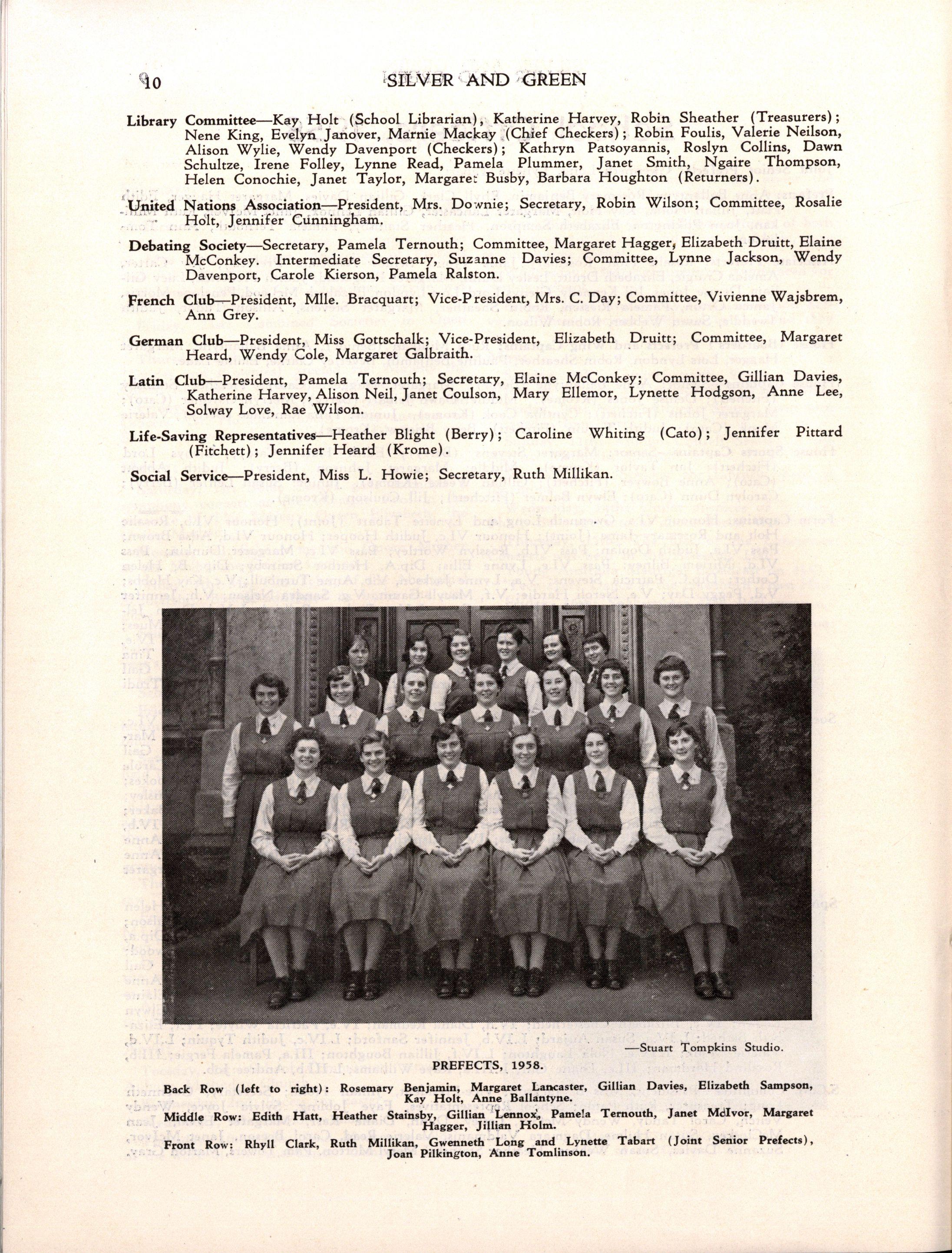
Back Row (left to right): Rosemary Benjamin, Margaret Lancaster, Gillian Davies, Elizabeth Sampson, Kay Holt, Anne Ballantyne
Middle Row: Edith Hatt, Heather Stainsby, Gillian Lenno*, Pamela Ternouth, Janet Mdlvor, Margaret Hagger, Jillian Holm
Front Row: Rhyll Clark, Ruth Millikan, Gwenneth Long and Lynette Tabart (Joint Senior Prefects), Joan Pilkington, Anne Tomlinson
"Love so amazing, so divine, Demands my soul, my life, my all."
Once again Dr Woo d has led our brief devo tional services each Wednesday before school
Before Easter the main themes were built around Christ's death and resurrection, and included thoughts on prayer, forgiveness, Easter hymns, and some disciples W e were shown that Thomas was really a "seeker," not a "doubter." Everyone was given a clearer understanding of hymns such as "There is a green hill far away," "Whe n I survey the wondrous cross," and of their Easter significance
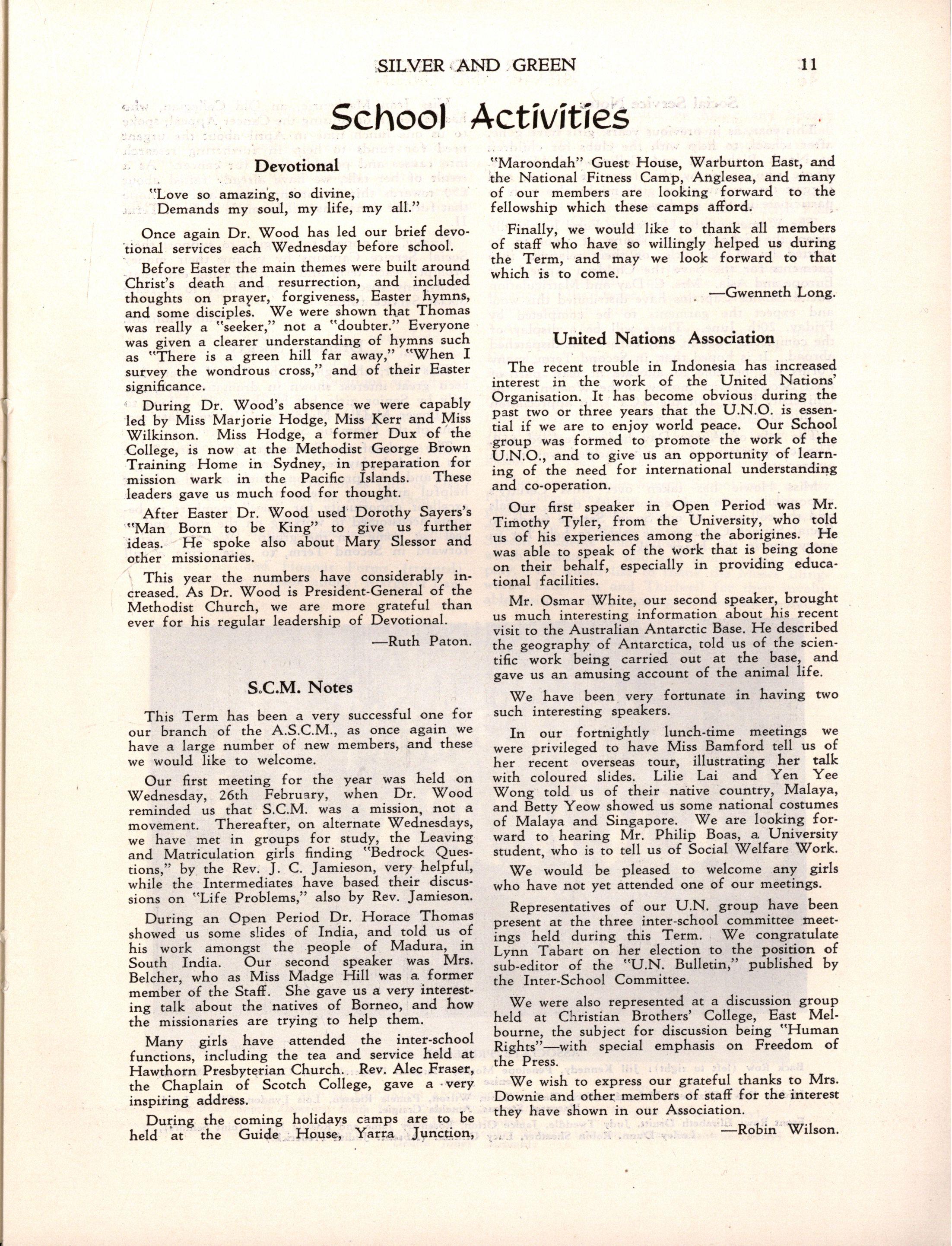
During Dr Wood's absence we were capably led by Miss Marjorie Hodge, Miss Kerr and Miss Wilkinson Miss Hodge, a former Dux of the College, is now at the Methodist George Brown Training Home in Sydney, in preparation for mission wark in the Pacific Islands These leaders gave us much food for thought.
After Easter Dr Woo d used Dorothy Sayers's "Man Born to be King" to give us further ideas He spoke also about Mary Slessor and other missionaries
This year the numbers have considerably in creased. As Dr. Woo d is President-General of the Methodist Church, we are more grateful than ever for his regular leadership of Devotional —Ruth Paton
This Term has been a very successful one for our branch of the A.S.C.M., as once again we have a large number of new members, and these we would like to welcome
Our first meeting for the year was held on Wednesday, 26th February, when Dr. Woo d reminded us that S.C.M was a mission, not a movement Thereafter, on alternate Wednesdays, we have met in groups for study, the Leaving and Matriculation girls finding "Bedrock Ques tions," by the Rev. J. C. Jamieson, very helpful, while the Intermediates have based their discus sions on "Life Problems," also by Rev Jamieson
During an Open Period Dr Horace Thomas showed us some slides of India, and told us of his work amongst the people of Madura, in South India Our second speaker was Mrs Belcher, who as Miss Madge Hill was a former member of the Staff She gave us a very interest ing talk about the natives of Borneo, and how the missionaries are trying to help them
Many girls have attended the inter-school functions, including the tea and service held at Hawthorn Presbyterian Church Rev Alec Fraser, the Chaplain of Scotch College, gave a very inspiring address
During the coming holidays camps are to be held at the Guide House, Yarra Junction,
"Maroondah" Guest House, Warburton East, and the National Fitness Camp, Anglesea, and many of our members are looking forward to the fellowship which these camps afford
Finally, we would like to thank all members of staff who have so willingly helped us during the Term, and may we look forward to that which is to come
—Gwenneth LongThe recent trouble in Indonesia has increased interest in the work of the United Nations' Organisation. It has become obvious during the past two or three years that the U.N.O is essen tial if we are to enjoy world peace Our School group was formed to promote the work of the U.N.O., and to give us an opportunity of learn ing of the need for international understanding and co-operation
Our first speaker in Open Period was Mr Timothy Tyler, from the University, who told us of his experiences among the aborigines He was able to speak of the work that is being done on their behalf, especially in providing educa tional facilities
Mr Osmar White, our second speaker, brought us much interesting information about his recent visit to the Australian Antarctic Base He described the geography of Antarctica, told us of the scien tific work being carried out at the base, and gave us an amusing account of the animal life
W e have been very fortunate in having two such interesting speakers
In our fortnightly lunch-time meetings we were privileged to have Miss Bamford tell us of her recent overseas tour, illustrating her talk with coloured slides Lilie Lai and Yen Yee Won g told us of their native country, Malaya, and Betty Yeow showed us some national costumes of Malaya and Singapore W e are looking for ward to hearing Mr Philip Boas, a University student, who is to tell us of Social Welfare Work
W e would be pleased to welcome any girls who have not yet attended one of our meetings
Representatives of our U.N. group have been present at the three inter-school committee meet ings held during this Term W e congratulate Lynn Tabart on her election to the position of sub-editor of the "U.N Bulletin," published by the Inter-School Committee.
W e were also represented at a discussion group held at Christian Brothers' College, East Mel bourne, the subject for discussion being "Human Rights"—with special emphasis on Freedom of the Press.
W e wish to express our grateful thanks to Mrs Downie and other members of staff for the interest they have shown in our Association.
—Robin Wilson.
This year, as in previous years, girls have gone, after school, to help with the clubs for children at North Richmond and Collingwood Missions Those who go enjoy this form of service, and suggest that many other girls might also wish to participate in this good work
The Women of the University Fund has kindly given the School many skeins of wool to be knitted by M.L.C girls, or their relatives, into garments for the Save the Children Appeal for Europe and Asia Mrs C Day and Matriculation Social Service Captains have distributed this wool and expect the garments to be completed by Friday, 20th June There will be a display of the completed work in July before it is dispatched abroad. It is hoped that, in Second Term, many Forms will be able to allocate at least part of their Social Service money to the Women of the University Fund (for the S.C.F.), in appreciation of this generous gift of wool
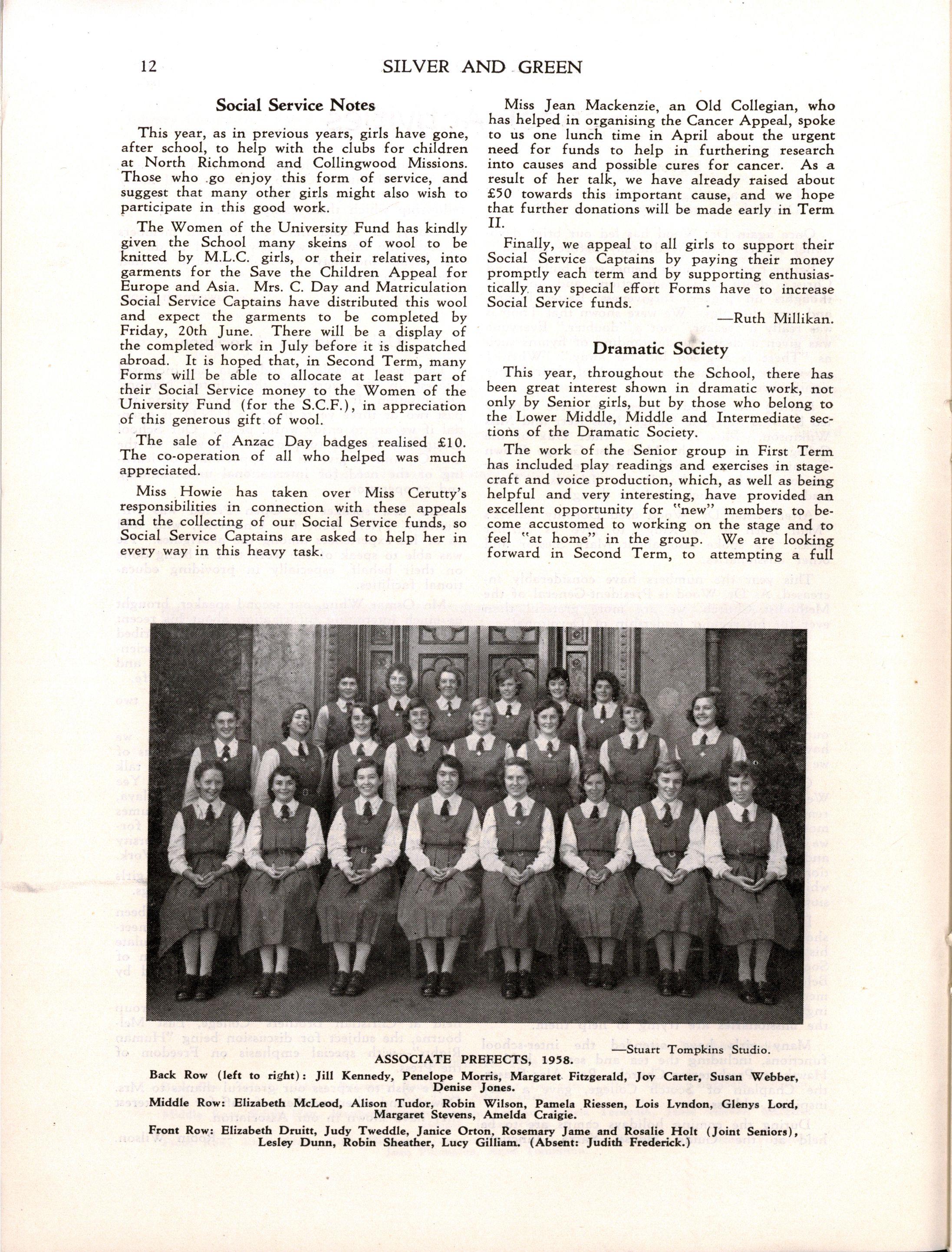
The sale of Anzac Day badges realised £10 The co-operation of all who helped was much appreciated
Miss Howie has taken over Miss Cerutty's responsibilities in connection with these appeals and the collecting of our Social Service funds, so Social Service Captains are asked to help her in every way in this heavy task
Miss Jean Mackenzie, an Old Collegian, who has helped in organising the Cancer Appeal, spoke to us one lunch time in April about the urgent need for funds to help in furthering research into causes and possible cures for cancer As a result of her talk, we have already raised about £50 towards this important cause, and we hope that further donations will be made early in Term II
Finally, we appeal to all girls to support their Social Service Captains by paying their money promptly each term and by supporting enthusias tically any special effort Forms have to increase Social Service funds
—Ruth MillikanThis year, throughout the School, there has been great interest shown in dramatic work, not only by Senior girls, but by those who belong to the Lower Middle, Middle and Intermediate sec tions of the Dramatic Society.
The work of the Senior group in First Term has included play readings and exercises in stage craft and voice production, which, as well as being helpful and very interesting, have provided an excellent opportunity for "new" members to be come accustomed to working on the stage and to feel "at home" in the group W e are looking forward in Second Term, to attempting a full
play, so we have been "talent spotting" also during First Term
The Dramatic Society, of course, would not be the same without Miss Dwyer and we would like to thank her for the enthusiastic interest which she, along with Miss Illingworth and other mem bers of the Speech Staff, unfailingly shows in its work
—G DaviesThe Recital presented by Music and Speech Scholarship winners in our new Assembly Hall was an indication of the high standard main tained.
It was very pleasing to find a record number of girls enrolling to study Speech and Drama at the beginning of the year.
The Speech Scholarship tests were held as usual soon after Term began, and were judged by Miss Eileen O'Keefe, who found the task of adjudi cating very difficult Congratulations are offered to the following winners:
—
1 Lower Middle School (gift of Dramatic Socie ty): Elwyn Balmer
2. Middle School (gift of Dramatic Society) : Bar bara Caffin
3 Intermediate and Diploma Forms (gift of Dra matic Society): Scholarship not awarded
4 Leaving Pass and Honour Forms (untrained) (gift of Parents' Association): Gillian Lennox
5
Leaving Pass and Honour Forms (trained) (gift of Parents' Association) : Margaret Lan caster.
As the conclusion of our Jubilee celebrations, a Pageant showing the history of M.L.C from 1882 to 1957 was presented on Friday, 28tH March, by Old Collegians and present students A copy of the cast and script will be found else where in this magazine W e would like to extend our sincerest thanks to Miss Dwyer, Miss Sutton and Miss Mitchell, who wrote the script, and especially Miss Dwyer, who gave up hours of her time to train the girls
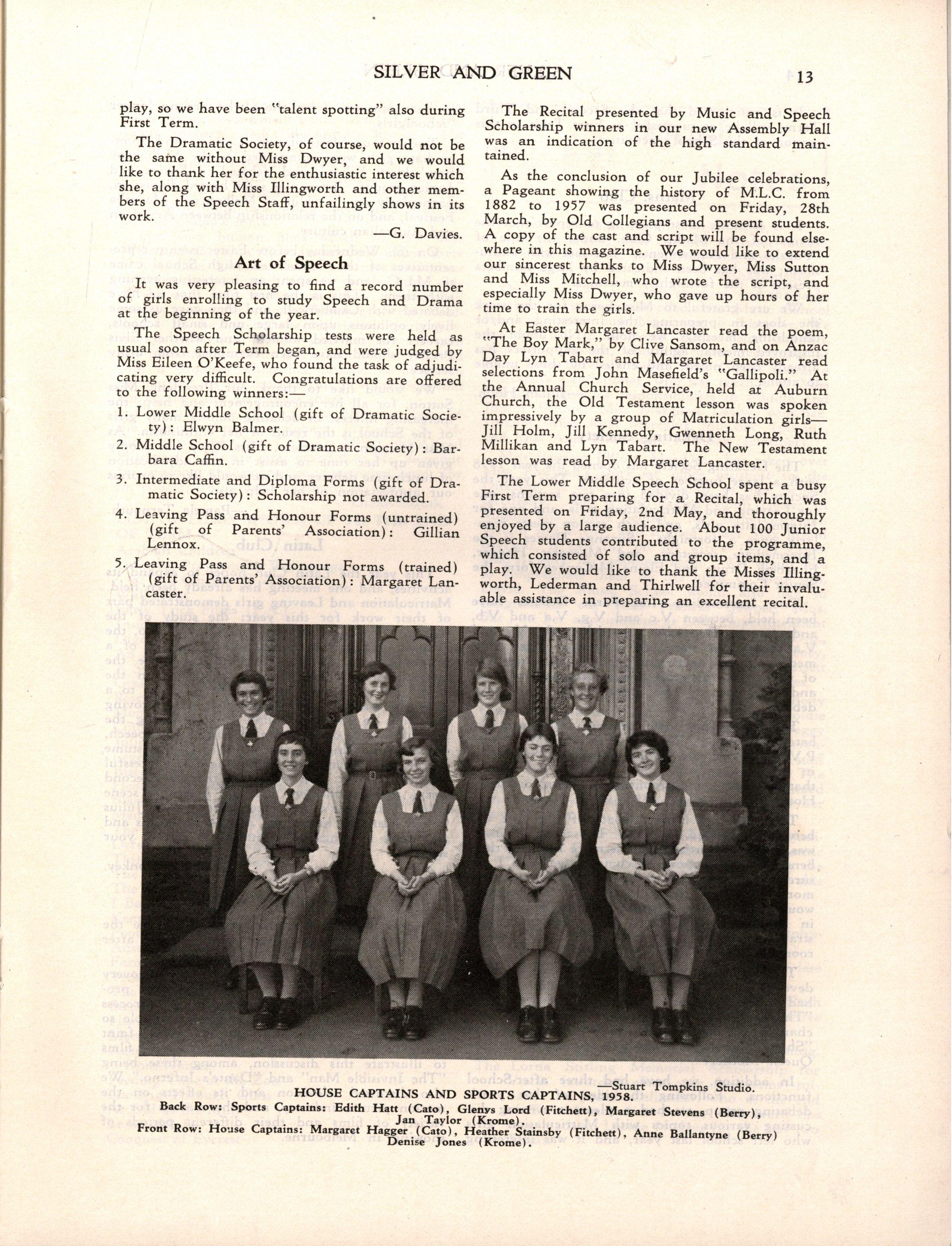
At Easter Margaret Lancaster read the poem, "The Boy Mark," by Clive Sansom, and on Anzac Day Lyn Tabart and Margaret Lancaster read selections from John Masefield's "Gallipoli." At the Annual Church Service, held at Auburn Church, the Old Testament lesson was spoken impressively by a group of Matriculation girls— Jill Holm, Jill Kennedy, Gwenneth Long, Ruth Millikan and Lyn Tabart. The New Testament lesson was read by Margaret Lancaster
The Lower Middle Speech School spent a busy First Term preparing for a Recital, which was presented on Friday, 2nd May, and thoroughly enjoyed by a large audience About 100 Junior Speech students contributed to the programme, which consisted of solo and group items, and a play W e would like to thank the Misses Illing worth, Lederman and Thirlwell for their invalu able assistance in preparing an excellent recital.
It is anticipated that the Second and Third Terms will be as successful as First Term in this section of the School's activities —M.L
It is certainly most pleasing to report that the revival of the Maths Club, under the title of "Puzzles and Amusements," has met with enthu siasm; this has been indicated by large numbers present at the fortnightly meetings
W e are grateful to Miss Lewis for the work she does in preparing the interesting and /or tantalising meetings we hold N o doubt the improved mental agility of the supporters has already been noted, and envied by those unable
—Jillian HolmThe Debating Society has opened the year 1958 with a large number of activities. This year the Society has been divided into two sections, one for Leaving and Matriculation girls, and one for Intermediate girls, and each section meets regu larly once a fortnight Suzanne Davies is the Intermediate secretary, and Margaret Hagger, Elizabeth Druitt and Elaine McConkey form the Senior Committee

Two Intermediate Inter-Form Debates have been held, between V.c and V.g, V.a and V.b, and some good speeches were delivered V.c and V.a respectively were the winners The Inter mediate group have also had lunchtime sessions of round-table debating and impromptu speeches, and take part in the Inter-School round-table debates
There have been two Leaving Inter-Form de bates between P.VI.c and P.VI.e, P.VI.b and p.Vl.d P.VI.c and P.Vl.d had the stronger case in the two contests Here again it was evident that there are some promising speakers for future House debates
The first Inter-House debate of the year was between Cato and Fitchett. The topic discussed was, "That advertising has a more harmful than beneficial effect upon the community," and I am sure that all the debaters now know a great deal more about advertising After Cato's success, it would seem that advertising is certainly necessary in a modern community, but Fitchett demon strated many points in this field where there is room for considerable improvement
The Senior lunch-time meetings have all been devoted to round table debating, and we have had interesting discussions on subjects such as, "That a woman's hat is an indication of her character," "That genius is akin to madness," and "Should Liberace have been presented to the Queen Mother?"
In addition, we have had three after-School functions Following the idea of last year's debating group, we had a pleasant evening dis cussing various topics with Matriculation girls who left school last year, and it was interesting
to hear opinions from those who are no longer "schoolgirls."
Twenty-four Matriculation, Leaving and Inter mediate girls were entertained at the Melbourne Boys' High School, and debated in Senior and Junior groups There was some heated discussion, particularly on the value of Melbourne's Moomba Festival, and on the relationship between American and Australian culture
On the Wednesday before Easter twenty repre sentatives of the Camberwell High School came to M.L.C., and we spent an interesting evening with them This is the first time that we have debated with Camberwell, and they gave us some lively opinions upon large and small schools, careers for married women, and whether Elvis Presley should have been exempted from army service
W e would like to thank our President, Miss Sutton, for all her encouragement and help; the increasing interest in debating among many girls of the School is the result of her enthusiasm As Miss Hotchin is overseas, Miss Percy has kindly given up her time to assist in the adjudication of lunch-time debates, and we would like to express our appreciation of her help also
—Pamela Ternouth
This year the Latin Club hopes to expand its activities, and one meeting has already been held. Matriculation and Leaving girls demonstrated part of their work for this year: the study of the speech, "Pro Lege Manilia," made by Cicero, the greatest of the Roman orators, in support of a proposal by a Roman, Manilius, to place the general, Pompey, in supreme command in the east This measure was intended to bring to a close the Mithridatic Wars, which were proving disastrous to Rome. Gillian Davies, taking the part of Cicero, declaimed a section of the speech, in Latin and English, and other girls in costume represented bystanders Following this successful meeting, it has been arranged that, in Second Term, the Intermediate girls will present a scene from their year's work connected with Julius Caesar's landing in Britain, and we hope this and all future meetings will continue to receive your
—Elaine McConkey supportIt was decided that girls wishing to take the Film Appreciation Course should meet after school each Friday
W e began the year by discussing the discovery of "trick" photography by the early film pro ducers. One example of this was the process whereby people or objects were made invisible so that all the viewer could see was their faint outlines W e were most fortunate in having films to illustrate this discussion, among these being "Th e Invisible Man" and "Dante's Inferno." W e also discussed television arid its effects on the motion picture industry, and the reasons for the variety of films and their different periods of showing in Melbourne.
Two of the earliest made films shown to us, each having a complete story, were "The Great Train Robbery" and "Rescued by Rover." The latter brought to us the story of how a baby was kidnapped from its pram, and how the dog Rover led his master to the house of the old woman who had kidnapped the baby W e criti cised these films, comparing their plots with the plot of to-day's films.
Two very human films which we saw were "Kameradschaft" a German film, in which there is a conflict between German miners and their neighbours, the French miners on the other side of the coal field border, and how disaster and tragedy unite them, and "Member of the Wed ding." In the latter Julie Harris brilliantly por trays a twelve-year-old-girl who has never known any parental love This girl is suddenly confronted with a problem when her brother is about to be married, as she notices this new emotion that her brother and his fiancee share.
Next Term we hope to see films by some of the famous directors—Robert Flaherty, S M Eisenstein, Rene Clair, C B De Mille, and Alfred Hitchcock W e are most grateful to Mr Seymour for making the course so interesting and for introducing to us high standards in films.
•—Diana BartakLIST OF FILMS SHOW N UP T O THE END OF TERM I.
Arabian Children Lumiere, Programme, Beginnings of the Cinema (F.A.)
Walkabout Early Trick Films (F.A.)
Inside the Atom Digestion of Food A n Hour from London A Stamp is Born Great Train Robbery (F.A.) Rescued by Rover (F.A.)
Moments in Music Cinderella on Strings Julius Caesar Legend of the Pied Piper Insect Zo o
Hearts of the World: Ext (F.A.)
Black Bear Twins Member of the Wedding The Hare and the Tortoise Defence Against Invasion Thirty Pieces of Silver The Upper Room
The Crucifixion
I Beheld His Glory Kameradschaft
Footsteps in the Fog
Australian Aborigines: Cooking Farm Animals
Tribute to Sir Winston Churchill The King's Musick Stratford-on-Avon His Trysting Place (F.A.)
Martin Luther Australian Aborigines: Everything from Nature
Feeding Time at the Zo o Looking Through Glass As Old as the Mills Lease of Life Conquest of Everest
"The man that hath no music in himself, Nor is not moved with concord of sweet sounds, Is fit for treasons, stratagems, and spoils."
Owing to the many staff changes, and the large number of students enrolled, the Music School has had a very busy beginning to this year W e are pleased to welcome Miss Betty Scarlett Mus.Bac., Dip.Ed., who has taken over most of Miss Joan Bazeley's work; Miss Gladys Lang, a University Exhibitioner, who has taken over Miss Elaine Cavanagh's responsibilities in Middle and Junior School; Miss Margaret Leahy, Mus Bac (piano), Miss Aliki Marcakis, Mus.Bac (piano), and Miss Ann Thompson, Mus.Bac (clarinet)

Miss Patricia Elliott, Mus.Dip., has taken over Miss Rowland's work of office assistant to the Director, as well as leadership of the School Orchestra She is also taking violin classes in Middle and Junior School. Mr. John Glickman (violin and viola), who studied under Max Rostal overseas, is carrying on his wife's (Sybil Cope land's) work for another Term W e would like to congratulate them on the birth of their son, David The Music School would also like to congratulate our Miss Frances Cowper, Mus Bac., on her appointment as Lady Superintendent of the Boarders Miss Eileen Maley, Mus.Dip., has taken over Miss Winifred Mitchell's theory, harmony and counterpoint work, and Miss Scarlett is now taking all the musical perception classes
W e were sorry to lose the services of Miss Betty Chisholm (piano) and Miss Pauline Goldie (piano) at the end of First Term Mrs Peggy Sumner-Potts, L.A.B., L.T.C.L., Sydney Conserva tonum, from the Perth M.L.C., joined our staff and will be helping with the piano work. The Music School is pleased to hear of the continued improvement of Miss Winifred Mitchell after her serious illness
The tests for the Music Scholarship were adjudi cated by Mr Dorian le Gallienne, the music critic of "The Age," who was most impressed by the great amount of talent shown in the School this year
The winners of the scholarships were:—
The Danks Scholarship for Singing: Clare John son, Rosalie Holt
The Senior Piano Scholarship (gift of the late Mr E A Wright): Pamela Giltinan
The Intermediate Piano Scholarship (the "Ruth Flockart" Scholarship No 1, gift of three Pizzey sisters): Julia Marcroft
Junior Piano (gift of Danks Trust): Jill Cumming
The Lorna Stirling Memorial Scholarship fo r Violin (awarded after only five terms' tui tion) : As Judith Callander, who at the end of Term I moved to Sydney, the award has been made to Leonie Hodges for the last two Terms
Th e Late Mrs F J Cato Orchestral Scholarship: Julie Gleadell (oboe)
Orchestral Scholarship (gift of Mrs C Kumm) : Helen McAfee (flute)
Open Scholarship (gift of Mrs A E Alcock) : Sandra Hore, Margaret Higginbottom (both Intermediate piano students)
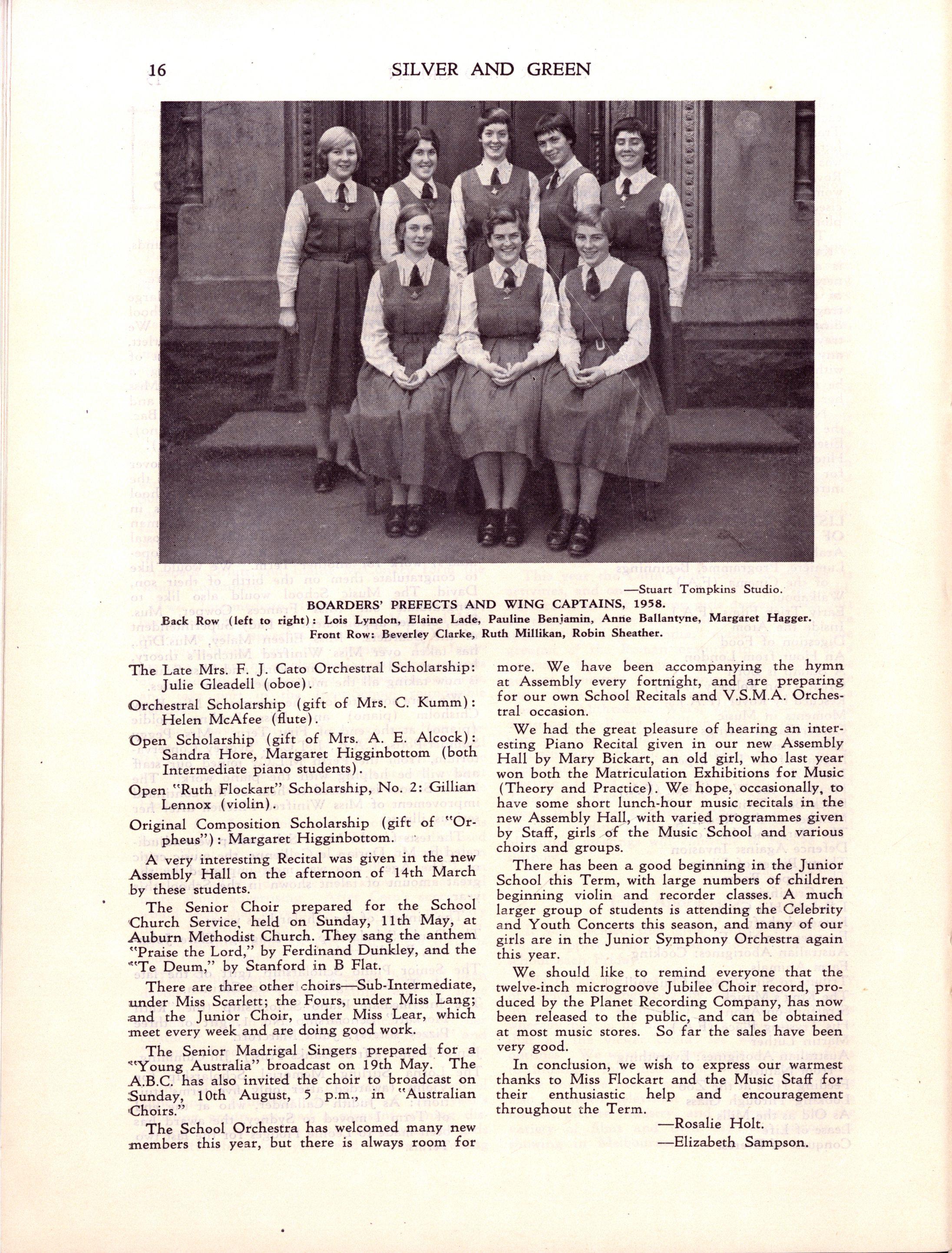
Open "Ruth Flockart" Scholarship, No 2: Gillian Lennox (violin).
Original Composition Scholarship (gift of "Or pheus"): Margaret Higginbottom.
A very interesting Recital was given in the new Assembly Hall on the afternoon of 14th March by these students.
The Senior Choir prepared for the School Church Service, held on Sunday, 11th May, at Auburn Methodist Church They sang the anthem "Praise the Lord," by Ferdinand Dunkley, and the *'Te Deum," by Stanford in B Flat
There are three other choirs—Sub-Intermediate, under Miss Scarlett; the Fours, under Miss Lang; and the Junior Choir, under Miss Lear, which meet every week and are doing good work
The Senior Madrigal Singers prepared for a ""Young Australia" broadcast on 19th May The A.B.C. has also invited the choir to broadcast on Sunday, 10th August, 5 p.m., in "Australian Choirs."
The School Orchestra has welcomed many new members this year, but there is always room for
more W e have been accompanying the hymn at Assembly every fortnight, and are preparing for our own School Recitals and V.S.M A. Orches tral occasion
W e had the great pleasure of hearing an inter esting Piano Recital given in our new Assembly Hall by Mary Bickart, an old girl, who last year won both the Matriculation Exhibitions for Music (Theory and Practice). W e hope, occasionally, to have some short lunch-hour music recitals in the new Assembly Hall, with varied programmes given by Staff, girls of the Music School and various choirs and groups
There has been a good beginning in the Junior School this Term, with large numbers of children beginning violin and recorder classes. A much larger group of students is attending the Celebrity and Youth Concerts this season, and many of our girls are in the Junior Symphony Orchestra again this year.
W e should like to remind everyone that the twelve-inch microgroove Jubilee Choir record, pro duced by the Planet Recording Company, has now been released to the public, and can be obtained at most music stores So far the sales have been very good
In conclusion, we wish to express our warmest thanks to Miss Flockart and the Music Staff fo r their enthusiastic help and encouragement throughout the Term
—Rosalie Holt —Elizabeth SampsonThis year was begun most successfully with the opening of the new Walton Library A n event long awaited for, it fulfilled all our expectations The greater space and added facilities were heartily welcomed, and the colours and general appearance of the Library are most attractive Indeed it is hard to realise the transformation that has taken place in old Fitchett Hall.
Much interest in the new library has been shown by all the girls, and as well we have had many visits from Old Collegians and parents wishing to see it
This Term we have already added over 100 new books to the shelves, and hope to add many more during the year Among these books were many donations, and the committee wishes to extend their thanks to all the donors, particularly girls of past years, who have given valuable reference books
Reference borrowing is as frequent as ever, and also we are pleased to say that we already have 714 enrolments for fiction borrowing—a record for the first half of the year. However, the Library Committee hopes that still more girls will join and so share the benefits that extra reading can give
The first meeting of the School's branch of the Children's Book Council of Victoria has been held, at which our Library Committee was represented by Kay Holt and Katherine Harvey
I wish to thank the members of the Committee for the help they have given, and know that they join with me in thanking Mrs S Day for her invaluable assistance and guidance throughout the Term
—Kay HoltDr Wood's baton On 29th March 82 girls went to Nicholas Hall to see the film "Souls in Con flict," and I think all the girls enjoyed this
At last the longed-for Easter holidays came, and all girls enjoyed this break with their families and friends Everyone returned refreshed to do their exams., which followed soon after
The 4th May proved to be quite an eventful day, being both Dr Wood's birthday and the Empire Youth March in the city However, it was a "week-end out," so our red rose was pre sented to Dr Woo d by the youngest boarder o n the Friday As so many were not in residence, the numbers participating in the march were smaller, but we thank all those who did
On Friday, 9th May, the boarders, as usual, prepared for the Sports in their red jumpers and colours Bad luck, House, but it was a good try! Thanks are due to Miss Holt and the team fo r all the work they put into their training That night we held our first Boarders' picture night, to aid our funds for a new radiogram W e are grateful to Mr Seymour for the way in which he so willingly gave his time to the film, "Lease o f Life."
A party of girls is once again attending the Celebrity Concerts and enjoying them very much Birthday night preparations are now beginning, and we do hope it will be a success
In closing, I would like to acknowledge the help of Miss Cowper and staff given to us throughout the Term W e all hope to have a successful year together
—Ruth MillikanW e wish to extend a hearty welcome to Miss Cowper, who is our new Lady Superintendent, and the new members of staff: Miss Gottschalk, Miss Ryall, Miss Holt, Miss White, Miss Leya, Sister Thomson and Sister Jack. W e should also like to welcome the new girls, who, we hope, are now settling down in their new surroundings. Anne Ballantyne, Margaret Hagger, Robin Sheather, Lois Lyndon, Beverley Clarke, Elaine Lade, Pauline Benjamin and Ruth Millikan are our Boarding Prefects
Our first House activity was the Boarders' Swim ming Sports The Old Girls swam against the New Girls, and all were able to see what talent we had in the House O n 8th March the Old Girls' Concert was opened with the rendering of the Old Girls' Song to the tune "Poor Jud is Dead." It was quite successful, and some items were very amusing The New Girls followed suit on 29th March, and we were well entertained
On 5 th March the Overseas Missions Meeting was held in the Melbourne Town Hall, and most of the girls sang with the Ministers' Choir under
On the afternoon of Sunday, 4th May, about 200 M.L.C girls took part in the British Com monwealth Youth Sunday March This year M.L.C was the leading school in the procession, which made its way over Princes Bridge and u p Swanston Street past the Governor's saluting box outside the Melbourne Town Hall Then, all marchers from Methodist schools continued march ing to the Wesley Church in Lonsdale Street Wet, windy conditions made the marching rather, difficult, and more than one hat was carried away by the wind
After half an hour of hymn singing, the service began, introduced by Dr C Irving Benson Throughout the service reference was made to Australia's link with Britain and the other Com monwealth nations A memorable section of the service was the repetition by the boys of Solomon's prayer to God for wisdom in governing his nation, and then the repetition by the girls of the Queen's Vow and Request, requiring us to assist her in the service of the Commonwealth
The address was given by Admiral Sir Roy Dowling He spoke first of the responsibility o f
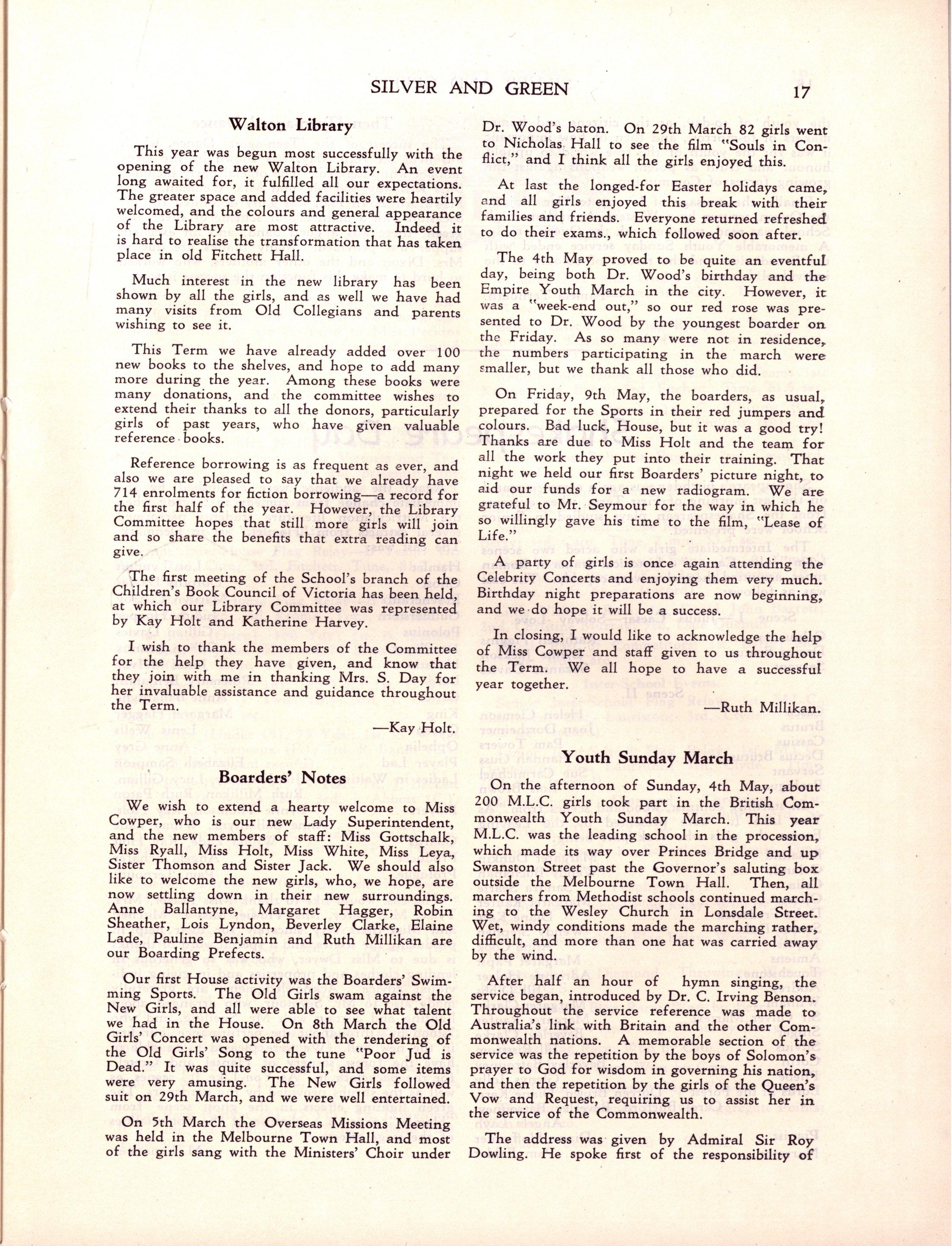
the youth of to-day, as the citizens and home makers of to-morrow, and then of how important it was for the youth of the free world to uphold honour and truth as potent weapons against the growing forces of Communism
Finally, the message of loyalty to Her Majesty the Queen, written by a Western Australian High School, was read, together with the Queen's reply A memorable Youth Sunday service ended with the Benediction and the return of colours to the individual bearers
—Pamela TernouthThe success of the 'Teen-agers' Dance, which was held on 16th May, was shown by the large number who attended The official party included Miss Kellaway and Mr and Mrs Wellman The Hawthorn Town Hall was gaily decorated for the occasion with a main colour scheme of silver and green; there was a good band, and an excellent supper was provided Many thanks are due to Mrs. Dixon and the other mothers, who worked so hard to make this function the success it was —E.M
Shakespeare's birthday was again commemorated on the last morning of First Term, when excerpts from the Shakespearean plays studied in Senior School were presented
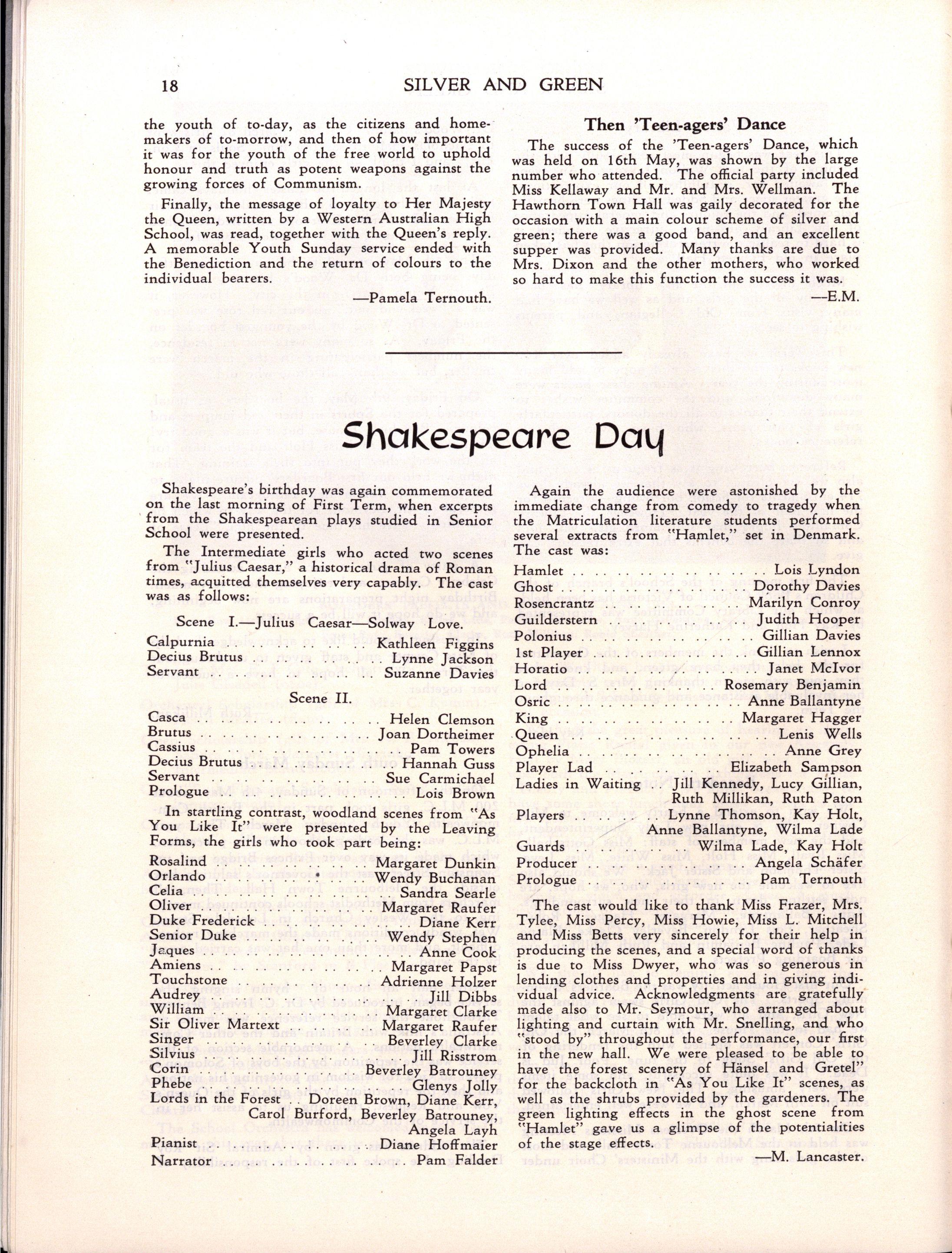
The Intermediate girls who acted two scenes from "Julius Caesar," a historical drama of Roman times, acquitted themselves very capably The cast was as follows:
Scene I.—Julius Caesar—Solway Love
Calpurnia Kathleen Figgins Decius Brutus Lynne Jackson Servant Suzanne Davies
Scene II
Casca Helen Clemson Brutus Joan Dortheimer Cassius Pam Towers Decius Brutus Hannah Guss Servant Sue Carmichael Prologue Lois Brown
In startling contrast, woodland scenes from "As Yo u Like It" were presented by the Leaving Forms, the girls who took part being:
Rosalind Margaret Dunkin Orlando ? . . . . Wendy Buchanan Celia Sandra Searle Oliver Margaret Raufer Duke Frederick Diane Kerr Senior Duke Wendy Stephen Jaques Anne Cook
Amiens Margaret Papst Touchstone Adrienne Holzer
Audrey Jill Dibbs William Margaret Clarke Sir Oliver Martext Margaret Raufer
Singer Beverley Clarke Silvius Jill Risstrom Corin Beverley Batrouney Phebe Glenys Jolly Lords in the Forest Doreen Brown, Diane Kerr, Carol Burford, Beverley Batrouney, Angela Layh
Pianist Diane Hoffmaier Narrator Pam Falder
Again the audience were astonished by the immediate change from comedy to tragedy when the Matriculation literature students performed several extracts from "Hamlet," set in Denmark
The cast was:
Hamlet
Lois Lyndon Ghost Dorothy Davies Rosencrantz Marilyn Conroy Guilderstern Judith Hooper Polonius Gillian Davies 1st Player Gillian Lennox Horatio Janet Mclvor Lord Rosemary Benjamin Osric Anne Ballantyne King Margaret Hagger Queen Lenis Wells Ophelia Anne Grey Player Lad . . Elizabeth Sampson Ladies in Waiting Jill Kennedy, Lucy Gillian, Ruth Millikan, Ruth Paton Players Lynne Thomson, Kay Holt, Anne Ballantyne, Wilma Lade Guards Wilma Lade, Kay Holt Producer Angela Schafer Prologue Pam Ternouth
The cast would like to thank Miss Frazer, Mrs Tylee, Miss Percy, Miss Howie, Miss L Mitchell and Miss Betts very sincerely for their help in producing the scenes, and a special word of thanks is due to Miss Dwyer, who was so generous in lending clothes and properties and in giving indi vidual advice Acknowledgments are gratefully made also to Mr. Seymour, who arranged about lighting and curtain with Mr Snelling, and who "stood by" throughout the performance, our first in the new hall W e were pleased to be able to have the forest scenery of Hansel and Gretel" for the backcloth in "As Yo u Like It" scenes, as well as the shrubs provided by the gardeners The green lighting effects in the ghost scene from "Hamlet" gave us a glimpse of the potentialities of the stage effects
-—M. Lancaster.
The Senior Athletic Sports were held most suc cessfully on Friday, 9th May, and our congratu lations and thanks are extended to Miss Perkins and the Physical Education Staff for their splendid organisation
The School is very proud of its Senior and Junior Relay teams, who, in winning the Inter School Relays, broke records
W e thank Miss Forster for her judging of the March Past, and Mrs N Elliott, wife of the Rev N Elliott, the President of the Victoria and Tas mania Methodist Conference, for presenting the trophies Our thanks are also due to the staff who acted as judges throughout the afternoon
Senior Inter-House Flag Relay—B Team: 1st, Berry; 2nd, Cato; 3rd, Fitchett. Time, 81.2 sec. (record)
Middle Inter-House Flag Relay—B Team: 1st, Betty; 2nd, Cato; 3rd, Krome Time, 81.4 sec
Flat Race (Open), 100 Yds.: 1st, A Sambell (C.) ; 2nd, D Jones (K) ; 3rd, M Stevens (B.), F Parry (K.) Time, 12.4 sec
Flat Race (Under 16), 100 Yds.: 1st, J Well man (C.); 2nd, J Twiss (B.); 3rd, J Beckett (B.) Time, 12.1 sec
Flat Race (Under 15), 75 Yds.: 1st, G Weeks (K.); 2nd, S Furneaux (F.); 3rd, R Bandt (C.) Time, 9.5 sec (equal record)
Flat Race (Under 14), 75 Yds.: 1st, J. Beckett (B.); 2nd, G Weeks (K.) ; 3rd, J Abbott (C.) Time, 10 sec
High Jump (Open) : 1st, B Adamson (C.); 2nd, B Isaacson (K.); 3rd, J Pittard (F.) Height, 4 ft 4 i in
Baseball Throwing (Open) : 1st, M Swann (C ) ; 2nd, J Timewell (K.) ; 3rd, M Haig-Muir (K) . Distance, 84.5 yds.
Discus Throwing (Open) : 1st, C Whiting (C.); 2nd, J Timewell (K) ; 3rd, E Janover (B.) Distance, 83 ft. (record).
Javelin Throwing (Open) : 1st, S Nelson (C.) ; 2nd, J Taylor (K.) ; 3rd, J Pond (F.) Distance, 79 ft 11 in
Middle Square Overhead Ball: 1st, Fitchett; 2nd, Berry; 3rd, Cato Time, 48 sec
Flat Race (Open) , 75 Yds.: 1st, D Jones (K) ; 2nd, M Swann (C.) ; 3rd, J Twiss (B.) Time, 9.5 sec
Flat Race (Under 16), 75 Yds.: 1st, J. Wellman (C) ; 2nd, M Johns (F.); 3rd, J Slade (B.) Time, 9.4 sec
Middle Over and Under 'Zig-zag Bouncing: 1st, Berry; 2nd, Fitchett; 3rd, Cato Time, 4 min 31.8 sec.
Senior Inter-House Flag Relay—A Tteam: 1st, Cato; 2nd, Krome; 3rd, Berry Time, 78.7 sec (equal record)
Middle Inter-House Flag Relay—A Team: 1st, Krome; 2nd, Berry; 3rd, Fitchett Time, 81.5 sec
Long Jump (Open) : 1st, C Whiting (C.) ; 2nd, J Nixon (K.) ; 3rd, S Phillips (B.) Dis tance, 15 ft 6 in
Senior Cross Ball: 1st, Fitchett; 2nd, Cato; 3rd, Berry Time, 1 min 32.8 sec
Middle Exchange and Pass Ball: 1st, Berry, 2nd, Cato; 3rd, Fitchett Time, 43.5 sec
Senior Overhead Spoke Relay: 1st, Krome; 2nd, Berry; 3rd, Cato Time, 2 min 53.4 sec Hop, Step and Jump (Open) : 1st, A Sambell (C.); 2nd, F Parry (K.) ; 3rd, J Beckett (B.) Distance, 34 ft 6 i in (record)
Little Visitors' Race: 1st, David John Barrett; 2nd, Christine Murray; 3rd, Dale Quentin
March Past of Competitors: 1st, Berry; 2nd, Fitchett; 3rd, Cato.
Inter-School Events.
Senior Inter-School Flag Relay: 1st, M.L.C., Hawthorn; 2nd, Lauriston; 3rd, Clyde Time, 75.2 sec (record)
Junior Inter-School Flag Relay: 1st, M.L.C., Hawthorn; 2nd, Lauriston; 3rd, Clyde Time, 78.1 sec (record)
Inter-School Diamond Throwing: 1st, M.C.E G.G.S.; 2nd, M.L.C., Hawthorn; 3rd, St Catherine's Time, 54.8 sec
House v School: 1st, School; 2nd, House Time, 76.4 sec (record)
Trophy List.
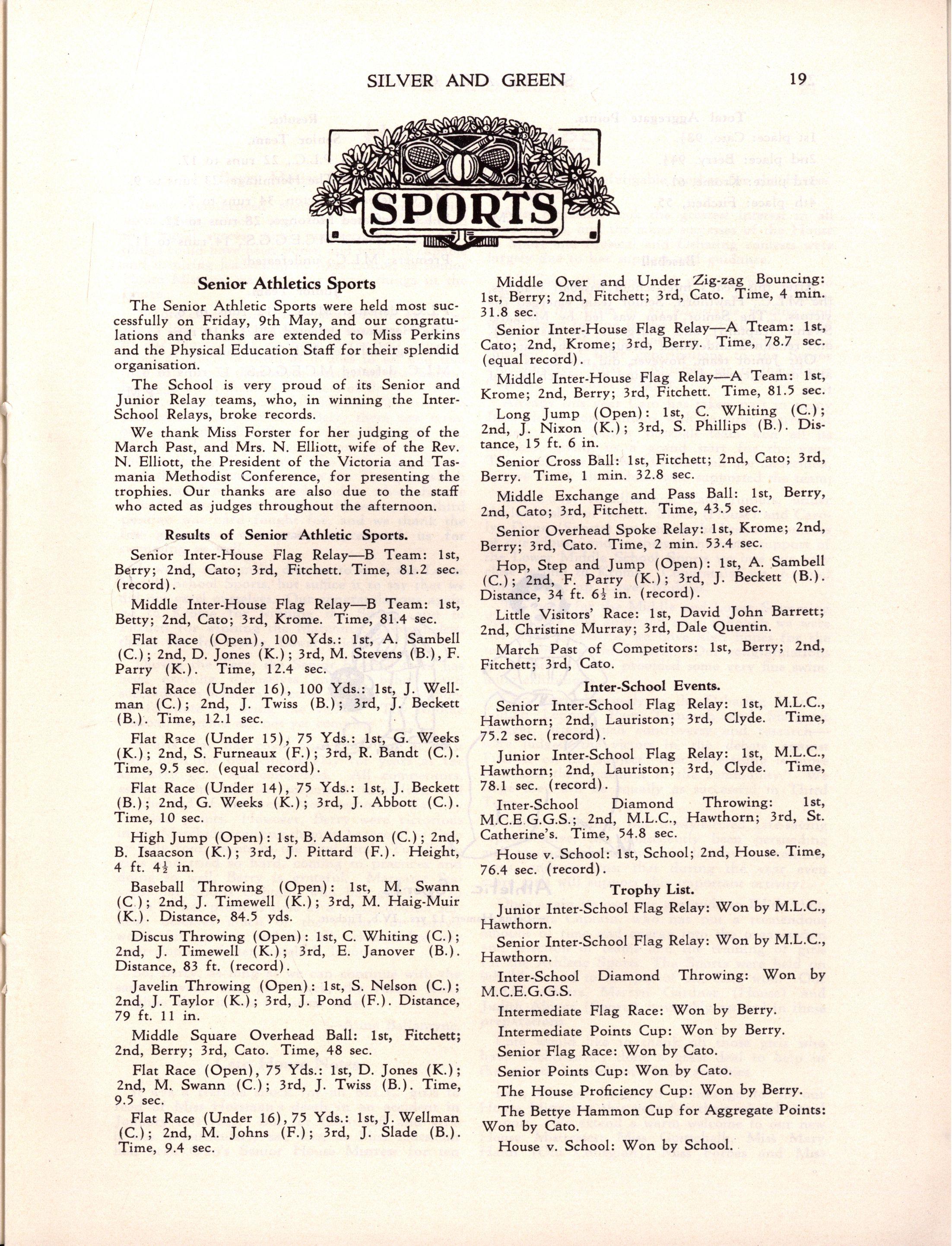
Junior Inter-School Flag Relay: Wo n by M.L.C., Hawthorn
Senior Inter-School Flag Relay: Wo n by M.L.C., Hawthorn
Inter-School Diamond Throwing: Wo n by M.C.E.G.G.S
Intermediate Flag Race: Wo n by Berry.
Intermediate Points Cup: Wo n by Berry
Senior Flag Race: Wo n by Cato
Senior Points Cup: Wo n by Cato
The House Proficiency Cup: Wo n by Berry
The Bettye Hammon Cup for Aggregate Points: Wo n by Cato
House v School: Wo n by School
1st place: Cato, 98i
2nd place: Berry, 94i
3rd place: Krome, 61
4th place: Fitchett, 55
After this year's inter-school baseball matches, the M.L.C., Hawthorn, Senior team emerged the victors The Senior team was led by Margaret Swann (captain) and Margaret Stevens (v.c.), and remained undefeated throughout the matches
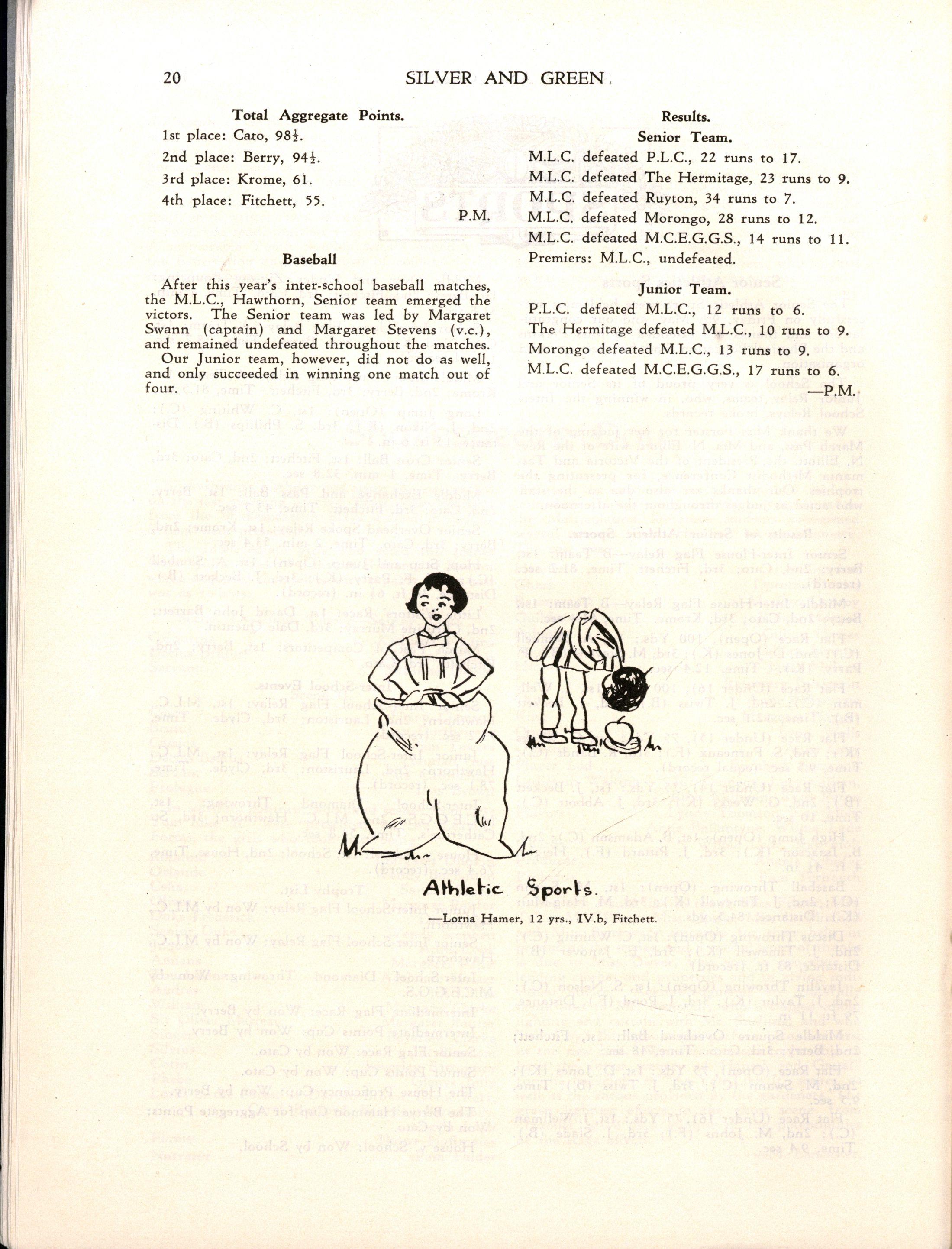
Our Junior team, however, did not do as well, and only succeeded in winning one match out of four
Results. Senior Team.
M.L.C defeated P.L.C., 22 runs to 17 M.L.C. defeated The Hermitage, 23 runs to 9. M.L.C. defeated Ruyton, 34 runs to 7. M.L.C. defeated Morongo, 28 runs to 12. M.L.C. defeated M.C.E.G.G.S., 14 runs to 11. Premiers: M.L.C., undefeated
Junior Team.
P.L.C defeated M.L.C., 12 runs to 6 The Hermitage defeated M.L.C., 10 runs to 9 Morongo defeated M.L.C., 13 runs to 9 M.L.C. defeated M.C.E.G.G.S., 17 runs to 6.
—P.M—Lorna Hamer, 12 yrs., IV.b, Fitchett.
Berry commenced their 1958 activities with great spirit, which, alas, had not been matched with equal success until just recently However, things could have been worse, and with the capable and inspiring leadership of Miss Sutton as Senior House Mistress, we hope for better things in the future

Before considering the events for the Term, we would like to welcome the new members of Berry to our House, and we hope Berry will come to mean as much to them as it does to us, and that they will prove themselves worthy of the honour bestowed upon them as members of the best, if not most consistently successful, House. W e are also pleased to have with us in Berry three new mem bers of staff—Miss Brauns, Mrs Brownbill and Miss Leya—and we hope their time in Berry will be happy for them The Swimming Sports were the first House event for the Term, in which we managed to come third, and in which Krome gained a magnificent victory. Howeves, our third position was hard fought for, and we thank the few girls who continually represented us for swimming so well
It would seem more discreet to omit the Lower Middle School Sports, but suffice it to say that we did not excel ourselves Our congratulations again go to Krome for winning the Sports, and to Fitchett for winning the Marching Nevertheless, thank you for trying, Lower Middles.
During the Term the Senior baseball team has been exerting themselves on our behalf, and succeeded in achieving second place to Cato, whom we felicitate on being the victors The Middle baseball matches are not yet complete
Sports Day has come and gone, and it must have been the best Sports Day for years as far as Berry girls are concerned All competitors, especially the Middles, surpassed themselves, and by the end of the events were second to Cato by fourteen points However, Berry were victorious in the Marching, causing them to be second to Cato by only four points in the final total T o all the girls who tried so hard, coming to practices and doing so well, Berry is grateful Margaret Ste vens, our Sports Captain, who has given up so much of her precious time as a Matriculation stu dent, deserves much of the credit for Berry's wonderful success, and we all acknowledge our appreciation of her unselfish labour
So, Berry, as long as we can continue with the same fervour and good luck, the future looks brighter than it has for some time
—Ann e BallantyneIt w?s a terrible shock for all M.L.C girls to read of Miss Horsman's death in an accident in January this year But for Cato staff and girls it was a particularly sad loss, as Miss Horsman had been Cato's Senior House Mistress for ten
years and an indefatigable worker for the House in every activity
Miss Horsman took the greatest interest in all Cato affairs, and the many successes of the House in Sport and Musical and Debating contests were largely due to her support and guidance
All Cato girls, past and present, will want to contribute to the House Memorial, which we hope will take the form of an adjustable reading and music stand for use in the Music Hall. The 1958 House Officers hope that Old Collegians reading this will send their contributions to the Senior Housemistress, Miss L Mitchell, or to the House Captain, Margaret Hagger
Already this year Cato has taken part in many Inter-House competitions with varying degrees of success The Senior Baseball team won all its matches, giving us a grand start for the year The results for the Middle Baseball are undecided, but we thank all Middles who supported the team!
Our Lower Middles and Cato Juniors, under the leadership of Valerie Monk (House) and Caro lyn Dunn (Sports) are among the keenest members of our House, and to their enthusiastic support of the Lower Middle School Sports we owe our very close second to Krome Congratulations, Krome! And keep it up, Lower Middles!
The heats for the Middle and Lower Swimming Sports were well contested and, although we were not at all successful, we have high hopes for the team events in Third Term Our congratulations go to Fitchett, who provided some very fine swim ming exhibitions.
Cato listened eagerly as the Debating Team Gillian Lennox, Pam Ternouth and Margaret Hagger, after much controversy and research were judged the victors in the debate against Fitchett on the subject "that advertising is more beneficial than harmful to the community." W e hope they will be equally as successful in Third Term
Carolyn Whiting, our newly-elected Life-saving representative, has consistently been persuading girls to undertake the various life-saving examina tions, and we trust that during the year even more girls will support this important activity.
Once again we owe our gratitude to Edith Hatt, our Sports Captain, who has put a tremendous amount of time and energy into the organisation and selection of teams and the training of girls for the Athletic Sports The Sports were held on 9th May, and to the joy of all, Cato won. Our Middle officers, Merryn Gardner (House) and Judith Abbott (Sports) have ably assisted in these preparations
Cato would like to thank all those girls who have unobtrusively done a great deal to help in the smooth running of House activities
Last, but not least, our thanks go to all our House Mistresses this year for their wholehearted support W e extend a warm welcome to our new House Mistresses: Miss Gottschalk, Miss Mary Hann (Old Collegian), Miss Forbes and Miss
Howie, whom we welcome back after a year abroad, and to all our new girls, especially those from Malaya, and thank them for their enthusi astic participation in all Cato's activities.
W e hope that during the rest of the year our blue colours will be kept flying high and that finally they will rise to victory —Margaret Hagger
House spirit and loyalty are the main aims of Fitchett for 1958 W e plan to make this year the best of all, and to this end we need the co-opera tion and enthusiasm of every member of the House Much can be done to maintain a good team spirit by each girl in Fitchett realising that her individual support is necessary, especially during House matches and other House activities Come on, Fitchett! What about it?
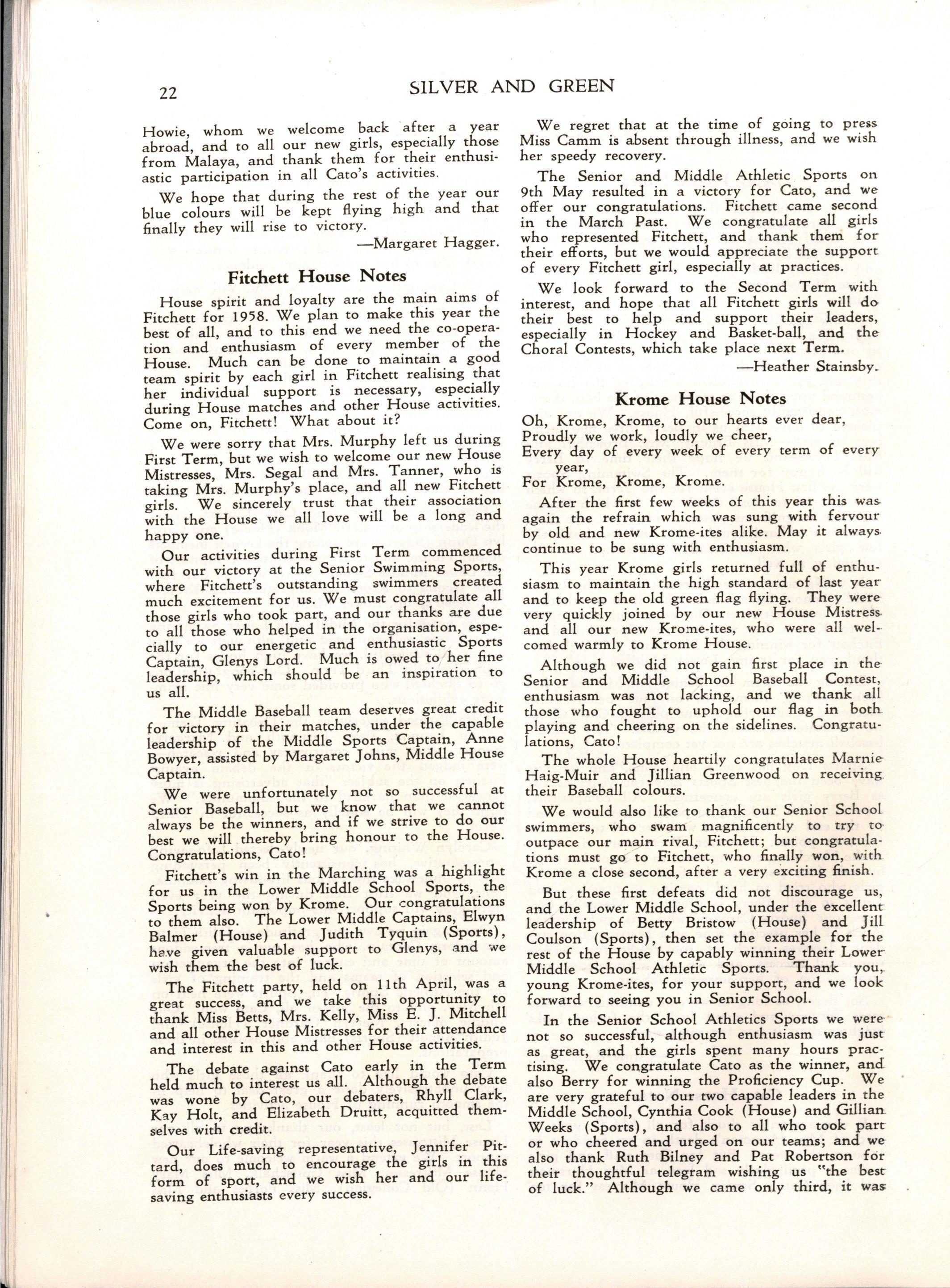
W e were sorry that Mrs Murphy left us during First Term, but we wish to welcome our new House Mistresses, Mrs Segal and Mrs Tanner, who is taking Mrs. Murphy's place, and all new Fitchett girls W e sincerely trust that their association with the House we all love will be a long and happy one
Our activities during First Term commenced with our victory at the Senior Swimming Sports, where Fitchett's outstanding swimmers created much excitement for us W e must congratulate all those girls who took part, and our thanks are due to all those who helped in the organisation, espe cially to our energetic and enthusiastic Sports Captain, Glenys Lord Much is owed to her fine leadership, which should be an inspiration to us all.
The Middle Baseball team deserves great credit for victory in their matches, under the capable leadership of the Middle Sports Captain, Anne Bowyer, assisted by Margaret Johns, Middle House Captain.
W e were unfortunately not so successful at Senior Baseball, but we know that we cannot always be the winners, and if we strive to do our best we will thereby bring honour to the House Congratulations, Cato!
Fitchett's win in the Marching was a highlight for us in the Lower Middle School Sports, the Sports being won by Krome Our congratulations to them also The Lower Middle Captains, Elwyn Balmer (House) and Judith Tyquin (Sports), have given valuable support to Glenys, and we wish them the best of luck.
The Fitchett party, held on 11th April, was a great success, and we take this opportunity to thank Miss Betts, Mrs Kelly, Miss E J Mitchell and all other House Mistresses for their attendance and interest in this and other House activities
The debate against Cato early in the Term held much to interest us all Although the debate was wone by Cato, our debaters, Rhyll Clark, Kay Holt, and Elizabeth Druitt, acquitted them selves with credit
Our Life-saving representative, Jennifer Pit tard, does much to encourage the girls in this form of sport, and we wish her and our life saving enthusiasts every success
W e regret that at the time of going to press Miss Camm is absent through illness, and we wish her speedy recovery.
The Senior and Middle Athletic Sports on 9th May resulted in a victory for Cato, and we offer our congratulations Fitchett came second in the March Past. W e congratulate all girls who represented Fitchett, and thank them fo r their efforts, but we would appreciate the support of every Fitchett girl, especially at practices
W e look forward to the Second Term with interest, and hope that all Fitchett girls will d o their best to help and support their leaders, especially in Hockey and Basket-ball, and the Choral Contests, which take place next Term
—Heather Stainsby.
Oh, Krome, Krome, to our hearts ever dear, Proudly we work, loudly we cheer, Every day of every week of every term of every year, For Krome, Krome, Krome.
After the first few weeks of this year this was again the refrain which was sung with fervour by old and new Krome-ites alike May it always continue to be sung with enthusiasm.
This year Krome girls returned full of enthu siasm to maintain the high standard of last year and to keep the old green flag flying. They were very quickly joined by our new House Mistress and all our new Krome-ites, who were all wel comed warmly to Krome House.
Although we did not gain first place in the Senior and Middle School Baseball Contest, enthusiasm was not lacking, and we thank all those who fought to uphold our flag in both playing and cheering on the sidelines. Congratu lations, Cato!
The whole House heartily congratulates Marnie Haig-Muir and Jillian Greenwood on receiving their Baseball colours.
W e would also like to thank our Senior School swimmers, who swam magnificently to try to outpace our main rival, Fitchett; but congratula tions must go to Fitchett, who finally won, with Krome a close second, after a very exciting finish.
But these first defeats did not discourage us, and the Lower Middle School, under the excellent leadership of Betty Bristow (House) and Jill Coulson (Sports), then set the example for the rest of the House by capably winning their Lower Middle School Athletic Sports. Thank you, young Krome-ites, for your support, and we look forward to seeing you in Senior School
In the Senior School Athletics Sports we were not so successful, although enthusiasm was just as great, and the girls spent many hours prac tising W e congratulate Cato as the winner, and also Berry for winning the Proficiency Cup. W e are very grateful to our two capable leaders in the Middle School, Cynthia Cook (House) and Gillian Weeks (Sports), and also to all who took part or who cheered and urged on our teams; and we also thank Ruth Bilney and Pat Robertson for their thoughtful telegram wishing us "the best of luck." Although we came only third, it was
not through lack of House spirit and enthusiasm, and Sports Day proved itself a great occasion for winners and losers alike
W e congratulate Jennifer Heard on being elected as our Life-saving Representative, and although many girls have already passed their life saving examinations, we hope Third Term will bring even better results
One of the greatest setbacks is that of Conduct, and it is hoped that through Form representatives' meetings, we may be able to improve it; but we must have the support of the whole House Remember, Krome-ites, if you do not do well, the good work of others is spoilt by your bad conduct
Finally, we would especially like to thank Miss Betty Jackson and all the other House mistresses for their support, Jan Taylor for all the time, energy and thought she has put into the choosing of the various teams and the many practices; Cynthia and Gillian for leading the Middles, and Betty and Jill for their help in the Lower Middle School.
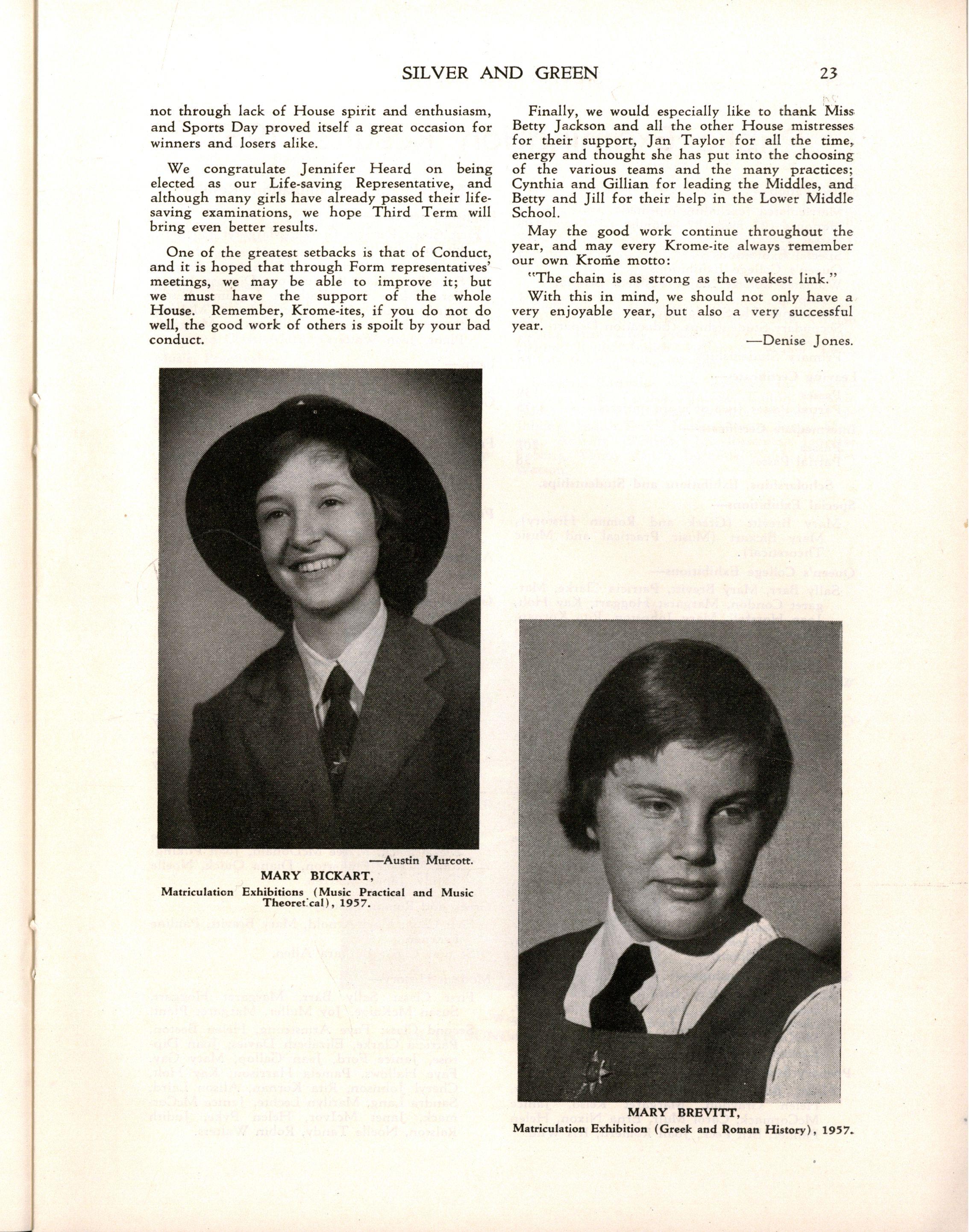
May the good work continue throughout the year, and may every Krome-ite always remember our own Krome motto:
"The chain is as strong as the weakest link."
With this in mind, we should not only have a very enjoyable year, but also a very successful year
-—Denise Jones.
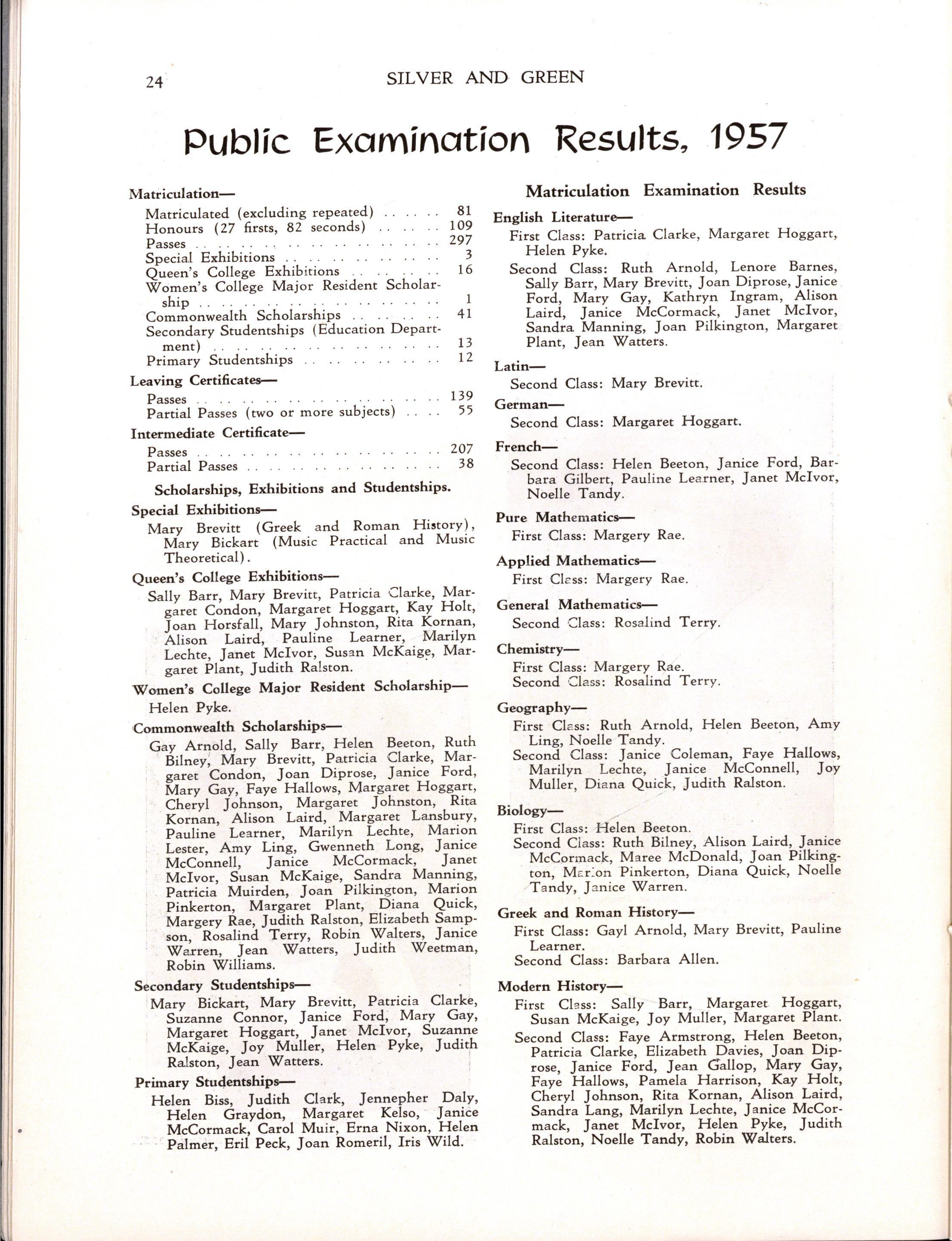
Matriculated (excluding repeated) ... . Honours (27 firsts, 82 seconds)
Passes
Special Exhibitions
Queen's College Exhibitions Women's College Major Resident Scholar ship
Commonwealth Scholarships Secondary Studentships (Education Depart ment)
Primary Studentships
Leaving Certificates— Passes
Partial Passes (two or more subjects)
Intermediate Certificate— Passes Partial Passes
Special Exhibitions—
81 109 297 3 16 1 41 13 12 139 55 207 38
English Literature—
First Class: Patricia Clarke, Margaret Hoggart, Helen Pyke
Second Class: Ruth Arnold, Lenore Barnes, Sally Barr, Mary Brevitt, Joan Diprose, Janice Ford, Mary Gay, Kathryn Ingram, Alison Laird, Janice McCormack, Janet Mclvor, Sandra Manning, Joan Pilkington, Margaret Plant, Jean Watters
Latin—
Second Class: Mary Brevitt German—
Second Class: Margaret Hoggart French—
Second Class: Helen Beeton, Janice Ford, Bar bara Gilbert, Pauline Learner, Janet Mclvor, Noelle Tandy
Pure Mathematics—
Mary Brevitt (Greek and Roman History), Mary Bickart (Music Practical and Music Theoretical).
Queen's College Exhibitions—
Sally Barr, Mary Brevitt, Patricia Clarke, Mar garet Condon, Margaret Hoggart, Kay Holt, Joan Horsfall, Mary Johnston, Rita Kornan, Alison Laird, Pauline Learner, Marilyn Lechte, Janet Mclvor, Susan McKaige, Mar garet Plant, Judith Ralston
Women's College Major Resident Scholarship— Helen Pyke
Commonwealth Scholarships—
Gay Arnold, Sally Barr, Helen Beeton, Ruth Bilney, Mary Brevitt, Patricia Clarke, Mar garet Condon, Joan Diprose, Janice Ford, Mary Gay, Faye Hallows, Margaret Hoggart, Cheryl Johnson, Margaret Johnston, Rita Kornan, Alison Laird, Margaret Lansbury, Pauline Learner, Marilyn Lechte, Marion Lester, Amy Ling, Gwenneth Long, Janice McConnell, Janice McCormack, Janet Mclvor, Susan McKaige, Sandra Manning, Patricia Muirden, Joan Pilkington, Marion Pinkerton, Margaret Plant, Diana Quick, Margery Rae, Judith Ralston, Elizabeth Samp son, " Rosalind Terry, Robin Walters, Janice Warren, Jean Watters, Judith Weetman, Robin Williams.
Secondary Studentships—
Mary Bickart, Mary Brevitt, Patricia Clarke, Suzanne Connor, Janice Ford, Mary Gay, Margaret Hoggart, Janet Mclvor, Suzanne McKaige, Joy Muller, Helen Pyke, Judith Ralston, Jean Watters
Helen Biss, Judith Clark, Jennepher Daly, Helen Graydon, Margaret Kelso, Janice McCormack, Carol Muir, Erna Nixon, Helen Palmer, Eril Peck, Joan Romeril, Iris Wild.
First Class: Margery Rae Applied Mathematics—
First Cless: Margery Rae General Mathematics—
Second Class: Rosalind Terry.
Chemistry—
First Class: Margery Rae Second Class: Rosalind Terry Geography—
First Cless: Ruth Arnold, Helen Beeton, Amy Ling, Noelle Tandy
Second Class: Janice Coleman, Faye Hallows, Marilyn Lechte, Janice McConnell, Joy Muller, Diana Quick, Judith Ralston
First Class: Helen Beeton
Second Class: Ruth Bilney, Alison Laird, Janice McCormack, Maree McDonald, Joan Pilking ton, Marion Pinkerton, Diana Quick, Noelle Tandy, Janice Warren
Greek and Roman History—
First Class: Gayl Arnold, Mary Brevitt, Pauline Learner
Second Class: Barbara Allen
Modern History—
First Class: Sally Barr, Margaret Hoggart, Susan McKaige, Joy Muller, Margaret Plant
Second Class: Faye Armstrong, Helen Beeton, Patricia Clarke, Elizabeth Davies, Joan Dip rose, Janice Ford, Jean Gallop, Mary Gay, Faye Hallows, Pamela Harrison, Kay Holt, Cheryl Johnson, Rita Kornan, Alison Laird, Sandra Lang, Marilyn Lechte, Janice McCor mack, Janet Mclvor, Helen Pyke, Judith Ralston, Noelle Tandy, Robin Walters
British History—
First Class: Patricia Clarke, Margaret Lansbury, Joy Muller.
Second Class: Barbara Allen, Faye Armstrong, Naomi Haimson, Margaret Johnston, Diana Quick, Ai Fong Tan Economics—
First Class: Margaret Lansbury, Susan McKaige.
Second Class: Ruth Bilney, Janice Coleman, Margaret Hoggart, Helen Pyke, Judith Rals ton, Judith Weetman Social Studies—
First Class: Susan McKaige Art
Second Class: Margaret Plant Music, Practical—
First Class: Mary Bickart
Second Class: Meredith Day, Amy Ling, Patricia Muirden Music, Theoretical—
First Class: Mary Bickart
Second Class: Meredith Day, Elizabeth Samp son
Junior Government Scholarships.
The following nineteen girls were awarded Junior Government Scholarships in the examina tion held in December, 1957: Judith Abbott, Patricia Barnsley, Anne Beaumont, Marylon Bod kin, Joan Brown, Wendy Davenport, Elizabeth Gray, Lynne Jackson, Susan Jame, Sue Kennett, Heather McLean, Janet Morgan, Sandra Powell, Sandra Ray, Roslyn Sinclair, Margaret Webster, Gwynith Wilson, Rae Wilson, Julia Worner
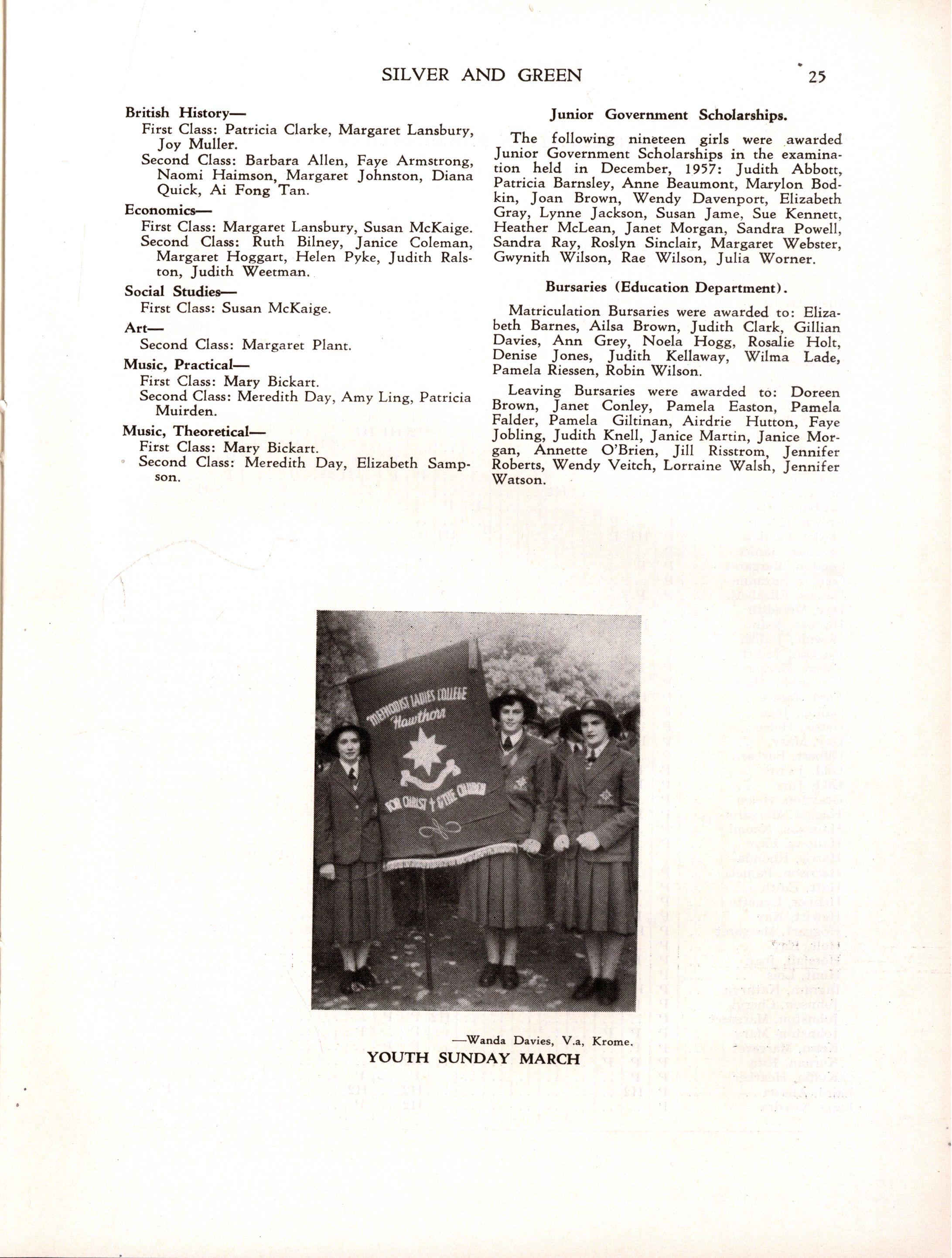
Matriculation Bursaries were awarded to: Eliza beth Barnes, Ailsa Brown, Judith Clark, Gillian Davies, An n Grey, Noela Hogg, Rosalie Holt, Denise Jones, Judith Kellaway, Wilma Lade, Pamela Riessen, Robin Wilson
Leaving Bursaries were awarded to: Doreen Brown, Janet Conley, Pamela Easton, Pamela Falder, Pamela Giltinan, Airdrie Hutton, Faye Jobling, Judith Knell, Janice Martin, Janice Mor gan, Annette O'Brien, Jill Risstrom, Jennifer Roberts, Wendy Veitch, Lorraine Walsh, Jennifer Watson
Passes
Allen, Barbara Armstrong, Faye Arnold, Gayl Arnold, Ruth Badham, Jill Ballantyne, Anne Barbour, Lorraine Barnes, Lenore Barr, Sally Beeton, Helen Bickart, Mary Bilney, Ruth Biss, Helen Brevitt, Mary Brisbane, Elaine Brown, Helen Clarke, Patricia Coleman, Janice Condon, Margaret Connor, Suzanne Davies, Elizabeth Day, Meredith Diprose, Joan Downie, Judith Duggan, Judith Eason, Margaret Fitzgerald, Margaret Ford, Janice . . Gallop, Jean Garde, Helen Gay, Mary Gilbert, Barbara Gild, Judith Gild, June Graydon, Helen Hagger, Margaret Haimson, Naomi Hallows, Faye Harris, Rhonda Harrison, Pamela Hatt, Edith Helmer, Lynette Hewitt, Kay Hoggart, Margaret Holt, Kay Horsfall, Joan Hunt, Lois Ingram, Kathryn Johnson, Cheryl Johnston, Margaret Johnston, Mary Kelso, Margaret Kornan, Rita Kvffin, Heather
Laird, Alison Lang, Sandra

Passes
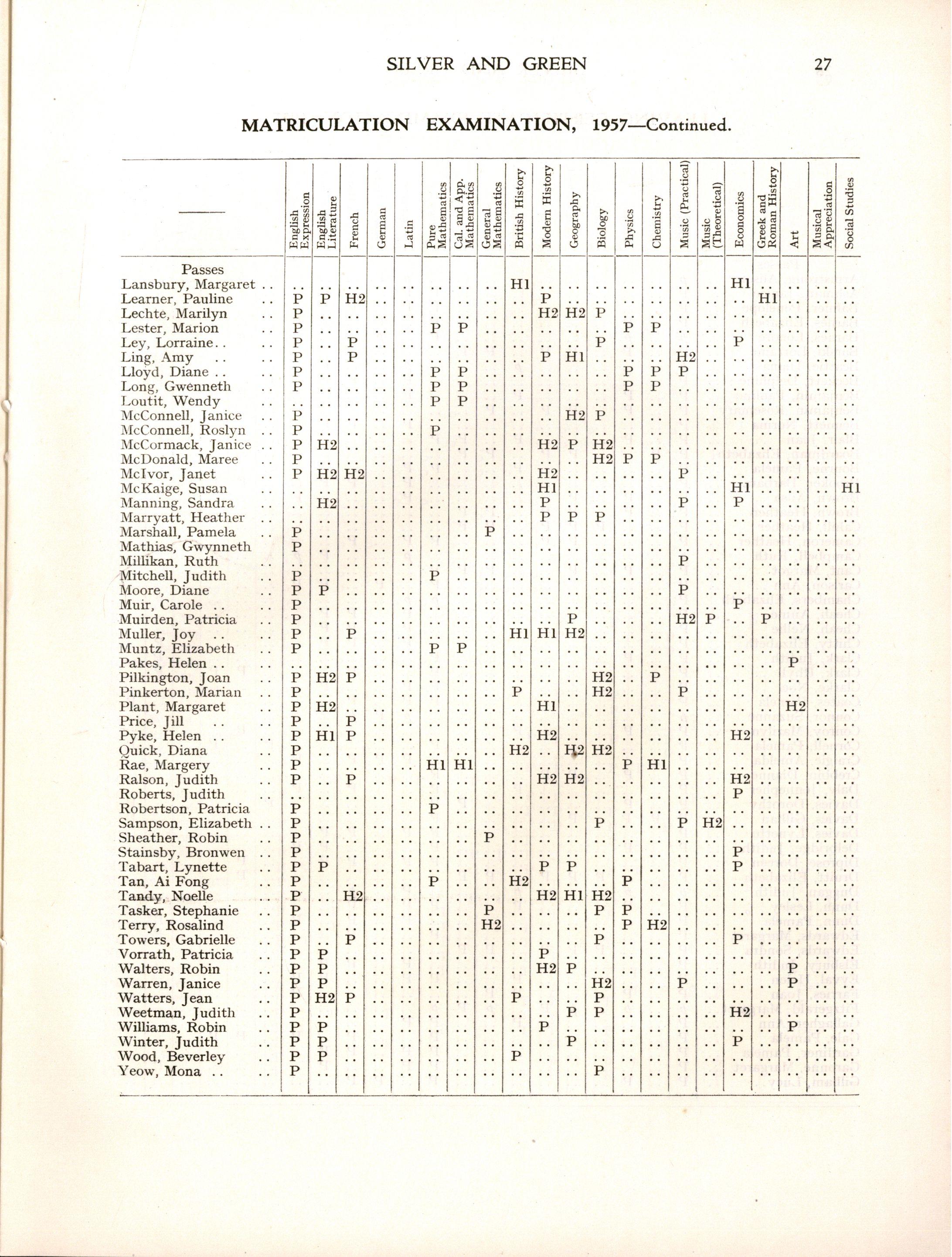
Lansbury, Margaret Learner, Pauline Lechte, Marilyn Lester, Marion Ley, Lorraine Ling, Am y Lloyd, Diane . . Long, Gwenneth Loutit, Wendy McConnell, Janice McConnell, Roslyn McCormack, Janice McDonald, Maree Mclvor, Janet McKaige, Susan Manning, Sandra Marryatt, Heather Marshall, Pamela Mathias, Gwynneth Millikan, Ruth Mitchell, Judith Moore, Diane Muir, Carole . . Muirden, Patricia Muller, Joy Muntz, Elizabeth Pakes, Helen Pilkington, Joan Pinkerton, Marian Plant, Margaret Price, Jill Pyke, Helen . . Ouick, Diana Rae, Margery Ralson, Judith Roberts, Judith Robertson, Patricia Sampson, Elizabeth Sheather, Robin Stainsby, Bronwen Tabart, Lynette Tan, Ai Fong Tandy, Noelle Tasker, Stephanie Terry, Rosalind Towers, Gabrielle Vorrath, Patricia Walters, Robin Warren, Janice Watters, Jean Weetman, Judith Williams, Robin Winter, Judith Wood, Beverley Yeow, Mona
) S!£E O ED, * WW P p p p p p p p p p p p p p p p p p p p p p p p p p p p p p p p p p p p p p p p p p p p p p p
aMc l a.-t: WW (i s H2 P P H2 H2 H2 H2 H2 H2 H I HI H2 P P P H2 P P P
p, w a.a< « •8 S a f
10 o rt "rt S « fei o S o s HI P H2
•c w HI P H2 HI H2 H2 P H2
H2 H2 H2 HI P P H I H I H2 H2 P H2
HI H2 P H2 H2 H2 P H I
H2 P H2 H2 P P P P H2
<D P3OJ I-K oOX J & H I HI P P
H I P HI H2 H2
P H2 H2 H I
H2 H2 P H2 P P H2 P H2 H2 P P
P P H2 P
Armstrong, Alison p Ashman, Janice p Balmer, Penelope p Barnes, Elizabeth p Barnes, Lenore p Barski, Lorraine P Beattie, Diana p Beckett, Delphine P Benjamin, Pauline P Benjamin, Rosemary P Bennett, Norma P Blair, Jean P Boardman, Elizabeth P Bourne, Pamela P Brooker, Barbara P Brown, Ailsa P Brown, Heather P Cahill, Heather . . P Cameron, Heather P Campbell, Ruth p Cant, Margot . . P Carlson, Ann p Chambers, Elizabeth P Cheah, Annie P Cheah, Nellie P Chitty, Elizabeth P Clark, Judith P Clark, Rhyll P Clarke, Noel . . p Coates, Pamela P Connor, Suzanne p Conroy, Marilyn P Cornell, Pamela P Craigie, Amelda P Crebbin, Dianne . . P Daly, Jennepher P Davies, Dorothy P Davies, Gillian . . P Davies, Lynette P Delbridge, Judith P Diprose, Doreen . . P Druitt, Elizabeth P Duggan, Judith p Dunn, Lesley P Dunn, Pamela P Edwards, Margaret P Edwards, Sondra . . P Elsbury, Judith P Eyval, Helen . . P Farries, Joan P Fitzgerald, Margaret p Gallagher, Ann P Gale, Pamela P Gardiner, Pamela P Garonne, Margaret P Gilliam, Lucy. P

Glassford, Helen Gleadell, Julienne Gordon, Patricia Green, Joan Gray, Ann Grocke, Lynette Gunn, Marcia Hall, Jenifer Harvey, Katherine Helmer, Lynette Hill, Kaye Hobbs, Susan Hogg, Noela Holm, Jillian Holmes, Suzanne Holt, Rosalie Hooper, Judith Humphrey, Diane Huntington, Merran Ingram, Kathrynf Jaissle, Elspeth Jame, Rosemary Jenkin, Margaret Johnson, Claire Jones, Denise Jones, Pamela Jones, Wendy Joyce, Robin Kellaway, Judith Kennedy, Jillian Lade, Wilma Lancaster, Margaret Landells, Marlene Langford, Myra Lennox, Jillian Levick, Gillian Little, Josephine McLean, Jeanette McNeill, Rosemary McOmish, Eve Mann, Joyce Maughan, Barbara May, Jocelyn Minchin, Patricia Mitchell, Vivienne Neil, Allison Newstead, Pamela Orton, Janice Pakes, Helen Palmer, Helen Paton, Ruth Peck, Eril Pentland, Anne Pollard, Ruth Prentice, Diane
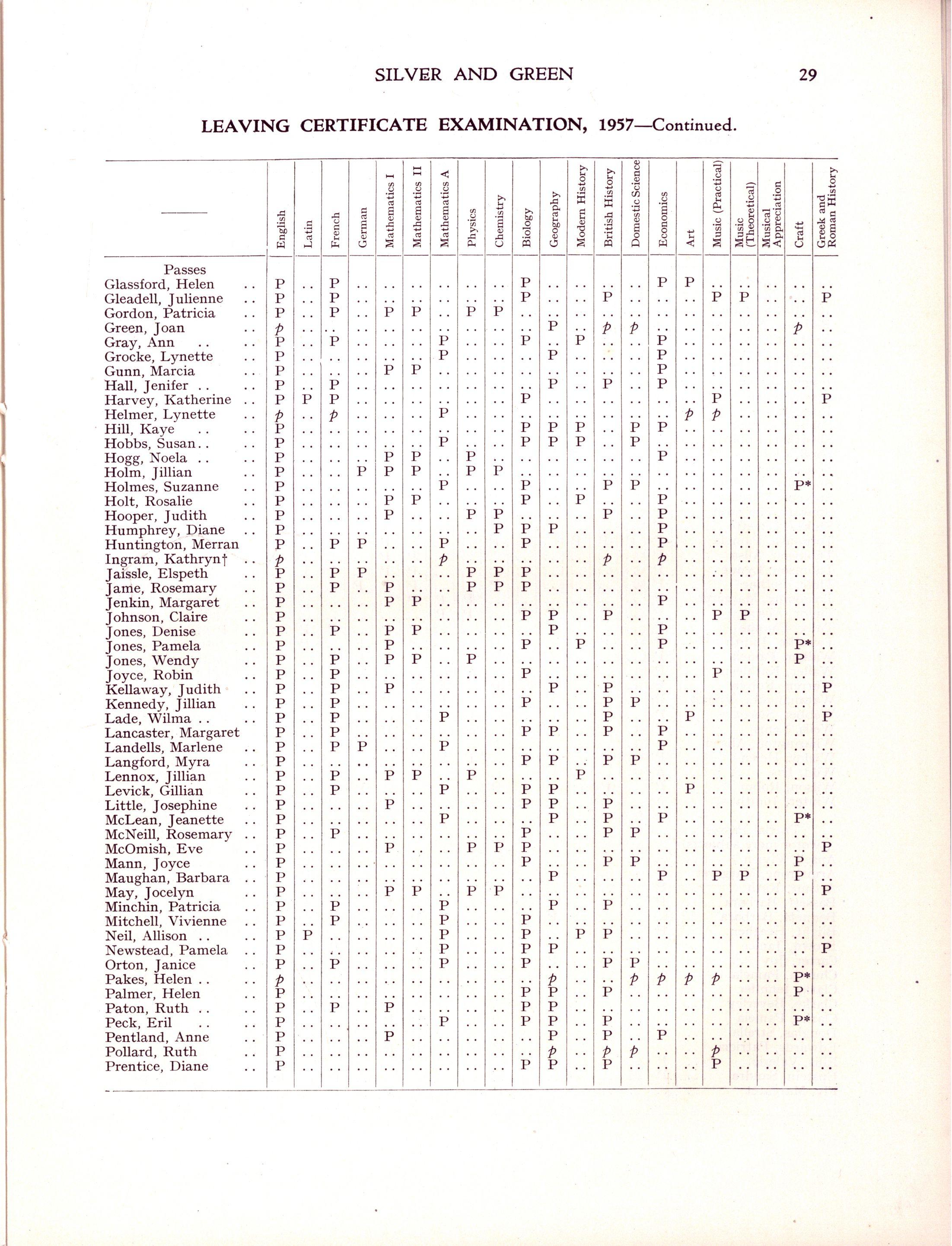
P P P P P P P P P P P P P P P P P P P P P P P P P P P P P P P P P P P P P P P P P I' P P P P P P P P P P P P P
P P P P P P P P P P P P P P P P P P P
P P P P P P P P P
P P P P P P P P P P P P P
P P P P P P
P P P P P P P P P P P P P P P P P P P P P P P P P P
P P P P P P P P P P P P
P P P P P P P P P P P P P P P
P P P P P P P P P P P P P P P
P P P P
Ralton, Margaret Rankin, Susanne Redman, Vivienne Reidy, Sonia Riessen, Pamela Robson, Elspeth Rogers, Helen Rose, Megan Ross, Julie Schafer, Angela Sheather, Robin Sholl, Claire Sims, Carolyn Stainsby, Heather Stevens, Margaret Stewart, Margaret Stokes, Lynette Ternouth, Pamela Thomson, Ailsa Thomson, Lynne Tiffin, Bethne Tregoning, Margaret Tudor, Alison Tully, Pauline Tweddle, Judith Walker, Pamela Waller, Kathleen Warren, Robyn Watanangura, Vijada Webber, Susan Wells, Lenis Wharington, Alison Wigley, Helen Wild, Iris Wilson, Robin Winter, Judith
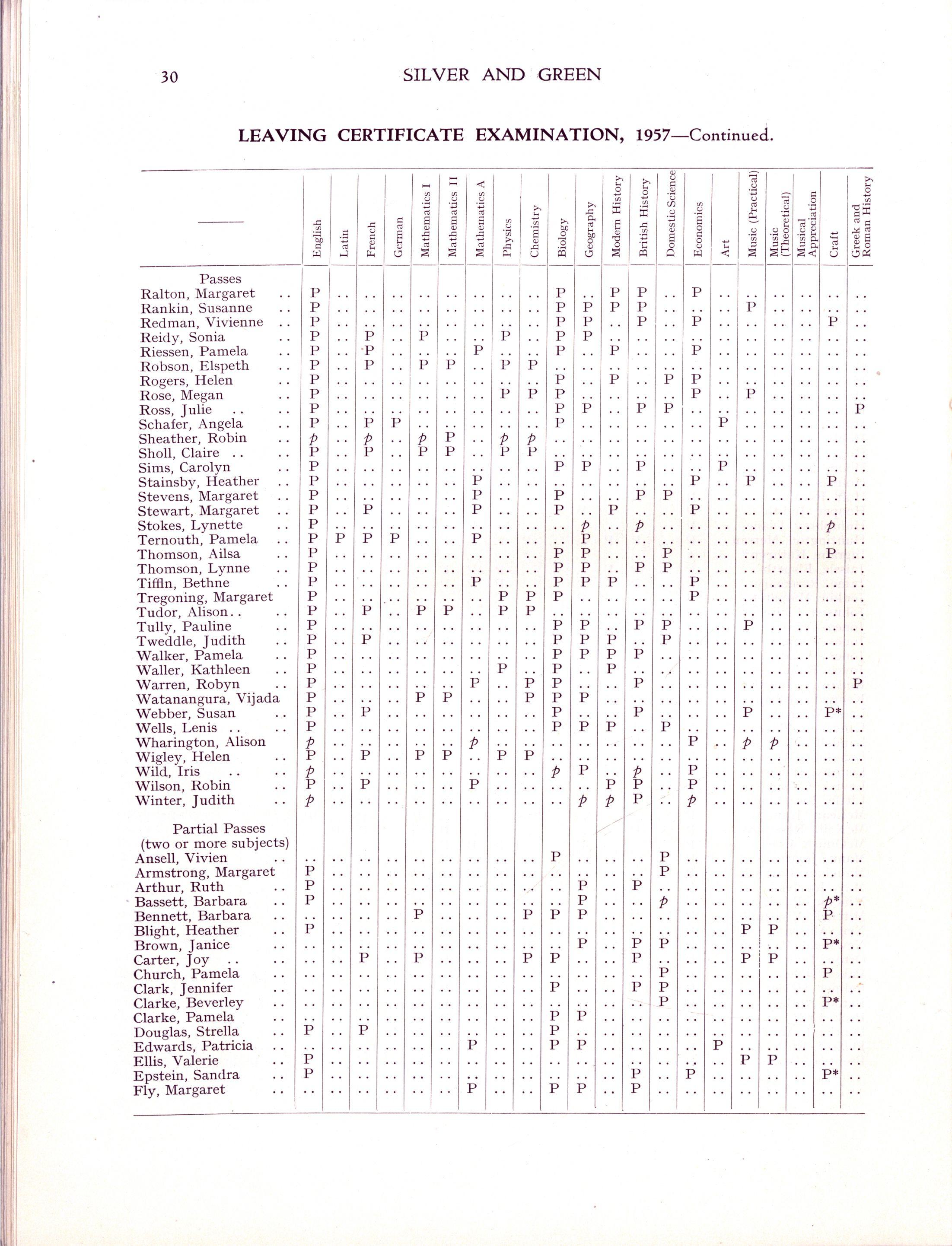
Partial Passes (two or more subjects)
Ansell, Vivien Armstrong, Margaret Arthur, Ruth Bassett, Barbara Bennett, Barbara Blight, Heather Brown, Janice Carter, Joy Church, Pamela Clark, Jennifer Clarke, Beverley Clarke, Pamela Douglas, Strella Edwards, Patricia Ellis, Valerie Epstein, Sandra Fly, Margaret
, 1957—Continued.
| Germa n Mathematic s I Mathematic s I I Mathematic s A j Physic s Chemistr y Biolog y Geograph y Moder n Histor y Britis h Histor y Domesti c Science ) Economic s Musi c (Practical ) Musi c (Theoretical ) Musica l Appreciatio n Craf t
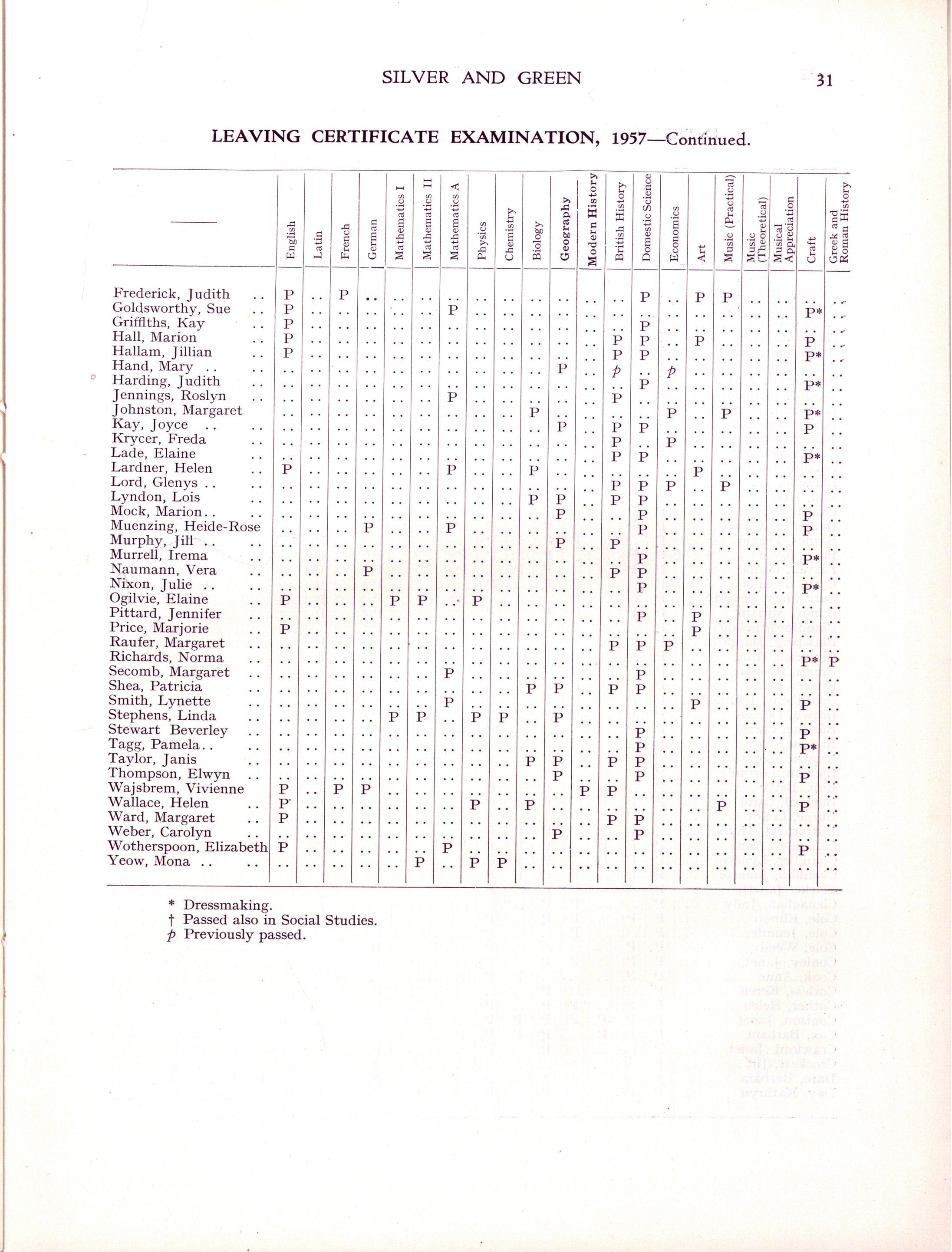
>>
P P P P P
P P P P P p* P P P P
P P P
P P p * P P
Harding, Judith p * fennings, Roslyn P P P P P P P
P P p * P Krycer, Freda Lade, Elaine P p* Lardner, Helen Lord, Glenys P P P P P P Lyndon, Lois Mock, Marion P P P P MuenzingP , Heide-Rose Murphy, Jill . . p P P P Murrell, Irema P P P
Johnston, Margaret Kay, Joyce P P P P P P P
p * Naumann, Vera p P Nixon, Julie p * Ogilvie, Elaine Pittard, Jennifer P P P P P P PriceP , Marjorie Raufer, Margaret P P P P Richards, Norma p * P Secomb, Margaret P P SheaP , Patricia P P P
P Smith, Lynette P P P P P Stephens, Linda P P Stewart Beverley P P P P
P p Tagg* , Pamela Taylor, Janis P P P P
P P Thompson, Elwyn P Wajsbrem, Vivienne Wallace, Helen Ward, Margaret Weber, Carolyn
P p P P P P P P PP Wotherspoon, Elizabeth Yeow, Mona P P P P P P
P P P
* Dressmaking t Passed also in Social Studies p Previously passed
Passes
Adams, Rosemary Anderson, Janet Angus, Wendy Antclifle, Helen Armstrong, Janet Arnold, Diane Ashburner, Janice Axford, Jacqueline Backman, Jennifer Bailey, Julie Baker, Janice Baker, Vivienne Balaam, Glenise Baldwin, Jill Ball, Irene Bandt, Helen Barker, Patricia Barnes, Peggie Barr, Joyce Bartak, Diana Bath, Gwenda Batrouney, Beverly Bilney, Miriam Blandford, Felicity Blassberg, Margaret Blumrich, Ann Braun, Roslyn Brewer, Carol Broadbent, Jennifer Brown, Doreen Browne, Carole Browne, Joan Browne, Lorraine Buchan, Lorraine Bult, Betty Burford, Carol Burge, Lesley Butterfield, Thyra Callander, Anne Chandler, Lynette Chenhall, Janette Clarke, Janette Clenaghan, Judy Cole, Elinore Cole, Jennifer Cole, Wendy Conley, Janet Cook, Anne Corless, Keren Cother, Helen Coulson, Janet Cox, Barbara Crawford, Janet Crockett, Jill Dare, Barbara Day, Kathryn
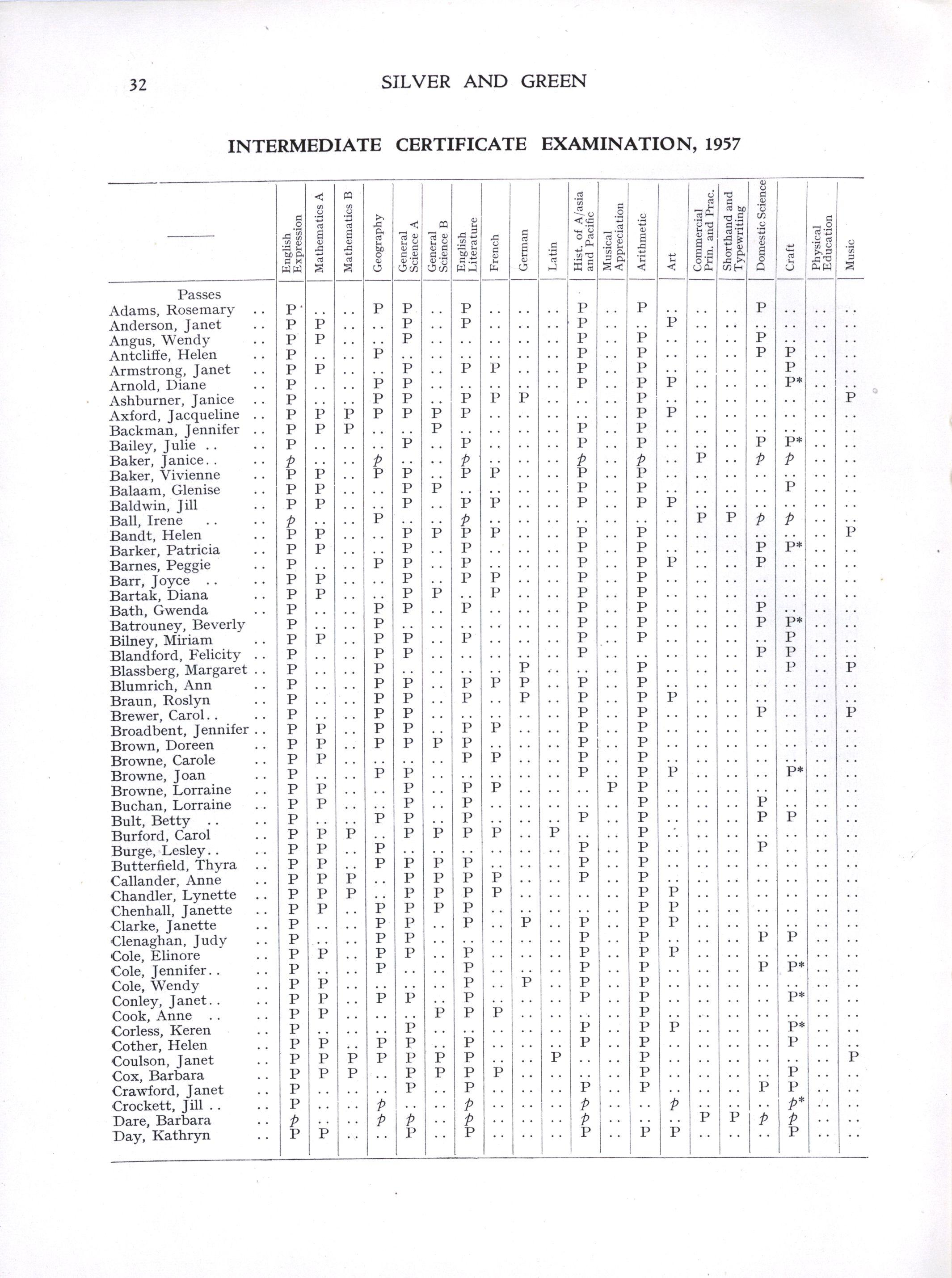
be p a WPx S P ' P P P P P P P P P P P P P P P P P P P P P P P P P P L' P P P P P P P P P P P P P P P P 1' P P P 1' P P P P P P P
P P P P P P P P
P P P P P P P P P P P P P P
P P P P P P P
<"3 fi P P P P P P P P P P P P P P P P P P P P P P P P P P 1' P P P P P P P P P P P P P P P
CO 0> C O co
.£2 03 "So« p p p p p P p p P p p p p p p p p
p p p p p p p p p p p p p p p p p p v p p p p p p p p P P p
p p p
33 S P P P P P P P P P 1' P P P P P P P P P P P P P P P P P P P P P 1' P P P P P P P P P P P
3 & P P P P P P P P P P P P P P P P P P P P P P P P P P P P P P P P P P P P P P P P P P P P P P P P P
a ~ 1.9 °
G.t; 2 "i? O8D. •c cflK H P P P P P P P P P P P P
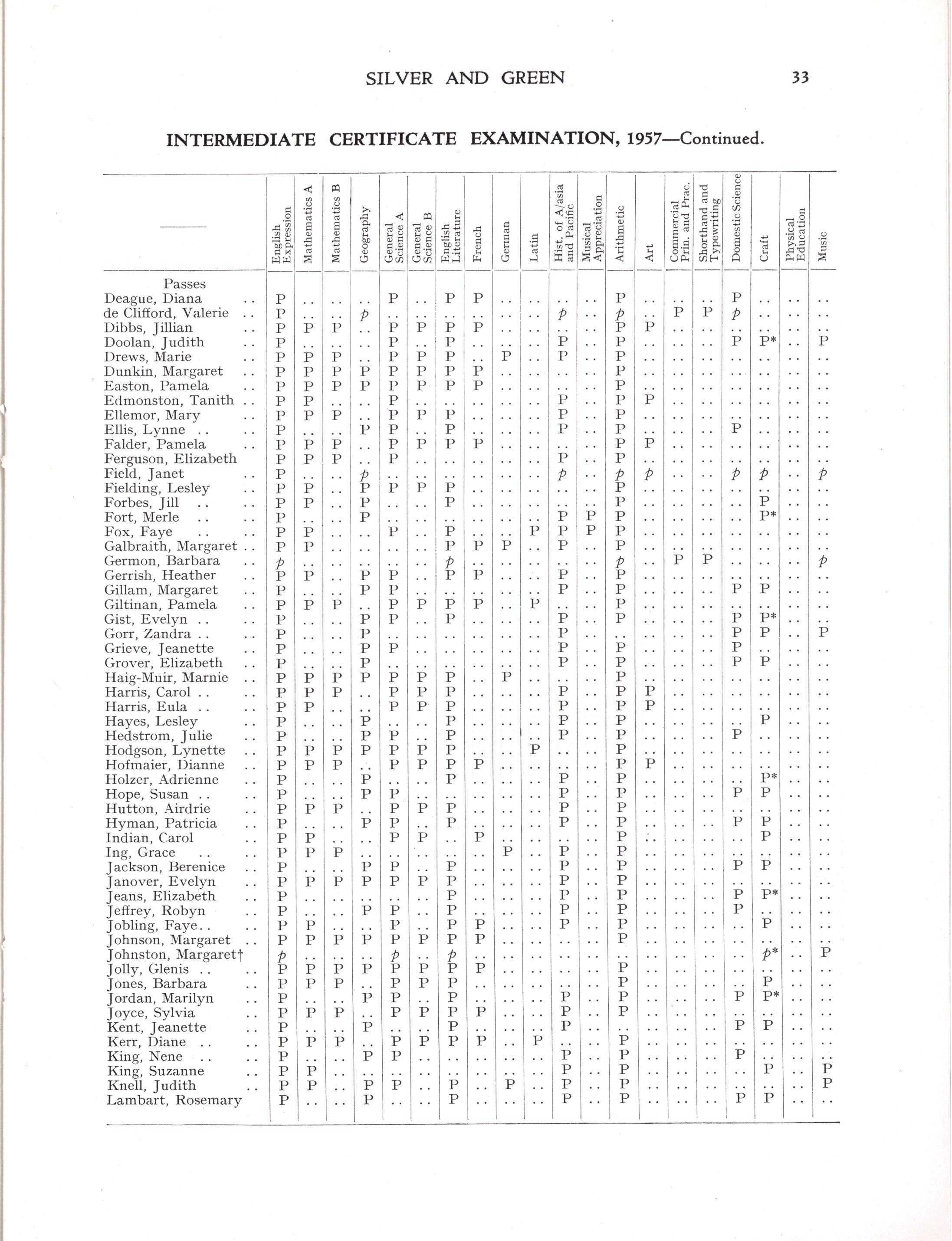
< «
rt O •d o s a o •>> a < m «J: <O « | a >H 0 0 CO be T5.S & a £ E a # «s B g a 0 rt g £ S w•S2 ^ "m ft c (3 u to O s s g.s 8 a bi e Q Jas a v .5 • CM• 1 g ft a ft .a M E . S.S "E 53 c p 1 a a WW s s O O b dm WW w o W Li! BM< < < OA wh w o WW
Deague, Diana de Clifford, Valerie P P P P P i P P P P P P P P Dibbs, Jillian P p p P P P P P P Doolan, Judith Drews, Marie P P P P P P p* P P p p P P P p P P
Dunkin, Margaret P p p P P P P P P
Easton, Pamela P p p P P P P P P
Edmonston, Tanith 1' p P P P P
Ellemor, Mary Ellis, Lynne P p p P P P P P p P P p P P P
Falder, Pamela P p p P P P P P P
Ferguson, Elizabeth P p p P P P
Field, Janet P P P P P P p P
Fielding, Lesley P p P P P P P Forbes, Jill P p P P P p Fort, Merle P P P P P p* Fox, Faye P p P P P P P P Galbraith, Margaret . . P p P P p P P Germon, Barbara P P P P P P Gerrish, Heather P p P P P P P P Gillam, Margaret P P P P P P p Giltinan, Pamela P p P P P P P P Gist, Evelyn p P P P P P P p* Gorr, Zandra P P P P p P Grieve, Jeanette P P P P P P Grover, Elizabeth Haig-Muir, Marnie . . p P P P P p P p p P P P P p P Harris, Carol Harris, Eula p p p p p p P P P P p P P P P P P • Hayes, Lesley p P p P P p Hedstrom, Julie Hodgson, Lynette p P p p P P P P p p P P P P P P Hofmaier, Dianne P p p P P P P P P Holzer, Adrienne Hope, Susan p P p P P p* P P P P P P p Hutton, Airdrie Hyman, Patricia Indian, Carol
p p p p P p P P p P P p P P P p P p P P P P p Ing, Grace P p p p P P Jackson, Berenice p P p p P P P p Janover, Evelyn Jeans, Elizabeth Jeffrey, Robyn
p p p P P P p P P P P P P P p* P P P P P P P
Jobling, Faye P p P P P P P p
Johnson, Margaret P p p P P P P P P Johnston, Margaretf P P P p* P
Jolly, Glenis P p p P P P P P P
Jones, Barbara P p p P P P P p Jordan, Marilyn p P p p P P P p*
Joyce, Sylvia P p p P P P P P P Kent, Jeanette p P p P P p Kerr, Diane P p p P P P P P P
King, Nene P P P P P P
King, Suzanne P p P p P
Knell, Judith P p P P P Pi. . P P P Lambart, Rosemary P P "
P • •1 P P P p
, 1957—Continued.
Englis h Expressio n Mathematic s A Mathematic s B Geograph y Genera l Scienc e A Genera l Scienc e B Englis h Literatur e Frenc h Germa n Lati n Hist , o f A/asi a an d Pacific Musica l Appreciatio n Arithmeti c <H Commercia l Prin an d Prac Shorthan d an d Typewritin g Domesti c Scienc e Craf t Physica l Educatio n Musi c
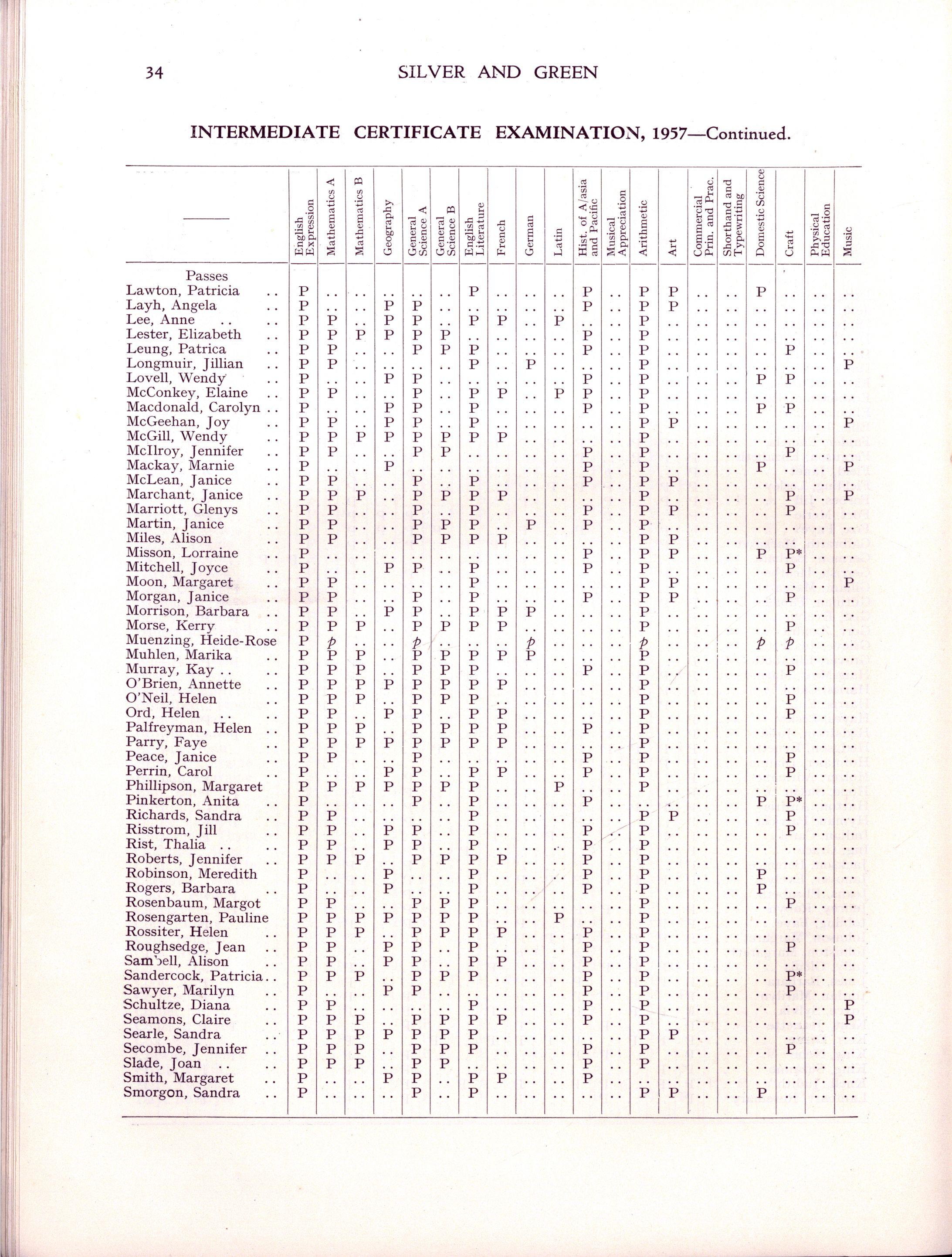
Lawton, Patricia P P P P P P Layh, Angela P P P P P P Lee, Anne P P P P P P P Lester, Elizabeth P P P P P P P P Leung, Patrica P P P P P P P P Longmuir, Jillian P P P P P Lovell, Wendy' P P P P P P McConkey, Elaine P P P P P P P Macdonald, Carolyn P P P P P P P McGeehan, Joy P P P P P P McGill, Wendy P P P P P P P P P Mcllroy, Jennifer P P P P P P P Mackay, Marnie P P P P McLean, Janice P P P P P P Marchant, Janice P P P P P P P P P Marriott, Glenys P P P P P P P Martin, Janice P P P P P P P P Miles, Alison P P P P P P P P Misson, Lorraine P P P P p* Mitchell, Joyce P P P P P P P Moon, Margaret P P P P P Morgan, Janice P P P P P P P P Morrison, Barbara P P P P P P P P Morse, Kerry P P P P P P P P P Muenzing, Heide-Rose P P P P P P Muhlen, Marika P P P P P P P P P Murray, Kay P P P P P P P P P O'Brien, Annette P P P P P P P P P O'Neil, Helen P P P P P P P P Ord, Helen P P P P P P P P Palfreyman, Helen P P P P P P P P P Parry, Faye P P P P P P P P P Peace, Janice P P P P P P Perrin, Carol P P P P P P P P Phillipson, Margaret P P P P P P Pinkerton, Anita P P P P p* Richards, Sandra P P P P P Risstrom, Jill P P P P P P P P Rist, Thalia P P P P P P P Roberts, Jennifer P P P P P P Robinson, Meredith P P P P P P Rogers, Barbara P P P P P P Rosenbaum, Margot P P P P P P P Rosengarten, Pauline P P P P P P P P Rossiter, Helen P P P P P P P P Roughsedge, Jean P P P P P P P P Sambell, Alison P P P P P P P Sandercock, Patricia P P P P P P P P p* Sawyer, Marilyn P P P P P P Schultze, Diana P P P P P P Seamons, Claire P P P P P P P P P Searle, Sandra P P P P P P P P Secombe, Jennifer P P P P P P P P P Slade, Joan P P P P P P P Smith, Margaret P P P P P P Smorgon, Sandra P P P P P P
h Expressio n Mathematic
A Mathematic
B Geograph
Stebbins, Yvonne Stengierska, Anna Sterling, Leonie Stevens, Patricia Stocks, Susan Sword, Joan Taggart, Carol Tan, Daisy Tandy, Carol Taylor, Lesley Taylor, Gail Thomas, Helen Thompson, Denise .' Thompson, Jennifer . . Tilbrook, Penelope Tinsley, Cheron Turner, Diane Turner, Genevieve Uhl, Jeannette Veitch, 'Wendy Vincent, Jocelyn Walsh, Diane Walsh, Lorraine Ward, Carolyn Watson, Jenifer Watters, Rosemary Waycott, Edith Wellman, Jennifer Whiting, Carolyn Whyte, Judith Wilkins, Kaye Williams, Beverley Williams, Faye Williams, Loris Williamson, Margaret Willox, Barbara Woolcock, Patricia Wortley, Rosslyn Yelland, Judith Yen, Noala Yeow, Betty
Partial Passes (4 or more subjects)
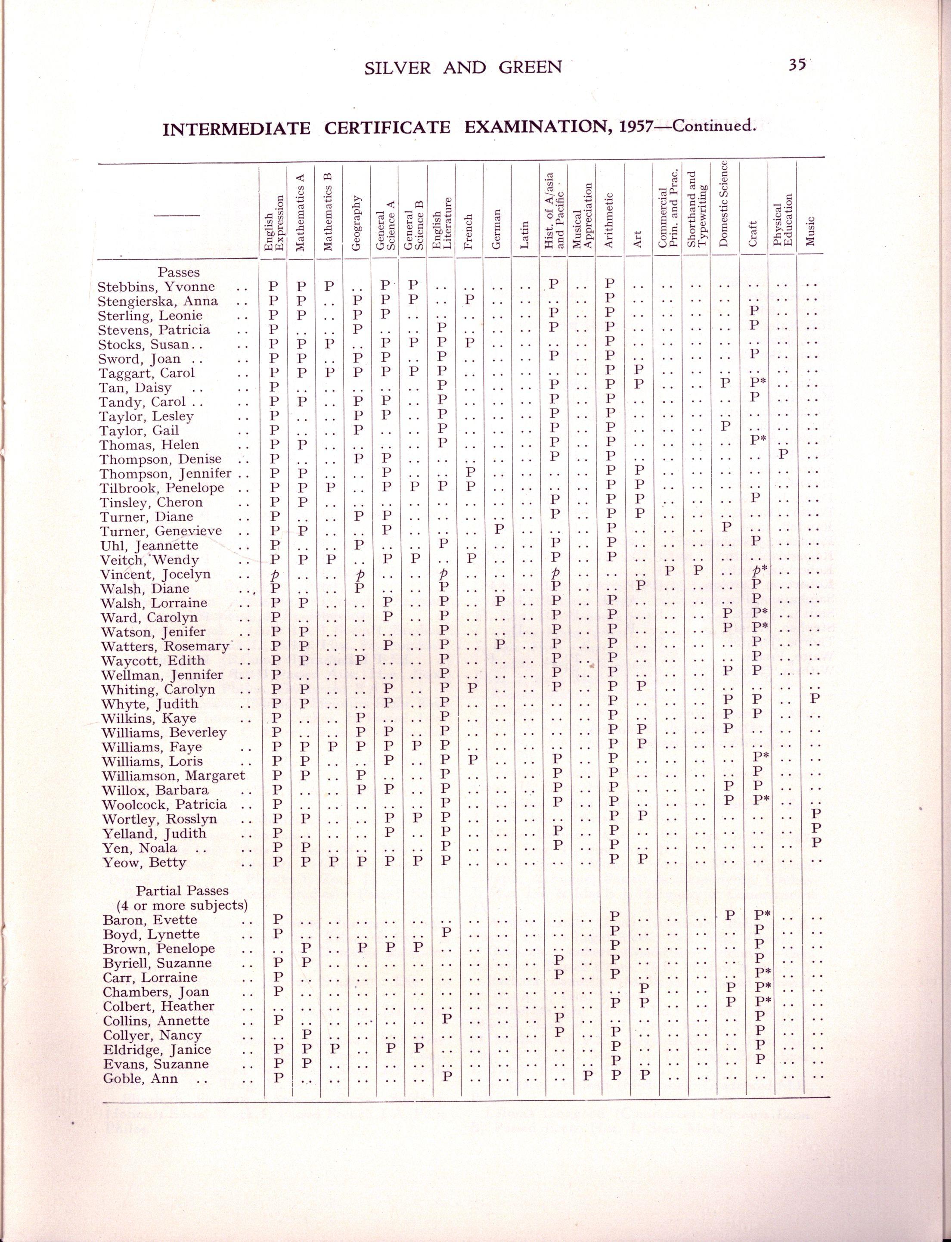
Baron, Evette Boyd, Lynette Brown, Penelope Byriell, Suzanne Carr, Lorraine Chambers, Joan Colbert, Heather Collins, Annette Collyer, Nancy Eldridge, Janice Evans, Suzanne Goble, Ann
Genera
Scienc
Genera
1957—Continued.
B Englis h Literatur e Frenc h Germa n Lati n Hist , o f A/asi a an d Pacifi cMusica l Appreciatio n Arithmeti c < Commercia l Prin an d Prac Shorthan d an d Typewritin g Domesti c Scienc e Craf t Physica l Educatio n
Scienc
P P P P P P P P P P P P P P P P P P P P P P P P P P P P P P P P P P P P P P P P P P P P P P P P P P P P P P P P P P P P P P P P P P P P P P P P P P P P P P P P P P P p* P P P P P P P P P P P P P P P P P P P P P P P P P P P P P P P P P P P P P P P P P P P P P P P P P P P P P P P P P P p p* P P P P P P P P P P P P P P P P P P P P p* P P P P P P p* P P P P P P P P P P P P P P P P P P P P P P P P P P P P P P P P P P P P P P P P P P P P P P P P P P P P P P P P P P P P P P P P P P P P P P P P P P P P P P P P P P P P P P* P P P P P P P P P P P P P P P P P P P P P P P P P P
P P P p* P P P P P P P P P P P P P P P P P P P P P p* P P P p* P P P P P P P P P P P P P P P P P P P P 1 P P P P
INTERMEDIATE CERTIFICATE EXAMINATION , 1957—Continued. < m 2 • o a d rt « ^ < P3 <v H rt -7 O < tC c o aJ k ' o T3
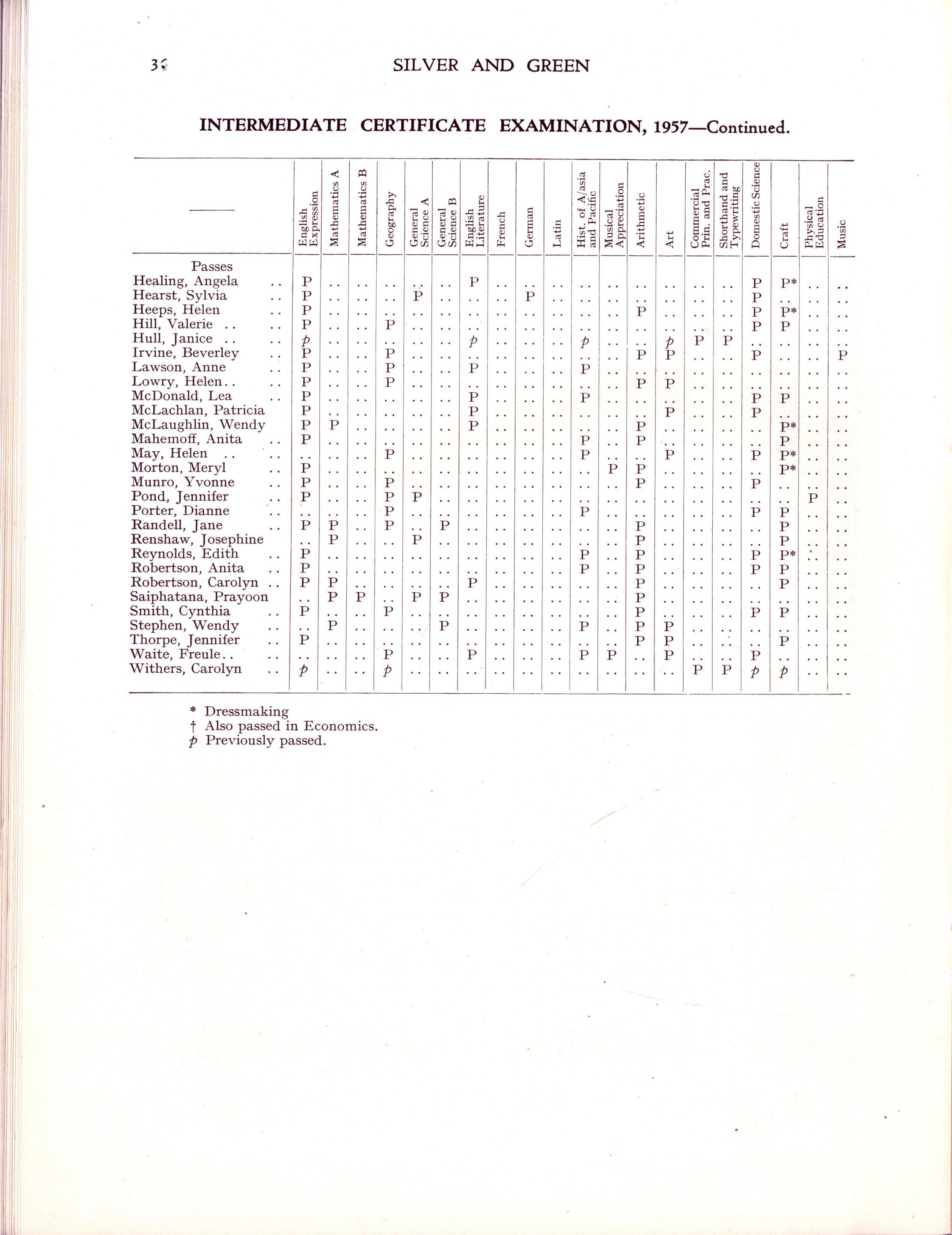
= 03 M) X5.S c '3 c l H 2 J4> : a o OH rt H bo "re ® a> C a? C •sS « (H I 8 i 1™ •5 s 8 « 03 ac O fl X WW « S o3 s o aj o C ^ 4) 3 Otn H v Hha.-S l §M w o O a3 •J iSS s a 'in < < h 0 &J3 Kcfih B00 2 u JS'O fd 1
Passes
Healing, Angela P P P p* Hearst, Sylvia P p P P Heeps, Helen P P | • • P p* Hill, Valerie P P P P Hull, Janice P P P P Irvine, Beverley P p P P P Lawson, Anne P p P P Lowry, Helen P p P McDonald, Lea P P p P P McLachlan, Patricia P P P McLaughlin, Wendy P P P p * Mahemoff, Anita P p P P May, Helen p p P p * Morton, Meryl P P p * Munro, Yvonne P p P P Pond, Jennifer P p Porter, Dianne p p P P Randell, Jane P P p P P Renshaw, Josephine P P P Reynolds, Edith P p P P p # Robertson, Anita P p P P P Robertson, Carolyn P P P P Saiphatana, Prayoon P P Smith, Cynthia P p P P P Stephen, Wendy P p P P Thorpe, Jennifer P P P P Waite, Freule. . p P p p P P Withers, Carolyn P " p p P P P
* Dressmaking f Also passed in Economics. p Previously passed
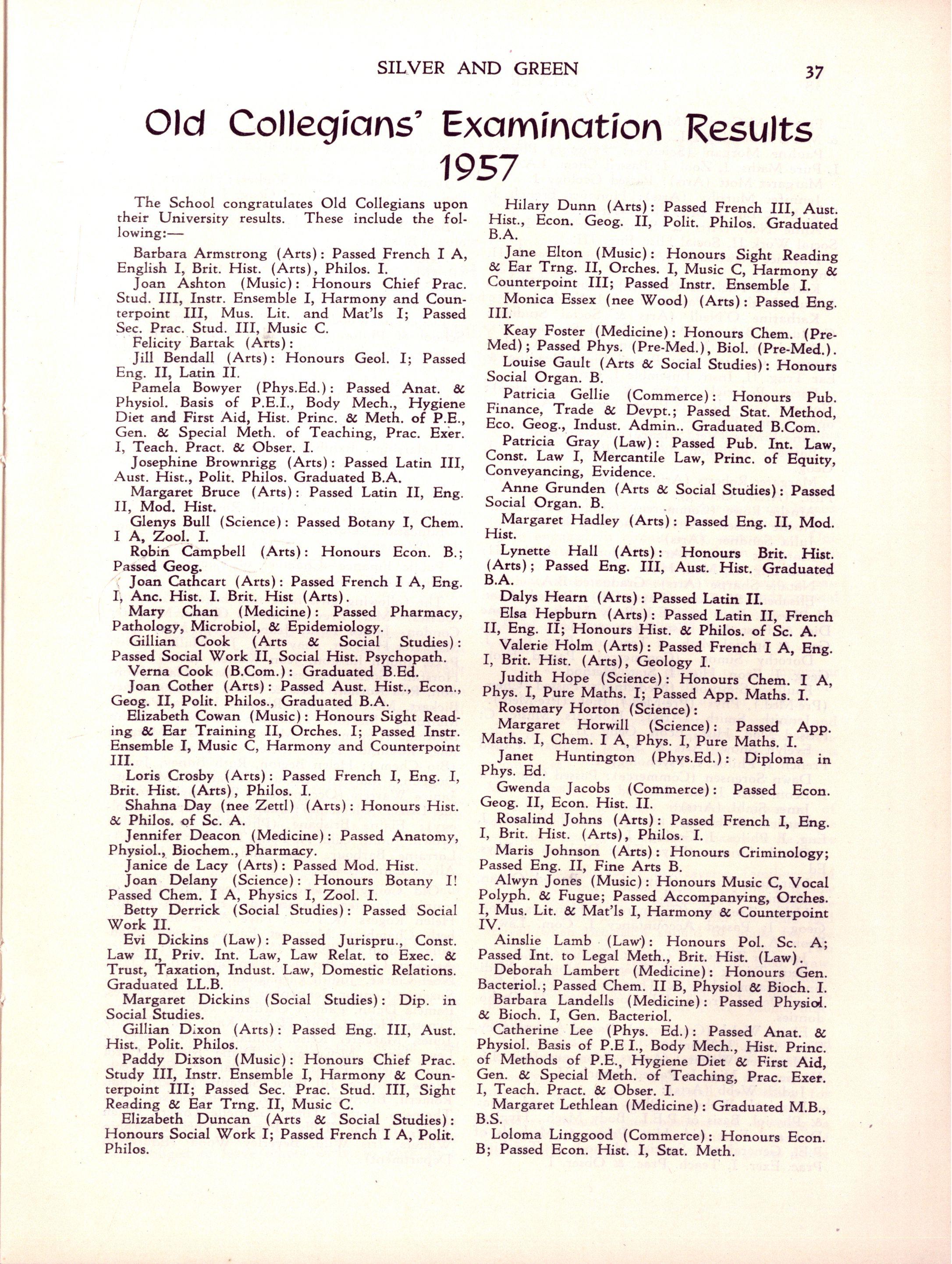
The School congratulates Old Collegians upon their University results These include the fol lowing:—
Barbara Armstrong (Arts): Passed French I A , English I, Brit Hist (Arts), Philos I
Joan Ashton (Music): Honours Chief Prac Stud Ill , Instr Ensemble I, Harmony and Coun terpoint III, Mus Lit and Mat'ls I ; Passed Sec. Prac. Stud. Ill , Music C.
Felicity Bartak (Arts):
Jill Bendall (Arts): Honours Geol I; Passed Eng II, Latin II
Pamela Bowyer (Phys.Ed.): Passed Anat 8c Physiol. Basis of P.E.I., Body Mech., Hygiene Diet and First Aid, Hist Princ 8C Meth of P.E., Gen Be Special Meth of Teaching, Prac Exer I, Teach Pract 8C Obser I
Josephine Brownrigg (Arts): Passed Latin III, Aust Hist., Polit Philos Graduated B.A
Margaret Bruce (Arts): Passed Latin II, Eng. II, Mod Hist
Glenys Bull (Science): Passed Botany I, Chem I A , Zool I
Robin Campbell (Arts): Honours Econ B.; Passed Geog.
Joan Cathcart (Arts): Passed French I A , Eng I, Anc Hist I Brit Hist (Arts)
Mary Chan (Medicine): Passed Pharmacy, Pathology, Microbiol, 8C Epidemiology
Gillian Cook (Arts 8c Social Studies): Passed Social Work II, Social Hist Psychopath
Verna Cook (B.Com.): Graduated B.Ed
Joan Cother (Arts): Passed Aust Hist., Econ., Geog. II, Polit. Philos., Graduated B.A.
Elizabeth Cowan (Music): Honours Sight Read ing &C Ear Training II, Orches I; Passed Instr Ensemble I, Music C, Harmony and Counterpoint III,
Loris Crosby (Arts): Passed French I, Eng I, Brit Hist (Arts), Philos I
Shahna Day (nee Zettl) (Arts): Honours Hist. 8c Philos of Sc A
Jennifer Deacon (Medicine): Passed Anatomy, Physiol., Biochem., Pharmacy
Janice de Lacy (Arts): Passed Mod. Hist.
Joan Delany (Science): Honours Botany I! Passed Chem I A , Physics I, Zool I
Betty Derrick (Social Studies): Passed Social Work II
Evi Dickins (Law): Passed Jurispru., Const. Law II, Priv Int Law, Law Relat to Exec 8c Trust, Taxation, Indust Law, Domestic Relations Graduated LL.B
Margaret Dickins (Social Studies): Dip in Social Studies.
Gillian Dixon (Arts): Passed Eng Ill , Aust Hist Polit Philos
Paddy Dixson (Music): Honours Chief Prac Study III, Instr Ensemble I, Harmony 8C Coun terpoint III ; Passed Sec Prac Stud Ill , Sight Reading 8C Ear Trng. II, Music C.
Elizabeth Duncan (Arts 8C Social Studies): Honours Social Work I; Passed French I A , Polit Philos
Hilary Dunn (Arts): Passed French III, Aust Hist., Econ Geog II, Polit Philos Graduated B.A.
Jane Elton (Music): Honours Sight Reading 8c Ear Trng II, Orches I, Music C, Harmony 8c Counterpoint III ; Passed Instr Ensemble I ^Monic a Essex (nee Wood ) (Arts): Passed Eng
Keay Foster (Medicine): Honours Chem (Pre Med) ; Passed Phys (Pre-Med.), Biol (Pre-Med.)
Louise Gault (Arts 8c Social Studies): Honours Social Organ B
Patricia Gellie (Commerce): Honours Pub Finance, Trade 8C Devpt.; Passed Stat Method, Eco. Geog., Indust. Admin.. Graduated B.Com.
Patricia Gray (Law): Passed Pub Int Law, Const Law I, Mercantile Law, Princ of Equity, Conveyancing, Evidence
Anne Grunden (Arts 8c Social Studies): Passed Social Organ B
Margaret Hadley (Arts): Passed Eng II, Mod Hist.
Lynette Hall (Arts): Honours Brit Hist (Arts); Passed Eng Ill , Aust Hist Graduated B.A
Dalys Hearn (Arts): Passed Latin II
Elsa Hepburn (Arts): Passed Latin II, French II, Eng II; Honours Hist 8c Philos of Sc A
Valerie Holm (Arts): Passed French I A , Eng. I, Brit Hist (Arts), Geology I
Judith Hope (Science): Honours Chem. I A , Phys I, Pure Maths I; Passed App Maths I Rosemary Horton (Science): Margaret Horwill (Science): Passed Ap p Maths I, Chem I A, Phys I, Pure Maths I Janet Huntington (Phys.Ed.): Diploma in Phys Ed
Gwenda Jacobs (Commerce): Passed Econ Geog II, Econ Hist II
Rosalind Johns (Arts): Passed French I, Eng I, Brit Hist (Arts), Philos I
Maris Johnson (Arts): Honours Criminology; Passed Eng II, Fine Arts B
Alwyn Jones (Music): Honours Music C, Vocal Polyph 8C Fugue; Passed Accompanying, Orches I^Mus Lit 8C Mat'ls I, Harmony 8C Counterpoint
Ainslie Lamb (Law): Honours Pol Sc A ; Passed Int to Legal Meth., Brit Hist (Law)
Deborah Lambert (Medicine): Honours Gen. Bacterid.; Passed Chem II B, Physiol 8C Bioch I
Barbara Landells (Medicine): Passed Physiol 8C Bioch. I, Gen. Bacteriol.
Catherine Lee (Phys Ed.): Passed Anat & Physiol Basis of P.E I., Body Mech., Hist Princ of Methods of P.E., Hygiene Diet 8C First Aid, Gen 8C Special Meth of Teaching, Prac Exer I, Teach Pract 8C Obser I
Margaret Lethlean (Medicine): Graduated M.B , B.S
Loloma Linggood (Commerce): Honours Econ. B; Passed Econ Hist I, Stat Meth
Frances McCarthy (Music): Honours Mus. Lit. Si Mat'ls I, Singing III
Pauline Morgan (Science): Honours Physics I, Pure Maths I, Zool I; Passed Chem I.A
Margaret Mott (Arts): Passed Geology I.
Jennifer Murphy (Arts): Honours French I, Eng L Si Lit I, Brit Hist (Arts)
Anne Neil (Arts & Social Studies): Passed Social Work II, Social Hist Eng FlorencIII e Newbound (Arts): Passed French II,
El Katherine Nicholls (Science): Honours Physics I, Pure Maths I; Passed Chem I A , Zool I
Katharine O'Neill (Arts Sc Social Studies): Graduated B.A SC Dip in Social Studies
Wendy Orton (Music) : Honours Music C, Har mony SC Counterpoint; Passed Sight Reading SC Ear Trng II, Instr Ensemble I, Orches I
Patsy Pederick (Arts St Social Studies): Honours Psychology I; Passed French I A , Philos ophy I, Soc Biol
Jane Pincus (Vet Science) : Passed Zool I
Barbara Rautman (Arts): Passed Philos I, Geog
Margaret Roberts (Arts): Passed French I, Brit Hist. (Arts), Geology.
Ainslie Rowe (Commerce) Graduated B.Com
Noelle Russell (Arts): Graduated B.A
Julia Sandner (Arts):
Margaret Scott (Arts): Honours Latin II; Passed Eng II, Mod Hist
Natalie Sharpe (Arts) : Graduated B.A
Elisabeth Shiffron (Phys. Ed.): Passed Anat. SC Physiol Basis of P.E.I, Body Mech., Hygiene
Diet Sc First Aid, Hist Princ SC Mech of P.E., Gen SC Special Meth of Teaching, Prac Exer I
Dorothy Simon (Commerce): Passed Econ. Geog I, Econ Hist I, Stat Method
Pauline Simpson (Medicine): Passed Chem (Pre-Med.), Phys (Pre-Med.), Biol (Pre-Med.)
Jennith Smith (Arts): Honours Music C ; Passed Mod. Hist., Econ. Geog. II.
Evelyn Snow (Arts Sc Social Studies): Passed French I, Philos. I, Psychology I.
Dawn Sorensen (Commerce): Passed Com Law I, Econ Hist I, Stat Method
Janet Stahl (Arts):
Patricia Stubbings (Arts): Passed French I, Eng. I, Philos. I, Geology DavidI. a Switson (Phys Ed.): Diploma in Phys Ed
Margaret Tharle (Phys Ed.): Passed Organ Sc Admin, of Phys Ed
Helen Tregear (Commerce): Honours Econ Geog I; Passed Accountancy I, Com Law I, Econ A
Jennifer Treyvaud (Arts): Graduated B.A
Betty Tsiang (Dental Science): Honours Medi cine, Pharmacology Sc Therapeutics; Passed Sur gery, Dental Prosth Ill , Cons Dent II, Ortho donties.
Elaine Walsh (Commerce): Passed Accountancy, Econ. Geog. I, Econ. A.
Margaret Walters (Arts): Honours Eng. Lit. II, General Hist I; Passed French II
Judith Webb (Arts): Elizabeth Webster (Phys Ed.): Passed Anat SC Physiol Basis of P.E.I., Body Mech., Hygiene Diet and First Aid, Hist. Princ. Sc Methods of P.E., General and Special Methods of Teaching, Prac' Exer I, Teach Prac Sc Obser I
Jean Webster (Arts): Honours French Lang &c Lit I; Passed Russian II, Criminology
Rosslyn Webster (Arts): Passed French I, Eng I, Philos I
Joan Weetman (Social Studies): Honours Social Biol., Psychology I, Econ. Geog. I; Passed Econ. A
Beryl Wild (Medicine): Passed Anatomy, Physi ology, Biochem
Helen Williams (Medicine): Honours Biol (Pre-Med.); Passed Chem. (Pre-Med.), Physics (Pre-Med.)
Jeanne Wilson (Medicine): Passed Biochem Jacqueline Woo d (Arts): Honours Part II F.E., School of Philosophy Graduated B.A (Hons.)
Jean Woodfull (Phys. Ed.): Passed Body Mechs., Hist Princ SC Method of P.E., General SC Special Meth of Teaching, Prac Exer I, Teach Prac SC Obser I Mimi Yees (B.A.): Graduated Dip.Ed
Scholarships, Exhibitions and Prizes Awarded, November, 1957.
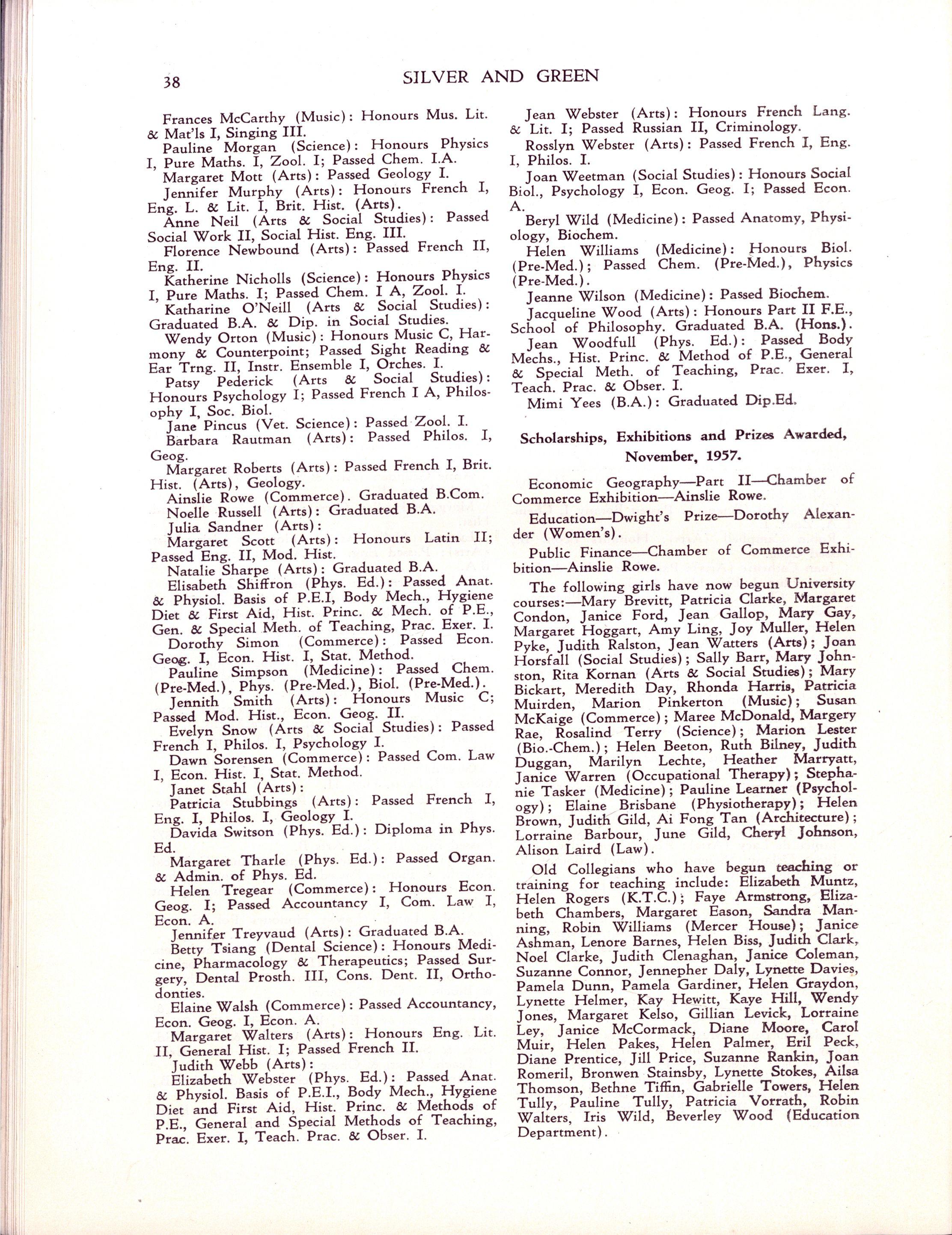
Economic Geography—Part II—Chamber of Commerce Exhibition—Ainslie Rowe Education—Dwight's Prize—Dorothy Alexan der (Women's)
Public Finance—Chamber of Commerce Exhi bition—Ainslie Rowe
The following girls have now begun University courses:—Mary Brevitt, Patricia Clarke, Margaret Condon, Janice Ford, Jean Gallop, Mary Gay, Margaret Hoggart, Amy Ling, Joy Muller, Helen Pyke, Judith Ralston, Jean Watters (Arts); Joan Horsfall (Social Studies); Sally Barr, Mary John ston, Rita Kornan (Arts SC Social Studies); Mary Bickart, Meredith Day, Rhonda Harris, Patricia Muirden, Marion Pinkerton (Music); Susan McKaige (Commerce); Maree McDonald, Margery Rae, Rosalind Terry (Science); Marion Lester (Bio.-Chem.); Helen Beeton, Ruth Bilney, Judith Duggan, Marilyn Lechte, Heather Marryatt, Janice Warren (Occupational Therapy); Stepha nie Tasker (Medicine); Pauline Learner (Psychol ogy) ; Elaine Brisbane (Physiotherapy); Helen Brown, Judith Gild, Ai Fong Tan (Architecture); Lorraine Barbour, June Gild, Cheryl Johnson, Alison Laird (Law)
Old Collegians who have begun teaching or training for teaching include: Elizabeth Muntz, Helen Rogers (K.T.C.); Faye Armstrong, Eliza beth Chambers, Margaret Eason, Sandra Man ning, Robin Williams (Mercer House); Janice Ashman, Lenore Barnes, Helen Biss, Judith Clark, Noel Clarke, Judith Clenaghan, Janice Coleman, Suzanne Connor, Jennepher Daly, Lynette Davies, Pamela Dunn, Pamela Gardiner, Helen Graydon, Lynette Helmer, Kay Hewitt, Kaye Hill, Wendy Jones, Margaret Kelso, Gillian Levick, Lorraine Ley, Janice McCormack, Diane Moore, Carol Muir, Helen Pakes, Helen Palmer, Eril Peck, Diane Prentice, Jill Price, Suzanne Rankin, Joan Romeril, Bronwen Stainsby, Lynette Stokes, Ailsa Thomson, Bethne Tiffin, Gabrielle Towers, Helen Tully, Pauline Tully, Patricia Vorrath, Robin Walters, Iris Wild, Beverley Woo d (Education Department)
during the regime of Dr. W . H. Fifchett 1882-1928, ASSEMBLY HALL, FRIDAY , 28th MARCH , 1958, at 2 p.m
"Conference, 1879" (Presented by Matriculation girls.)
Rev. W . H. Fitchett Jillian Holm President of Conference Elaine Lade
Other Speakers: Gillian Davies, Pamela Riessen, Margaret Raufer, Angela Schafer, Gwenneth Long, Janice Orton, Jennifer Clark
" A Home in Brisbane, 1883"
Mrs. Fancourt Robyn Warren Carrie (a maid) Lenis Wells Mrs Hansen (mother of Mrs Fancourt) Lois Lyndon
Mrs Tresize Elizabeth Druitt Mrs Hamilton Rosemary Benjamin Amy Fancourt (an M.L.C girl) Vivienne Mitchell
Commentators
Lynn:
Lynette Tabart and Margaret Lancaster
Girls: To-day we are to learn something about the early history of our great School, and of its founder, Dr Fitchett W e are privileged to have with us some Old Collegians, who have kindly agreed to tell us about their school days. I am sure we shall listen with the deepest interest, and feel prouder still of the School spirit which has been handed down to us and which we, in our turn, shall pass on to others
In the year 1842, when Queen Victoria sat upon the throne of England, a little boy was born to the wife of an ailing schoolmaster at Grantham
Seven years later, this little boy sailed with his parents for the young colony of Victoria The little boy's name was William Henry Fitchett, a name closely associated with this School, and honoured here and abroad as that of a distin guished preacher, author, and educationist
Shortly after their arrival at Geelong, the father died, with the result that William Henry Fitchett was obliged to leave school early, to work in a
local stone quarry But he had a consuming thirst for knowledge, and taught himself the rudiments of Latin, while he pushed his truck along the rails.
After some time spent in jackerooing in Queens land, he entered the Methodist ministry, and, while engaged in circuit work, carried out Uni versity studies, and graduated in Arts, with Honours Education meant a great deal to Dr Fitchett, who was a man of vision, with a pas sionate desire to provide adequate educational facilities for girls He it was who conceived the idea of a Methodist Ladies' College.
Now we shall have a glimpse of an important session of Conference in the year 1879 Con ference is reassembling after a brief interval Ministers and Laymen enter informally and chat in groups until the entrance of the Presi dent After he has taken his seat business commences
Mr Fitchett:
Mr President, surely this vexed question of superior education for the daughters of our people (Voice: Bee in his bonnet—)can now be more actively pursued.
It is not my wish to traverse familiar and unhappy ground Suffice it is to say that it is now seven years—seven years—since Conference passed a resolution declaring that the time had arrived when provision should be made for the superior education of our daughters Two years later, another resolution was adopted, draw ing the attention of its Committee of Education to the matter Two pious resolutions—but, alas, they bore no fruit—in seven years (Some mur muring )
T o me this is a matter of deepest import, and I crave your indulgence if I speak with passion
Last year, in 1878, I again raised the question, and my resolution was carried, providing for a number of leading ministers and laymen to consider seriously this business of creating a College which would do for young womanhood what Wesley College and Scotch College are doing
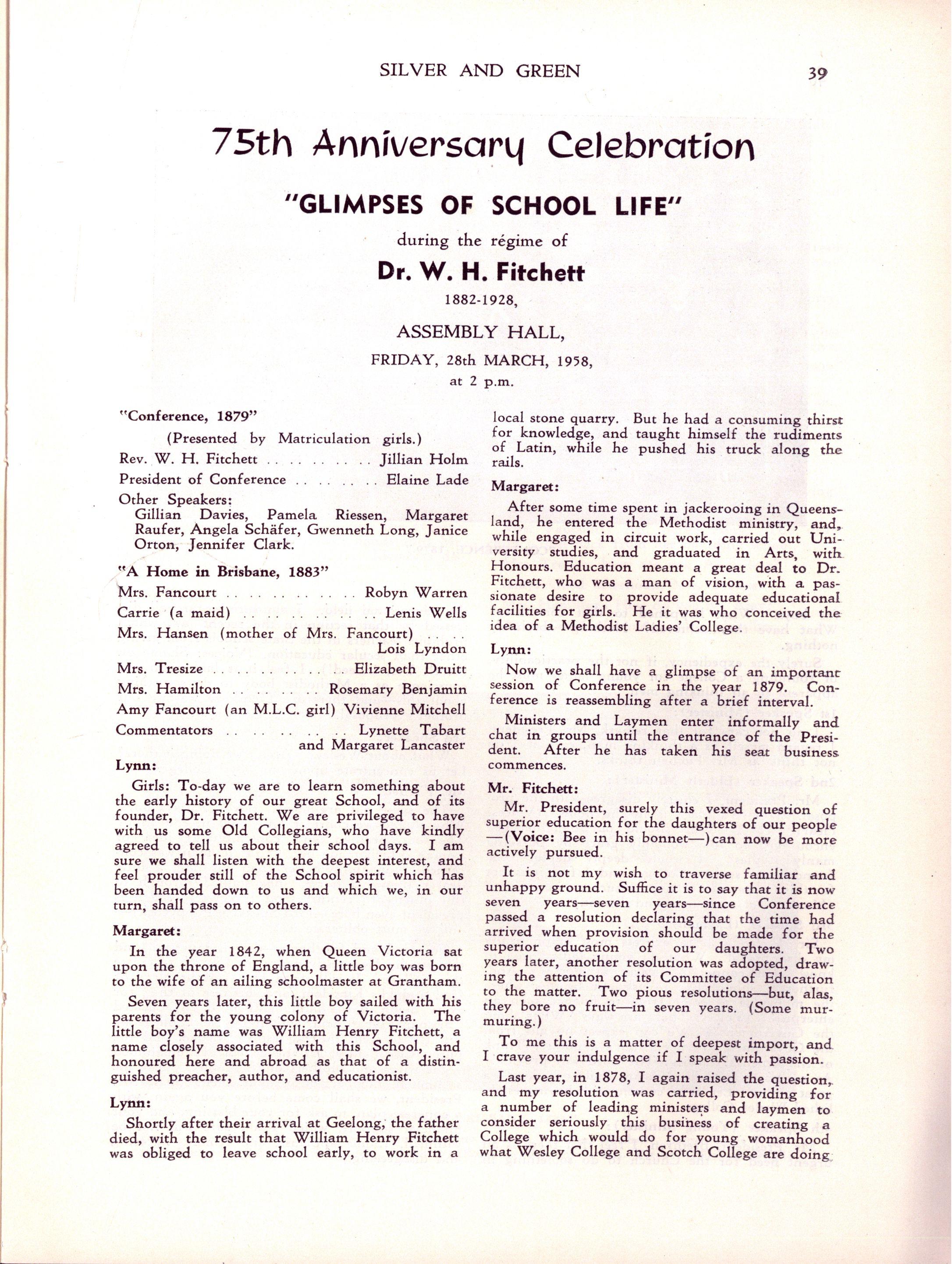
CONFERENCE, 1879. "
for boys. What happened to that committee? What have they achieved? Nothing—absolutely nothing
Surely the expediency, if not the practicability, of founding a College for young ladies must be apparent to all thinking men.
1st Speaker (Minister):
I do not care for that remark, Mr. President. I regard myself as a thinking man, even if I do not think as Mr Fitchett thinks
2nd Speaker (Elderly Minister):
Mr. President, I entirely disagree with the pro posal Women's place is in the home (Voices: Hear! Hear!) Wh y should our daughters be encouraged to lose womanly grace by pursuing manly studies? I would deeply deplore the founding of such a College, and I feel it is not for this Conference to attempt such an innovation (Murmurs of agreement and dissent.)
3rd Speaker (Layman):
Sir, I also wish to express most emphatically my disapproval What do young ladies need to know, that cannot be learnt at home? And, further, I should like to ask our brother where the money is to come from to finance such an enterprise? (Voices: There are ways! What about the Government?) W e can expect no aid from the Government (Voice: That's a point!) Think of the expense! (Voice: The Lord will provide!) As we know, a College means buildings, land—a great outlay Let us be content with having estab lished Wesley College.
4th Speaker (Young Minister):
Mr President, Brethren, I feel that there is an urgent need for the Church to do something in
the educational field. I am sure we are all dis tressed by that section in the recent law, which prohibits teachers in the State schools from giving other than secular education. (Voices: Shame on them! Yes, indeed!) I feel it is laid upon our conscience as a Methodist body to do something about this—and therefore I endorse warmly our brother's proposal (Voice: Hallelujah!)
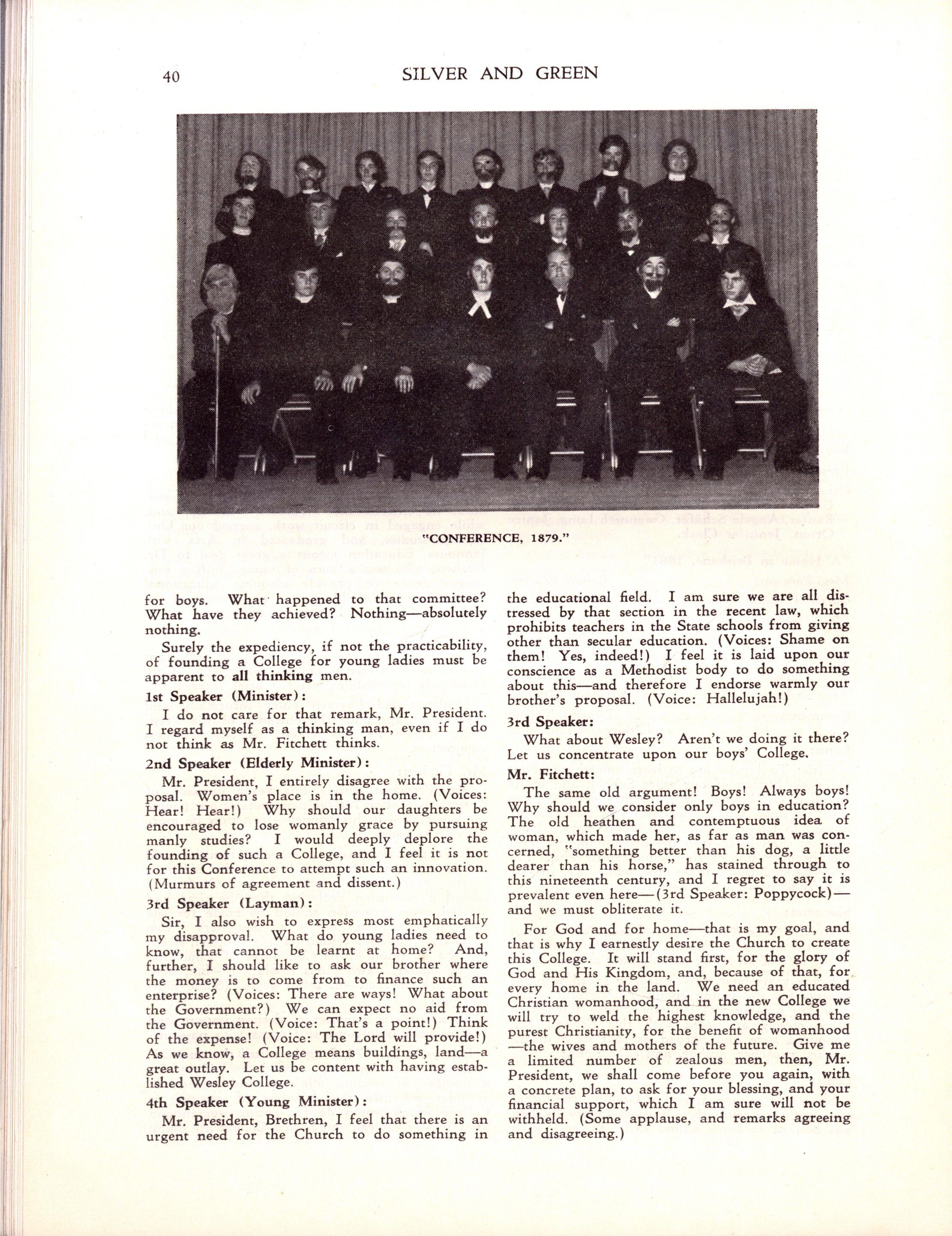
3rd Speaker:
What about Wesley? Aren't we doing it there? Let us concentrate upon our boys' College Mr Fitchett: The same old argument! Boys! Always boys! Wh y should we consider only boys in education? The old heathen and contemptuous idea of woman, which made her, as far as man was con cerned, "something better than his dog, a little dearer than his horse," has stained through to this nineteenth century, and I regret to say it is prevalent even here—(3rd Speaker: Poppycock) — and we must obliterate it.
For God and for home—that is my goal, and that is why I earnestly desire the Church to create this College. It will stand first, for the glory of God and His Kingdom, and, because of that, for every home in the land W e need an educated Christian womanhood, and in the new College we will try to weld the highest knowledge, and the purest Christianity, for the benefit of womanhood —the wives and mothers of the future Give me a limited number of zealous men, then, Mr President, we shall come before you again, with a concrete plan, to ask for your blessing, and your financial support, which I am sure will not be withheld (Some applause, and remarks agreeing and disagreeing.)
President (rising, and speaking very deliberately) : Brother Fitchett, your moving and eloquent speech has, I am sure, impressed us all I shall be pleased to serve on your Committee. Those who are willing to devote time and talents to this enterprise are asked to signify—
3rd Speaker:
I desire to lodge a strenuous protest against this new-fangled plan of turning women into blue stockings—a violation of natural instincts May I have permission to withdraw?
1st Speaker:
Sir, I also feel I must withdraw, and I only hope the Church will not live to regret the day (Voices: Most deplorable exhibition! What a pity! Yet there is some truth in it! W e must do some thing!)
President (with a quieting gesture) : Those willing to serve? (About ten or twelve men rise.)
Mr. Fitchett: Thank you, Mr President May I venture to prophesy that the names of these men will always hold an honoured place in the annals of the Church?
President: Conference will now adjourn until the evening session at 6.45 p.m (He shakes hands with Mr Fitchett, as do one or two others Members dis perse, chatting as they go.)
Margaret:
So an active Committee began three years of intensive work O n 4th August, 1881, three acres
of what was known as Kelly's Paddock were pur chased for the site of the College, and building began
In February, 1882, in temporary premises, the College opened with sixteen pupils
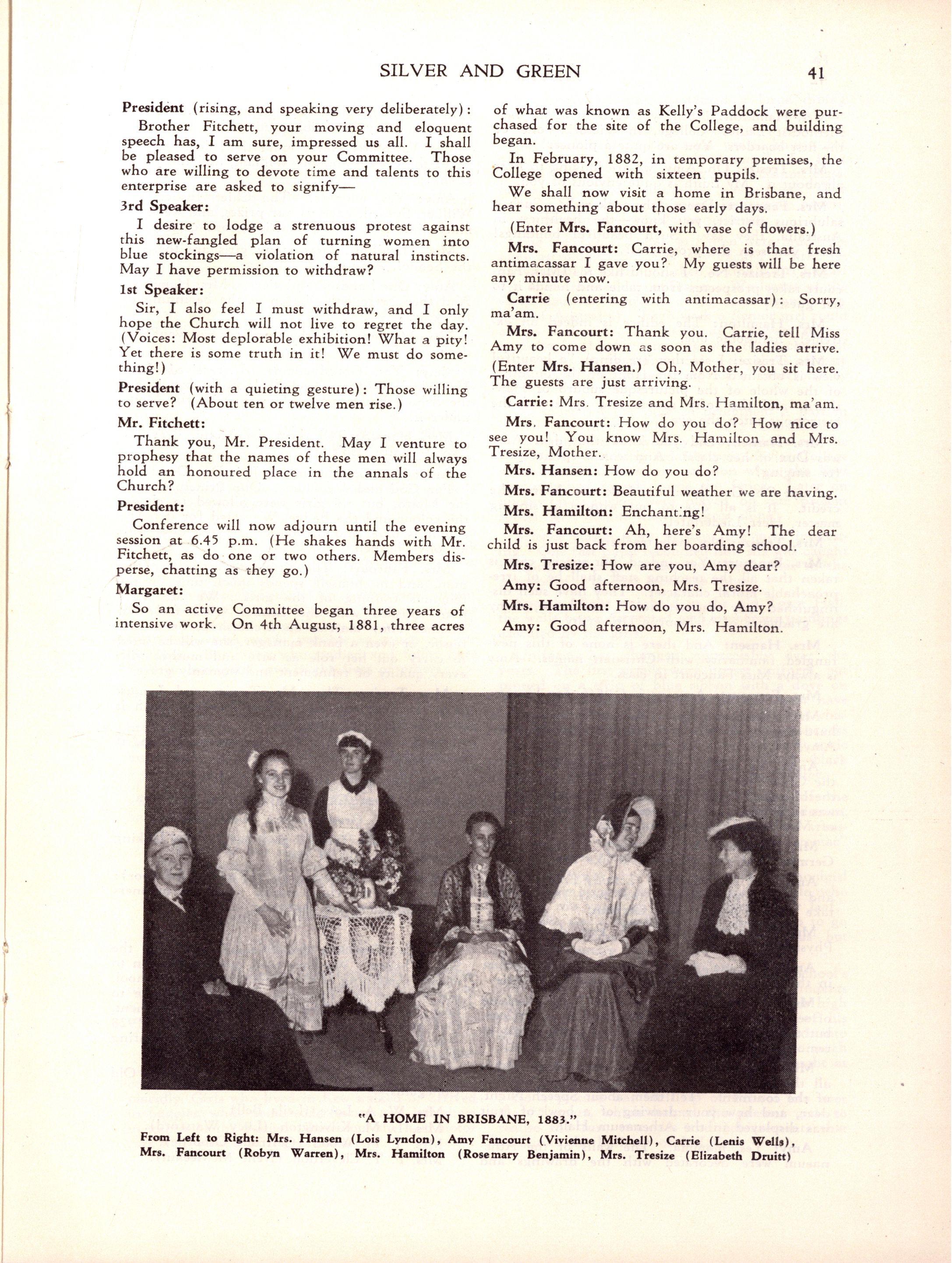
W e shall now visit a home in Brisbane, and hear something about those early days.
(Enter Mrs Fancourt, with vase of flowers.)
Mrs Fancourt: Carrie, where is that fresh antimacassar I gave you? My guests will be here any minute now
Carrie (entering with antimacassar) : Sorry, ma'am
Mrs Fancourt: Thank you Carrie, tell Miss Amy to come down as soon as the ladies arrive (Enter Mrs. Hansen.) Oh, Mother, you sit here The guests are just arriving.
Carrie: Mrs Tresize and Mrs Hamilton, ma'am
Mrs, Fancourt: How do you do? How nice to see you! You know Mrs. Hamilton and Mrs. Tresize, Mother
Mrs Hansen: How do you do?
Mrs. Fancourt: Beautiful weather we are having Mrs Hamilton: Enchanting!
Mrs. Fancourt: Ah, here's Amy! The dear child is just back from her boarding school.
Mrs. Tresize: How are you, Am y dear?
Amy: Good afternoon, Mrs Tresize Mrs Hamilton: How do you do, Amy?
Amy: Good afternoon, Mrs Hamilton
Mrs Hamilton: I hear you've been at the new Methodist Ladies' College, in Victoria—one of the first boarders Yo u are quite a pioneer!
Mrs Tresize: Oh, Amy, we are longing to hear all about it My Edith is quite envious of you
Mrs Fancourt: Doesn't she look well? Such a salubrious district, you know—the healthiest in Australia, they say. Such beautiful buildings! Have you seen the prospectus?
Mrs Tresize: No I should like to (Mrs Fan court takes prospectus from table and hands it to her guests.)
Mrs Hamilton: The edifice is indeed an ex tremely handsome one
Mrs Tresize: I see that (reading) "a beautiful view is obtained from the front of the building, of the whole of the picturesque suburb of Haw thorn, and the lofty towers and spires of the metropolis catch the eye."
Mrs Hansen: Did you know that dear Amy -was Dux of her class? An d won a special prize fo r singing?
Amy: Oh, Grandmamma, I do not deserve the credit. It is all due to our wonderful singing master, Herr Liedertafel!
Mrs Tresize: Not male teachers!
Mrs Fancourt: Yes, indeed, but special care is taken that all the teaching staff shall be of irre proachable moral character. They have such dis tinguished lady teachers, too Yo u know, many are graduates of Melbourne University
Mrs Hansen: And there is none of this new fangled familiarity with Christian names Amy is always Miss Fancourt in class
Mrs. Fancourt: Am y gained 98 % for History.
Mrs Hamilton: An d I'm sure it was a very Lard paper What sort of questions did you have, Amy ?
Amy : W e had to tell what we remembered of the Great Fire of London, give a full account of the Hundred Years' War, and the hardest question was to write a full essay on the life and character of Marlborough, Clive, and Pitt
Mrs Tresize: D o you study Chemistry and German, and difficult subjects like that?
Amy: No, Mrs Tresize I study French, Latin and Physiology this year, but next year I shall take Natural Science and German
Mrs Hamilton: An d did you do well in Physiology?
Amy: Yes, ma'am, but I was not quite perfect in the digestion of a piece of bread and butter
Mrs Tresize: Mr Tresize and I are thinking of sending Edith to the Methodist Ladies' College, but the journey is so long Melbourne seems so remote, and the dear girl is our only daughter
Mrs Fancourt: Amy's room companion comes all the way from Perth—right on the other side of the continent Tell them about Speech Night, dear, and how your drawing of a bowl of fruit was displayed in the Athenaeum Hall.
Amy: Yes, mamma The walls of the Athe naeum were decorated with the drawings and
paintings of the girls W e all had to wear white frocks, and my hair ribbon slipped—
Mrs Fancourt: Never mind that, dear—tell us about the crowd, and Sir William, and the prize giving
Amy : Yes, mamma The Chief Justice, Sir William Stawell, gave us our prizes, and we spent much time beforehand practising our curtsey
Mrs Hamilton: How many girls are there in the School, Amy dear?
Amy : One hundred and eleven, Mrs Hamilton An d there were only sixteen at the beginning of the year
Mrs Hansen: Tell them what prize you had, dear.
Amy : Yes, Grandmamma I received Lord Macaulay's History. A difficult book, but it has the School Badge stamped on it, with the Motto under it
Mrs Hansen: Tell them the Motto, dear—D Dee-O—Latin, isn't it?
Amy : Yes, Grandmamma It is Deo Domuique —Fo r God and for Home Our Principal chose the Motto, but we girls were allowed to choose the colour and the Badge. W e voted for it. The colour is blue, and the Badge a flying dove with an olive branch
Mrs Fancourt: The Principal is a very fine man, and he himself spends much time on the religious training of the girls W e are more than satisfied with the School W e feel that whether Amy marries an archbishop, or a pro fessor, or even a bank manager, she will be fitted to carry out her role as wife and mother with every quality of refinement and womanly grace
Mrs. Tresize: Then Mr. Tresize and I must certainly send our Edith there, however much it grieves us to part from her
Carrie (entering) : Tea is served, ma'am, if you please.
Mrs Fancourt: Thank you, Carrie Mrs Hansen: Come, Amy, give me your arm
Amy : Yes, Grandmamma, with pleasure Mrs Hansen (as she goes out): I am looking forward to a cup of tea.
Mrs Tresize (pausing on her way to the door) : How prettily the child speaks! An d her manners and deportment are charming
So Dr Fitchett's dream came true, and the School began. W e have used our imagination to convey something of the beginnings of our School, but now we are fortunate indeed to be able to hear first-hand information of its development Our guests represent various decades—1888-1928 —and we look forward with pleasure to hearing them
Speeches were then given by the following Old Collegians:—
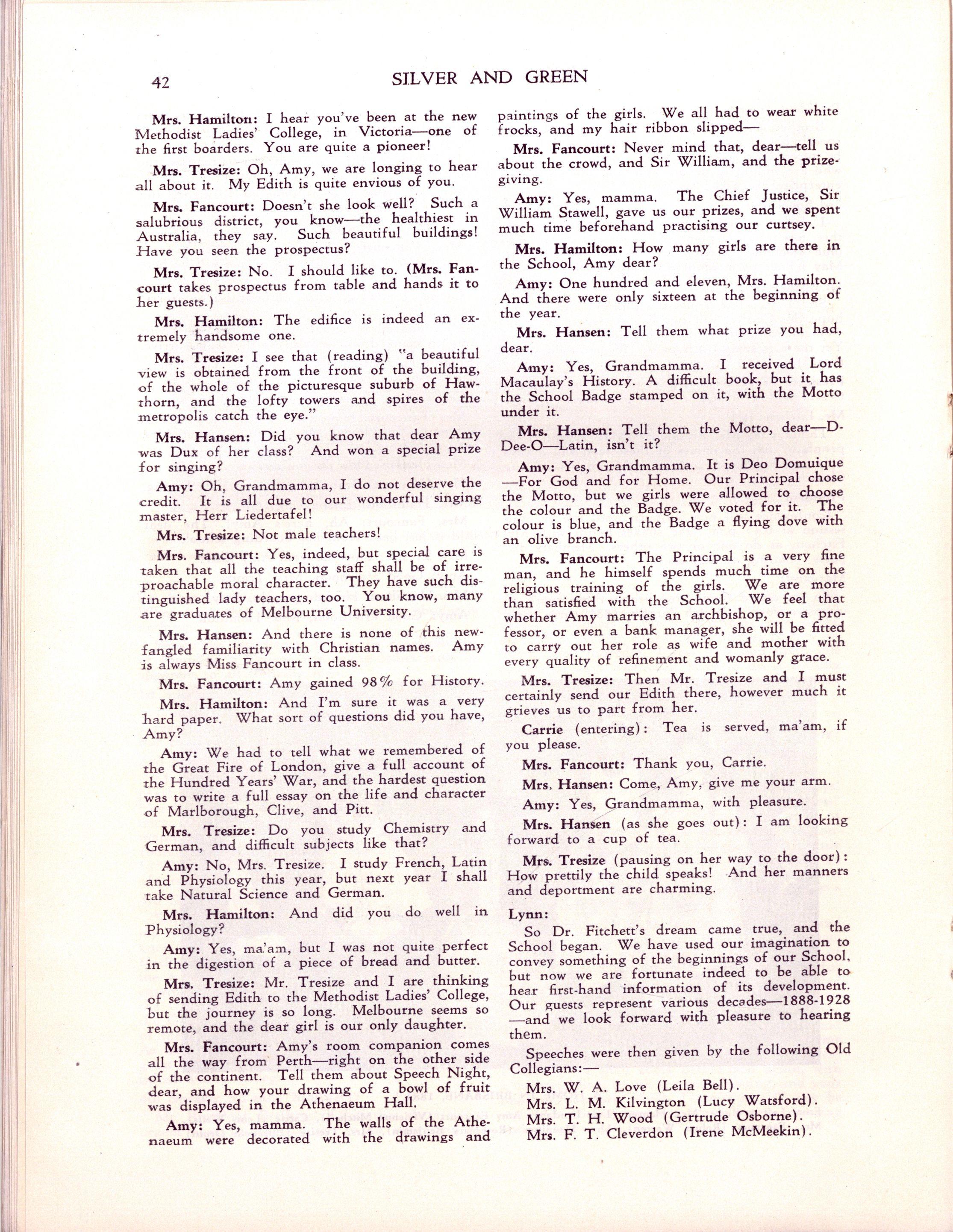
Mrs W A Love (Leila Bell)
Mrs. L. M. Kilvington (Lucy Watsford).
Mrs T H Woo d (Gertrude Osborne)
Mrs F T Cleverdon (Irene McMeekin)
Dr Kate Campbell Miss Marjorie Holding.
Mrs J P Champion (Betty Reseigh) (An account follows this article.)
After the speakers had been thanked by Lynn and Margaret, and posies (made by the girls of H VI.c and H VI.d) had been presented, the narrative was continued.
Margaret:
For 40 years Dr Fitchett directed, with great devotion and skill, the affairs of the School, and his passing was a matter of great regret to many But his work was well done, and the School he founded and loved still moved forward
After the death of Dr Fitchett, Dr Atkinson acted as Principal for a few months, until the Rev J W Grove could be released from the Western Australian Conference; then in 1929 Mr Grove became Principal, and brought his gifts of understanding and patience to the School After ten years he retired, and his place was taken by our present Principal, Dr Wood , who, with boundless energy and enthusiasm, has inspired the School and spurred it on
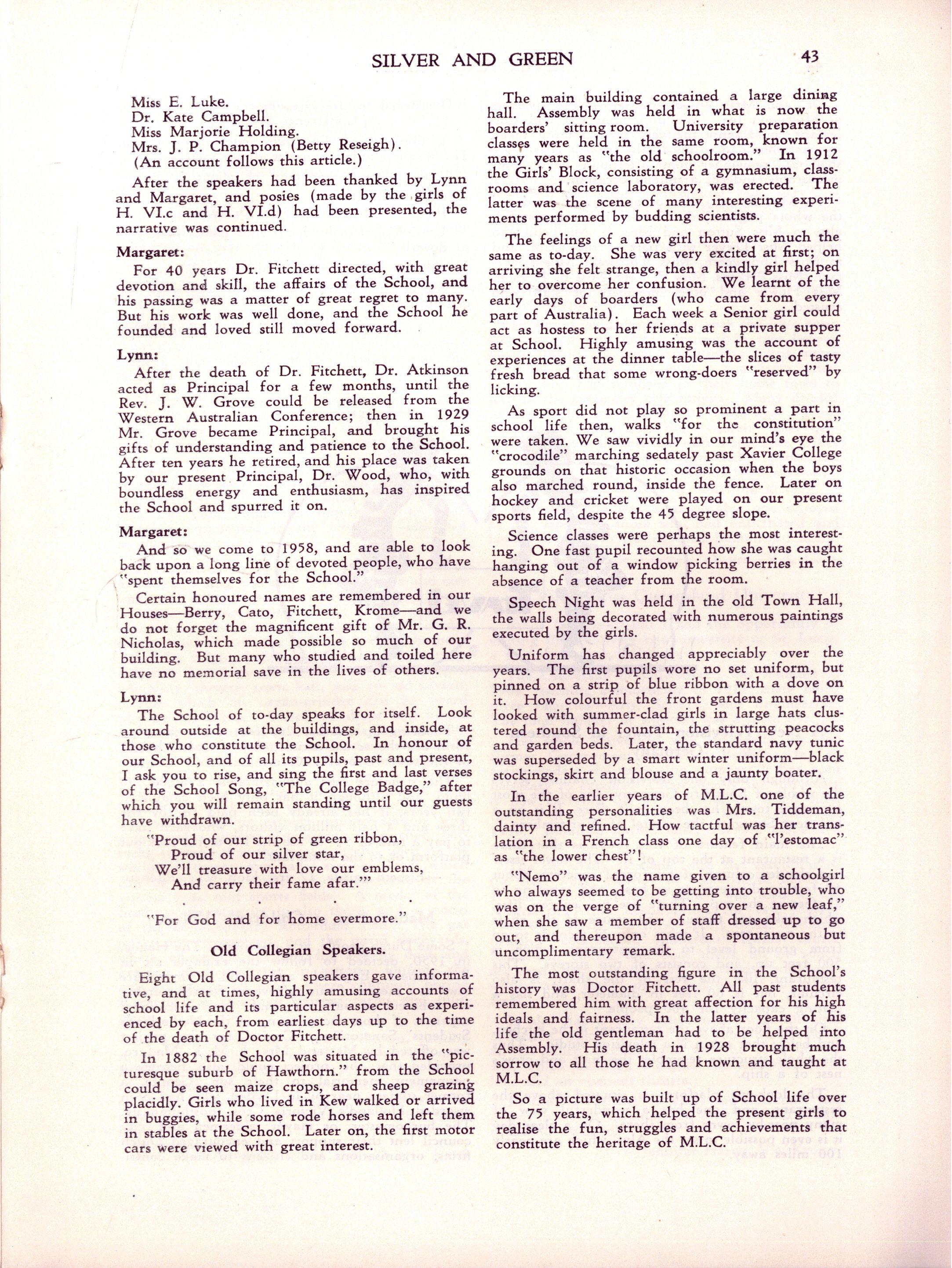
Margaret:
And so we come to 1958, and are able to look back upon a long line of devoted people, who have "spent themselves for the School."
Certain honoured names are remembered in our Houses—Berry, Cato, Fitchett, Krome—and we do not forget the magnificent gift of Mr G R Nicholas, which made possible so much of our building. But many who studied and toiled here have no memorial save in the lives of others
The School of to-day speaks for itself Look around outside at the buildings, and inside, at those who constitute the School In honour of our School, and of all its pupils, past and present, I ask you to rise, and sing the first and last verses of the School Song, "Th e College Badge," after which you will remain standing until our guests have withdrawn.
"Proud of our strip of green ribbon, Proud of our silver star, We'll treasure with love our emblems, And carry their fame afar.'"
"For God and for home evermore."
Old Collegian Speakers.
Eight Old Collegian speakers gave informa tive, and at times, highly amusing accounts of school life and its particular aspects as experi enced by each, from earliest days up to the time of the death of Doctor Fitchett.
In 1882 the School was situated in the "pic turesque suburb of Hawthorn." from the School could be seen maize crops, and sheep grazing placidly Girls who lived in Kew walked or arrived in buggies, while some rode horses and left them in stables at the School Later on, the first motor cars were viewed with great interest
The main building contained a large dining hall Assembly was held in what is now the boarders' sitting room University preparation classes were held in the same room, known for many years as "the old schoolroom." In 1912 the Girls' Block, consisting of a gymnasium, class rooms and science laboratory, was erected The latter was the scene of many interesting experi ments performed by budding scientists
The feelings of a new girl then were much the same as to-day She was very excited at first; on arriving she felt strange, then a kindly girl helped her to overcome her confusion W e learnt of the early days of boarders (who came from every part of Australia) Each week a Senior girl could act as hostess to her friends at a private supper at School Highly amusing was the account of experiences at the dinner table—the slices of tasty fresh bread that some wrong-doers "reserved" by licking
As sport did not play so prominent a part in school life then, walks "fo r the constitution" were taken W e saw vividly in our mind's eye the "crocodile" marching sedately past Xavier College grounds on that historic occasion when the boys also marched round, inside the fence Later on hockey and cricket were played on our present sports field, despite the 45 degree slope
Science classes were perhaps the most interest ing. One fast pupil recounted how she was caught hanging out of a window picking berries in the absence of a teacher from the room
Speech Night was held in the old Town Hall, the walls being decorated with numerous paintings executed by the girls.
Uniform has changed appreciably over the years The first pupils wore no set uniform, but pinned on a strip of blue ribbon with a dove on it How colourful the front gardens must have looked with summer-clad girls in large hats clus tered round the fountain, the strutting peacocks and garden beds Later, the standard navy tunic was superseded by a smart winter uniform—black stockings, skirt and blouse and a jaunty boater
In the earlier years of M.L.C. one of the outstanding personalities was Mrs Tiddeman, dainty and refined How tactful was her trans lation in a French class one day of "l'estomac" as "the lower chest"!
"Nemo " was the name given to a schoolgirl who always seemed to be getting into trouble, who was on the verge of "turning over a new leaf," when she saw a member of staff dressed up to go out, and thereupon made a spontaneous but uncomplimentary remark
The most outstanding figure in the School's history was Doctor Fitchett. All past students remembered him with great affection for his high ideals and fairness In the latter years of his life the old gentleman had to be helped into Assembly His death in 1928 brought much sorrow to all those he had known and taught at M.L.C
So a picture was built up of School life over the 75 years, which helped the present girls to realise the fun, struggles and achievements that constitute the heritage of M.L.C
Dr. and Mrs. Woo d entertained the speakers at afternoon tea W e hope that the Old Col legians could sense the very great interest taken in what they had to say to the present girls W e shall all remember that afternoon as a most memorable, indeed, a unique occasion.
T o Miss Dwyer, who organised and produced the whole pageant, the School is most grateful, also to Miss Sutton and Miss L Mitchell, who helped Miss Dwyer with part of the script, and to Miss Illingworth, Miss Thirlwell, Miss Leder man, Miss Perkins, Miss V. Kerr, Miss B. Jackson, Miss Howie and other members of staff who assisted
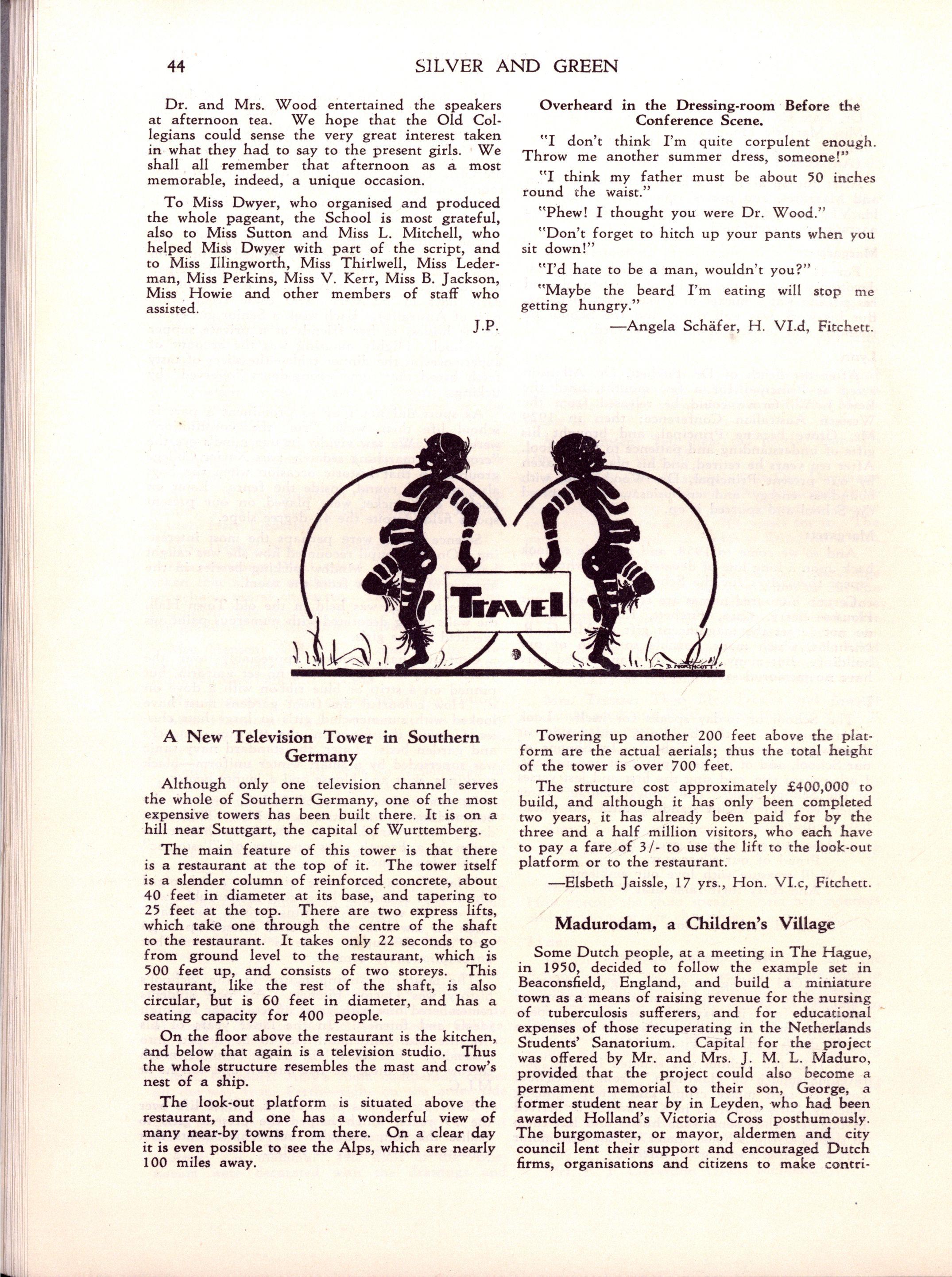
Overheard in the Dressing-room Before the Conference Scene.
" I don't think I'm quite corpulent enough Throw me another summer dress, someone!"
" I think my father must be about 50 inches round the waist."
"Phew! I thought you were Dr. Wood. "
"Don't forget to hitch up your pants when you sit down!"
"I'd hate to be a man, wouldn't you?"
"Maybe the beard I'm eating will stop me getting hungry."
—Angela Schafer, H Vl.d, FitchettAlthough only one television channel serves the whole of Southern Germany, one of the most expensive towers has been built there. It is on a hill near Stuttgart, the capital of Wurttemberg
The main feature of this tower is that there is a restaurant at the top of it The tower itself is a slender column of reinforced concrete, about 40 feet in diameter at its base, and tapering to 25 feet at the top There are two express lifts, which take one through the centre of the shaft to the restaurant. It takes only 22 seconds to go from ground level to the restaurant, which is 500 feet up, and consists of two storeys This restaurant, like the rest of the shaft, is also circular, but is 60 feet in diameter, and has a seating capacity for 400 people.
O n the floor above the restaurant is the kitchen, and below that again is a television studio Thus the whole structure resembles the mast and crow's nest of a ship
The look-out platform is situated above the restaurant, and one has a wonderful view of many near-by towns from there O n a clear day it is even possible to see the Alps, which are nearly 100 miles away
Towering up another 200 feet above the plat form are the actual aerials; thus the total height of the tower is over 700 feet
The structure cost approximately £400,000 to build, and although it has only been completed two years, it has already been paid for by the three and a half million visitors, who each have to pay a fare of 3/ to use the lift to the look-out platform or to the restaurant
—Elsbeth Jaissle, 17 yrs., Hon VI.c, Fitchett
Some Dutch people, at a meeting in The Hague, in 1950, decided to follow the example set in Beaconsfield, England, and build a miniature town as a means of raising revenue for the nursing of tuberculosis sufferers, and for educational expenses of those recuperating in the Netherlands Students' Sanatorium Capital for the project was offered by Mr. and Mrs. J. M. L. Maduro, provided that the project could also become a permament memorial to their son, George, a former student near by in Leyden, who had been awarded Holland's Victoria Cross posthumously. The burgomaster, or mayor, aldermen and city council lent their support and encouraged Dutch firms, organisations and citizens to make contri
butions The Director of the Zuyder Zee Museum undertook the design to a scale of 1 : 25, and developed a plan for a typically Dutch town, to be known as Madurodam, showing in miniature the normal stages of community development from the year 1000 A.D to the present day Expert modellers were engaged, and the unique town was built The official opening ceremony was on 2nd July, 1952, and Princess Beatrix, heiress to Hol land's throne, was installed as Royal Burgomaster
Annually 30 boys and girls, from schools in The Hague, are elected to form the municipal council of Madurodam From amongst themselves they elect a deputy burgomaster and aldermen They discuss administration of the city, and it is their duty each to spend part of their holidays helping the manager of Madurodam run the miniature city
The city has its own orchestra, consisting of about 50 boys and girls, whose ages range from nine to twenty years Included in their repertoire is the official song of the miniature city
Guides are placed throughout the city to help visitors follow the town's development from ancient to modern times A guide book is sold, and it tells the name and the importance of each building represented in the city, and indicated by numbers
The garden city contains numerous attractions to delight young and old A n old castle and city wall, and a mediaeval city centre in the process of restoration can be seen From various churches represented can be heard organ music, choral singing and bell-ringing It has its own harbour served by fishing boats and other craft Various company buildings are represented, as well as a university, theatre, town hall, and an old tavern, outside which an organ-grinder can be heard playing his organ Streets of shops and homes are seen, and various schemes under construction
The city has its own factories, four-lane roads, complete with traffic and traffic tunnels equipped with sodium lighting. The city's port is equipped with up-to-date machinery, and is filled with scale models of well-known war and passenger ships
The village has an airport, railway station, with a two and a quarter mile circuit, tram shed, bar racks (though it is the most peaceful town in the world), television and radio stations, from which can be heard a variety of programmes as the visitors pass, and sports fields. A model of the Students' Sanatorium is also there, and a model of the contemporary Rotterdam Zoo The gas works are represented, and the naval dockyards, where, at regular intervals, the floating dock and graving dock are seen in action Outside the city are found oil fields, where continual boring is carried on, amongst various farms and tulip fields.
At night the miniature city is lit up, turning it into a fairy-like scene This miniature town keeps the muncipal council very busy, and is one of Holland's ways of keeping the young 'teen agers of The Hague occupied and preventing them from getting into mischief A very good idea!
—Ann e Turnbull, V.b, 15 yrs., Cato
A century ago early Chinese and English settlers established a small mining centre 198 miles from Melbourne The town consisted of a small church, several houses, a general store, and a water wheel. Scattered about the surrounding hills were the many shafts and mines where these settlers earned their living
Since then the mining has almost died out, although a few of the older members still earn their living panning for gold, but the town has remained one of the numerous popular holiday resorts around this area.
O n Easter Saturday of this year the little town was crowded with more people than ever before, about 500 in all, from surrounding towns, other parts of Victoria, and even a few from other States, who had returned to their home town to join in the centenary celebrations Many dressed as they would have done 100 years ago These were judged, and from them chosen "Miss Cen tenary," who was presented with a sun sash Other features of the afternoon included a procession through the streets, various bands from surround ing districts, and a team of marching girls
The afternoon was a memorable one enjoyed by all, especially those who had anticipated and looked forward to visiting their home town again —Brenda Cooper, 15 yrs., V.d, Cato.
While in Queensland I had the opportunity of visiting the relatively new university at St Lucia, a few miles from Brisbane
The University of Queensland was founded in 1909, teaching commencing in 1911, there being three faculties—Arts, Science, and Engineering The total number of students was a mere 83
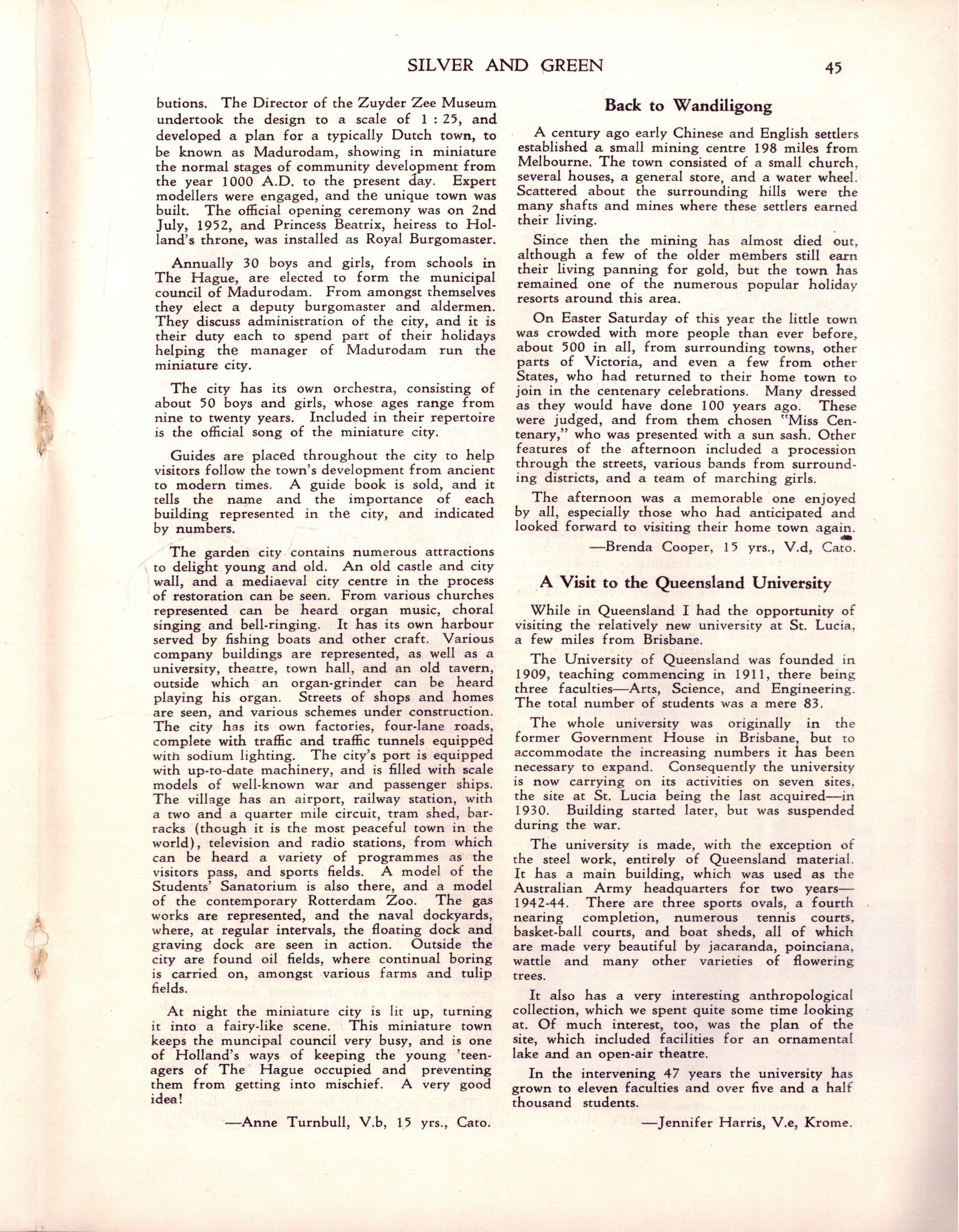
The whole university was originally in the former Government House in Brisbane, but to accommodate the increasing numbers it has been necessary to expand Consequently the university is now carrying on its activities on seven sites, the site at St Lucia being the last acquired—in 1930. Building started later, but was suspended during the war
The university is made, with the exception of the steel work, entirely of Queensland material. It has a main building, which was used as the Australian Army headquarters for two years— 1942-44 There are three sports ovals, a fourth nearing completion, numerous tennis courts, basket-ball courts, and boat sheds, all of which are made very beautiful by jacaranda, poinciana, wattle and many other varieties of flowering trees
It also has a very interesting anthropological collection, which we spent quite some time looking at. O f much interest, too, was the plan of the site, which included facilities for an ornamental lake and an open-air theatre
In the intervening 47 years the university has grown to eleven faculties and over five and a half thousand students
—Jennifer Harris, V.e, KromeDuring a cruise of some Pacific islands, with my parents in the summer holidays, I was fortu nate to be able to visit the island of Tangatapu, the main island in the kingdom of Tonga Nuku'alofa is the capital city, and that is where the Queen of Tonga lives
My family and I were met on the wharf by an acquaintance of my father's, and as soon as he learned that we went to M.L.C he insisted on telling us of the work done there by Dr. Woo d and the Methodist Church This man, who was now married and had two children, said that when he was a young boy Dr Woo d taught him in the missionary school
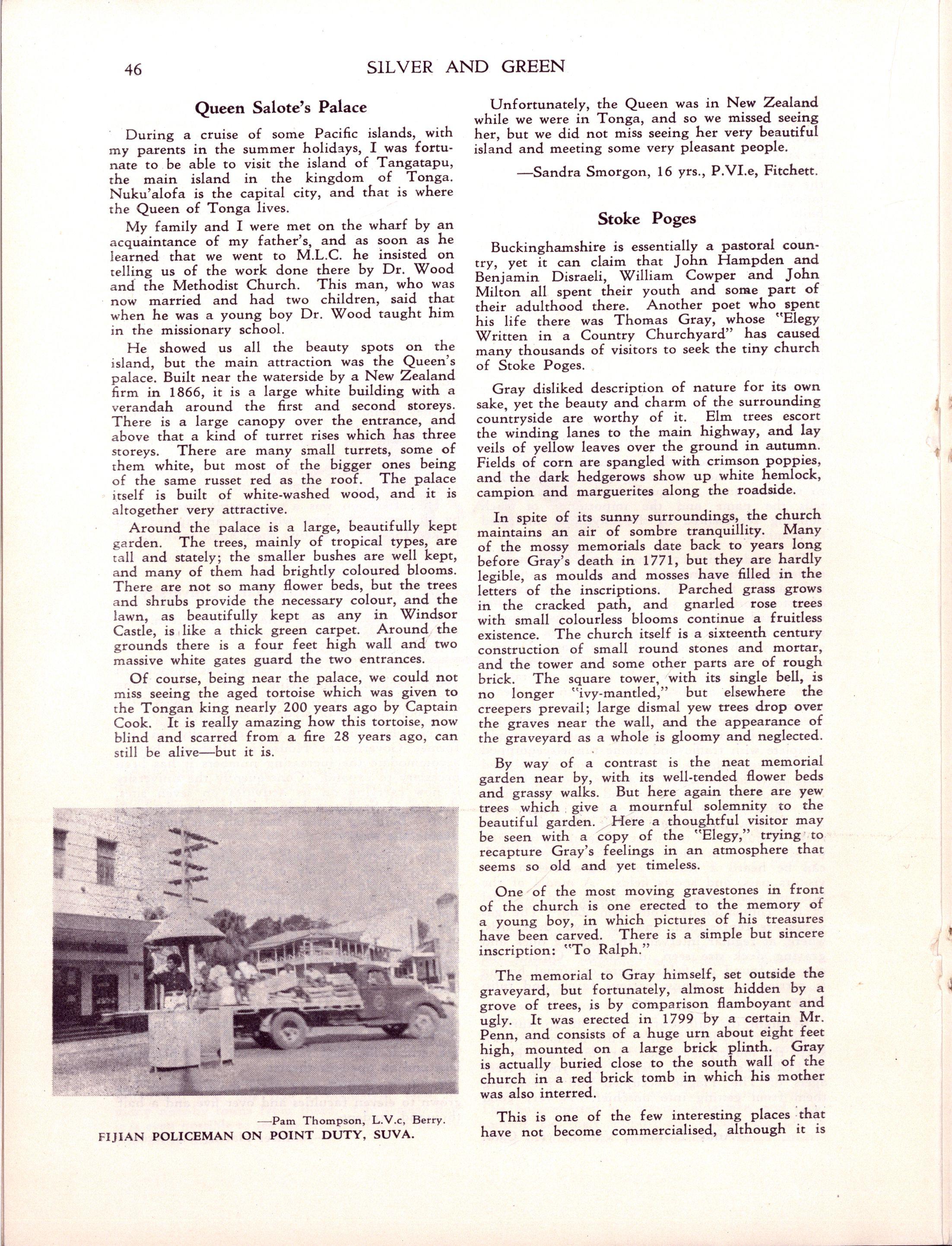
He showed us all the beauty spots on the island, but the main attraction was the Queen's palace Built near the waterside by a New Zealand firm in 1866, it is a large white building with a verandah around the first and second storeys There is a large canopy over the entrance, and above that a kind of turret rises which has three storeys There are many small turrets, some of them white, but most of the bigger ones being of the same russet red as the roof The palace itself is built of white-washed wood, and it is altogether very attractive
Around the palace is a large, beautifully kept garden The trees, mainly of tropical types, are tall and stately; the smaller bushes are well kept, and many of them had brightly coloured blooms There are not so many flower beds, but the trees and shrubs provide the necessary colour, and the lawn, as beautifully kept as any in Windsor Castle, is like a thick green carpet Around the grounds there is a four feet high wall and two massive white gates guard the two entrances
O f course, being near the palace, we could not miss seeing the aged tortoise which was given to the Tongan king nearly 200 years ago by Captain Cook It is really amazing how this tortoise, now blind and scarred from a fire 28 years ago, can still be alive—but it is
Unfortunately, the Queen was in New Zealand while we were in Tonga, and so we missed seeing her, but we did not miss seeing her very beautiful island and meeting some very pleasant people
—Sandra Smorgon, 16 yrs., P.VI.e, Fitchett
Buckinghamshire is essentially a pastoral coun try, yet it can claim that John Hampden and Benjamin Disraeli, William Cowper and John Milton all spent their youth and some part of their adulthood there Another poet who spent his life there was Thomas Gray, whose "Elegy Written in a Country Churchyard" has caused many thousands of visitors to seek the tiny church of Stoke Poges.
Gray disliked description of nature for its own sake, yet the beauty and charm of the surrounding countryside are worthy of it Elm trees escort the winding lanes to the main highway, and lay veils of yellow leaves over the ground in autumn Fields of corn are spangled with crimson poppies, and the dark hedgerows show up white hemlock, campion and marguerites along the roadside
In spite of its sunny surroundings, the church maintains an air of sombre tranquillity Many of the mossy memorials date back to years long before Gray's death in 1771, but they are hardly legible, as moulds and mosses have filled in the letters of the inscriptions. Parched grass grows in the cracked path, and gnarled rose trees with small colourless blooms continue a fruitless existence The church itself is a sixteenth century construction of small round stones and mortar, and the tower and some other parts are of rough brick The square tower, with its single bell, is no longer "ivy-mantled," but elsewhere the creepers prevail; large dismal yew trees drop over the graves near the wall, and the appearance of the graveyard as a whole is gloomy and neglected
By way of a contrast is the neat memorial garden near by, with its well-tended flower beds and grassy walks But here again there are yew trees which give a mournful solemnity to the beautiful garden Here a thoughtful visitor may be seen with a copy of the "Elegy," trying to recapture Gray's feelings in an atmosphere that seems so old and yet timeless
One of the most moving gravestones in front of the church is one erected to the memory of a young boy, in which pictures of his treasures have been carved There is a simple but sincere inscription: "T o Ralph."
The memorial to Gray himself, set outside the graveyard, but fortunately, almost hidden by a grove of trees, is by comparison flamboyant and ugly It was erected in 1799 by a certain Mr Penn, and consists of a huge urn about eight feet high, mounted on a large brick plinth Gray is actually buried close to the south wall of the church in a red brick tomb in which his mother was also interred
This is one of the few interesting places that have not become commercialised, although it is
the goal of many educated tourists. Its atmo sphere remains quiet and melancholy, and it is not difficult to imagine how a man might here be inspired to write one of the best-known poems in our language, —Pamela Ternouth, Hon VI.a, Cato
A little while ago I lived in a country town in northern New South Wales. There for the first time I had the chance of seeing a large group of aborigines and getting to know a few of them I should not say "aborigines," because out of the one hundred and twenty who lived round our town only one was a fullblooded aboriginal. The others were one-half or one-quarter caste, or more often had only a trace of coloured blood, but in the eyes of the white community even a one-sixteenth caste was classified as an "aboriginal."
Of the one hundred and twenty coloured people, seventy-three lived in houses on the out skirts of the town, and forty in "humpies" at the dump The houses were, with the exception of a few quite good ones in the town, condemned houses which gave only scanty shelter to the families living in them Sometimes there was only one good room, and there the whole family had to sleep and live But those people were far better off than those living on the town dump At the dump forty people (twenty-eight of them children) lived in humpies made of bags and kerosene tins, which had been hammered flat and put together to form roofs There were no toilets or washing facilities. The children had bad cuts on their feet caused by broken glass at the dump Many of them suffered from scabies Because of disease and uncleanliness, it was almost impossible for these people to get work Consequently, they could not earn enough money to improve their conditions The children were often too ill or had too many sores on their legs to be able to attend school
Many people in the town thought of the coloured people as lazy, dirty and inferior But this seemed to be disproved by the fact that in the town families which lived in nice houses were respected and liked by their neighbours The children went to the local primary school and got on well with their playmates there It seems hard not to believe that if the children at the dump had good houses, water to wash with, a light under which to do their home work, and firm walls to keep out the cold in winter, to say nothing of food and proper clothing, they too could take their places in the schools and later become good neighbours with the white people in the township.
—Katherine Jackson, L.V.a, Krome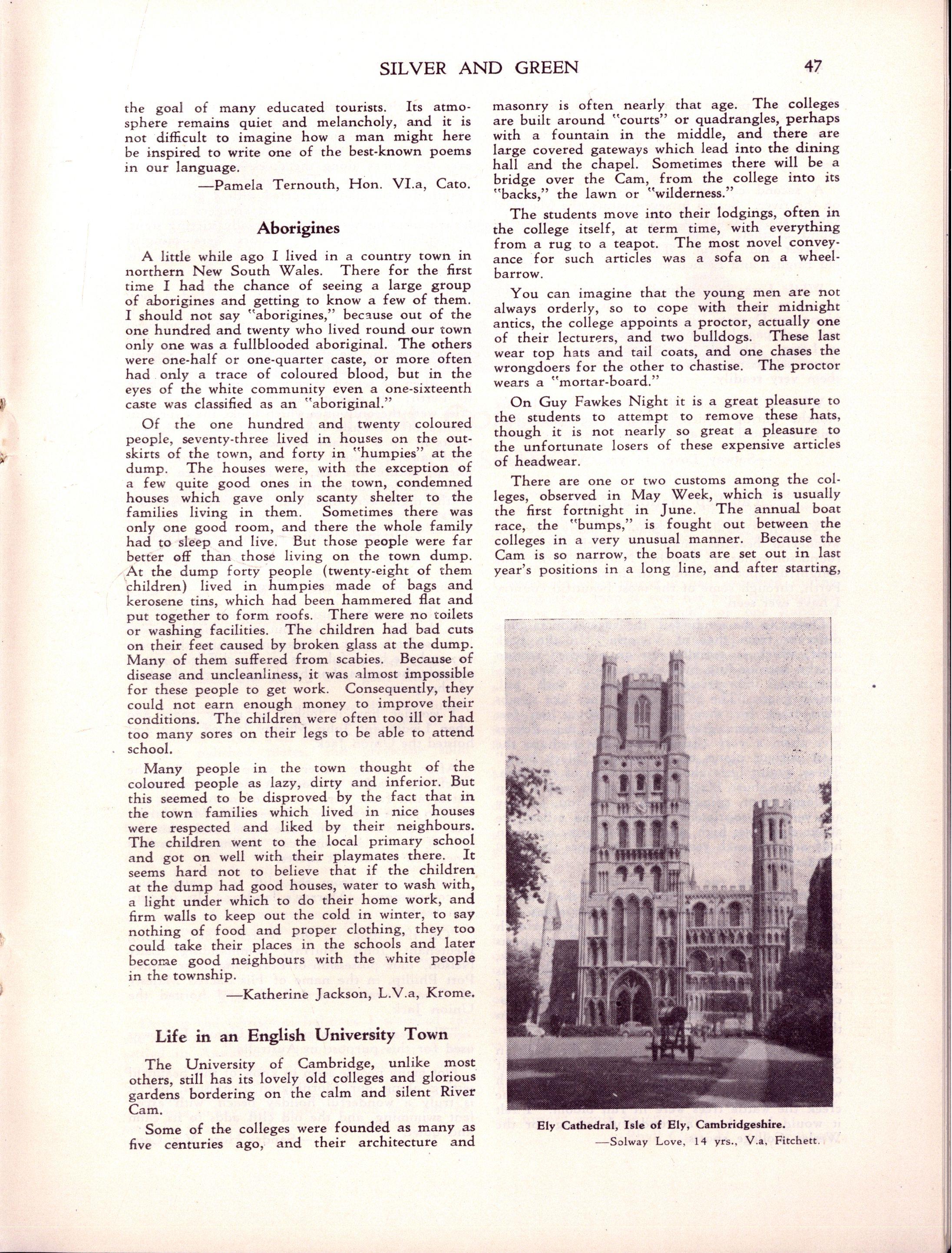
The University of Cambridge, unlike most others, still has its lovely old colleges and glorious gardens bordering on the calm and silent River Cam
Some of the colleges were founded as many as five centuries ago, and their architecture and
masonry is often nearly that age The colleges are built around "courts" or quadrangles, perhaps with a fountain in the middle, and there are large covered gateways which lead into the dining hall and the chapel Sometimes there will be a bridge over the Cam, from the college into its "backs," the lawn or "wilderness."
The students move into their lodgings, often in the college itself, at term time, with everything from a rug to a teapot The most novel convey ance for such articles was a sofa on a wheel barrow
You can imagine that the young men are not always orderly, so to cope with their midnight antics, the college appoints a proctor, actually one of their lecturers, and two bulldogs These last wear top hats and tail coats, and one chases the wrongdoers for the other to chastise. The proctor wears a "mortar-board."
O n Guy Fawkes Night it is a great pleasure to the students to attempt to remove these hats, though it is not nearly so great a pleasure to the unfortunate losers of these expensive articles of headwear
There are one or two customs among the col leges, observed in May Week, which is usually the first fortnight in June The annual boat race, the "bumps," is fought out between the colleges in a very unusual manner Because the Cam is so narrow, the boats are set out in last year's positions in a long line, and after starting,
if one crew passes another, a "bump" is scored Both crews drop out, and the faster one is adorned with a branch or two At the end of a week of races, the front boat, which is usually that of Jesus College, is declared the winner
A second custom is the old one of singing on the river Seated in seven punts, the Madrigal Choir stops under a college bridge, and the sound of their voices over the still misty water is sweet and restful The students sing lovely old English and French madrigals and part songs
While I was in Cambridge I visited the Senate House to hear the speeches at the Conferring of Honorary Degrees Eight degrees were conferred, and each page-long speech before it was delivered in Latin Though these speeches were written down before me, I certainly did not understand them very readily
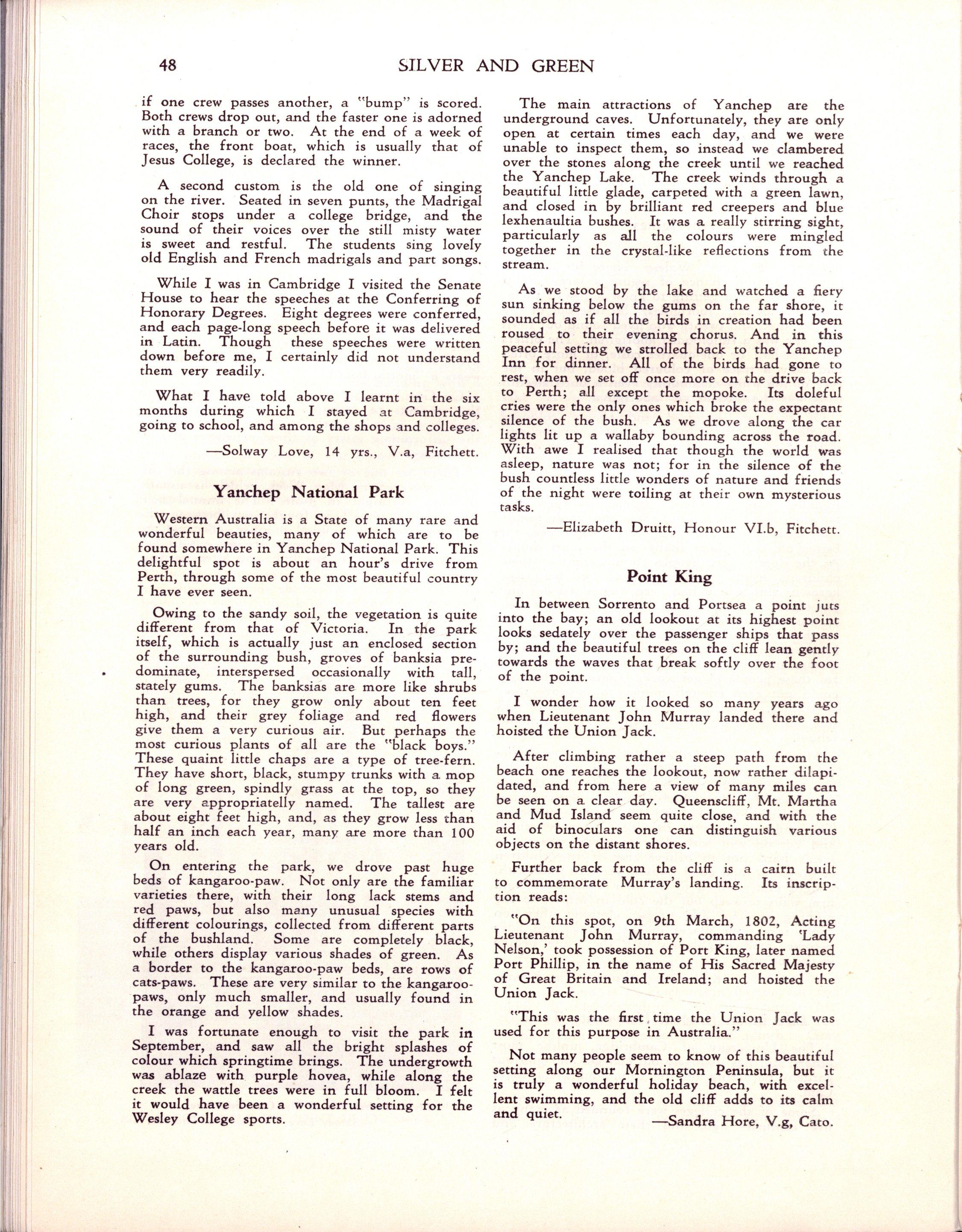
What I have told above I learnt in the six months during which I stayed at Cambridge, going to school, and among the shops and colleges.
—Solway Love, 14 yrs., V.a, Fitchett
Western Australia is a State of many rare and wonderful beauties, many of which are to be found somewhere in Yanchep National Park This delightful spot is about an hour's drive from Perth, through some of the most beautiful country I have ever seen
Owing to the sandy soil, the vegetation is quite different from that of Victoria. In the park itself, which is actually just an enclosed section of the surrounding bush, groves of banksia pre dominate, interspersed occasionally with tall, stately gums The banksias are more like shrubs than trees, for they grow only about ten feet high, and their grey foliage and red flowers give them a very curious air But perhaps the most curious plants of all are the "black boys." These quaint little chaps are a type of tree-fern. They have short, black, stumpy trunks with a mop of long green, spindly grass at the top, so they are very appropriately named The tallest are about eight feet high, and, as they grow less than half an inch each year, many are more than 100 years old
On entering the park, we drove past huge beds of kangaroo-paw. Not only are the familiar varieties there, with their long lack stems and red paws, but also many unusual species with different colourings, collected from different parts of the bushland. Some are completely black, while others display various shades of green As a border to the kangaroo-paw beds, are rows of cats-paws These are very similar to the kangaroo paws, only much smaller, and usually found in the orange and yellow shades.
I was fortunate enough to visit the park in September, and saw all the bright splashes of colour which springtime brings The undergrowth was ablaze with purple hovea, while along the creek the wattle trees were in full bloom. I felt it would have been a wonderful setting for the Wesley College sports.
The main attractions of Yanchep are the underground caves Unfortunately, they are only open at certain times each day, and we were unable to inspect them, so instead we clambered over the stones along the creek until we reached the Yanchep Lake The creek winds through a beautiful little glade, carpeted with a green lawn, and closed in by brilliant red creepers and blue lexhenaultia bushes It was a really stirring sight, particularly as all the colours were mingled together in the crystal-like reflections from the stream
As we stood by the lake and watched a fiery sun sinking below the gums on the far shore, it sounded as if all the birds in creation had been roused to their evening chorus. An d in this peaceful setting we strolled back to the Yanchep Inn for dinner. All of the birds had gone to rest, when we set off once more on the drive back to Perth; all except the mopoke Its doleful cries were the only ones which broke the expectant silence of the bush As we drove along the car lights lit up a wallaby bounding across the road With awe I realised that though the world was asleep, nature was not; for in the silence of the bush countless little wonders of nature and friends of the night were toiling at their own mysterious tasks
—Elizabeth Druitt, Honour Vl.b, FitchettIn between Sorrento and Portsea a point juts into the bay; an old lookout at its highest point looks sedately over the passenger ships that pass by; and the beautiful trees on the cliff lean gently towards the waves that break softly over the foot of the point
I wonder how it looked so many years ago when Lieutenant John Murray landed there and hoisted the Union Jack
After climbing rather a steep path from the beach one reaches the lookout, now rather dilapi dated, and from here a view of many miles can be seen on a clear day Queenscliff, Mt Martha and Mud Island seem quite close, and with the aid of binoculars one can distinguish various objects on the distant shores.
Further back from the cliff is a cairn built to commemorate Murray's landing. Its inscrip tion reads:
"O n this spot, on 9th March, 1802, Acting Lieutenant John Murray, commanding 'Lady Nelson,' took possession of Port King, later named Port Phillip, in the name of His Sacred Majesty of Great Britain and Ireland; and hoisted the Union Jack
"This was the first time the Union Jack was used for this purpose in Australia."
Not many people seem to know of this beautiful setting along our Mornington Peninsula, but it is truly a wonderful holiday beach, with excel lent swimming, and the old cliff adds to its calm an quiet. —Sandra Hore, V.g, Cato.
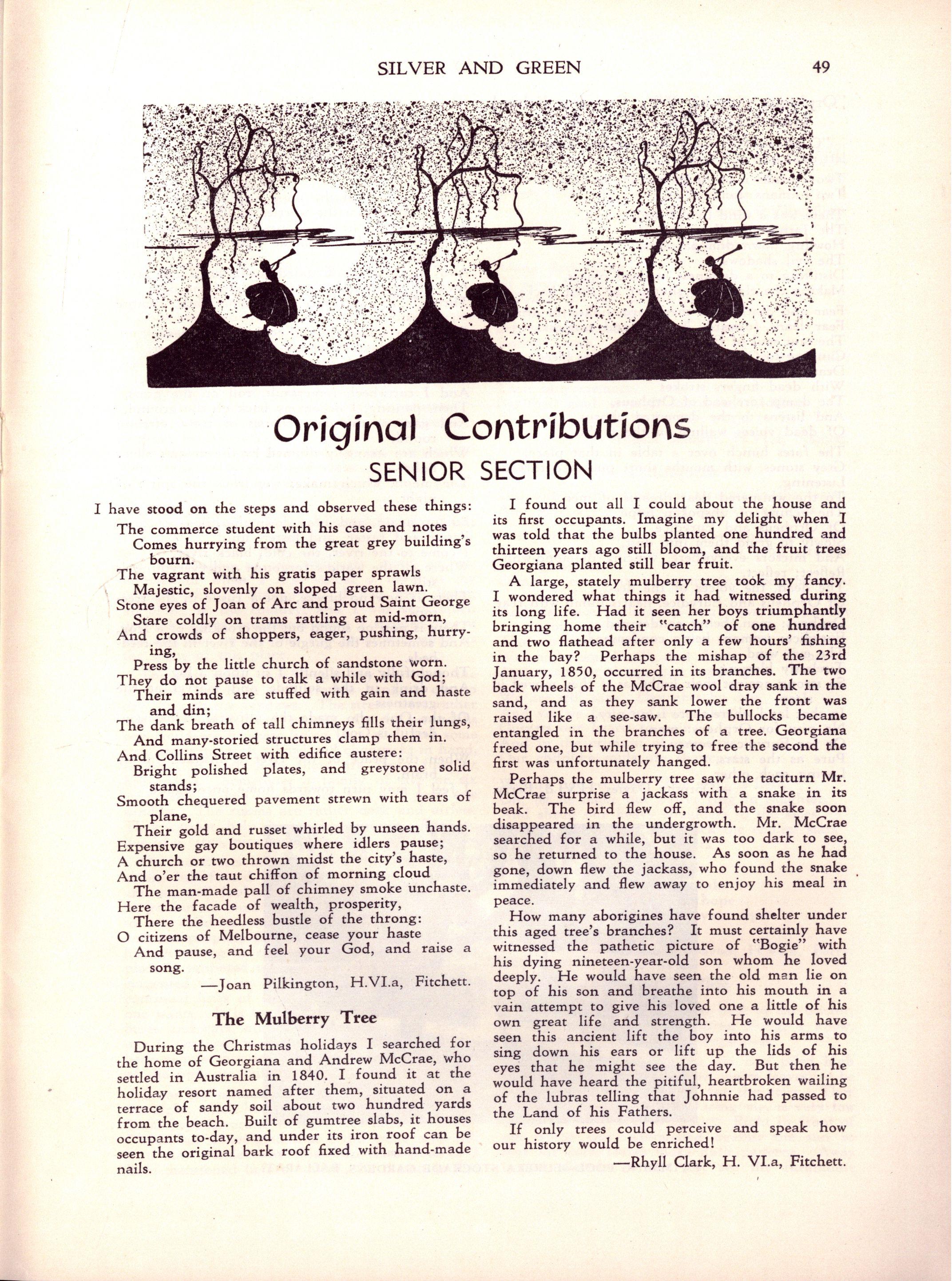
I have stood on the steps and observed these things:
The commerce student with his case and notes Comes hurrying from the great grey building's bourn
The vagrant with his gratis paper sprawls Majestic, slovenly on sloped green lawn.
Stone eyes of Joan of Arc and proud Saint George Stare coldly on trams rattling at mid-morn, And crowds of shoppers, eager, pushing, hurry ing, Press by the little church of sandstone worn
They do not pause to talk a while with God ; Their minds are stuffed with gain and haste and din;
The dank breath of tall chimneys fills their lungs, And many-storied structures clamp them in. And Collins Street with edifice austere: Bright polished plates, and greystone solid stands; Smooth chequered pavement strewn with tears of plane, Their gold and russet whirled by unseen hands Expensive gay boutiques where idlers pause; A church or two thrown midst the city's haste, And o'er the taut chiffon of morning cloud
The man-made pall of chimney smoke unchaste Here the facade of wealth, prosperity, There the heedless bustle of the throng: O citizens of Melbourne, cease your haste And pause, and feel your God, and raise a song —Joan Pilkington, H.VI.a, Fitchett.
During the Christmas holidays I searched for the home of Georgiana and Andrew McCrae, who settled in Australia in 1840 I found it at the holiday resort named after them, situated on a terrace of sandy soil about two hundred yards from the beach Built of gumtree slabs, it houses occupants to-day, and under its iron roof can be seen the original bark roof fixed with hand-made nails
I found out all I could about the house and its first occupants. Imagine my delight when I was told that the bulbs planted one hundred and thirteen years ago still bloom, and the fruit trees Georgiana planted still bear fruit
A large, stately mulberry tree took my fancy I wondered what things it had witnessed during its long life Had it seen her boys triumphantly bringing home their "catch" of one hundred and two flathead after only a few hours' fishing in the bay? Perhaps the mishap of the 23rd January, 1850, occurred in its branches The two back wheels of the McCrae wool dray sank in the sand, and as they sank lower the front was raised like a see-saw The bullocks became entangled in the branches of a tree. Georgiana freed one, but while trying to free the second the first was unfortunately hanged
Perhaps the mulberry tree saw the taciturn Mr McCrae surprise a jackass with a snake in its beak. The bird flew off, and the snake soon disappeared in the undergrowth Mr McCrae searched for a while, but it was too dark to see, so he returned to the house As soon as he had gone, down flew the jackass, who found the snake immediately and flew away to enjoy his meal in peace
How many aborigines have found shelter under this aged tree's branches? It must certainly have witnessed the pathetic picture of "Bogie" with his dying nineteen-year-old son whom he loved deeply. He would have seen the old man lie on top of his son and breathe into his mouth in a vain attempt to give his loved one a little of his own great life and strength He would have seen this ancient lift the boy into his arms to sing down his ears or lift up the lids of his eyes that he might see the day But then he would have heard the pitiful, heartbroken wailing of the lubras telling that Johnnie had passed to the Land of his Fathers
If only trees could perceive and speak how our history would be enriched!
—Rhyll Clark, H Vl.a, Fitchett
"Orpheus, with his Wife Eurydice Behind Him, Left the Land of Death" . . .
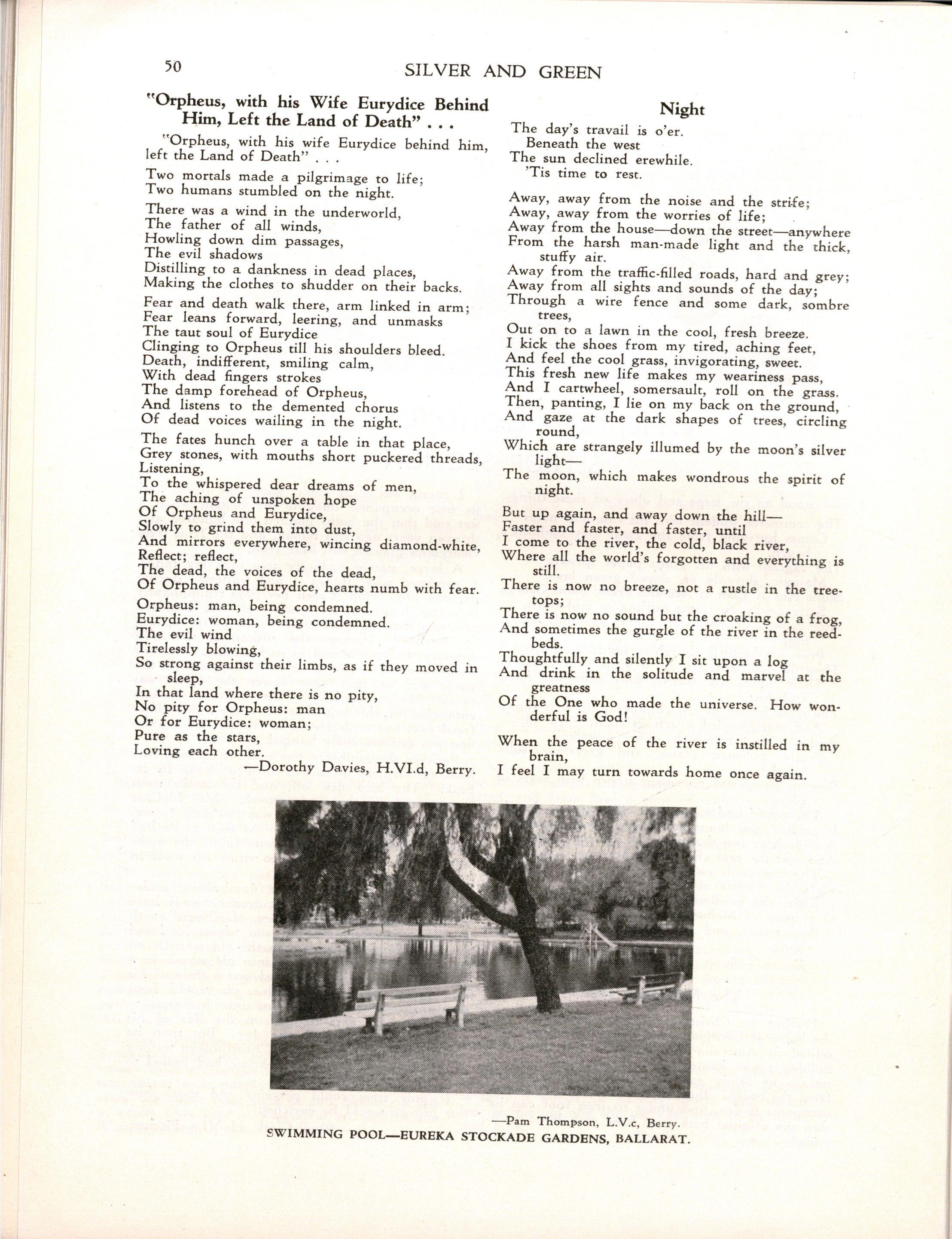
"Orpheus, with his wife Eurydice behind him, left the Land of Death"
Two mortals made a pilgrimage to life; Two humans stumbled on the night
There was a wind in the underworld, The father of all winds, Howling down dim passages, The evil shadows
Distilling to a dankness in dead places, Making the clothes to shudder on their backs
Fear and death walk there, arm linked in arm; Fear leans forward, leering, and unmasks The taut soul of Eurydice Clinging to Orpheus till his shoulders bleed. Death, indifferent, smiling calm, With dead fingers strokes
The damp forehead of Orpheus, An d listens to the demented chorus O f dead voices wailing in the night
The fates hunch over a table in that place, Grey stones, with mouths short puckered threads, Listening, T o the whispered dear dreams of men, The aching of unspoken hope O f Orpheus and Eurydice, Slowly to grind them into dust, And mirrors everywhere, wincing diamond-white, Reflect; reflect, The dead, the voices of the dead, O f Orpheus and Eurydice, hearts numb with fear Orpheus: man, being condemned Eurydice: woman, being condemned The evil wind Tirelessly blowing, So strong against their limbs, as if they moved in sleep, In that land where there is no pity, N o pity for Orpheus: man Or for Eurydice: woman; Pure as the stars, Loving each other —Dorothy Davies, H.VI.d, Berry
The day's travail is o'er. Beneath the west The sun declined erewhile Tis time to rest.
Away, away from the noise and the strife; Away, away from the worries of life; Away from the house—down the street—anywhere From the harsh man-made light and the thick, stuffy air
Away from the traffic-filled roads, hard and grey; Away from all sights and sounds of the day; Through a wire fence and some dark, sombre trees, Out on to a lawn in the cool, fresh breeze I kick the shoes from my tired, aching feet An d feel the cool grass, invigorating, sweet This fresh new life makes my weariness pass, And I cartwheel, somersault, roll on the grass Then, panting, I lie on my back on the ground, An d gaze at the dark shapes of trees, circling round,
Which are strangely illumed by the moon's silver light— The moon, which makes wondrous the spirit of night
But up again, and away down the hili— Faster and faster, and faster, until I come to the river, the cold, black river, Where all the world's forgotten and everything is still
There is now no breeze, not a rustle in the tree tops;
There is now no sound but the croaking of a frog, And sometimes the gurgle of the river in the reed beds
Thoughtfully and silently I sit upon a log And drink in the solitude and marvel at the greatness
O f the One who made the universe How won derful is God!
When the peace of the river is instilled in my brain, I feel I may turn towards home once again
The once-busy streets are empty, The lights no longer shine; The river's peace is even here— All happiness is mine!
The house is bathed in moonlight, Friendly, silent, deep— And I, at last, like all the world, A m free to go to sleep
—Claire Seamons, 15 yrs., P.VI.c, Fitchett
A Glimpse of "As You Like It" (With sincere apologies to Shakespeare.)
"Are you a native to this place?"-—Miss Cowper to trespassing day girls.
"Therefore devise with me how we may fly."— Roll-call escapees
"This house is but a butchery, Abhor it, fear it, do not enter."
—Biology Laboratory.
"M y lungs began to crow like chanticleer."— Giggler in Assembly
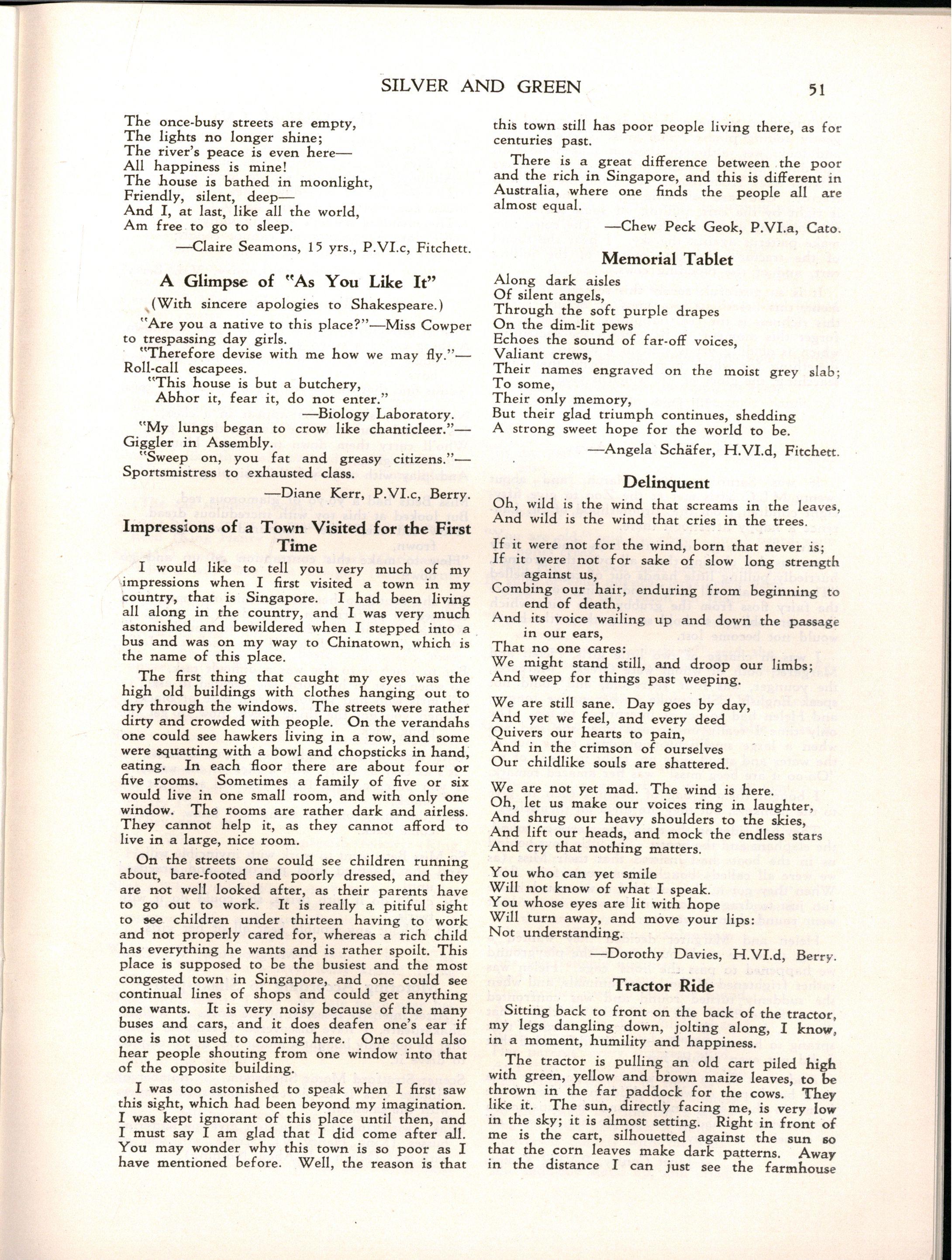
"Sweep on, you fat and greasy citizens."— Sportsmistress to exhausted class
—Diane Kerr, P.VI.c, Berry
I would like to tell you very much of my impressions when I first visited a town in my country, that is Singapore I had been living all along in the country, and I was very much astonished and bewildered when I stepped into a bus and was on my way to Chinatown, which is the name of this place
The first thing that caught my eyes was the high old buildings with clothes hanging out to dry through the windows The streets were rather dirty and crowded with people O n the verandahs one could see hawkers living in a row, and some were squatting with a bowl and chopsticks in hand, eating. In each floor there are about four or five rooms Sometimes a family of five or six would live in one small room, and with only one window The rooms are rather dark and airless They cannot help it, as they cannot afford to live in a large, nice room
On the streets one could see children running about, bare-footed and poorly dressed, and they are not well looked after, as their parents have to go out to work It is really a pitiful sight to see children under thirteen having to work and not properly cared for, whereas a rich child has everything he wants and is rather spoilt This place is supposed to be the busiest and the most congested town in Singapore, and one could see continual lines of shops and could get anything one wants It is very noisy because of the many buses and cars, and it does deafen one's ear if one is not used to coming here One could also hear people shouting from one window into that of the opposite building
I was too astonished to speak when I first saw this sight, which had been beyond my imagination I was kept ignorant of this place until then, and I must say I am glad that I did come after all Yo u may wonder why this town is so poor as I have mentioned before. Well, the reason is that
this town still has poor people living there, as for centuries past
There is a great difference between the poor and the rich in Singapore, and this is different in Australia, where one finds the people all are almost equal
Along dark aisles O f silent angels, Through the soft purple drapes O n the dim-lit pews Echoes the sound of far-off voices, Valiant crews, Their names engraved on the moist grey slab; T o some, Their only memory, But their glad triumph continues, shedding A strong sweet hope for the world to be
—Angela Schafer, H.VI.d, Fitchett,
Oh, wild is the wind that screams in the leaves, And wild is the wind that cries in the trees
If it were not for the wind, born that never is; If it were not for sake of slow long strength against us, Combing our hair, enduring from beginning to end of death, And its voice wailing up and down the passage in our ears, That no one cares: W e might stand still, and droop our limbs; And weep for things past weeping
We are still sane Day goes by day, And yet we feel, and every deed Quivers our hearts to pain, And in the crimson of ourselves Our childlike souls are shattered
We are not yet mad The wind is here Oh, let us make our voices ring in laughter, And shrug our heavy shoulders to the skies, And lift our heads, and mock the endless stars And cry that nothing matters
Yo u who can yet smile Will not know of what I speak Yo u whose eyes are lit with hope Will turn away, and move your lips: Not understanding
Sitting back to front on the back of the tractor, my legs dangling down, jolting along, I know, in a moment, humility and happiness
The tractor is pulling an old cart piled high with green, yellow and brown maize leaves, to be thrown in the far paddock for the cows They like it The sun, directly facing me, is very low in the sky; it is almost setting Right in front of me is the cart, silhouetted against the sun so that the corn leaves make dark patterns Away in the distance I can just see the farmhouse
nestling close to the ground, and all around are gently rolling plains The grass is green, fresh, and looks wet, although there has been no rain this day O n the ground are long dark shadows —fro m trees, from fences, and from the cart and tractor Cows are following us, and one of them is right by the cart, pulling off some leaves and watching me with her huge eyes. The cows, too, make patterns against the sky I hear the sound of the tractor's chugging motor, of the jolting cart, and of the plodding cows
It is so peaceful; surely this serenity, content ment, this breathless awareness of beauty, surely this richness is the real happiness! I shall never forget this moment; it has shown me something which is abiding yet is seen in a fleeting second; something for which men may spend their lives searching, the glory of life which is God.
—Jill Dibbs, Pass Vl.b, KromeIt was Saturday, 29th March, and about twenty M.L.C girls met at the Zo o to give fifty eight children from the Brotherhood of St Lau rence a happy afternoon there
Girls in charge of little boys had a very strenuous day chasing them all over the grounds, hurriedly pulling little hands out of cages labelled "These animals will bite," and trying to separate the fairy floss from the grubby little mitts which they were obliged to hold so that they (the boys) would not become lost
I was in charge of two little girls, Helen and Margaret, both of whom were Greek. Margaret, the younger, was four years old, and could not speak English She spoke in her native tongue, and Helen had to act as interpreter to me The only time I really understood what she said was when a large smelly hippopotamus came out of the water and stood, side on, right in front of us "Oo-o o it are beeg miss!" was her amazed remark
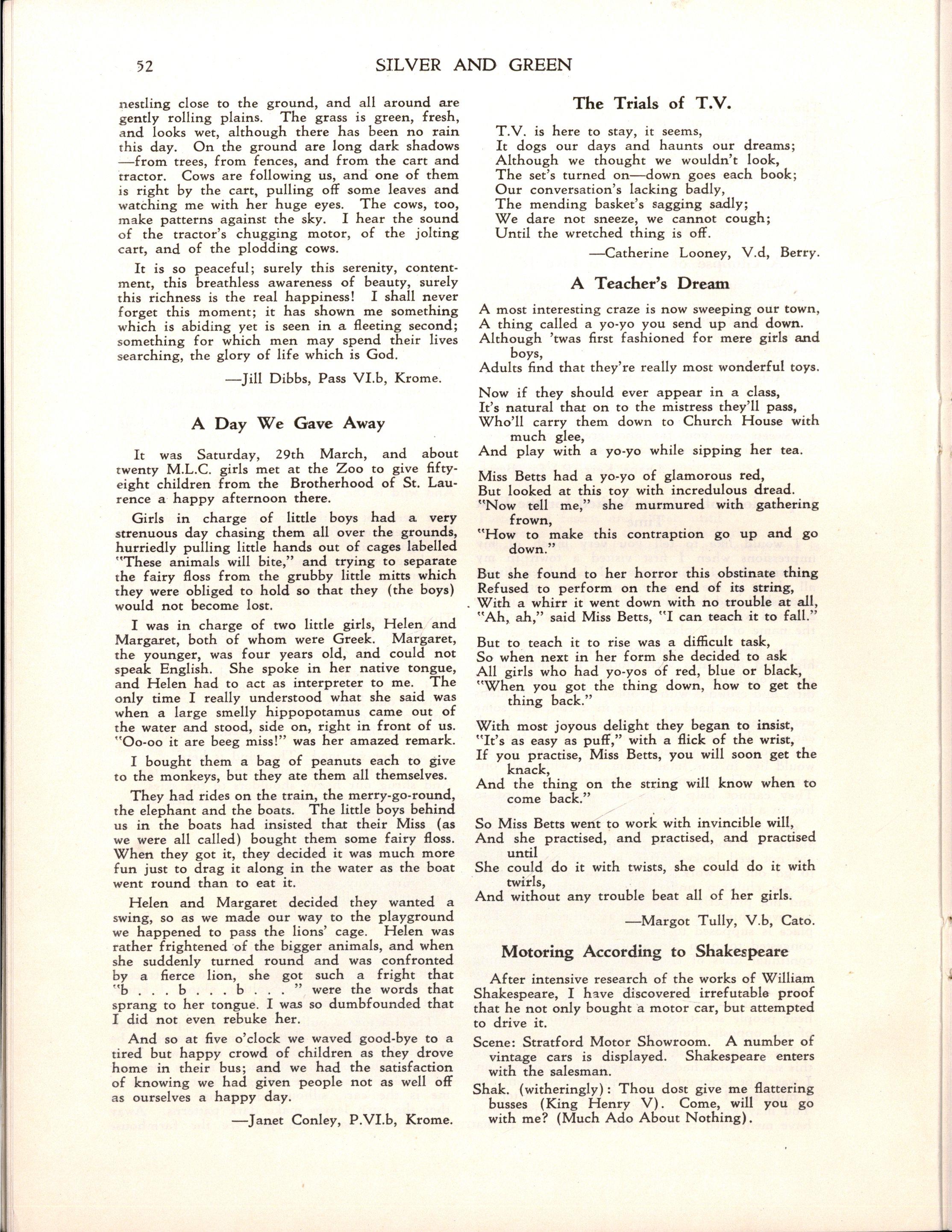
I bought them a bag of peanuts each to give to the monkeys, but they ate them all themselves
They had rides on the train, the merry-go-round, the elephant and the boats The little boys behind us in the boats had insisted that their Miss (as we were all called) bought them some fairy floss. When they got it, they decided it was much more fun just to drag it along in the water as the boat went round than to eat it
Helen and Margaret decided they wanted a swing, so as we made our way to the playground we happened to pass the lions' cage Helen was rather frightened of the bigger animals, and when she suddenly turned round and was confronted by a fierce lion, she got such a fright that " b b b " were the words that sprang to her tongue I was so dumbfounded that I did not even rebuke her.
An d so at five o'clock we waved good-bye to a tired but happy crowd of children as they drove home in their bus; and we had the satisfaction of knowing we had given people not as well off as ourselves a happy day
—Janet Conley, P.VI.b, KromeTrials of T.V .
T.V. is here to stay, it seems, It dogs our days and haunts our dreams; Although we thought we wouldn't look, The set's turned on—down goes each book; Our conversation's lacking badly, The mending basket's sagging sadly; W e dare not sneeze, we cannot cough; Until the wretched thing is off —Catherine Looney, V.d, Berry
A most interesting craze is now sweeping our town, A thing called a yo-yo you send up and down Although 'twas first fashioned for mere girls and boys, Adults find that they're really most wonderful toys
Now if they should ever appear in a class, It's natural that on to the mistress they'll pass, Who'll carry them down to Church House with much glee, And play with a yo-yo while sipping her tea
Miss Betts had a yo-yo of glamorous red, But looked at this toy with incredulous dread. "No w tell me," she murmured with gathering frown, "How to make this contraption go up and go down."
But she found to her horror this obstinate thing Refused to perform on the end of its string, With a whirr it went down with no trouble at all, "Ah , ah," said Miss Betts, " I can teach it to fall."
But to teach it to rise was a difficult task, So when next in her form she decided to ask All girls who had yo-yos of red, blue or black, "Whe n you got the thing down, how to get the thing back."
With most joyous delight they began to insist, "It's as easy as puff," with a flick of the wrist, If you practise, Miss Betts, you will soon get the knack, An d the thing on the string will know when to come back."
So Miss Betts went to work with invincible will, An d she practised, and practised, and practised until She could do it with twists, she could do it with twirls, And without any trouble beat all of her girls
—Margot Tully, V.b, Cato
After intensive research of the works of William Shakespeare, I have discovered irrefutable proof that he not only bought a motor car, but attempted to drive it
Scene: Stratford Motor Showroom A number of vintage cars is displayed Shakespeare enters with the salesman. Shak. (witheringly): Thou dost give me flattering busses (King Henry V) Come, will you go with me? (Much Ad o About Nothing)
S'man: The danger will seem sport and I will go (Twelfth Night) Mount, mount Thy seat is up on high (King Richard II)
Shak. (climbing aboard): Sit by my side and let the world slip (The Taming of the Shrew).
S'man: I will sit quiet as a lamb; I will not stir, nor wince, nor speak a word (King John) Have you thought on a place whereto you'll go? (A Winter's Tale)
Shak (nervously): My judgment is, we should not step too far (King Henry VI)
S'man: T o Warwick, then . . . (King Henry VI) . (He rotates the starting handle violently.) Heavens, can you suffer hell so to prevail? My breast I'll burst with straining and from my shoulders crack my arms asunder (King Henry VI)
(Suddenly, with a terrifying bang and clouds of black smoke, the engine starts up He climbs aboard, gasping They move off in a series of jerks.)
Shak.: I like this fair proceeding (King Henry IV) Fear we broadsides? N o (King Henry IV) .
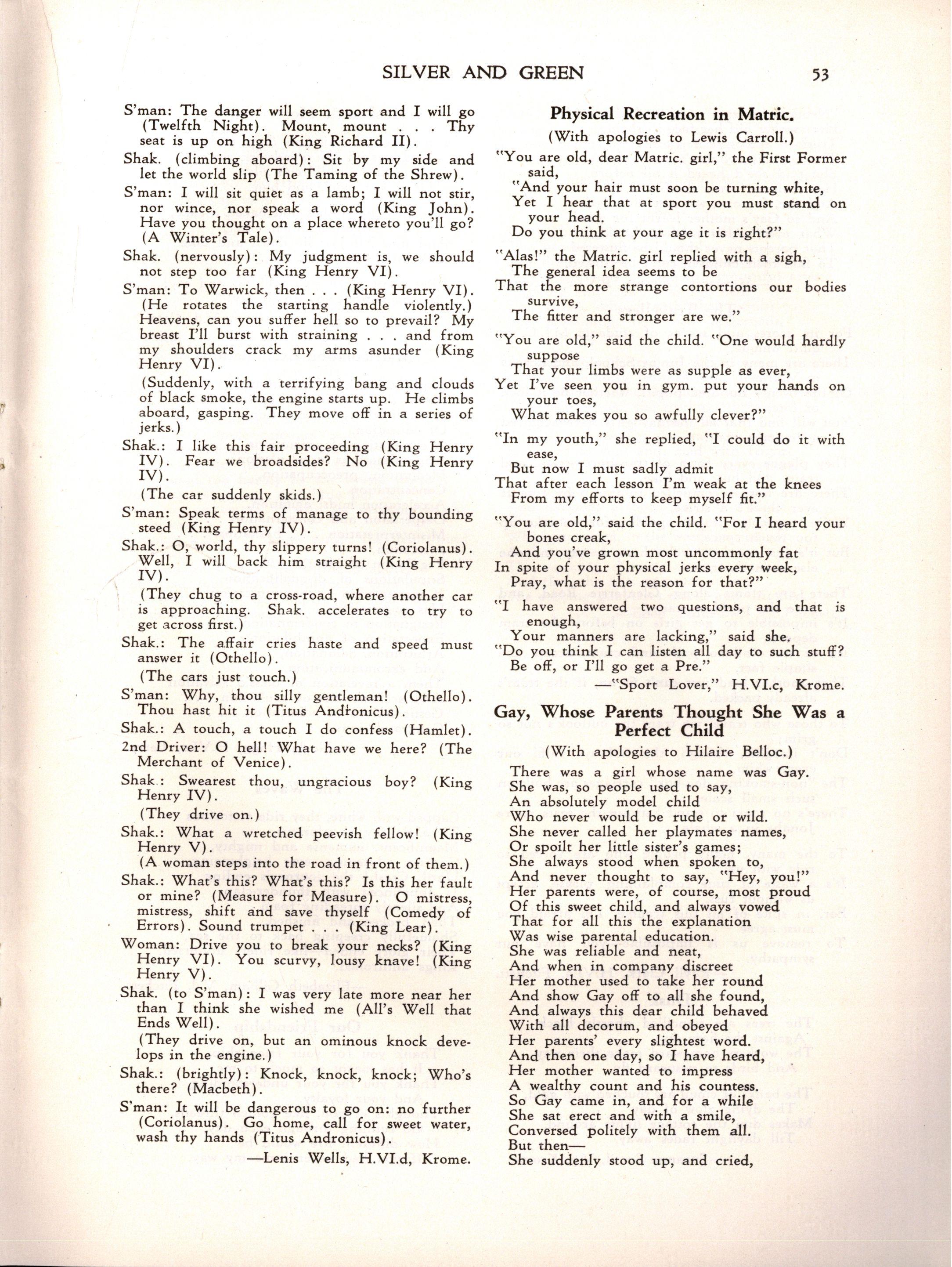
(The car suddenly skids.)
S'man: Speak terms of manage to thy bounding steed (King Henry IV)
Shak.: O, world, thy slippery turns! (Coriolanus) Well, I will back him straight (King Henry IV)
(They chug to a cross-road, where another car is approaching Shak accelerates to try to get across first.)
Shak.: The affair cries haste and speed must answer it (Othello) (The cars just touch.)
S'man: Why, thou silly gentleman! (Othello) Thou hast hit it (Titus Andronicus).
Shak.: A touch, a touch I do confess (Hamlet)
2nd Driver: O hell! What have we here? (The Merchant of Venice)
Shak : Swearest thou, ungracious boy? (King Henry IV) .
(They drive on.)
Shak.: What a wretched peevish fellow! (King Henry V)
(A woman steps into the road in front of them.)
Shak.: What's this? What's this? Is this her fault or mine? (Measure for Measure). O mistress, mistress, shift and save thyself (Comedy of Errors) Sound trumpet (King Lear)
Woman: Drive you to break your necks? (King Henry VI) Yo u scurvy, lousy knave! (King Henry V)
Shak. (to S'man) : I was very late more near her than I think she wished me (All's Well that Ends Well)
(They drive on, but an ominous knock deve lops in the engine.)
Shak.: (brightly): Knock, knock, knock; Who's there? (Macbeth)
S'man: It will be dangerous to go on: no further (Coriolanus) G o home, call for sweet water, wash thy hands (Titus Andronicus)
—Lenis Wells, H.VI.d, Krome
(With apologies to Lewis Carroll.)
"Yo u are old, dear Matric girl," the First Former said, "An d your hair must soon be turning white, Yet I hear that at sport you must stand on your head D o you think at your age it is right?"
"Alas!" the Matric girl replied with a sigh, The general idea seems to be That the more strange contortions our bodies survive, The fitter and stronger are we."
"Yo u are old," said the child "On e would hardly suppose That your limbs were as supple as ever, Yet I've seen you in gym. put your hands on your toes, What makes you so awfully clever?"
"I n my youth," she replied, " I could do it with ease, But now I must sadly admit That after each lesson I'm weak at the knees From my efforts to keep myself fit."
"Yo u are old," said the child "For I heard your bones creak, An d you've grown most uncommonly fat In spite of your physical jerks every week, Pray, what is the reason for that?"
" I have answered two questions, and that is enough, Your manners are lacking," said she "D o you think I can listen all day to such stuff? Be off, or I'll go get a Pre."
—"Spor t Lover," H.VI.c, Krome
(With apologies to Hilaire Belloc.)
There was a girl whose name was Gay She was, so people used to say, A n absolutely model child Wh o never would be rude or wild She never called her playmates names, Or spoilt her little sister's games; She always stood when spoken to, And never thought to say, "Hey, you! " Her parents were, of course, most proud O f this sweet child, and always vowed That for all this the explanation Was wise parental education She was reliable and neat, An d when in company discreet Her mother used to take her round An d show Gay off to all she found, An d always this dear child behaved With all decorum, and obeyed Her parents' every slightest word. An d then one day, so I have heard, Her mother wanted to impress A wealthy count and his countess So Gay came in, and for a while She sat erect and with a smile, Conversed politely with them all But then—
She suddenly stood up, and cried,
"Nebuchadnezzar!" and rushed outside Her mother hid her face in shame, Tried to apologise in vain.
The countess wouldn't listen, for She said she'd heard it all before Her children often disobeyed, And she, for one, was not dismayed And so Gay's mother learnt for good, What every other mother should, That parents never should be flustered To find their children can't be trusted —Margaret Dunkin, P.VI.c, Krome
For its scores and scores of students M.L.C. is quite unique, There are many in the Junior School, and dozens in Matric
Of the twenty hundred pupils, whether be it luck or fate, You will find that all the day girls have acquired a common trait
They plague every form of transport tram, and train, and bus, and bike, There are hordes compelled to tramp by foot if ever there's a strike, We' re a problem to the public, for we take up too much space, But it's just too bad, we're here to stay; no one else is in the race
There are trams along Glenferrie Road, and here the problem starts, It's impossible to get girls on before the tram departs, It's of no avail to push and cram, accept the simple fact, That another load just can't fit on, if the tram's already packed.
T o those who travel via train the outlook's not so grim; Don't imagine, though, the railways fulfil our every whim The "non-smoking, dog-box" carriages are built on such small scale, There's no room to stand between the seats, we're Jonahs in a whale
T o the many, many people who are forced to ride with us, It's a waste of time complaining, please, accept us without fuss, For, in spite of all this trouble, I'm afraid you must agree T o remove us is impossible you have our sympathy
The trees are stencilled ghostly black Against the fiery sky; The workers homeward make their way And birds to nestward fly.
The banks of cloud are touched with gold, The dying glow of day Makes dim the cottage lights around, Till daylight fades away •—Suzanne Smail, V.g, Krome
I scrubbed the kitchen floor to-day, An d washed the woodwork too I refereed the children's play Until I'm black and blue
I washed the clothes and baked a cake, An d cleared the linen chest, And now I'll just lie down and take A little, teeny rest
That's just when you walk in and say: "So this is what you do all day!"
-—Jill Gardiner, V.d, Cato
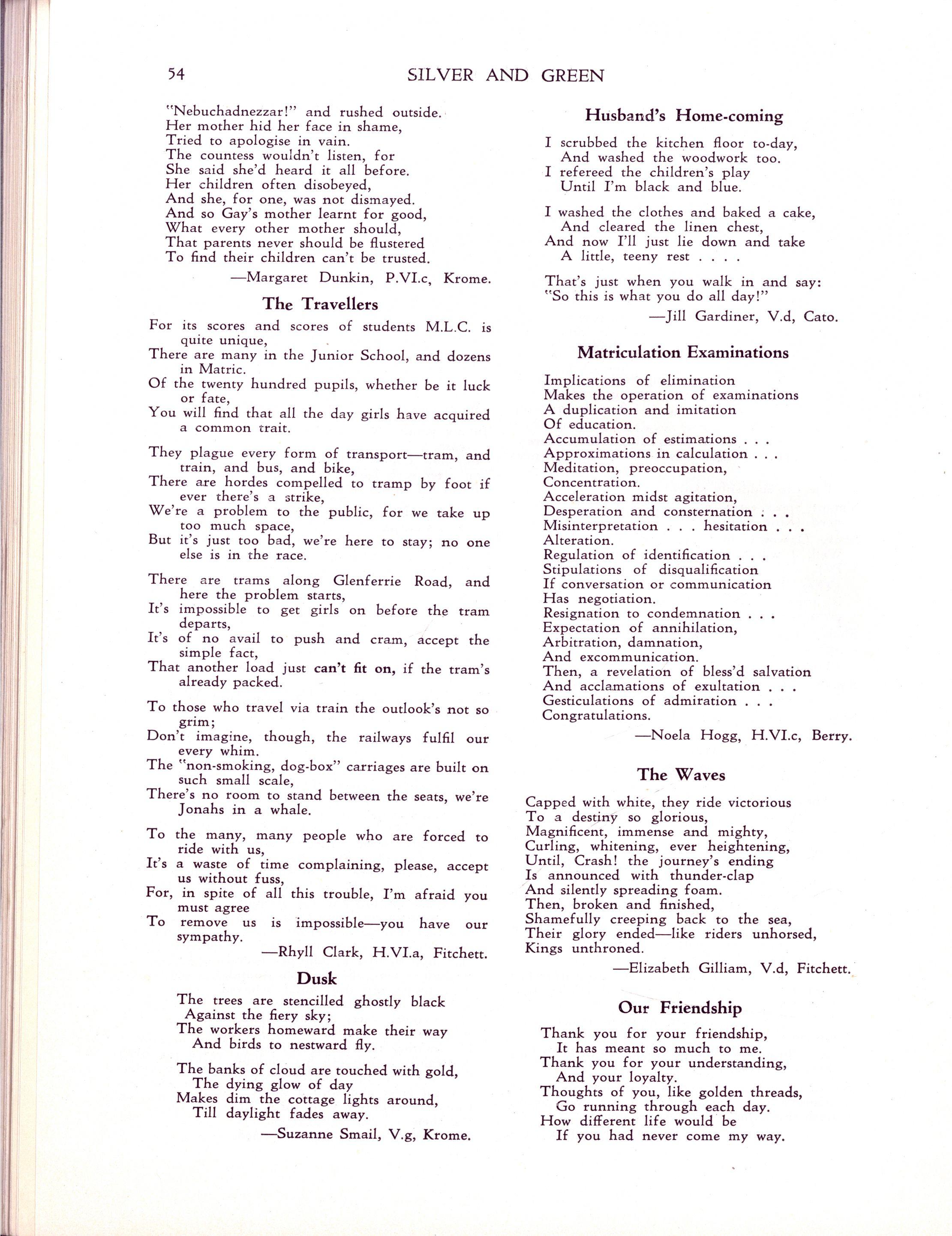
Implications of elimination Makes the operation of examinations A duplication and imitation O f education
Accumulation of estimations Approximations in calculation Meditation, preoccupation, Concentration
Acceleration midst agitation, Desperation and consternation Misinterpretation . . . hesitation . . . Alteration
Regulation of identification Stipulations of disqualification If conversation or communication Has negotiation Resignation to condemnation Expectation of annihilation, Arbitration, damnation, And excommunication Then, a revelation of bless'd salvation And acclamations of exultation Gesticulations of admiration Congratulations
—Noela Hogg, H.VI.c, Berry.
Capped with white, they ride victorious T o a destiny so glorious, Magnificent, immense and mighty, Curling, whitening, ever heightening, Until, Crash! the journey's ending Is announced with thunder-clap And silently spreading foam Then, broken and finished, Shamefully creeping back to the sea, Their glory ended like riders unhorsed, Kings unthroned
Thank you for your friendship, It has meant so much to me Thank you for your understanding, And your loyalty Thoughts of you, like golden threads, Go running through each day How different life would be If you had never come my way.
Your wonderful companionship
Has helped me through the years
In sunshine and in shadow' Yo u have shared my hopes and fears Blessings on our friendship Time can never break the bond W e shall always be good friends In this world and beyond
Joyce Mitchell, P.VI.a, Krome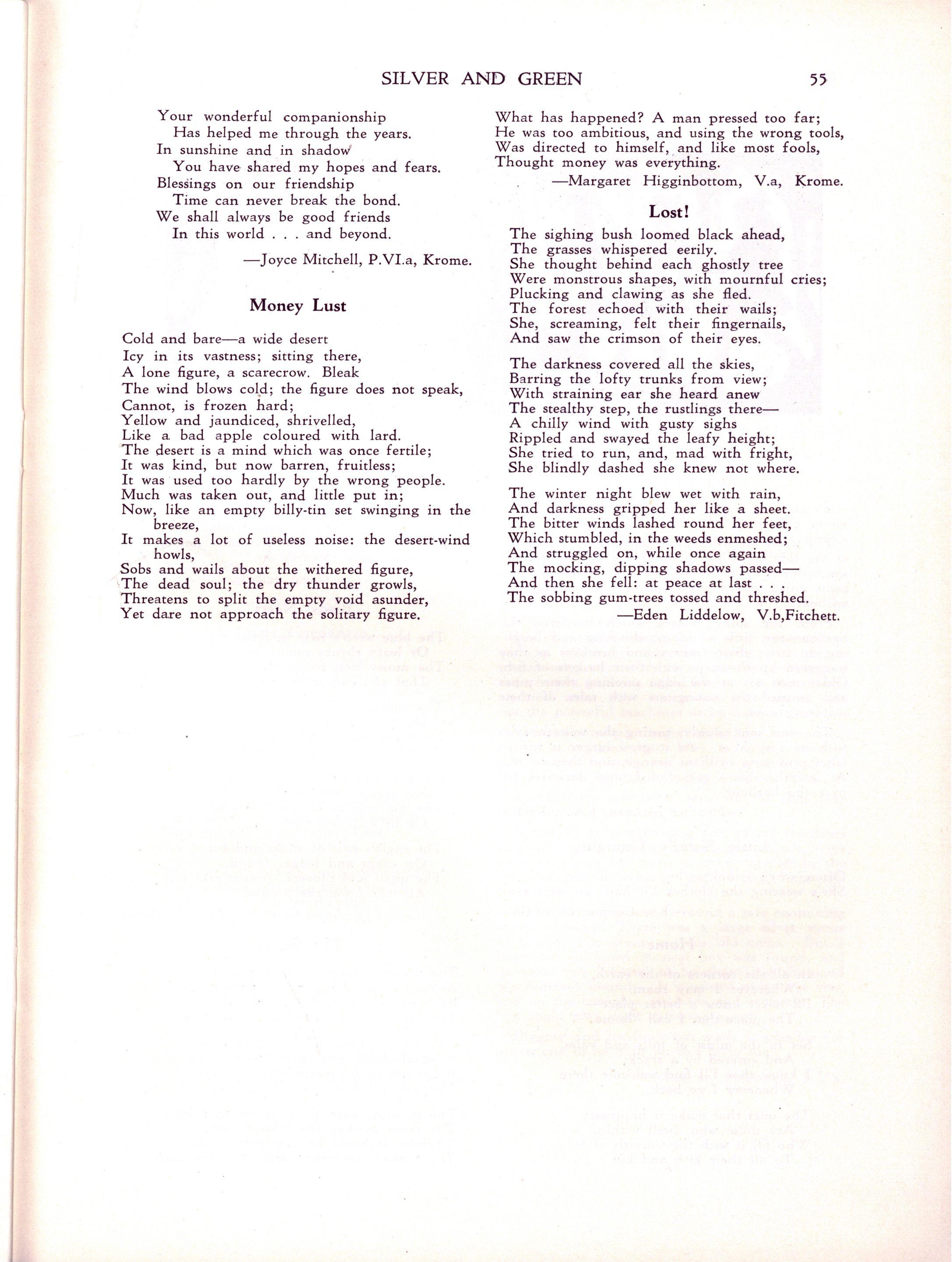
Cold and bare a wide desert Icy in its vastness; sitting there, A lone figure, a scarecrow Bleak The wind blows cold; the figure does not speak, Cannot, is frozen hard; Yellow and jaundiced, shrivelled, Like a bad apple coloured with lard The desert is a mind which was once fertile; It was kind, but now barren, fruitless; It was used too hardly by the wrong people Much was taken out, and little put in; Now, like an empty billy-tin set swinging in the breeze,
It makes a lot of useless noise: the desert-wind howls, Sobs and wails about the withered figure, The dead soul; the dry thunder growls, Threatens to split the empty void asunder, Yet dare not approach the solitary figure.
What has happened? A man pressed too far; He was too ambitious, and using the wrong tools, Was directed to himself, and like most fools, Thought money was everything Margaret Higginbottom, V.a, Krome
The sighing bush loomed black ahead, The grasses whispered eerily. She thought behind each ghostly tree Were monstrous shapes, with mournful cries; Plucking and clawing as she fled The forest echoed with their wails; She, screaming, felt their fingernails, An d saw the crimson of their eyes
The darkness covered all the skies, Barring the lofty trunks from view; With straining ear she heard anew The stealthy step, the rustlings there— A chilly wind with gusty sighs Rippled and swayed the leafy height; She tried to run, and, mad with fright, She blindly dashed she knew not where
The winter night blew wet with rain, And darkness gripped her like a sheet The bitter winds lashed round her feet, Which stumbled, in the weeds enmeshed; An d struggled on, while once again The mocking, dipping shadows passed— And then she fell: at peace at last The sobbing gum-trees tossed and threshed. Eden Liddelow, V.b,Fitchett
The water lapped against the moss-covered walls as the tide crept up to cover the old stone steps worn down by many generations Little fishing boats sailed into the harbour with the day's catch on board.
From the stone houses which bordered the harbour ran little children, shouting and laugh ing, to meet their fathers and brothers as they staggered up the steps with their baskets of fish. Older men sat at the edge smoking their pipes and amused the youngsters with tales of their seafaring days
The sun sank slowly, tinting the western skies with its rosy hues As it grew larger it turned from pink to a brilliant orange, and then to red At last the dying rays faded, and darkness fell over the harbour.
-—Heather McLean, L.V.a, KromeOften, when I look at big sister, I fear She's wearing the clothes I'll have on next year
—Kay Cooper, IV.b, Cato
In all the corners of the earth, Wherever I may roam, I'll never know a better place— The place that I call "home."
Set in the midst of hills and vales, An d entered by a track; I know that I'll find welcome there Whenever I go back
The ones that make it happiest Are those who dwell within, Wh o fill it with the warmth of love T o all their kith and kin
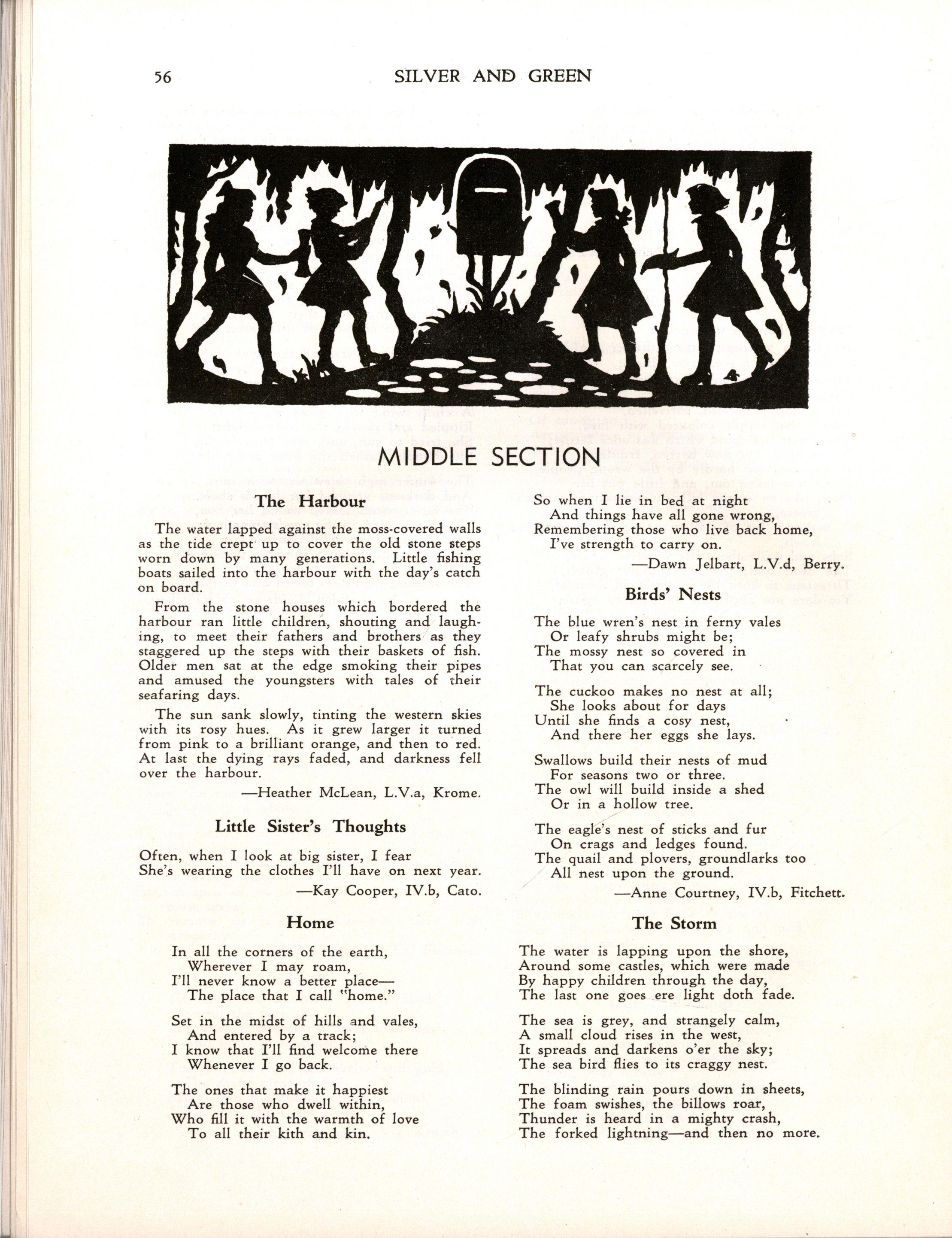
So when I lie in bed at night And things have all gone wrong, Remembering those who live back home, I've strength to carry on.
—Daw n Jelbart, L.V.d, Berry
The blue wren's nest in ferny vales Or leafy shrubs might be; The mossy nest so covered in That you can scarcely see.
The cuckoo makes no nest at all; She looks about for days Until she finds a cosy nest, An d there her eggs she lays
Swallows build their nests of mud For seasons two or three The owl will build inside a shed Or in a hollow tree.
The eagle's nest of sticks and fur O n crags and ledges found The quail and plovers, groundlarks too All nest upon the ground
—Ann e Courtney, IV.b, Fitchett
The water is lapping upon the shore, Around some castles, which were made By happy children through the day, The last one goes ere light doth fade
The sea is grey, and strangely calm, A small cloud rises in the west, It spreads and darkens o'er the sky; The sea bird flies to its craggy nest
The blinding rain pours down in sheets, The foam swishes, the billows roar, Thunder is heard in a mighty crash, The forked lightning—and then no more.
Dawn breaks, the sky clears, The golden sun peeps round and warm, The sea is still, the wind is hushed, And so ends that mighty storm
—Sandra Powell, L.V.a, Cato
The codfish lays 8,000,000 eggs during a season, of which only two come to maturity
—Jenny Coates, IV.a, Berry
Bring your little basket, quick; Don't forget a crooked stick. Where the berries grow so thick W e will have a ramble Luscious berries, ripe and black, On the hedges we'll attack, Boldly, never hanging back, Fearing cruel bramble
W e will search the leafy lanes, Blackberries reward our pains; Then we'll feast upon our gains, 'Neath the hedgerow's shelter
Crimson leaves fall slowly down, Woods are clothed in russet brown, An d as we return to town Down the rain comes pelter!
—Judith Cockrem, L.V.a, Krome
Within my little garden plot I've little helpers quite a lot: They're always running to and fro, An d help to make the flowers grow
For creeping underneath the ground May many little worms be found; They sift the soil between the roots, An d make it soft for tiny shoots
An d then the beetles day and night Clear all the rubbish out of sight; They are not very bright to see, But just as useful as can be
When all my flowers are blooming fair The bees come flying everywhere; They carry pollen as they go, An d fertilise the plants, you know.
There are so many things to do That I, of course, am busy too; But though I work there every day, I do not do so much as they.
My garden would not be so bright Unless they came there day and night • I'd like to thank them every one For all the good which they have done.
—Jan Cockrem, IV.b, Krome
Our clock is temperamental, And does not keep good time It's always twenty minutes late When it decides to chime.
In early morning coldness I hear its chime of four, But, peering at my watch, I find It's seven o'clock and more.
An d then, when I am ready, Off to my school to go, I find that it has not been fast, But really has been slow
Still, old things are familiar, And I am sentimental, So I think it doesn't matter If our clock is temperamental
On a lonely stretch of land on the east coast of Canada stands a large city. But once, many years ago, it was a thriving town, and the people who lived there traded in furs and timber
Then came a terrible disaster—there was an earthquake—and huge masses of ice and snow came tumbling down the mountains on to the town.
N o one could escape, for it all happened too quickly Although rescuers, police and search parties were sent to try to recover the people and their homes, nothing could be done as the rubble, ice and snow were too thick; also there were not the powerful machines as we have to-day
Gradually people forgot about this town, until nearly a hundred years later, when the summer was unusually warm and a huge amount of the ice and snow melted, revealing a church spire Immediately men were sent for, so that they could uncover the town
It was all very interesting for, as the machines dug away the ice and snow which remained, some parts of houses had been jammed together by the ice, and although damp and rotting, were still preserved
In one large house they found a safe containing many treasures There was a large silver statue of Cupid, also many curious old coins But a large old-fashioned musical box was found, and its value was believed to be about one thousand two hundred pounds. It consisted of a large tree, and on the branches sat birds and monkeys The box could play eight different tunes.
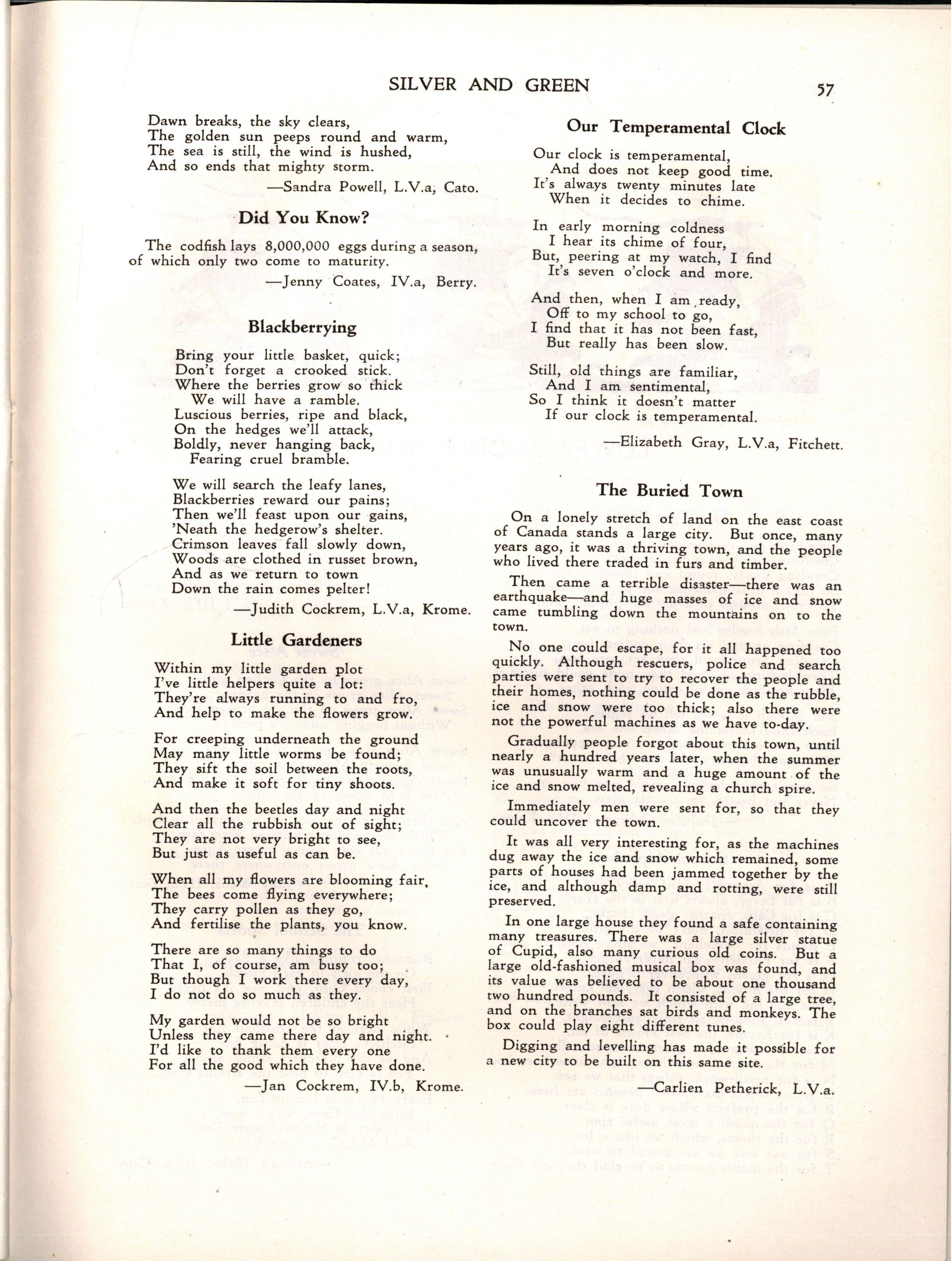
Digging and levelling has made it possible for a new city to be built on this same site
—Carlien Petherick, L.V.a.
One little girl two beetles found, Crawling slowly over the ground, Crawling slowly, round and round So into a little glass jar she popped them, T o crawl around in a jar she popped 'em
Poor little beetles had nothing to eat, Crawling around on their endless beat, Crawling around till they got sore feet, Then lacking in food they none could discover, They finished up by eating each other
Sad though it is—to tell we regret Each little beetle the other one ate Now if two leaves none, we must repeat, How many beetles could three beetles eat?
So here's your lesson—where ever you are, Never put beetles in a little glass jar —Jennifer Gordon, L.IV.e, Krome
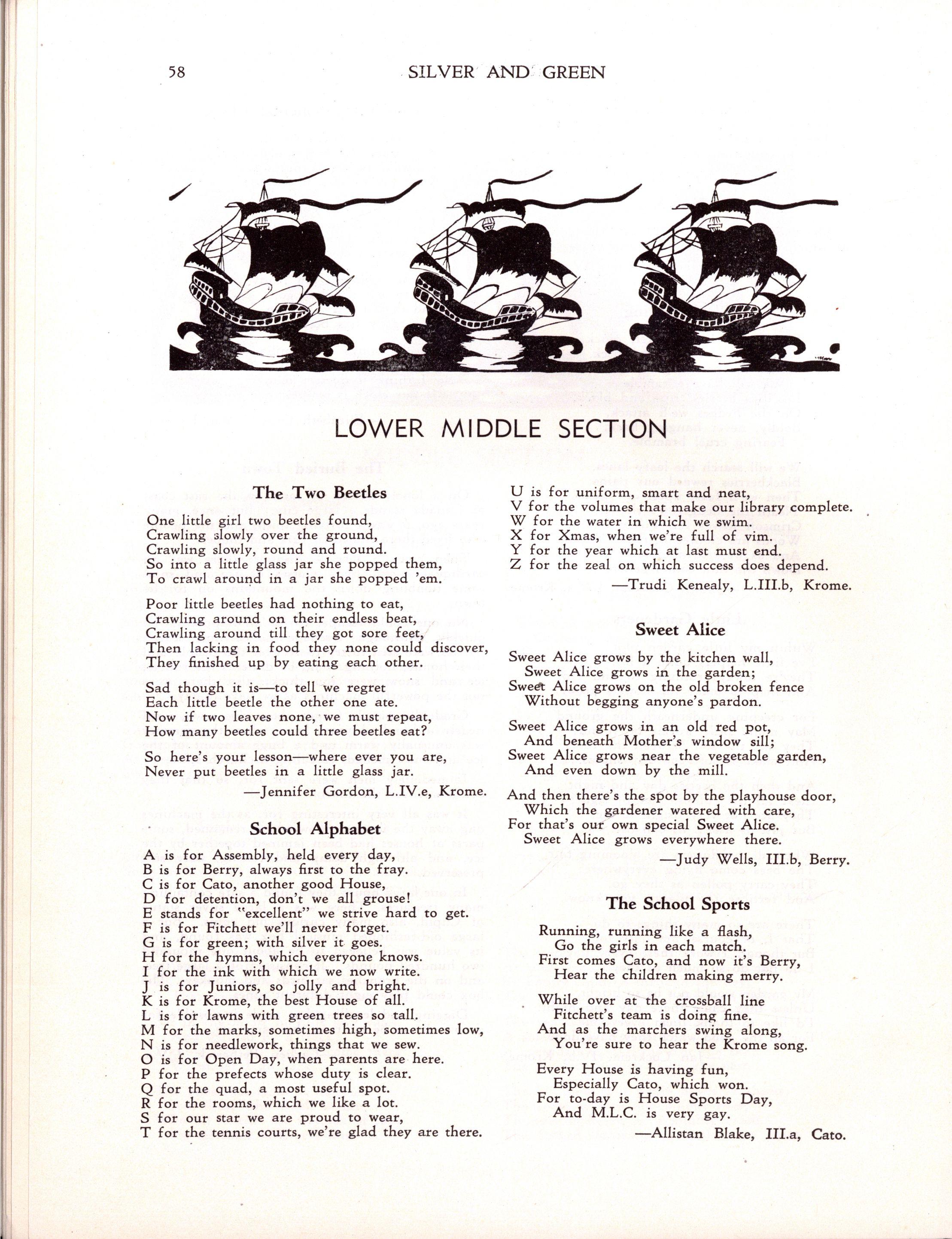
A is for Assembly, held every day, B is for Berry, always first to the fray
C is for Cato, another good House,
D for detention, don't we all grouse!
E stands for "excellent" we strive hard to get
F is for Fitchett we'll never forget
G is for green; with silver it goes
H for the hymns, which everyone knows
I for the ink with which we now write.
J is for Juniors, so jolly and bright
K is for Krome, the best House of all
L is for lawns with green trees so tall
M for the marks, sometimes high, sometimes low, N is for needlework, things that we sew
O is for Open Day, when parents are here
P for the prefects whose duty is clear
Q for the quad, a most useful spot
R for the rooms, which we like a lot.
S for our star we are proud to wear,
T for the tennis courts, we're glad they are there
U is for uniform, smart and neat, V for the volumes that make our library complete. W for the water in which we swim X for Xmas, when we're full of vim Y for the year which at last must end Z for the zeal on which success does depend —Trudi Kenealy, L.III.b, Krome
Sweet Alice grows by the kitchen wall, Sweet Alice grows in the garden; Swert Alice grows on the old broken fence Without begging anyone's pardon
Sweet Alice grows in an old red pot, And beneath Mother's window sill; Sweet Alice grows near the vegetable garden, And even down by the mill.
And then there's the spot by the playhouse door, Which the gardener watered with care, For that's our own special Sweet Alice. Sweet Alice grows everywhere there
The School Sports
Running, running like a flash, Go the girls in each match First comes Cato, and now it's Berry, Hear the children making merry While over at the crossball line Fitchett's team is doing fine. An d as the marchers swing along, You're sure to hear the Krome song
Every House is having fun, Especially Cato, which won. For to-day is House Sports Day, And M.L.C. is very gay.
—Allistan Blake, IH.a, Cato
I took a crowded bus to-day from home to M.L.C., And someone kindly moved along to make some room for me "Squeeze up," he said to everyone, "and make another seat, 'Twill save this little lady from wearing out her feet."
And what a friendly attitude, and kindly thing to say, T o make room for a stranger in such a pleasant way; It would be well with bigger things to use this little plan, And squeeze another person into any place you can
—Lorraine Bickford, L.IV.e, FitchettMy little garden Has roses in spring, Violet, daphne, And many a thing. The birds in my garden Are happy and gay, Until the evening, The end of the day, When all my garden, So silent and quiet, Sleeps till the morning, The end of the night —Shane Turnley, III.c, Fitchett
I am a little Indian, An d Running Deer's my name. I always ride a stallion, An d hang on to his mane
I never use a saddle When I ride out to the plain, A big, enormous deer I kill With spear of strong, strong cane.
My horse is big, and black, and white, An d has a silky coat; But I love best my little canoe Because it will always float.
I sometimes use great balls of string, With that some hares I snare; But mostly I look beneath the scrub, For I want to catch a bear
My father teaches me to use A bow and arrow strong Then when I kill an eagle brave, I'll have a headdress long —Georgene Mcllroy, L.IV.e, Fitchett
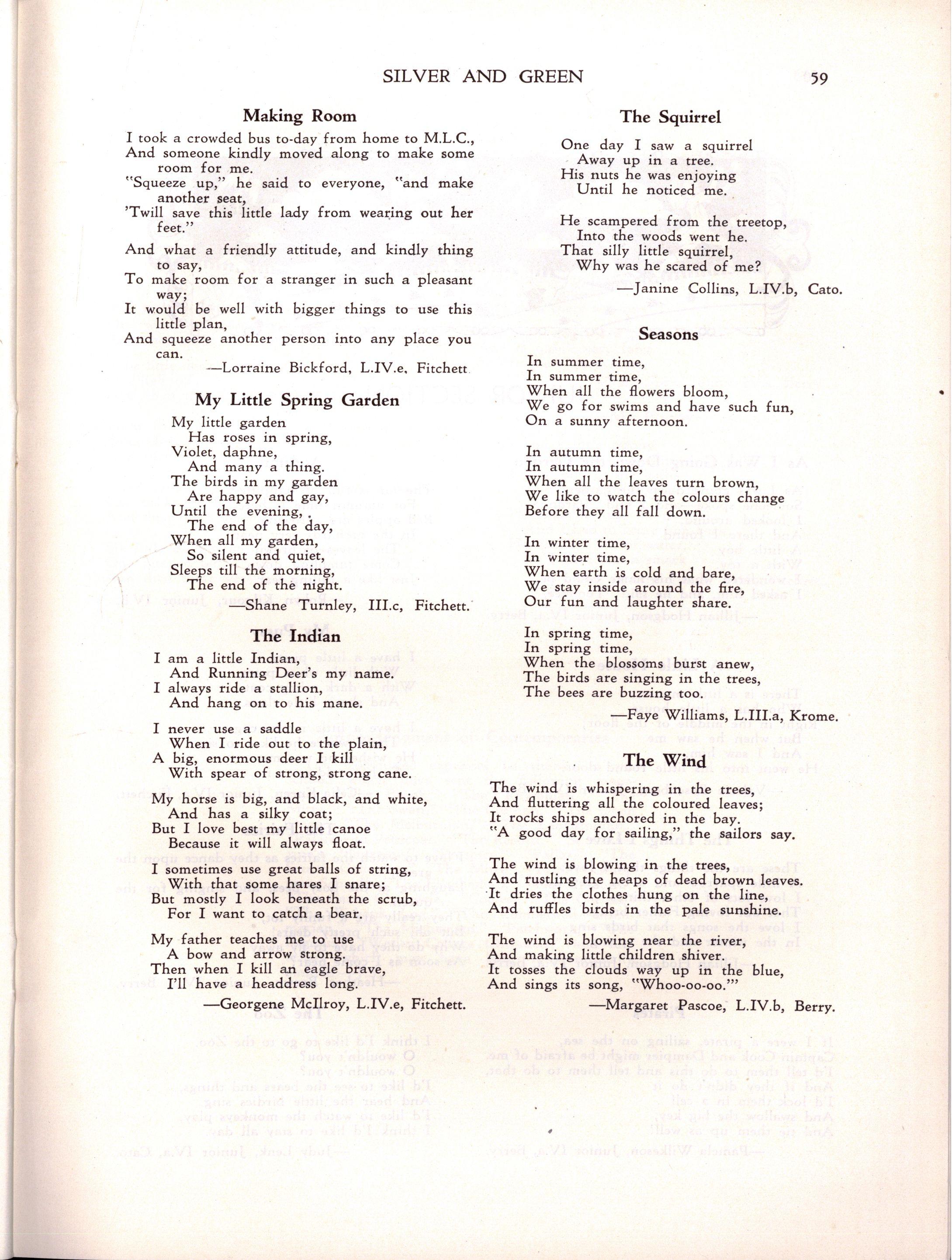
One day I saw a squirrel Away up in a tree His nuts he was enjoying Until he noticed me
He scampered from the treetop, Into the woods went he That silly little squirrel, Wh y was he scared of me?
—Janine Collins, L.IV.b, Cato
In summer time, In summer time, When all the flowers bloom, W e go for swims and have such fun, O n a sunny afternoon In autumn time, In autumn time, When all the leaves turn brown, W e like to watch the colours change Before they all fall down
In winter time, In winter time, When earth is cold and bare, W e stay inside around the fire, Our fun and laughter share
In spring time, In spring time, When the blossoms burst anew, The birds are singing in the trees, The bees are buzzing too —Faye Williams, L.III.a, Krome
The wind is whispering in the trees, An d fluttering all the coloured leaves; It rocks ships anchored in the bay " A good day for sailing," the sailors say
The wind is blowing in the trees, And rustling the heaps of dead brown leaves. It dries the clothes hung on the line, And ruffles birds in the pale sunshine
The wind is blowing near the river, An d making little children shiver It tosses the clouds way up in the blue, An d sings its song, "Whoo-oo-oo." '
—Margaret Pascoe, L.IV.b, Berry
As I was going down the garden, Someone spoke—and I said "Pardon."
I looked around, An d there I found A little boy With a toy
I wondered what his name could be, I asked him, and he said "Tommee."
—Jillian Hodgson, Junior IV.a, Berry
There is a little mouse, Wh o has a little house, Right in the middle of the floor; But when he saw me An d I saw him, He went into his little round door
—Valerie Rosenberg, Junior IV.a, Berry
These are the things that I love: A little sparrow and a big grey dove I love lots of other things That our loving Father brings I love the songs that birds sing In the winter and the spring.

—Jillian Hodgson, Junior IV.a, Berry.
If I were a pirate, sailing on the sea, Captain Cook and Dampier might be afraid of me
I'd tell them to do this and tell them to do that, An d if they didn't do it I'd lock them in a cell An d swallow the big key, An d tie them up as well!
—Pamela Wilkeson, Junior IV.a, Berry
The air is full of happiness, For autumn time is here, Red apples are arrowing In the orchards very near The leaves of brown Come tumbling down Just like a falling tear
—Roby n Kilgour, Junior IV.b
I have a little pussy With little white paws, With a dark tabby coat, And sharp little claws
I have a little mouse cage, That's where he likes to sit He wishes he was me, So he could open it
—Celia Kneen, Junior IV.a, Fitchett
I love to watch the fairies as they dance upon the green, Laughing at the busy bees, and singing for the queen They really are a funny lot, But oh, such pretty dears! Wh y do they have to fly away As soon as I come near?
—Heather Brown, Junior IV.a, Berry
I think I'd like to go to the Zoo . O wouldn't you?
O wouldn't you? I'd like to see the bears and things, An d hear the little birdies sing I'd like to watch the monkeys play, I think I'd like to stay all day
—Judy Lenk, Junior IV.a, Cato
When pretty leaves come down, down, down, When a beautiful carpet is on the ground, When the trees are all ablaze, It just looks like a lovely maze. I do think that autumn has the loveliest day
—Keryn Williams, Junior IV.b, Fitchett
Ten little dogs went to dine, One went the wrong way, And then there were nine
Nine little dogs jumped on a gate, One fell off, An d then there were eight.
Eight little dogs thought they were in heaven, Bang went a gun, And then there were seven
Seven little dogs were good at doing tricks, One broke his leg, An d then there were six
Six little dogs went for a drive, One jumped out, And then there were five.
Five little dogs went to the door, One got jammed, An d then there were four
Four little dogs tried to climb a tree, One gave up, An d there were three
Three little dogs fell in the glue, One got stuck there, An d then there were two.
Two little dogs found a gun, One shot himself, An d then there was one
One little dog ate a poisoned bun, An d it wasn't very long Before there were none.
—Pam Spry, Junior IV.a, Berry
I had a little puppy Whose name was Tim; I took him to the baths An d taught him to swim
He swam a little bit too far, An d I had to bring him back; He drank a lot of water, So I gave him a smack —Jillian Brown, Junior IV.b, Fitchett.
The Committee expresses its thanks to the schools which have sent the following maga zines: "The Brook," "The Ruytonian," "The Mitre," ":Th e Swan," "Th e Cluthan," "Th e Open Door," "The Melburnian," "Th e Lauristonian," "Palate and Petticoat," "Th e Record," "St Cathe rine's Magazine," "Prospice," "Pallas," "Th e Scotch Collegian," "Th e Mitre" (Trinity Gram mar School), "Th e Elizabethan," "The Unicorn," "The Carey Chronicle," "Coo-ee," "Th e Corian," "The Firbank Log," "Th e Camberwell Gram marian," "The Michaelian," "Patchwork," "The Pegasus," "Wesley College Chronicle," and any others which may have been unintentionally omitted.—J.S

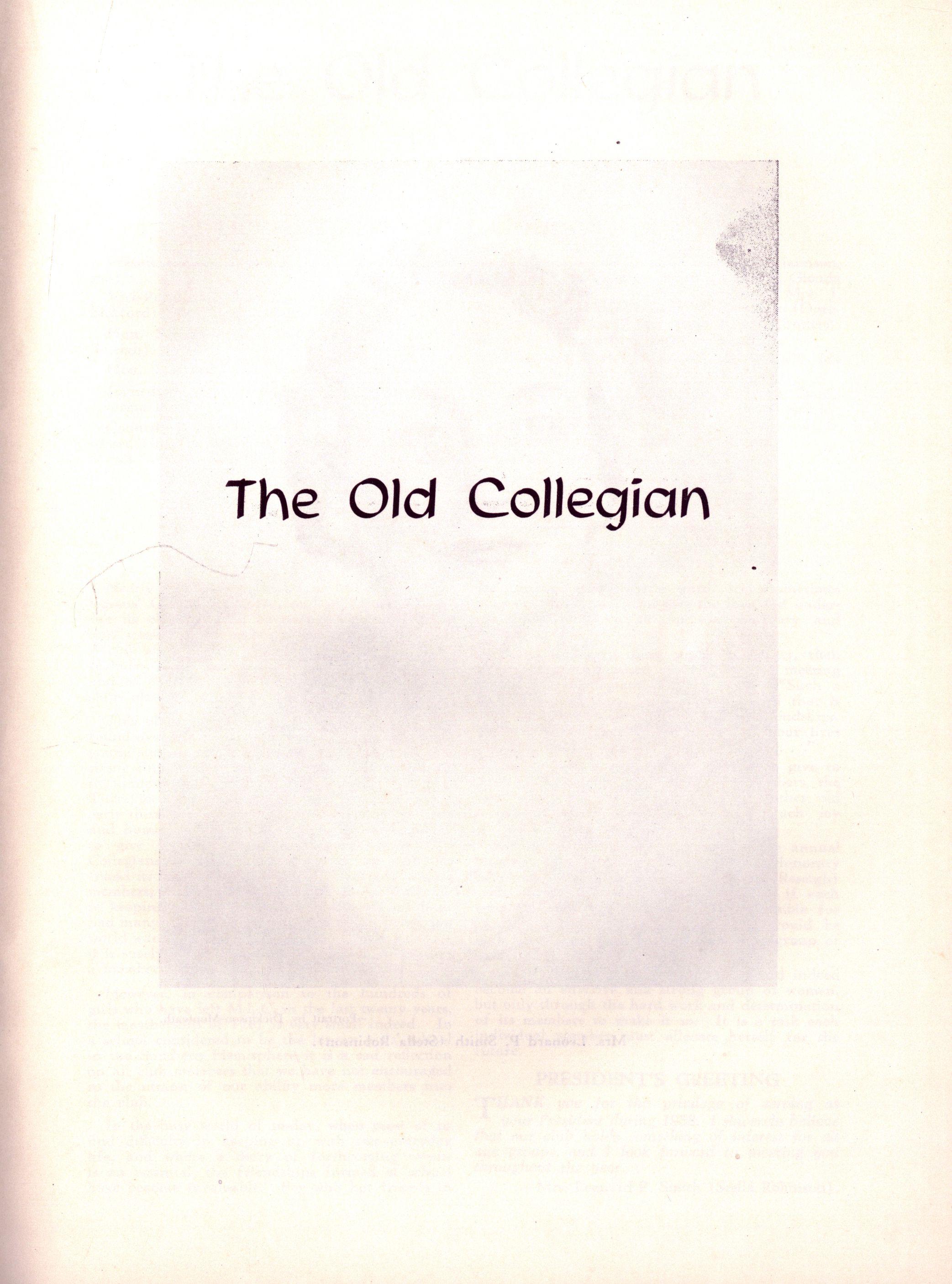
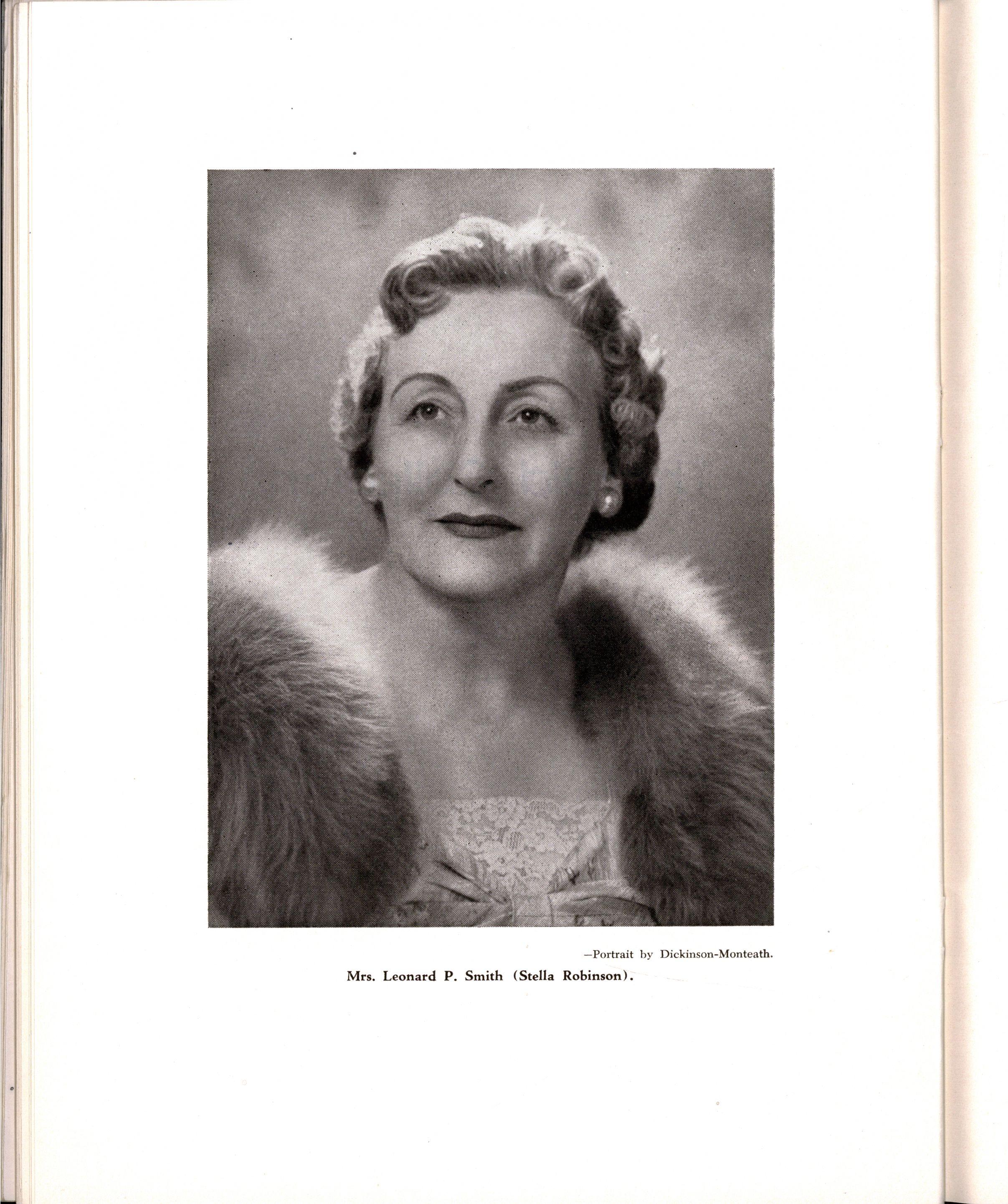
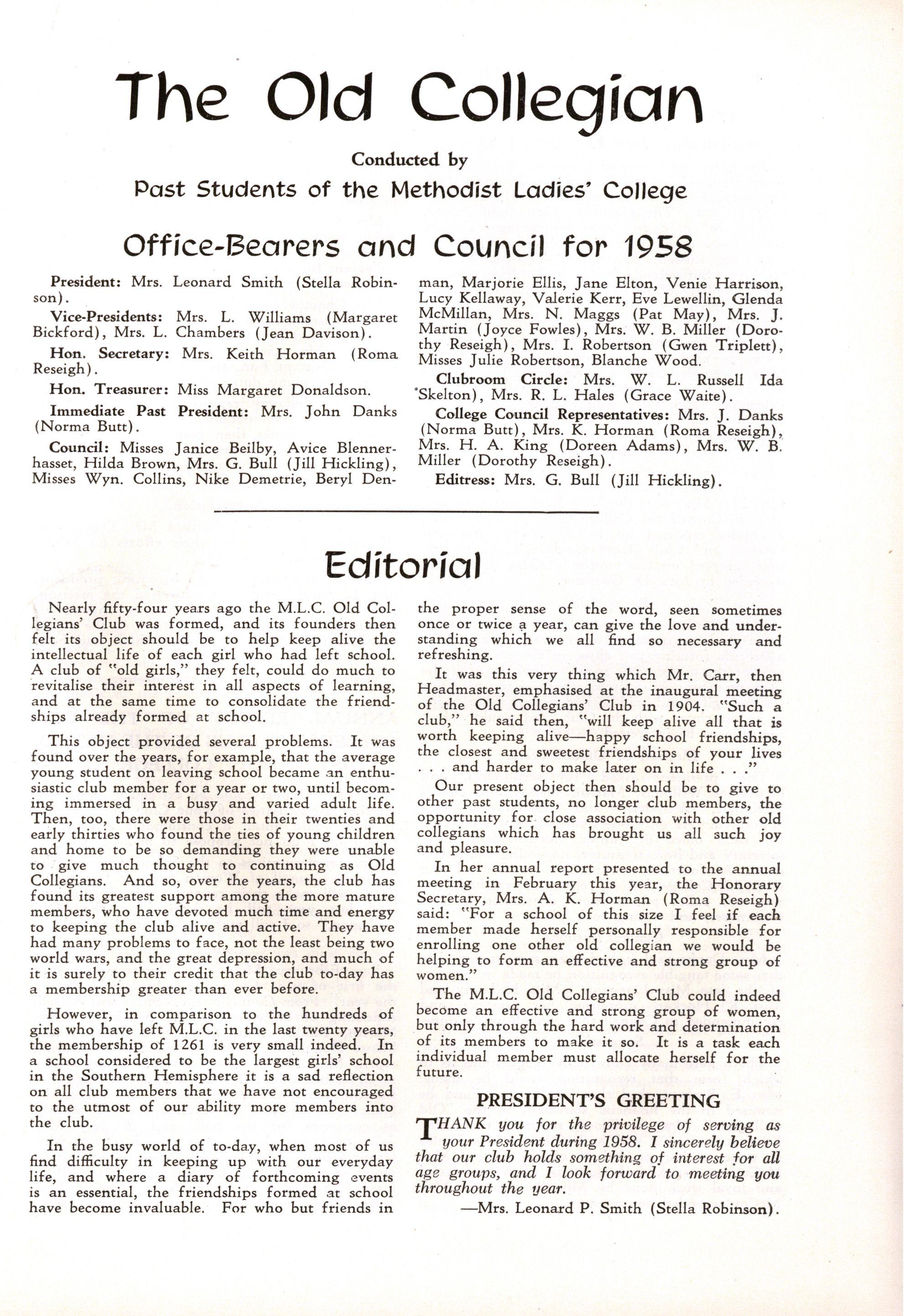
President: Mrs Leonard Smith (Stella Robin son)
Vice-Presidents: Mrs. L. Williams (Margaret Bickford), Mrs L Chambers (Jean Davison)
Hon. Secretary: Mrs. Keith Horman (Roma Reseigh)
Hon. Treasurer: Miss Margaret Donaldson.
Immediate Past President: Mrs John Danks (Norma Butt).
Council: Misses Janice Beilby, Avice Blenner hasset, Hilda Brown, Mrs G Bull (Jill Hickling), Misses Wyn Collins, Nike Demetrie, Beryl Den
man, Marjorie Ellis, Jane Elton, Venie Harrison, Lucy Kellaway, Valerie Kerr, Eve Lewellin, Glenda McMillan, Mrs N Maggs (Pat May), Mrs J. Martin (Joyce Fowles), Mrs W B Miller (Doro thy Reseigh), Mrs. I. Robertson (Gwen Triplett), Misses Julie Robertson, Blanche Wood Clubroom Circle: Mrs W L Russell Ida "Skelton), Mrs R L Hales (Grace Waite) College Council Representatives: Mrs. J. Danks (Norma Butt), Mrs K Horman (Roma Reseigh), Mrs. H. A. King (Doreen Adams), Mrs. W . B. Miller (Dorothy Reseigh)
Editress: Mrs. G. Bull (Jill Hickling).
Nearly fifty-four years ago the M.L.C. Old Col legians' Club was formed, and its founders then felt its object should be to help keep alive the intellectual life of each girl who had left school A club of "old girls," they felt, could do much to revitalise their interest in all aspects of learning, and at the same time to consolidate the friend ships already formed at school
This object provided several problems It was found over the years, for example, that the average young student on leaving school became an enthu siastic club member for a year or two, until becom ing immersed in a busy and varied adult life Then, too, there were those in their twenties and early thirties who found the ties of young children and home to be so demanding they were unable to give much thought to continuing as Old Collegians And so, over the years, the club has found its greatest support among the more mature members, who have devoted much time and energy to keeping the club alive and active. They have had many problems to face, not the least being two world wars, and the great depression, and much of it is surely to their credit that the club to-day has a membership greater than ever before
However, in comparison to the hundreds of girls who have left M.L.C in the last twenty years, the membership of 1261 is very small indeed In a school considered to be the largest girls' school in the Southern Hemisphere it is a sad reflection on all club members that we have not encouraged to the utmost of our ability more members into the club
In the busy world of to-day, when most of us find difficulty in keeping up with our everyday life, and where a diary of forthcoming events is an essential, the friendships formed at school have become invaluable. For who but friends in
the proper sense of the word, seen sometimes once or twice a year, can give the love and under standing which we all find so necessary and refreshing
It was this very thing which Mr Carr, then Headmaster, emphasised at the inaugural meeting of the Old Collegians' Club in 1904 "Such a club," he said then, "will keep alive all that is worth keeping alive—happy school friendships, the closest and sweetest friendships of your lives . . . and harder to make later on in life . . ."
Our present object then should be to give to other past students, no longer club members, the opportunity for close association with other old collegians which has brought us all such joy and pleasure.
In her annual report presented to the annual meeting in February this year, the Honorary Secretary, Mrs. A. K. Horman (Roma Reseigh) said: "For a school of this size I feel if each member made herself personally responsible for enrolling one other old collegian we would be helping to form an effective and strong group of women."
The M.L.C Old Collegians' Club could indeed become an effective and strong group of women, but only through the hard work and determination of its members to make it so It is a task each individual member must allocate herself for the future
rT"THANK you for the privilege of serving as your President during 1958. I sincerely believe that our club holds something of interest for all age groups, and I look forward to meeting you throughout the year.
—Mrs Leonard P Smith (Stella Robinson)
The fifty-third annual meeting, held in the Assembly Hall at the College on Tuesday, 18th February, 1958, at 8 p.m., when 139 members were present The president, Mrs John Danks, was in the chair, and after welcoming members, apologies were received from Mesdames Lowther, Twycross, Russell, Kilvington, Tapner, Riviere, Hocking, Sutherland, Noke, and Misses Nance, Clark, Beilby, Collins, Walmsley, Bennett, Westcott and Pettigrew
The minutes of the previous annual meeting, held on 12th February, 1957, were accepted and taken as read on the motion of Mrs W B Miller, seconded by Miss L Kellaway The minutes of the special general meeting held on 13 th February, 1958, were read and received on the motion of Mrs W Garden, seconded by Mrs I Robertson
The hon secretary read the Club report, the hon treasurer presented the financial statements, Mrs. Max Muir read the Song Book appeal report, Mrs F Cornell the College Council report, Mrs R Hales reported on behalf of the National Council and Club Room Circle These reports were adopted on the motion of Mrs J Martin, seconded by Mrs D Glenister
Mrs Danks presented Miss Hilda Brown (retiring hon. treasurer after twelve years) with a brooch forming two clips, in sincere apprecia tion of the many years spent in looking after the Club finances. Miss Brown thanked the members for her gift, and said it had always been a joy to be associated with the Club, and would always continue to be interested
The president asked for scrutineers, and Mesdames Williams, Martin, Hendy and Misses McKenzie, Benjamin and Donaldson were appointed As only one nomination was received for each office of junior vice-president, hon secretary and hon treasurer, no voting was neces sary. As fourteen nominations for Council and seven for College Council representatives had been received, ballot papers were distributed by the scrutineers, and voting took place
Mrs Danks said it had been suggested to her that some tangible recognition be made in memory of the late Miss Horsman. Miss Kellaway and Miss R Flockart supported her remarks, and recommended to Council that something be done
There were many constructive suggestions as to which form that recognition could be made Miss E Barker asked that the Chapel Fund be itemised in the financial statement in the "Ol d Collegian." Mrs. S. Woo d reported that Mrs. Kilvington was not well, and requested Mrs Danks to write to her on behalf of the Club Mrs McCutcheon spoke in high praise of the wonderful and loyal work done by Miss Brown, and Mrs. McCoy seconded her remarks
Mrs. Chambers asked that it be placed on record "the sweat, toil and tears" given by Miss Ruth Flockart for the Jubilee Concert
Mrs Cornell asked that the younger members be given every encouragement to participate in all Club activities.
Mrs W B Miller, after consultation with Dr Wood , suggested that the Domestic Science facili ties could possibly be made available to the Old Collegians for evening lessons This idea received enthusiastic support from those present.
Mrs Chambers suggested using a School etching as a Christmas card as a money raiser Mrs Danks thanked Mrs Grieves for acting as our hon auditor. Mrs. Grieves, in reply, recommended that an assistant hon treasurer be appointed to help in the many duties of the hon treasurer
Miss L Kellaway reported that 27 1st Class Honours had been obtained at the last examina tions Mrs Danks then read the result of the two elections, and welcomed Misses Marg Lansbury and Ruth Bilney, who represent on the Council the immediate past pupils.
Miss Blanche Woo d thanked Mrs. Danks and all Council members for their efforts on behalf of the members during 1957.
Mrs. Danks welcomed the incoming president, Mrs L Smith, who then addressed the meeting The Song Book Appeal Committee invited all present to be their guests at supper in the foyer, in appreciation of the support which had been given them during the appeal
Mrs Smith then closed the meeting
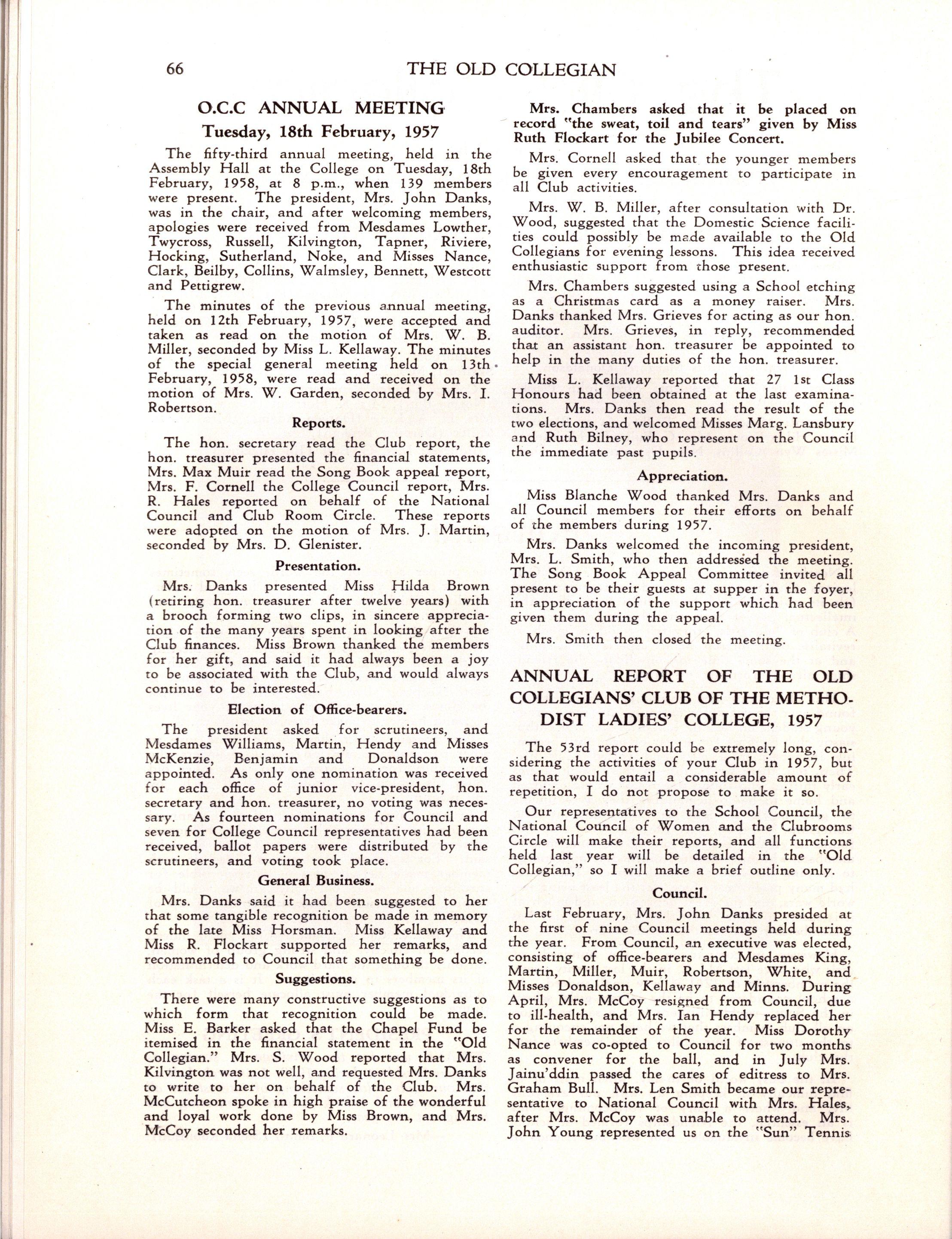
The 53rd report could be extremely long, con sidering the activities of your Club in 1957, but as that would entail a considerable amount of repetition, I do not propose to make it so
Our representatives to the School Council, the National Council of Wome n and the Clubrooms Circle will make their reports, and all functions held last year will be detailed in the "Ol d Collegian," so I will make a brief outline only.
Last February, Mrs John Danks presided at the first of nine Council meetings held during the year From Council, an executive was elected, consisting of office-bearers and Mesdames King, Martin, Miller, Muir, Robertson, White, and Misses Donaldson, Kellaway and Minns During April, Mrs. McCoy resigned from Council, due to ill-health, and Mrs Ian Hendy replaced her for the remainder of the year. Miss Dorothy Nance was co-opted to Council for two months as convener for the ball, and in July Mrs Jainu'ddin passed the cares of editress to Mrs Graham Bull Mrs Len Smith became our repre sentative to National Council with Mrs Hales, after Mrs McCoy was unable to attend Mrs John Young represented us on the "Sun" Tennis
Committee, and Mesdames Buick and Hinton organised our golf day and represented us on the "Sun" Golf Committee Miss Eve Lewellin attended to many social messages, and Mrs. Grieve again became our hon auditor
The first occasion of meeting new members was held at School in March, which was followed by Mr John Casson as guest speaker on 10th May, and the Annual Ball on 5th June Anniversary.
Last year, being the 75th Anniversary of our old School, we were invited to two garden parties given by the School, and a Church Service held at Auburn Many Old Collegians combined with the School Choir for the Jubilee Concert T o mark the occasion of the 75 th Anniversary, many Old Collegians contributed to a gift of £75 to the School Miss Phyll Minns was responsible for the thought and the collection, which was a wonderful effort
The Annual Dinner was held at the School, also our own Garden Party in December
A special General Meeting was held on 13th February, 1958, when the Constitution was revised, a copy of which will be available as soon as possible Facilities.
As you all know, we have had the facilities of the College at our disposal throughout the year, and I hope every member realises that without those facilities this Club would be hard pressed to remain active Regardless of our numerous requests, Dr Woo d and Miss Ball were most co-operative and helpful, and our gratitude can best be expressed by furthering our activities along the ideals of the School and our Club
Judging by reports, our Branches in Adelaide, Canberra, Geelong, Hobart and Sydney are active, and it is to be hoped that more Old Collegians far and wide will join into groups
Mesdames Max Muir and W B Miller must be congratulated on the result of the Song Book Appeal, and it is hoped that the result will be forthcoming soon.
Your reactions to the formation of a Dramatic Group and Basket ball team were discouraging; however, we refused to be discouraged, and I hope to hear from you very soon This year an Old Collegians' blazer is available
Enrolment day in November was most encour aging, when 222 new members joined us Our numbers total only 1261 For a school of this size, I feel if each member made herself person ally responsible for enrolling one other Old Collegian, we would be helping to form an effec tive and strong group of women Will you please accept this responsibility?
Throughout last year a system of appointing a convener for each social function was adopted, and, coupled with the untiring help of many girls, who addressed thousands of envelopes, folded thousands of circulars and despatched our magazines, my job last year was made easier My very sincere thanks to all those girls who offered their help and then carried out their jobs so well
T o Council members, and particularly to Mrs Danks, I am most grateful—a rather overwhelm ing prospect turned into a very happy year, and I am looking forward to another year with you all
ROM A HORMAN , Hon SecretaryA fund has been established as a memorial to the late Miss Nora Horsman Many persons, ar Hawthorn and Elsternwick M.L.C., associated with Miss Horsman have indicated their desire to con tribute to this fund, and in this way to express their appreciation for all Miss Horsman meant to them during her twenty years at M.L.C
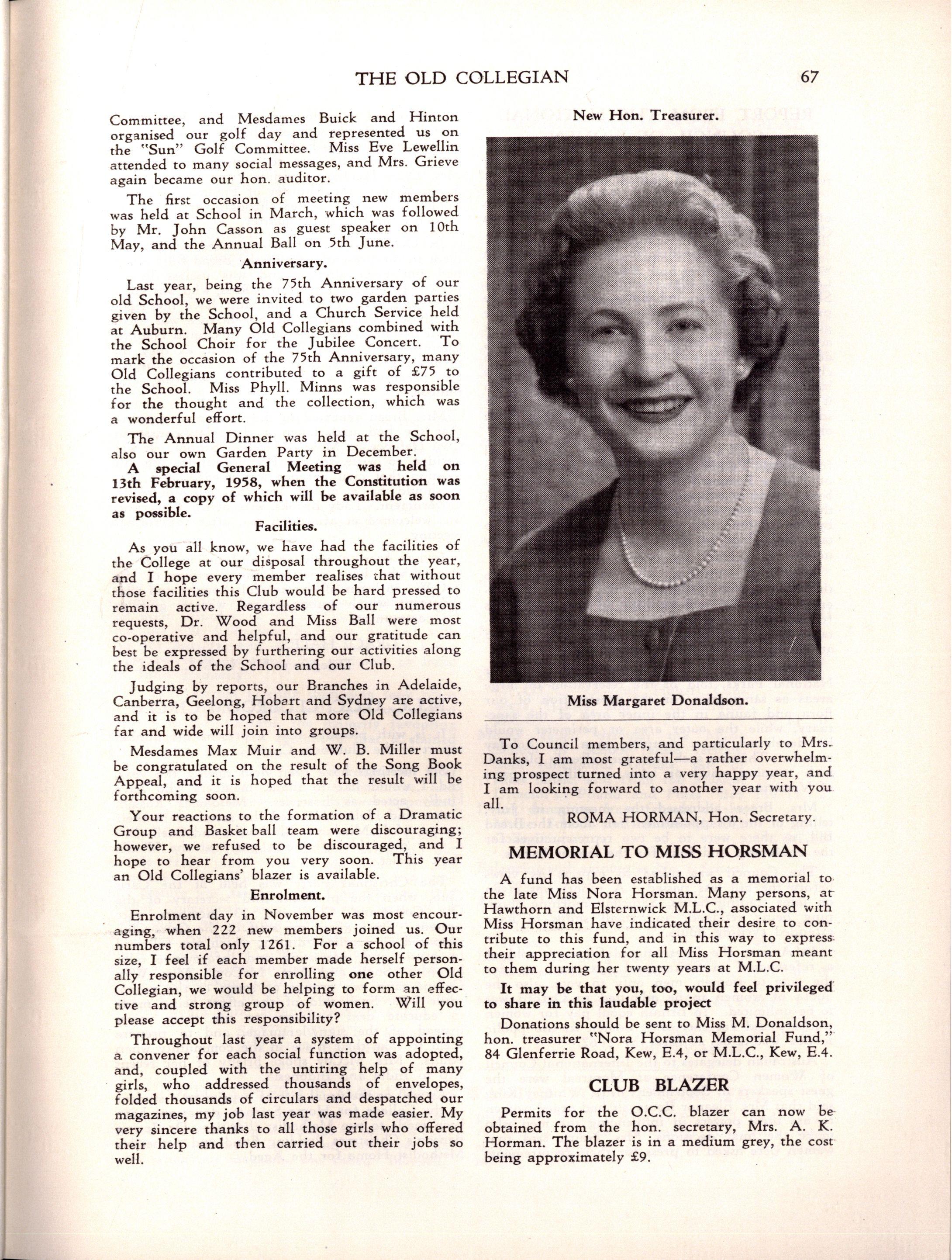
It may be that you, too, would feel privileged to share in this laudable project
Donations should be sent to Miss M. Donaldson, hon treasurer "Nora Horsman Memorial Fund," 84 Glenferrie Road, Kew, E.4, or M.L.C., Kew, E.4
Permits for the O.C.C blazer can now be obtained from the hon secretary, Mrs A K Horman The blazer is in a medium grey, the cost being approximately £9
It is with pleasure that I present the annual report of the National Council of Women
At the February meeting, a report was given of the Australian National Council of Women Conference held in January in Tasmania
At the annual meeting in March, Mrs Breen was elected president. A welcome was given to Lady Selleck and Mrs Bolte, then Mrs Frank Shann reported on television, saying that the programmes reflected a demand for trash, while good live programmes made here were not accepted, many importations were unsuitable, depicting violence and cruelty, and aggression in children. Lady Paton stated that during the last two years films had shown improvement, also it was undesirable that television should reflect social evils, as this could have a boomerang effect on the community
In April Mrs Frost, secretary of the Council for Female Prison Reform, showed a colour film of Fairlea Female Prison, and told of the effort being made to educate public opinion to the fact that a prisoner was punished by the sentence, not by the prison, and also to fit the prisoner to take her place in the community, and to stay in it
Miss Linda Phillips, who was a delegate to the International Council of the World Confer ence at Venice, told in May of the discussions for the press, arts, and letters, and of the advan tages of young musicians and singers who studied at British and European centres
In June Mr Crosbie Morrison, Director for National Parks, told of the reservation of large areas as sanctuaries for the preservation of our flora and fauna in the inner area of the sanc tuary, while the outer area or perimeter would be developed as a camping area for holiday makers Thirteen such sites were already planned, with running water or lakes, in different parts of Victoria
Mrs Breen addressed the meeting in July, telling of the disappointment felt about the Bread Bill, as there were to be two representatives for the consumers and four for the master bakers
The Council was asked to express its views before the bill was passed A report was given on later trading hours, Saturday morning shop ping being retained, and small shops to have extended evening hours.
In August, the International Secretary told of a referendum in Switzerland next year to give the vote to women, men only to vote, also the quota of women to be admitted to Oxford was }o be unlimited. In Britain equal pay for women teachers and for men and women in the public Jervice would be in force by 1962.
Australian delegates to the International Council of Women Conference at Montreal were the guest speakers in September Mrs Whitney King said that Mrs. Eleanor Roosevelt had urged women to use their powers in influencing the men who make the final decisions Mrs Nairn said that women were asked to press for their requirements
on radio and television programmes. In Canada Mrs Bright Parker was told that National Council of Women members had a round table conference with Cabinet Ministers to express their views Mrs Olga Jacolyn, a visitor from Ceylon, who is Secretary to the Minister of Finance, said that women had great power through exerting their influence in the right quarter
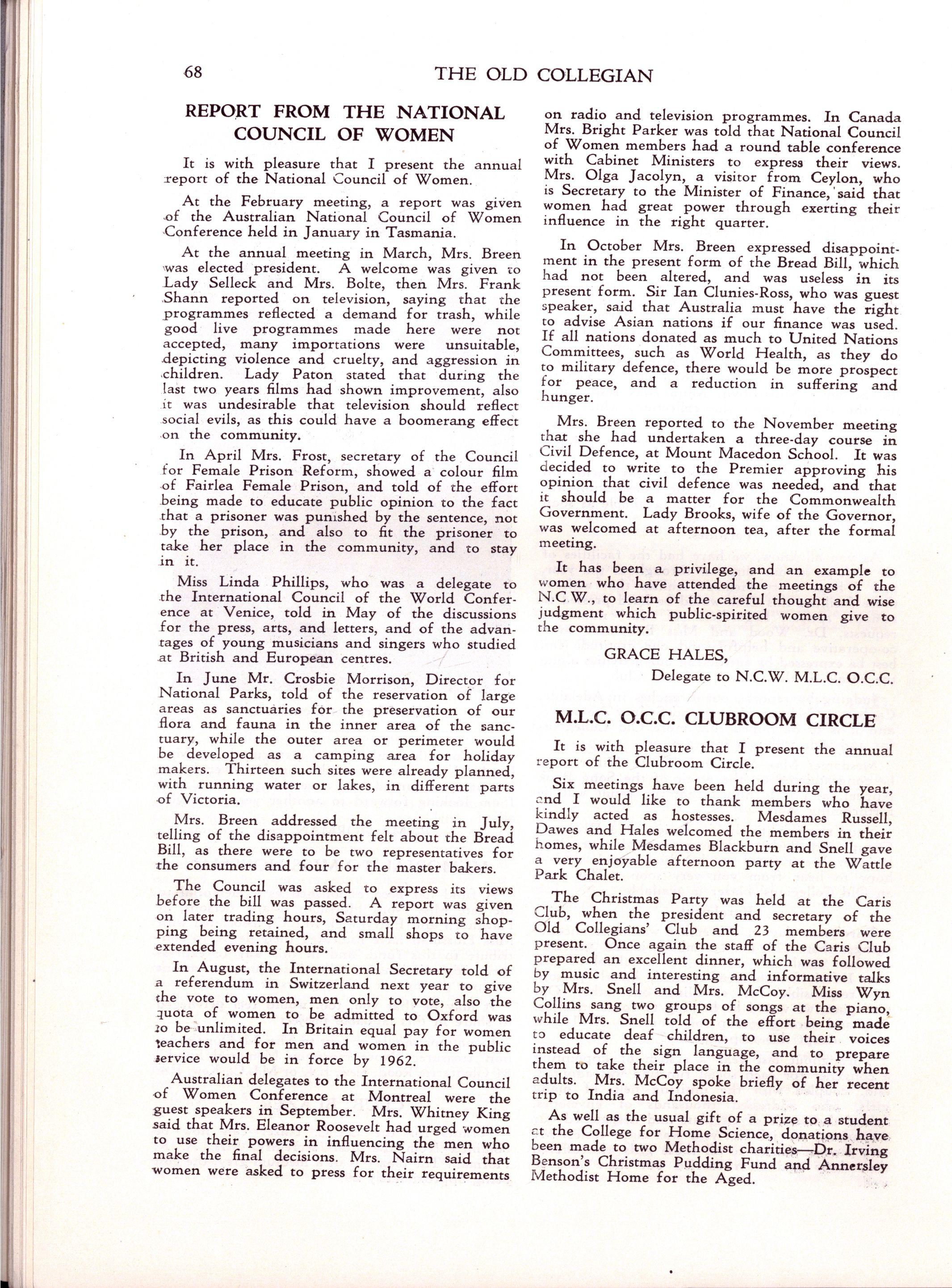
In October Mrs Breen expressed disappoint ment in the present form of the Bread Bill, which had not been altered, and was useless in its present form. Sir Ian Clunies-Ross, who was guest speaker, said that Australia must have the right to advise Asian nations if our finance was used If all nations donated as much to United Nations Committees, such as World Health, as they do to military defence, there would be more prospect for peace, and a reduction in suffering and hunger.
Mrs Breen reported to the November meeting that she had undertaken a three-day course in Civil Defence, at Mount Macedon School It was decided to write to the Premier approving his opinion that civil defence was needed, and that it should be a matter for the Commonwealth Government Lady Brooks, wife of the Governor, was welcomed at afternoon tea, after the formal meeting
It has been a privilege, and an example to women who have attended the meetings of the N.C W „ to learn of the careful thought and wise judgment which public-spirited women give to the community
GRACE HALES, Delegate to N.C.W M.L.C O.C.C
It is with pleasure that I present the annual report of the Clubroom Circle
Six meetings have been held during the year, and I would like to thank members who have kindly acted as hostesses Mesdames Russell Dawes and Hales welcomed the members in their homes, while Mesdames Blackburn and Snell gave a very enjoyable afternoon party at the Wattle Park Chalet
^
The Christmas Party was held at the Caris Club, when the president and secretary of the Old Collegians' Club and 23 members were present Once again the staff of the Caris Club prepared an excellent dinner, which was followed by music and interesting and informative talks by Mrs Snell and Mrs McCoy Miss Wy n Collins sang two groups of songs at the piano, while Mrs. Snell told of the effort being made to educate deaf children, to use their voices instead of the sign language, and to prepare them to take their place in the community when adults Mrs McCoy spoke briefly of her recent trip to India and Indonesia
As well as the usual gift of a prize to a student ct the College for Home Science, donations have been made to two Methodist charities—Dr Irving Benson's Christmas Pudding Fund and Annersley Methodist Home for the Aged
W e extend to those who have suffered sorrow our sympathy, and our loving thoughts to those who have been unable to join us, because of illness
In conclusion, we wish to thank those members who by their help and co-operation have made this year such a happy one
GRACE HALES, Hon. Secretary.
Reading through the 1957 balance sheet, many Old Collegians will be surprised to know of the Chapel Fund This, through an oversight, was not previously included in a balance sheet, therefore we thought it would be of interest to members to learn particulars.
At the annual meeting in September, 1946, the president reported a meeting of representa tives of the College and Parents' Association (re the Chapel Appeal), which she and the secretary had attended, when it was decided to hold a Fair in April, 1947, at the College It was resolved that the Old Collegians' Club give its full support to this, Misses Kathleen Kelly and Edith Barker being appointed joint conveners, with a sub-committee Result of Fair was £2321, the O.C.C stalls realising £245
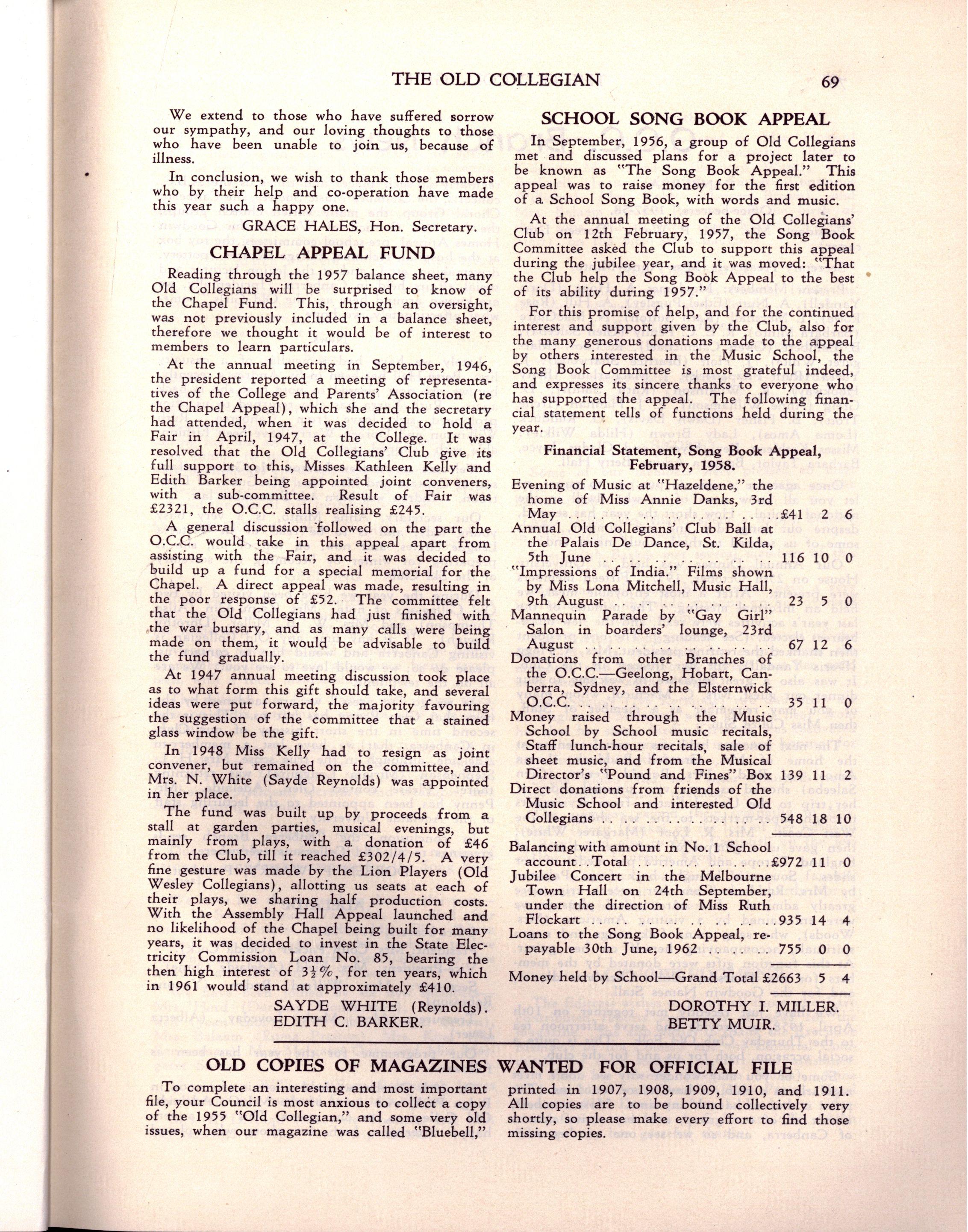
A general discussion "followed on the part the O.C.C would take in this appeal apart from assisting with the Fair, and it was decided to build up a fund for a special memorial for the Chapel A direct appeal was made, resulting in the poor response of £52 The committee felt that the Old Collegians had just finished with the war bursary, and as many calls were being made on them, it would be advisable to build the fund gradually
At 1947 annual meeting discussion took place as to what form this gift should take, and several ideas were put forward, the majority favouring the suggestion of the committee that a stained glass window be the gift
In 1948 Miss Kelly had to resign as joint convener, but remained on the committee, and Mrs N White (Sayde Reynolds) was appointed in her place
The fund was built up by proceeds from a stall at garden parties, musical evenings, but mainly from plays, with a donation of £46 from the Club, till it reached £302/4/5 A very fine gesture was made by the Lion Players (Old Wesley Collegians), allotting us seats at each of their plays, we sharing half production costs. With the Assembly Hall Appeal launched and no likelihood of the Chapel being built for many years, it was decided to invest in the State Elec tricity Commission Loan No 85, bearing the then high interest of 3i% , for ten years, which in 1961 would stand at approximately £410
T o complete an interesting and most important file, your Council is most anxious to collect a copy of the 1955 "Ol d Collegian," and some very old issues, when our magazine was called "Bluebell,"
In September, 1956, a group of Old Collegians met and discussed plans for a project later to be known as "The Song Book Appeal." This appeal was to raise money for the first edition of a School Song Book, with words and music
At the annual meeting of the Old Collegians' Club on 12th February, 1957, the Song Book Committee asked the Club to support this appeal during the jubilee year, and it was moved: "That the Club help the Song Book Appeal to the best of its ability during 1957."
For this promise of help, and for the continued interest and support given by the Club, also for the many generous donations made to the appeal by others interested in the Music School, the Song Book Committee is most grateful indeed, and expresses its sincere thanks to everyone who has supported the appeal The following finan cial statement tells of functions held during the year
Financial Statement, Song Book Appeal, February, 1958
Evening of Music at "Hazeldene," the home of Miss Annie Danks, 3rd May .£41 2 6
Annual Old Collegians' Club Ball at the Palais De Dance, St Kilda, 5th June 116 10 0
"Impressions of India." Films shown by Miss Lona Mitchell, Music Hall, 9th August 23 5 0
Mannequin Parade by "Gay Girl" Salon in boarders' lounge, 23rd August 67 12 6
Donations from other Branches of the O.C.C.—Geelong, Hobart, Can berra, Sydney, and the Elsternwick O.C.C 35 11 0
Money raised through the Music School by School music recitals, Staff lunch-hour recitals, sale of sheet music, and from the Musical Director's "Pound and Fines" Box 139 11 2
Direct donations from friends of the Music School and interested Old Collegians 548 18 10
Balancing with amount in No 1 School account Total £972 11 0 Jubilee Concert in the Melbourne Town Hall on 24th September, under the direction of Miss Ruth Flockart 935 14 4
Loans to the Song Book Appeal, re payable 30th June, 1962 755 0 0
Money held by School—Grand Total £2663 5 4
printed in 1907, 1908, 1909, 1910, and 1911 All copies are to be bound collectively very shortly, so please make every effort to find those missing copies
Office-bearers, 1957-58
President: Mrs John P Warry (Doreen Lan caster)
Secretary-Treasurer: Miss Anne Minto
Present Members: Mesdames A Hogg (Doris Yandell), A. Nutt (Ethel Pugsley), A. Hill (Rose Rowe), I Marshall (Kath Sutton), N MacGuire (Barbara Minto), R E C Penny (Glen Saleeba), B Lambert (Gwen Carmichael), R Loof (Mar garet White), J Holt (Beatrice Sharwood), J Yarra (Ruth Fitzpa.trick), I. MacFarlane (Betty Hookway), R Wilkinson (Ruth Smith), D Greig (Anne Williamson), E J Hannan (Irene Trott), B Fisher (Dawn Davis), G Rudduck (Loma Amos), Lady Brown (Hilda Wilkie) ; Misses Kathleen Key, Myrtle and Gladys Joyce, Barbara Taylor, Barbara Atkins, Betty Hall
Once again it is time to put pen to paper, to let you all know news of us who dwell in the national capital How short the year has seemed, despite our long, dry and hot summer, which some of us seemed to think would never end
Our Annual Dinner was held at University House on 25th October, 1957 Fifteen members were present After a most enjoyable meal, we held an informal meeting The minutes of the last year's activities were read, and the new office bearers elected (See heading.) The new president then thanked the retiring president, Mrs A Hogg (Doris Yandall), for her interest in the Club It was also a great pleasure to welcome to our dinner our guest, Mrs. C. Macnicol, whom many of you may remember as a member of Staff, then Miss Claire Sim
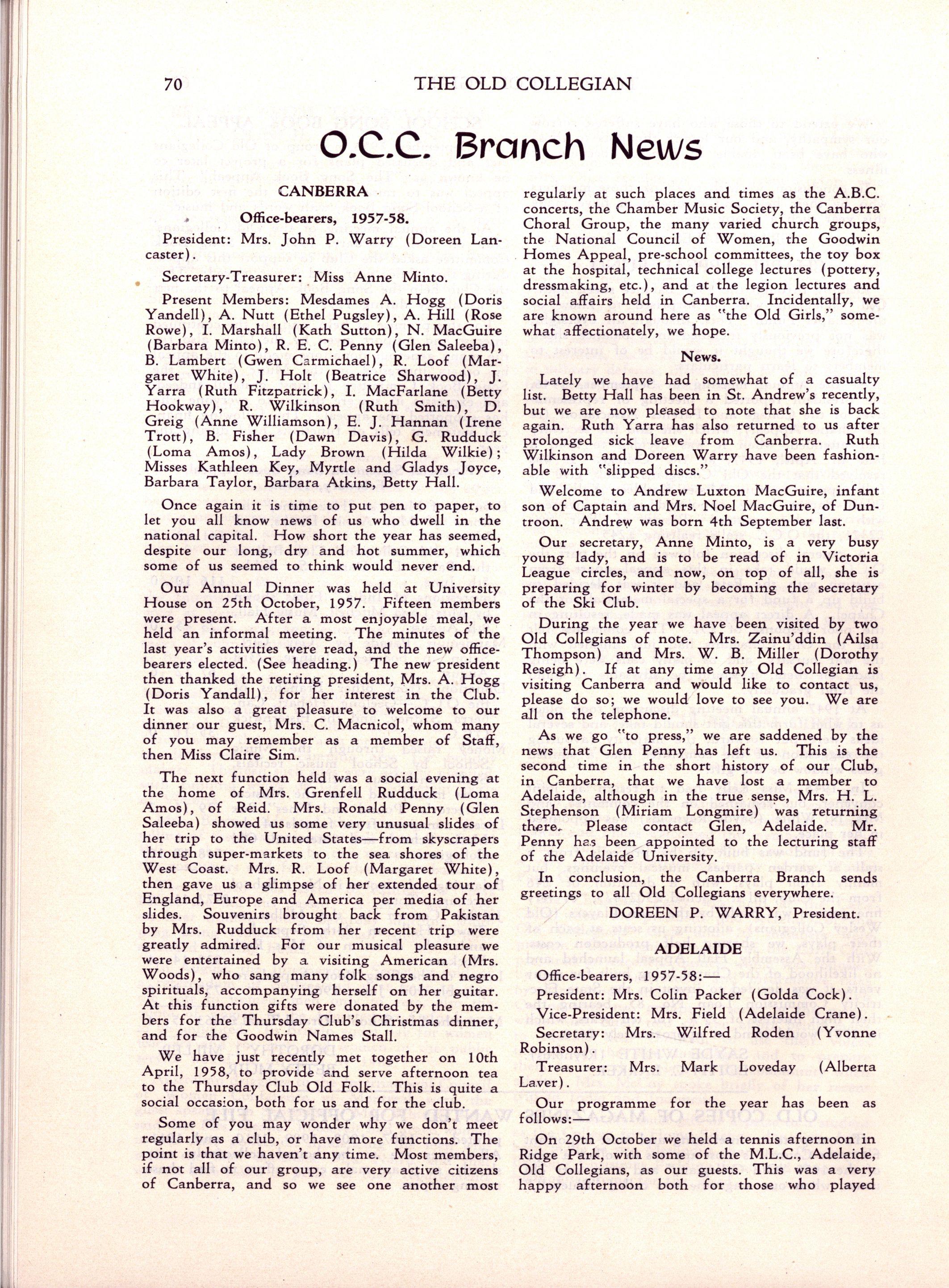
The next function held was a social evening at the home of Mrs Grenfell Rudduck (Loma Amos) , of Reid Mrs Ronald Penny (Glen Saleeba) showed us some very unusual slides of her trip to the United States—from skyscrapers through super-markets to the sea shores of the West Coast Mrs R Loof (Margaret White), then gave us a glimpse of her extended tour of England, Europe and America per media of her slides. Souvenirs brought back from Pakistan by Mrs Rudduck from her recent trip were greatly admired For our musical pleasure we were entertained by a visiting American (Mrs Woods) , who sang many folk songs and negro spirituals, accompanying herself on her guitar. At this function gifts were donated by the mem bers for the Thursday Club's Christmas dinner, and for the Goodwin Names Stall
W e have just recently met together on 10th April, 1958, to provide and serve afternoon tea to the Thursday Club Old Folk This is quite a social occasion, both for us and for the club.
Some of you may wonder why we don't meet regularly as a club, or have more functions The point is that we haven't any time Most members, if not all of our group, are very active citizens of Canberra, and so we see one another most
regularly at such places and times as the A.B.C concerts, the Chamber Music Society, the Canberra Choral Group, the many varied church groups, the National Council of Women, the Goodwin Homes Appeal, pre-school committees, the toy box at the hospital, technical college lectures (pottery, dressmaking, etc.), and at the legion lectures and social affairs held in Canberra. Incidentally, we are known around here as "the Old Girls," some what affectionately, we hope
Lately we have had somewhat of a casualty list Betty Hall has been in St Andrew's recently, but we are now pleased to note that she is back again Ruth Yarra has also returned to us after prolonged sick leave from Canberra Ruth Wilkinson and Doreen Warry have been fashion able with "slipped discs."
Welcome to Andrew Luxton MacGuire, infant son of Captain and Mrs Noel MacGuire, of Dun troon Andrew was born 4th September last
Our secretary, Anne Minto, is a very busy young lady, and is to be read of in Victoria League circles, and now, on top of all, she is preparing for winter by becoming the secretary of the Ski Club
During the year we have been visited by two Old Collegians of note Mrs Zainu'ddin (Ailsa Thompson) and Mrs W B Miller (Dorothy Reseigh) If at any time any Old Collegian is visiting Canberra and would like to contact us, please do so; we would love to see you W e are all on the telephone.
As we go "to press," we are saddened by the news that Glen Penny has left us This is the second time in the short history of our Club, in Canberra, that we have lost a member to Adelaide, although in the true sense, Mrs H L Stephenson (Miriam Longmire) was returning there* Please contact Glen, Adelaide. Mr. Penny has been appointed to the lecturing staff of the Adelaide University
In conclusion, the Canberra Branch sends greetings to all Old Collegians everywhere
DOREEN P WARRY , President
Office-bearers, 1957-58:—
President: Mrs Colin Packer (Golda Cock)
Vice-President: Mrs Field (Adelaide Crane)
Secretary: Mrs Wilfred Roden (Yvonne Robinson).
Treasurer: Mrs. Mark Loveday (Alberta La.ver)
Our programme for the year has been as follows:—
On 29th October we held a tennis afternoon in Ridge Park, with some of the M.L.C., Adelaide, Old Collegians, as our guests This was a very happy afternoon both for those who played
tennis and those who came along to chat and have afternoon tea
Mrs Field again asked the Branch to spend a day at her Christies' Beach house This meeting was held on 11th December, and those who were able to go enjoyed an invigorating day at the seaside. Two new members were welcomed at this meeting—Mrs Maddow (Mary Stolz) and Mrs Canty (Marion Stevens)
On 27th March we were invited to a barbecue luncheon at the home of our president, who lives in a delightful spot called Hope Valley I am sure all those who were present will join with me in thanking Golda for making the day such a happy one for us all
Births: Mrs Howard Buchan (Barbara As tridge), a son, Robert James; and Mrs. Ken Inglish (Judy Betheras), a daughter
General: Mrs Dunn (Estelle Gardner) enjoyed having her son and his wife (Peggy Barlow) and their family to stay for a few weeks while they were on holidays from Western Australia
Bereavement: Mrs. L. A. Cox (May Hart) suffered the loss of her husband in June
Mrs WILFRED RODE N (Yvonne Robinson), Secretary.
The year 1957, the fourth of the club, has been a most enjoyable and successful one, under the leadership of Mrs. W . G. Stinton.
Meetings have been held monthly in the homes of members, the average attendance being seven teen, with a total membership of 37
The syllabus has been varied with travel talks, talks on India, gardening, spastics, and a musical evening
The final meeting was a Jubilee Party, held in November, at which we were delighted to welcome Dr A H and Mrs Wood , Miss Flockart, M.B.E.; Melbourne president, secretary and treasurer, and other visiting members
Our monthly market stall was the means of raising a considerable amount for the Song Book Appeal.
W e have lost three members during the year— Mrs Le Soeuf (Linda Warnock), who died after an illness of many months; Mrs Ellis (Netta Jones), who has gone with her husband to live in England, and Jennifer Benallack, who has married and is living in Sydney.
W e have been joined by six new members— Mrs Herd (Dorothy Woodmason), Mrs Back well (Joan Gibb), Mrs. Robb (Margot Brown), Mrs Balaam (Roma Preston), Mrs King (Flo Bannerman), Miss Margaret Owen and Miss Mar garet Stewart
Mrs Gavin Williams (Essie Robinson) leaves shortly with her husband for a trip abroad
Mrs K D Nail (Marjorie Thomas) left with her husband in April for a trip abroad.
Congratulations are offered to Mrs Howard (Barbara Kemp), Mrs Hammond (Beverly Kiddle), Mrs Pigdon (Barbara Ward) , Mrs Backwell (Joan Gibb), Mrs. Barber (Constance Williams), Mrs Robb (Margot Brown), and Mrs Balaam (Roma Preston) on the birth of their sons, and to Mrs Noel Mcintosh (Neva Start), on the birth of a daughter
At the annual meeting in March, 1958, the following office-bearers were elected: President: Miss Marion Elder
Vice-President: Mrs C Lavender (Tasma Davey)
Hon Secretary: Mrs Harriss (Ailsa Murdoch)
Hon Treasurer: Mrs P Foster (Dorothy Morris)
Some of our members were pleased to meet Mrs. Adlam (Editha Gardner) recently, at the home of Mrs Upton
Miss Isabel McClelland spent a happy holiday in Melbourne in January
Miss Edith Barker met several members of this club on her recent trip to Sydney
Mrs Campbell (Gretchen Krome) gave a very interesting talk and slide showing on her overseas trip at the March meeting.
Zat Preston's long service as treasurer of the Old Girls was recognised by a gift from the members, who unanimously agreed that her good work should be acknowledged.
Mrs Shain's (Ivy Kermode) two daughters are in England Members were glad to hear from her that her sister, Birdie Kermode, has recovered from her illness, and sent messages hoping for her continued improvement
Lorna Oates and her sister returned home £fter thirteen months overseas
The members extend their sympathy to Mrs Odgers (Doris Danks) on the loss of her husband in April, and also to Mrs Campbell on the loss of her sister, Laurence Krome
The members gave Cicely Money a farewell luncheon in April as she leaves shortly for a visit to her brother in Mexico
The Editress wishes to thank all those who have contributed reports and items of news for the magazine She also wishes to thank the Executive Members of the Council and the Editorial Com mittee for their staunch support and assistance T o Mrs Ian Hendy (Barbara Smith), Anne Walton, Mrs Fred Cornell (Edna Pryor), Beryl Denman, Niki Demetrie, Mrs L F Alcorn (Har riet Jeffries), and Mrs. A. C. Zarnnu'ddin (Ailsa Thompson), her grateful thanks
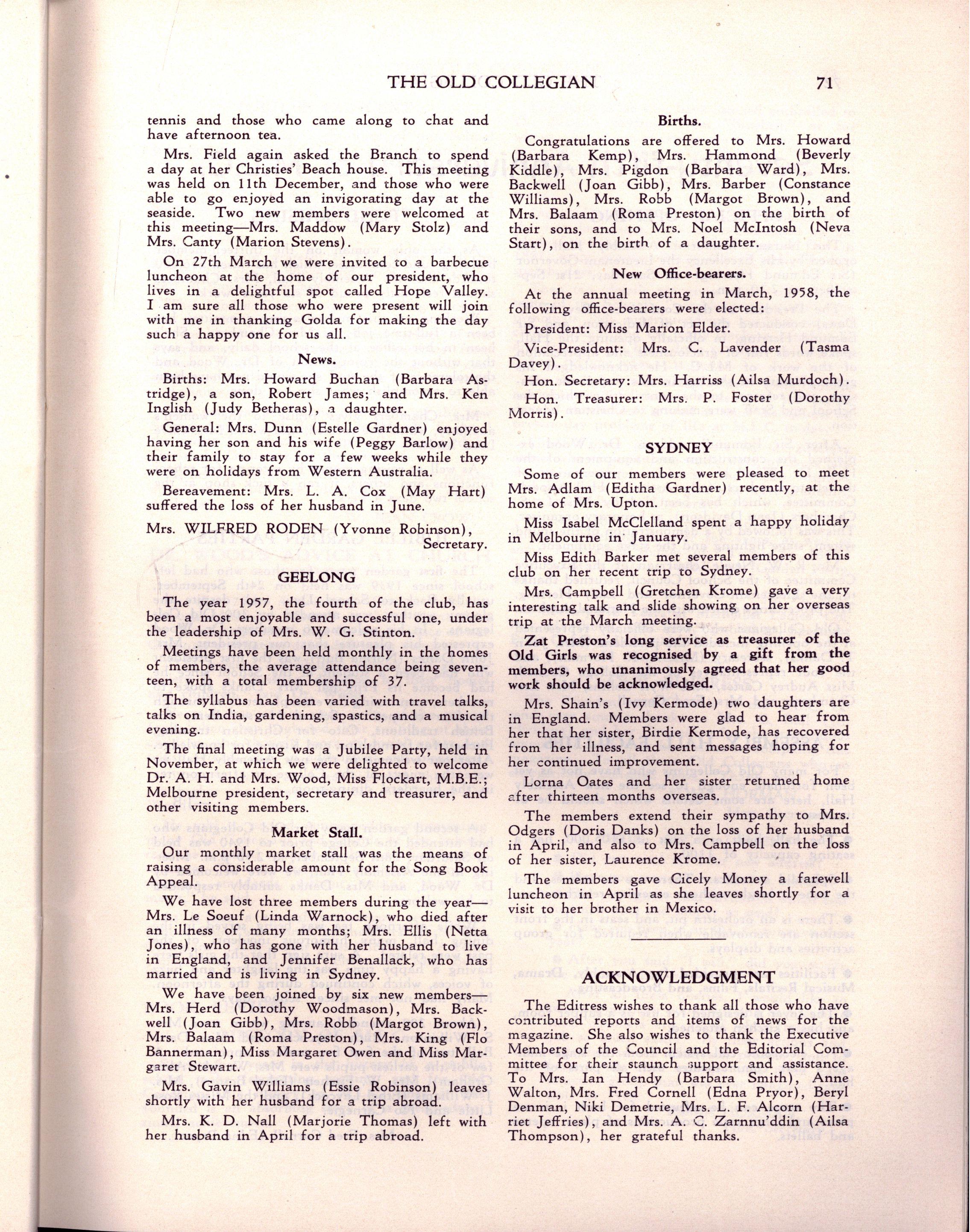
The Nurses' Memorial Assembly Hall was opened by His Excellency the Lieutenant-Governor (Sir Edmund Herring) on Saturday, 21st Sep tember, at 2.30 p.m
The President of the Conference (Rev C K Daws) conducted the act of dedication, and Sir Edmund Herring, in officially opening the Hall, spoke words full of graciousness and appreciation of the work of M.L.C He acknowledged his great pleasure in sharing in this important occa sion, and referred to the contribution which the School and Staff were making to Christian educa tion.
After Sir Edmund's address, Dr Woo d ex plained the construction and equipment of the Hall Dr Woo d then made a presentation of trowels to members of the Assembly Hall Appeals Committee, which has been led by Mrs L S Chambers (Jean Davidson), as honorary organiser This was followed by a demonstration of the sound system, stage lighting and the stage equipment
Mr R W Nevile, chairman of the Executive Committee of the School Council, returned thanks to the Lieutenant-Governor and Lady Herring The proceedings closed with the National Anthem
Old Collegians who were officially represented at the opening included the president (Mrs John T Danks), secretary (Mrs A K Horman), and the four representatives of the College Council, Miss Audrey Carter, Miss Wy n Collins, Mrs Len Chambers, and Mrs. Fred Cornell.
For many Old Collegians who have not as yet been fortunate enough to see the new Assembly Hall, here are some details which should be of interest.
• The hall, built at a cost of £105,000, has a seating capacity of 1100
• Splendid acoustics. There are no echoes, and the tone is bright without excessive reverberation
• There is an orchestra pit, and seats in the front section are removable when required for group activities and displays
• Facilities are provided for Assembly, Drama, Musical Recitals, Films, and Broadcasting
• The foyer is designed for use as a supper room, and has a kitchen attached.
• A n electronic call system from the stage man ager's desk communicates with all parts of the hall
• The stage can be adjusted for both intimate plays and large scale productions of plays, operas and ballets
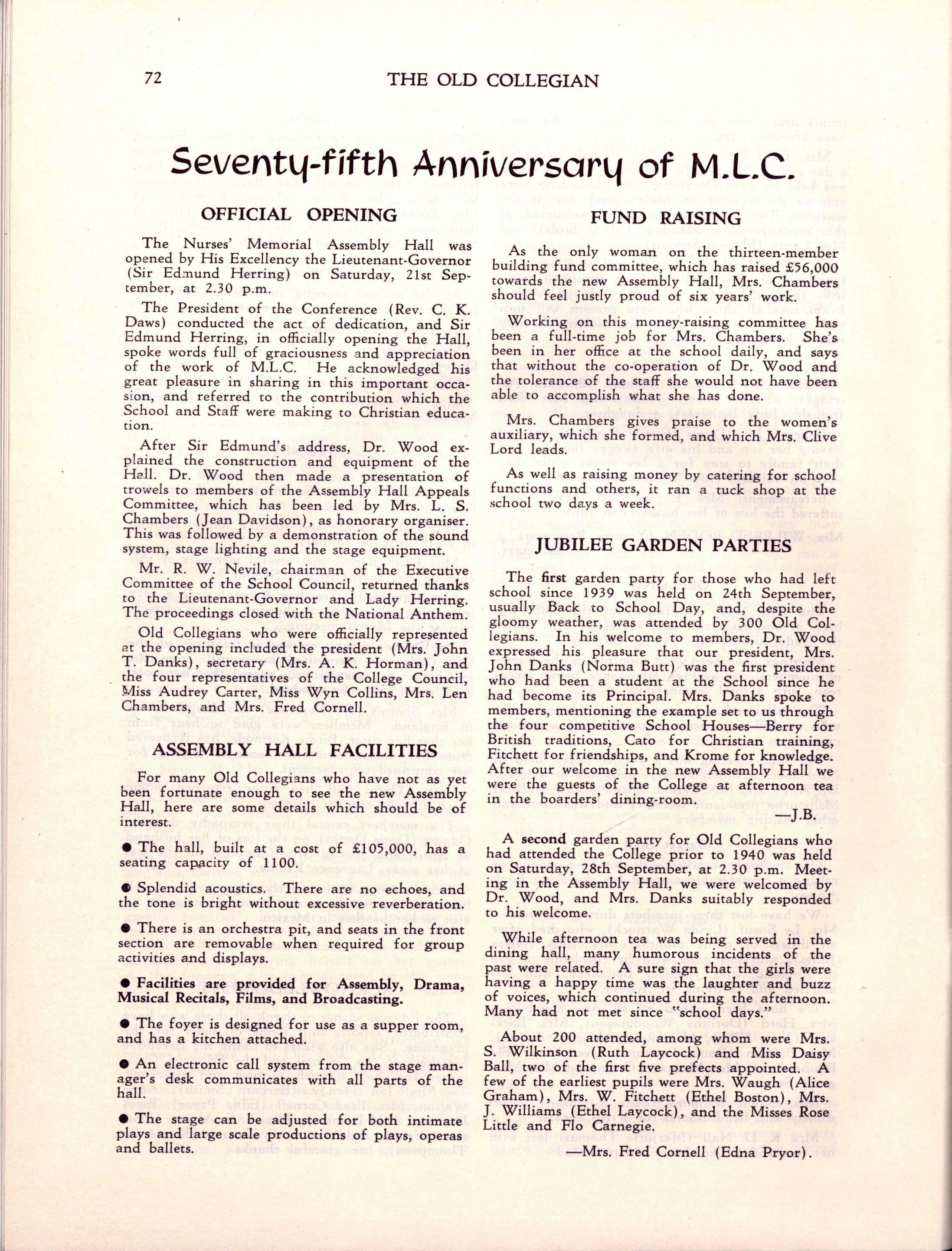
As the only woman on the thirteen-member building fund committee, which has raised £56,000 towards the new Assembly Hall, Mrs Chambers should feel justly proud of six years' work
Working on this money-raising committee has been a full-time job for Mrs. Chambers. She's been in her office at the school daily, and says that without the co-operation of Dr Woo d and the tolerance of the staff she would not have been able to accomplish what she has done
Mrs Chambers gives praise to the women's auxiliary, which she formed, and which Mrs Clive Lord leads
As well as raising money by catering for school functions and others, it ran a tuck shop at the school two days a week
The first garden party for those who had left school since 1939 was held on 24th September, usually Back to School Day, and, despite the gloomy weather, was attended by 300 Old Col legians In his welcome to members, Dr Woo d expressed his pleasure that our president, Mrs. John Danks (Norma Butt) was the first president who had been a student at the School since he had become its Principal Mrs Danks spoke to members, mentioning the example set to us through the four competitive School Houses—Berry fo r British traditions, Cato for Christian training, Fitchett for friendships, and Krome for knowledge. After our welcome in the new Assembly Hall we were the guests of the College at afternoon tea in the boarders' dining-room
A second garden party for Old Collegians who had attended the College prior to 1940 was held on Saturday, 28th September, at 2.30 p.m Meet ing in the Assembly Hall, we were welcomed by Dr Wood , and Mrs Danks suitably responded to his welcome.
While afternoon tea was being served in the dining hall, many humorous incidents of the past were related A sure sign that the girls were having a happy time was the laughter and buzz of voices, which continued during the afternoon Many had not met since "school days."
About 200 attended, among whom were Mrs S Wilkinson (Ruth Laycock) and Miss Daisy Ball, two of the first five prefects appointed A few of the earliest pupils were Mrs. Waugh (Alice Graham), Mrs W Fitchett (Ethel Boston), Mrs J Williams (Ethel Laycock), and the Misses Rose Little and Flo Carnegie
—Mrs Fred Cornell (Edna Pryor)
The 75th Jubilee Celebrations of our School provided for the music-loving past students three most welcome opportunities, namely, thanksgiving through music, association with the present stu dents in both the service and the concert, and many happy weeks of preparation under the inspiring guidance of our dearly loved leader, Miss Flockart
W e are most grateful to Dr. Woo d and the School for the privilege and pleasure of taking part in those two occasions
The Jubilee Concert was a thrilling occasion for the 150 past students who were a part of the combined choirs The choral section of the programme, which consisted of excerpts from oratorio, English part songs, folk songs and con temporary works, was in itself an act of worship and thanksgiving
The seal was set in the expression of the new School Anthem, " I Bind Unto Myself To-day," the music for which was specially composed by Dorian Le Gallienne for the occasion
Again we express to Miss Flockart our deepest appreciation of her devotional and artistic guidance
W JEAN CROWAt the 75 th Anniversary Service held at Auburn Methodist Church on 22nd September, Dr Woo d emphasised that the maintenance of our Christian civilisation depended upon women
"Th e greatest contribution women can give to society is a Christian devotion to their homes and children," said Dr. Wood .
He said that women were guilty of the gravest faults when they neglected their training of their children, and thought more of social gaiety and selfish extravagance in adornment and pleasures
"Women's ideals and achievements should be far higher than those of most men," said Dr. Wood
He told a packed congregation, representing many Old Collegians and friends of the School, that the so-called equality of the sexes had become a snare "It has often led to the lowering of women's standards, without raising those of men's," he said
As it was a special anniversary service, the School Choir was joined by members of the Old Collegians' Club, under Miss Flockart Accom panists were Miss Jane Elton and Miss Betty Scarlett
Seventy-five years in the history of a public school make fascinating reading, and for Old Collegians the history of M.L.C since it was founded is an absorbing story of a great educa tional achievement
For those of us who have listened enthralled to Dr. Wood's readings from "Bluebell," or for whom these reminiscences have been personal experiences, the anniversary publication, "75 Years at Methodist Ladies' College, Hawthorn," will provide many pleasant hours of reading enjoy ment
Included are details of the life of M.L.C from the very beginning, when it was founded by the Methodist Church, with such things as fees in 1882, early examination questions, and the first speech days
Then too, details are given about the lives of some of the School's "notable personalities" the principals, lady superintendents, headmasters, and chiefs of staff, and the many teachers, benefactors and friends who have done so much to help the School become what it is to-day
On the lighter side are provided "some random reminiscences" by former students of the earlier days of the School, as well as some discussions on present-day problems of life at M.L.C to-day
Finally, there is a complete list of prefects, nurses who served in two world wars, overseas mis sionaries, medical students, scholarship winners, and the names of all old girls who have graduated from the Melbourne University.
Nearly a 100 different photographs showing the building development over the years, as well as some fascinating studies of "Tennis in 1898," "A n elocution class in 1896," and "Garden Partv 1912."
—Jill M. Bull.
("Seventy-five Years at Methodist Ladies' Col lege, Hawthorn, 1882-1957," publishers, Spectator Press Co Pty. Ltd. 19/6.)
The President and Council of the O.C.C ex tend very sincere thanks to Mrs. G. Bull (Jill Hickling) and her Committee for the tremendous amount of work they have done in compiling this magazine T o all those Old Collegians who so energetically collected news, "Thank you."
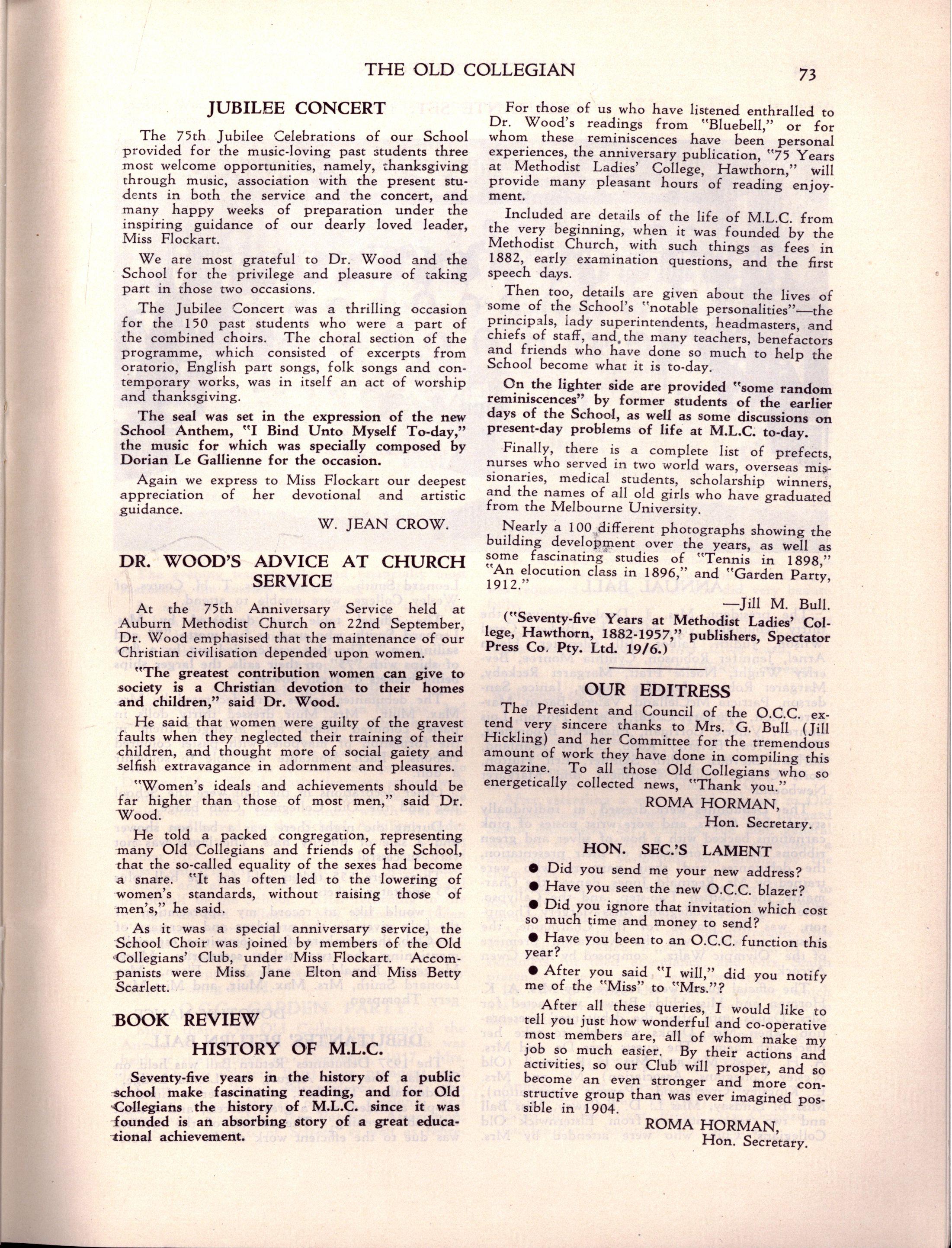 ROM A HORMAN , Hon Secretary
ROM A HORMAN , Hon Secretary
• Did you send me your new address?
• Have you seen the new O.C.C blazer?
• Did you ignore that invitation which cost so much time and money to send?
• Have you been to an O.C.C. function this year?
• After you said " I will," did you notify me of the "Miss" to "Mrs."?
After all these queries, I would like to tell you just how wonderful and co-operative most members are, all of whom make my job so much easier By their actions and activities, so our Club will prosper, and so become an even stronger and more con structive group than was ever imagined DOS sible in 1904
ROM A HORMAN , Hon SecretaryThe president, Mrs. J. Danks, received the thirty debutantes, viz., Misses Joy Birkett, Carol Wilson, Judith Talbot, Jill Glenister, Helen Arnel, Jennifer Robinson, Cynthia Monroe, Bev erley Wright, Noelle Pratt, Margaret Reckaby, Margaret Roberts, Jennifer Dugay, Janice San derson, Patricia McClelland, Valerie Bacon, Mar garet Mott, Margaret Cahill, Wendy Horton, Lois Conroy, Valerie Corrigan, Elizabeth Broomfield, Helen Drew, Beverley Robb, Shirley Beanland, Barbara Stevens, Judith Skinner, Eril Hutton, Loris Crosby, Lillian Mansfield, and Margaret Newbound
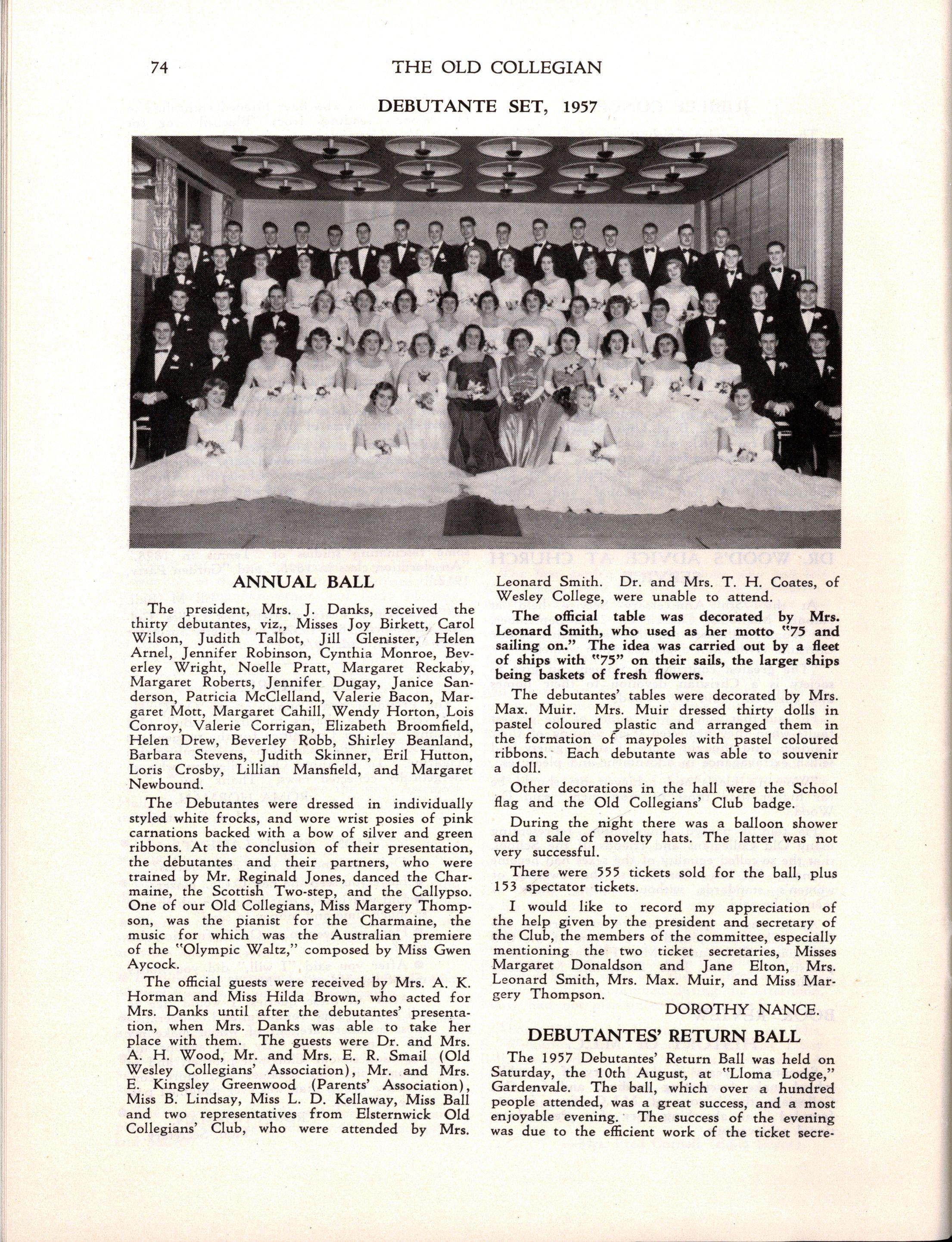
The Debutantes were dressed in individually styled white frocks, and wore wrist posies of pink carnations backed with a bow of silver and green ribbons At the conclusion of their presentation, the debutantes and their partners, who were trained by Mr Reginald Jones, danced the Char maine, the Scottish Two-step, and the Callypso. One of our Old Collegians, Miss Margery Thomp son, was the pianist for the Charmaine, the music for which was the Australian premiere of the "Olympic Waltz," composed by Miss Gwen Aycock
The official guests were received by Mrs A K Horman and Miss Hilda Brown, who acted for Mrs Danks until after the debutantes' presenta tion, when Mrs Danks was able to take her place with them The guests were Dr and Mrs A H Wood , Mr and Mrs E R Smail (Old Wesley Collegians' Association), Mr and Mrs E Kingsley Greenwood (Parents' Association), Miss B. Lindsay, Miss L. D. Kellaway, Miss Ball and two representatives from Elsternwick Old Collegians' Club, who were attended by Mrs.
The official table was decorated
Leonard Smith,
used as her motto "75 and sailing on." The idea was carried out by a fleet of ships with "75 " on their sails, the larger ships being baskets of fresh flowers.
The debutantes' tables were decorated by Mrs. Max Muir Mrs Muir dressed thirty dolls in pastel coloured plastic and arranged them in the formation of maypoles with pastel coloured ribbons Each debutante was able to souvenir a doll
Other decorations in the hall were the School flag and the Old Collegians' Club badge
During the night there was a balloon shower and a sale of novelty hats. The latter was not very successful
There were 555 tickets sold for the ball, plus 153 spectator tickets
I would like to record my appreciation of the help given by the president and secretary of the Club, the members of the committee, especially mentioning the two ticket secretaries, Misses Margaret Donaldson and Jane Elton, Mrs Leonard Smith, Mrs Max Muir, and Miss Mar gery Thompson
The 1957 Debutantes' Return Ball was held on Saturday, the 10th August, at "Lloma Lodge," Gardenvale The ball, which over a hundred people attended, was a great success, and a most enjoyable evening The success of the evening was due to the efficient work of the ticket secre
taries, Wendy Horton and Noelle Pratt, and their committee
Guests of honour were Mrs J T Danks, president of the Old Collegians' Club; Miss D Nance and Miss J Elton
During the evening a supper cloth was pre sented to Mrs. Danks to remind her of the debutantes who were presented to her at the Annual Ball, and a cup, saucer and plate was given to Miss Nance in appreciation of her kindness and assistance to the debutantes
WEND Y HORTON NOELLE PRATTOn Friday, 31st May, 1957, a Film Night was held in the boarders' lounge room, at which Dr Woo d showed his coloured slides, and told us about his recent visit to America as an Australian representative for the Methodist Church
There were approximately 150 Old Collegians and friends present, all of whom, I feel sure, enjoyed the slides and were most interested in and entertained by Dr. Wood's accompanying comments
Owing to a most unfortunate happening that morning, Mrs. Danks was unable to attend, and Mrs Williams, who apologised for Mrs Danks's absence, thanked Dr Woo d on behalf of all present, after which supper was served by the Ball Committee
The evening was socially and financially most successful, the amount raised being £37/9/-
In addition to the Ball Committee were two members of Council, who were most helpful in the kitchen, and I wish to record my thanks to them both, namely Mrs Muir and Miss Minns DOROTH Y NANCE .
The Annual Dinner was held on Monday, 2nd September, 1957, at the College One hundred and forty Old Collegians, who foregathered in the boarders' lounge, were welcomed by their president, Mrs John Danks, and presented to Dr and Mrs Wood Savouries were served with drinks, after which everyone adjourned to the dining hall for a buffet dinner, which was pre pared and served by the School Auxiliary under the leadership of Mrs C H Lord During dinner Mrs Danks proposed the loyal toast, and Miss Venie Harrison the toast to the School, asso ciations and absent friends Dr Woo d responded on behalf of the School. After returning to the lounge, an Old Collegian, Mrs Balmford (Glen Tomasetti) entertained with a charming recital of folk songs and their history, for which Mrs I Hendy (Barbara, Smith) thanked her on our behalf Supper was then served, and a very happy evening ended O.C.C.
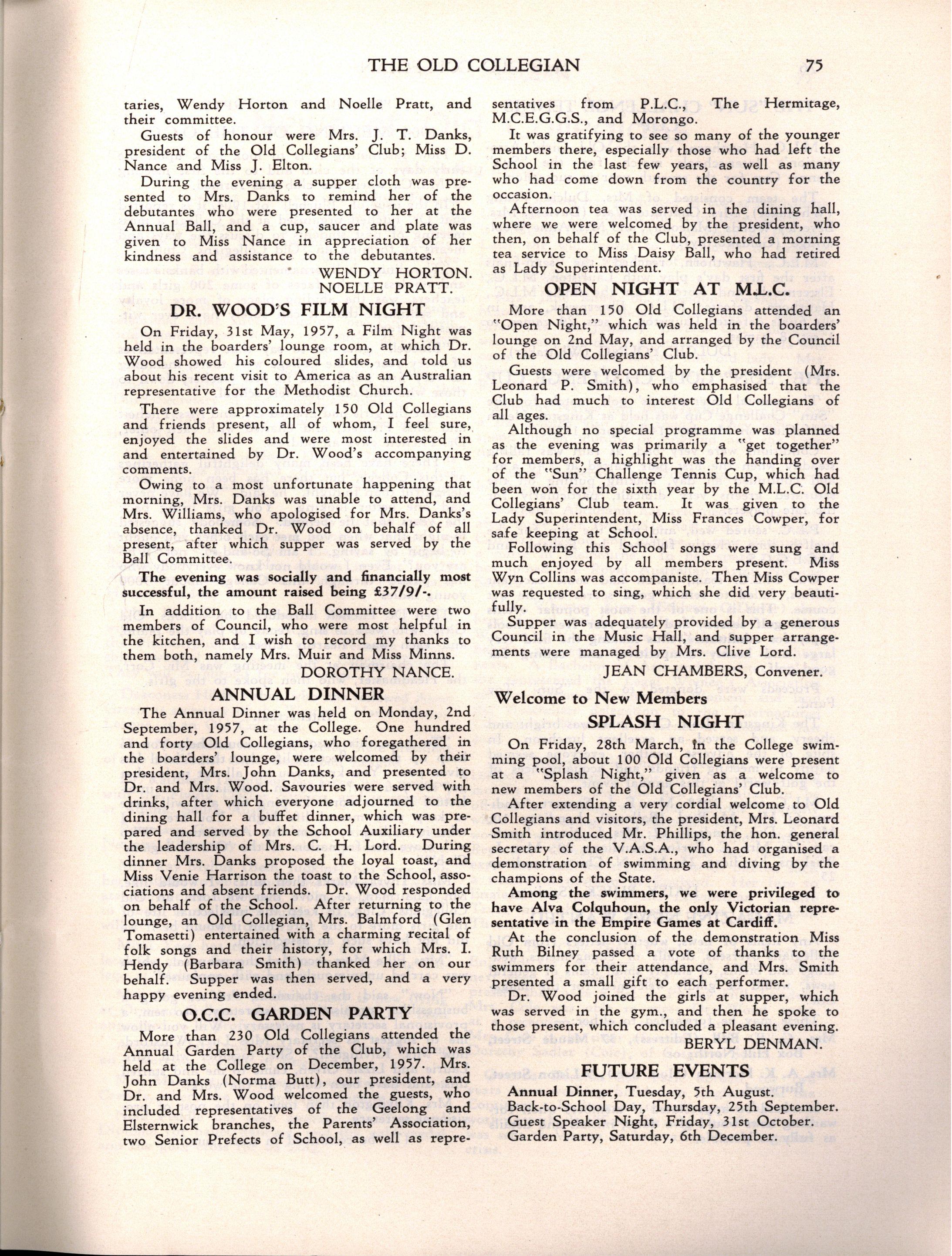
More than 230 Old Collegians attended the Annual Garden Party of the Club, which was held at the College on December, 1957 Mrs John Danks (Norma Butt), our president, and Dr. and Mrs. Woo d welcomed the guests, who included representatives of the Geelong and Elsternwick branches, the Parents' Association, two Senior Prefects of School, as well as repre
sentatives from P.L.C., The Hermitage, M.C.E.G.G.S., and Morongo
It was gratifying to see so many of the younger members there, especially those who had left the School in the last few years, as well as many who had come down from the country fo r the occasion.
Afternoon tea was served in the dining hall, where we were welcomed by the president, who then, on behalf of the Club, presented a morning tea service to Miss Daisy Ball, who had retired as Lady Superintendent
More than 150 Old Collegians attended an "Open Night," which was held in the boarders' lounge on 2nd May, and arranged by the Council of the Old Collegians' Club
Guests were welcomed by the president (Mrs Leonard P Smith), who emphasised that the Club had much to interest Old Collegians of all ages.
Although no special programme was planned as the evening was primarily a "get together" for members, a highlight was the handing over of the "Sun" Challenge Tennis Cup, which had been won for the sixth year by the M.L.C. Old Collegians' Club team It was given to the Lady Superintendent, Miss Frances Cowper, for safe keeping at School
Following this School songs were sung and much enjoyed by all members present. Miss Wy n Collins was accompaniste Then Miss Cowper was requested to sing, which she did very beauti fully
Supper was adequately provided by a generous Council in the Music Hall, and supper arrange ments were managed by Mrs Clive Lord JEA N CHAMBERS, Convener.
On Friday, 28th March, tn the College swim ming pool, about 100 Old Collegians were present at a "Splash Night," given as a welcome to new members of the Old Collegians' Club
After extending a very cordial welcome to Old Collegians and visitors, the president, Mrs Leonard Smith introduced Mr Phillips, the hon general secretary of the V.A.S.A., who had organised a demonstration of swimming and diving by the champions of the State
Among the swimmers, we were privileged to have Alva Colquhoun, the only Victorian repre sentative in the Empire Games at Cardiff.
At the conclusion of the demonstration Miss Ruth Bilney passed a vote of thanks to the swimmers for their attendance, and Mrs Smith presented a small gift to each performer
Dr Woo d joined the girls at supper, which was served in the gym., and then he spoke to those present, which concluded a pleasant evening
BERYL DENMANAnnual Dinner, Tuesday, 5th August Back-to-School Day, Thursday, 25th September Guest Speaker Night, Friday, 31st October Garden Party, Saturday, 6th December
M.L.C., Hawthorn, won the Old Girls' Asso ciation's inter-schools match for the "Sun" Tennis Cup for the seventh year in succession.
The team consisted of Mrs Dulcie Young (Whittaker), Mrs Charlotte Watt (Davies), Mrs Beverley Woods (Malcolm), and Mrs. Anne Wool dridge (Goldsworthy)
M.L.C., Hawthorn, reached the semi-finals after the first day's play with Lauriston, M.L.C., Elsternwick, and Korowa In the finals M.L.C., Hawthorn, defeated M.L.C., Elsternwick, and in the finals defeated Lauriston, 4 sets, 29 games, to 1 set, 8 games.
DULCIE YOUN G (Whittaker)The annual inter-schools' golf match for the "Sun" Challenge Cup was held at Kingston Heath Golf Club on Monday, 14th April, 1958
Conditions were very bad, as rain was falling steadily when the first pair started at 7.40 a.m., and continued all day, making putting on the saturated greens very difficult, particularly for the late players
P.L.C scored well, and won the cup for the twelfth time, closely followed by Firbank and M.C.E.G.G.S
Our M.L.C team, which had some excellent golfers, failed to return good scores on the wet course This is one of the most popular events of the golf season, and each year fresh schools apply for admittance, thus making the field very large and keenly competitive, and calling for good golf
Proceeds were donated to the "Sun" To y Fund
The Kingston Heath Club home was bright and cheery, and served, an excellent luncheon. In spite of the adverse weather, everyone seemed happy in meeting friends and acquaintances of the golf world at this annual event
M.L.C. team, 1958: Mrs. E. L. Stewart, handi cap 6; Mrs M Bird (Ballarat), handicap 10; Miss A Dye, handicap 12; Mrs L Nagel, handi cap 16; Mrs C Forfor, handicap 20; Mrs L Wickens, handicap 24; Miss N Chitty, handicap 25.
DAIS Y BUICK (Stirling).Any items of news, whether letters from Old Collegians overseas, details of engagements, wed dings and births, or simply small items of general news, would be gladly welcomed for the maga zine
These may be forwarded to either:— Mrs G R Bull (Editress), 37 Maude Street, Box Hill North; or Mrs A K Horman (Hon Sec.), 5 Liston Street, Burwood
It would be appreciated if members when for warding news would give dates, initials and details as fully as possible
How fascinating it is to look back upon the early days of the club and to the first meeting at M.L.C., when the club was formed
In the issue of "Bluebell" of 1904, it is reported that Dr. Fitchett organised at the College a mass meeting of past students to discuss the ways and means of forming an "Old Collegians' Club."
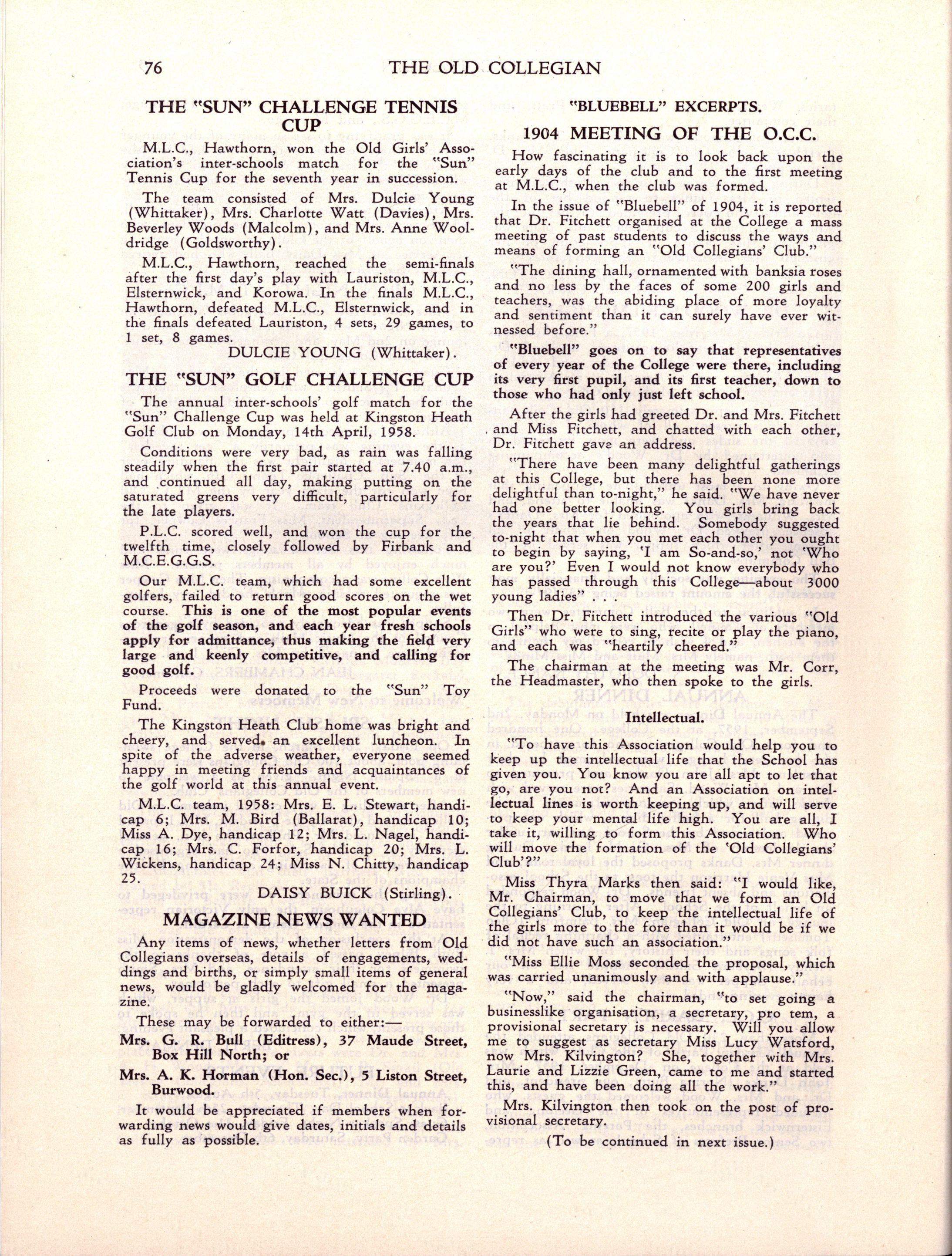
"The dining hall, ornamented with banksia roses and no less by the faces of some 200 girls and teachers, was the abiding place of more loyalty and sentiment than it can surely have ever wit nessed before."
"Bluebell" goes on to say that representatives of every year of the College were there, including its very first pupil, and its first teacher, down to those who had only just left school
After the girls had greeted Dr and Mrs Fitchett , and Miss Fitchett, and chatted with each other, Dr Fitchett gave an address
"There have been many delightful gatherings at this College, but there has been none more delightful than to-night," he said "W e have never had one better looking Yo u girls bring back the years that lie behind Somebody suggested to-night that when you met each other you ought to begin by saying, 'I am So-and-so,' not 'Wh o are you?' Even I would not know everybody who has passed through this College—about 3000 young ladies"
Then Dr Fitchett introduced the various "Ol d Girls" who were to sing, recite or play the piano, and each was "heartily cheered."
The chairman at the meeting was Mr Corr, the Headmaster, who then spoke to the girls
Intellectual.
"T o have this Association would help you to keep up the intellectual life that the School has given you You know you are all apt to let that go, are you not? An d an Association on intel lectual lines is worth keeping up, and will serve to keep your mental life high. Yo u are all, I take it, willing to form this Association Wh o will move the formation of the 'Old Collegians' Club'?"
Miss Thyra Marks then said: " I would like, Mr Chairman, to move that we form an Old Collegians' Club, to keep the intellectual life of the girls more to the fore than it would be if we did not have such an association."
"Miss Ellie Moss seconded the proposal, which was carried unanimously and with applause."
"Now," said the chairman, "to set going a businesslike organisation, a secretary, pro tem, a provisional secretary is necessary Will you allow me to suggest as secretary Miss Lucy Watsford, now Mrs Kilvington? She, together with Mrs Laurie and Lizzie Green, came to me and started this, and have been doing all the work."
Mrs Kilvington then took on the post of pro visional secretary
Old Collegians will welcome Miss Frances Cowper, who was last year appointed the new Lady Superintendent in place of Miss Daisy Ball, who has retired. Miss Cowper, who is a Bachelor of Music and Bachelor of Education, was on the musical staff of M.L.C before her new appoint ment
Mr and Mrs Dick Pescott (Gwyn Walduck) celebrated their silver wedding on 15th April Bridesmaids were Kathy Walduck and Bessie Launder
Mrs. Malcolm Lyon (Robin Carne) is living at Bonn, in Germany, where her husband is the Third Secretary at the Australian Embassy
Delia Hilton is now public relations officer at the A.B.C
Mrs. H. Latham (Mavis Thorpe Clark), who is well known as an author of children's books, has recently completed "Gully Gold," which has just been published
Mrs. D. M. Roberts (Marjory Brown), who is in England for four years, would be pleased to hear from Old Collegians she knew at School during 1937-1939 Her address is Flat 1, 29 Alexandra Grove, London, N.12, or c/ o Australia House, London, W.C.7
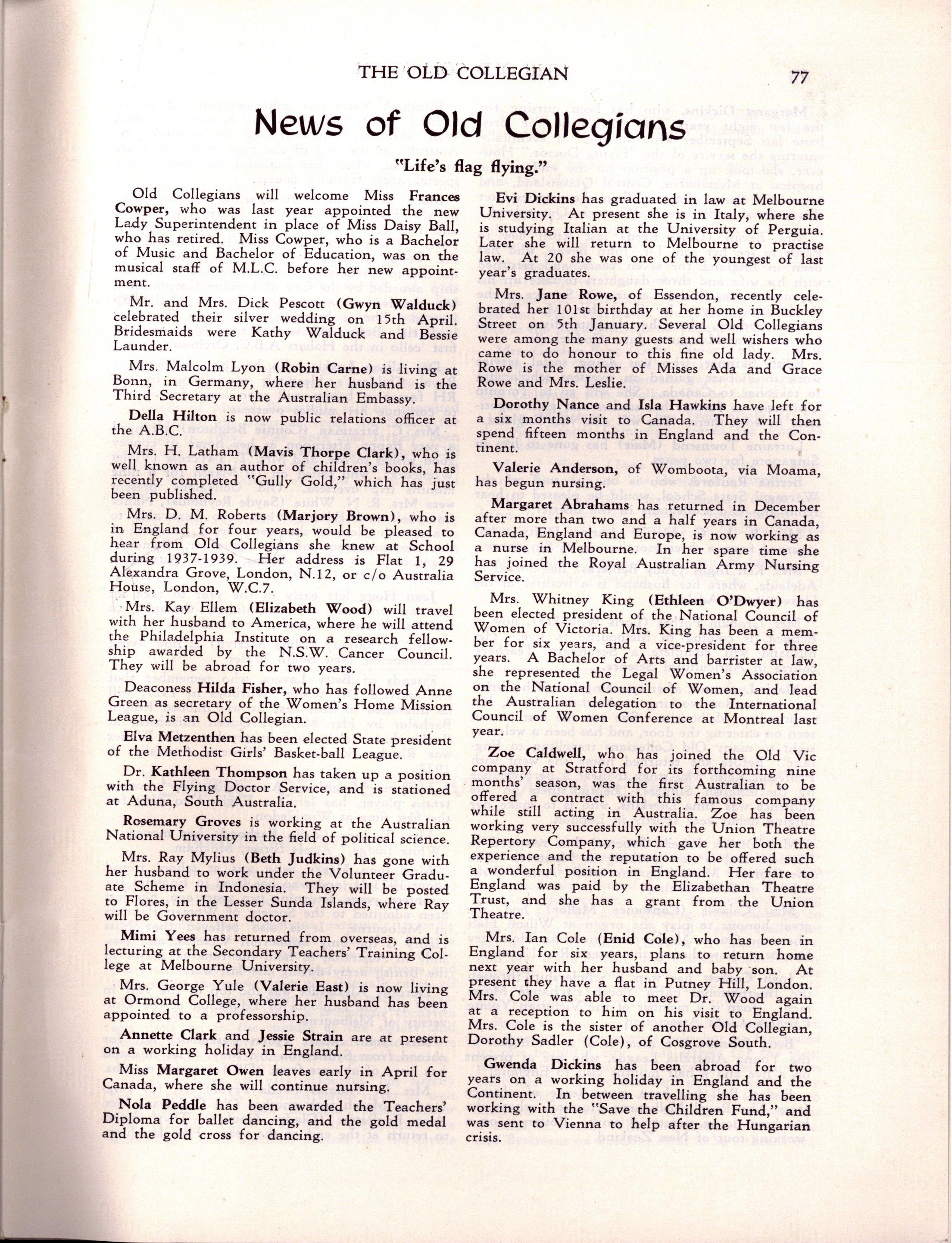
Mrs Kay Ellem (Elizabeth Wood ) will travel with her husband to America, where he will attend the Philadelphia Institute on a research fellow ship awarded by the N.S.W Cancer Council They will be abroad for two years
Deaconess Hilda Fisher, who has followed Anne Green as secretary of the Women's Home Mission League, is an Old Collegian Elva Metzenthen has been elected State president of the Methodist Girls' Basket-ball League
Dr. Kathleen Thompson has taken up a position with the Flying Doctor Service, and is stationed at Aduna, South Australia
Rosemary Groves is working at the Australian National University in the field of political science
Mrs. Ray Mylius (Beth Judkins) has gone with her husband to work under the Volunteer Gradu ate Scheme in Indonesia They will be posted to Flores, in the Lesser Sunda Islands, where Ray will be Government doctor
Mimi Yees has returned from overseas, and is lecturing at the Secondary Teachers' Training Col lege at Melbourne University
Mrs George Yule (Valerie East) is now living at Ormond College, where her husband has been appointed to a professorship
Annette Clark and Jessie Strain are at present on a working holiday in England
Miss Margaret Owen leaves early in April for Canada, where she will continue nursing.
Nola Peddle has been awarded the Teachers' Diploma for ballet dancing, and the gold medal and the gold cross for dancing
Evi Dickins has graduated in law at Melbourne University At present she is in Italy, where she is studying Italian at the University of Perguia Later she will return to Melbourne to practise law. At 20 she was one of the youngest of last year's graduates
Mrs. Jane Rowe, of Essendon, recently cele brated her 101st birthday at her home in Buckley Street on 5th January. Several Old Collegians were among the many guests and well wishers who came to do honour to this fine old lady Mrs Rowe is the mother of Misses Ad a and Grace Rowe and Mrs Leslie
Dorothy Nance and Isla Hawkins have left for a six months visit to Canada They will then spend fifteen months in England and the Con tinent
Valerie Anderson, of Womboota, via Moama, has begun nursing
Margaret Abrahams has returned in December after more than two and a half years in Canada, Canada, England and Europe, is now working as a nurse in Melbourne In her spare time she has joined the Royal Australian Army Nursing Service
Mrs Whitney King (Ethleen O'Dwyer) has been elected president of the National Council of Women of Victoria Mrs King has been a mem ber for six years, and a vice-president for three years. A Bachelor of Arts and barrister at law, she represented the Legal Women's Association on the National Council of Women, and lead the Australian delegation to the International Council of Women Conference at Montreal last year
Zo e Caldwell, who has joined the Old Vic company at Stratford for its forthcoming nine months' season, was the first Australian to be offered a contract with this famous company while still acting in Australia Zo e has been working very successfully with the Union Theatre Repertory Company, which gave her both the experience and the reputation to be offered such a wonderful position in England Her fare to England was paid by the Elizabethan Theatre Trust, and she has a grant from the Union Theatre
Mrs. Ian Cole (Enid Cole), who has been in England for six years, plans to return home next year with her husband and baby son At present they have a flat in Putney Hill, London Mrs Cole was able to meet Dr Woo d again at a reception to him on his visit to England. Mrs Cole is the sister of another Old Collegian, Dorothy Sadler (Cole), of Cosgrove South
Gwenda Dickins has been abroad for two years on a working holiday in England and the Continent In between travelling she has been working with the "Save the Children Fund," and was sent to Vienna to help after the Hungarian
Margaret Dickins, who has been nursing for the last eight years, left Melbourne for Bris bane last September with the idea of eventually entering the service of the "Flying Doctor." How ever, she took up a position on the staff of the hospital at Muttaburra, Central Queensland, and is now in charge there When she marries later this year, she will live in Warwick, Queensland.
Mrs Bevan (Doris Reed) last April flew to Perth to see her son, Dr John Bevan, who has been in England for seven years, and returned with his wife and three daughters to take up his appointment as Senior Lecturer in Science at the Perth University In September Mrs Bevan flew to Sydney, where her daughter lives, to see her new granddaughter, Jane Godtschalk.
Edith Skinner, who was doing social service work in Hobart, gained an overseas scholarship to take her to Canada. She will go to Toronto University to further her studies and gain experi ence in work there She will also visit England
Lorraine Townsend (Mair) has gone to live in Singapore for two years.
Bertha Radford, who is on the staff of the Warragul State School, would be pleased to hear from any Old Collegians in the district
Mrs R L G McCoy (Anne Dufty) has returned from a three months trip to Singapore
Mrs Ken Inglis (Judy Betheras) has moved to Adelaide, where her husband is a lecturer at the University of Adelaide
Mrs Graham Forbes (Loris Whitaker), now at Echuca, is coming to Melbourne to live. Her husband will complete a Secondary Teachers' course in Agricultural Science
Mavis Lancaster, after spending her fifth Christ mas in London working at Australia House, has returned to Melbourne She was the first person seen on entering the door, and has been a welcome sight to many Old Collegians travelling to Eng land Before she returned home she went with Professor Keith McArtney to hear a performance by the English Singers Behind them in the audience was June Dawkins, who is to make her singing debut very shortly in London.
Mrs. Davies (Sheila Proctor) has returned to Canada, and is now working in Montreal She was formerly Musical Director at St Anne's Girls' School in Staffordshire
Mrs Calwell (Constance Mellor) had the great honour to play the organ at Wilson Hall when the Queen Mother was made an Honorary Doctor at Law during the recent Royal visit
Joan Corbett has won a scholarship through the International Farm Youth Exchange Move ment. Joan is a member of the Victorian Young Farmers' Clubs Association
Betty Johnson is a member of a contingent of the Young Australia League, who are at present on a five and a half months visit to England
Roslyn Bull has been given leave of absence from The Royal Melbourne Hospital, where she has been doing secretarial work Roslyn is on a working tour of New Zealand
Elizabeth Yates has gone overseas for twelve months While abroad she will be seeing Loloma Weir (Green), who will also be returning to Australia at the end of the year after two years in London, where her husband has been doing special army training course.
Mary Rowe has been awarded a scholarship by the French Government, which pays board and fees at the College, Franco Britannique, in Paris. The scholarship entitles her to tuition in the 'cello, in the study of which Mary has decided to specialise She recently won a scholar ship awarded by the City of London Corporation, but decided to accept the French scholarship instead She is learning 'cello from Tortebier in Paris Before she went abroad Mary was the first 'cello in the Hobart A.B.C Orchestra
Dr Alison Luekis, who has been working at Royal Children's Hospital, specialising in the RH factor in babies, will soon leave for abroad to continue her studies overseas Mrs C Stratman (Connie Beighton) arranged a very happy afternoon at her home to convey good wishes to Mr and Mrs T Twycross (Violet Woolcock), who sailed on 1st March for a nine months trip overseas Old Collegians present were Mrs R N White (Sayde Reynolds), Nance Campbell and Edith Barker, who were able to share with Connie the news from London of the announcement of her daughter, Pamela's, engagement to David Evans, South Australian Rhodes Scholar for 1957
Jean Hogg left early in the year to take up her appointment as occupational therapist to the Rehabilitation Centre, Fremantle, W.A Mrs R Ramsay (Elma Martyn) is now living at Katoomba, New South Wales
Friends of Betty Lavers, who remember that she married Dr Walter Worboys in 1927, will be interested to hear that he was dubbed Knight Bachelor by Her Majesty, Queen Elizabeth, at Buckingham Palace in February last Sir Walter was Rhodes Scholar for Western Australia in 1922.
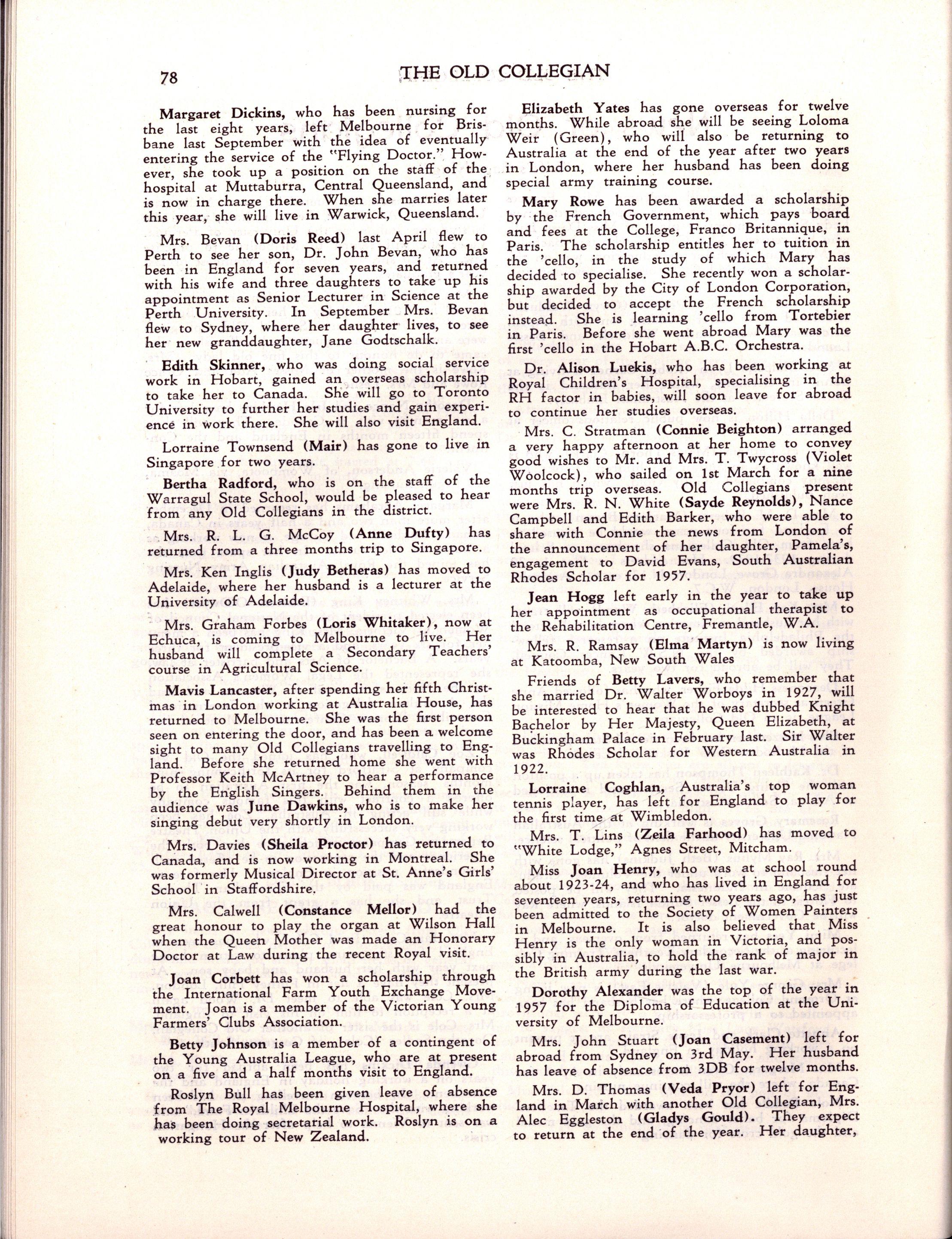
Lorraine Coghlan, Australia's top woman tennis player, has left for England to play for the first time at Wimbledon
Mrs T Lins (Zeila Farhood) has moved to "White Lodge," Agnes Street, Mitcham
Miss Joan Henry, who was at school round about 1923-24, and who has lived in England for seventeen years, returning two years ago, has just been admitted to the Society of Women Painters in Melbourne It is also believed that Miss Henry is the only woman in Victoria, and pos sibly in Australia, to hold the rank of major in the British army during the last war
Dorothy Alexander was the top of the year in 1957 for the Diploma of Education at the Uni versity of Melbourne
Mrs John Stuart (Joan Casement) left for abroad from Sydney on 3rd May. Her husband has leave of absence from 3DB for twelve months
Mrs D Thomas (Veda Pryor) left for Eng land in March with another Old Collegian, Mrs Alec Eggleston (Gladys Gould). They expect to return at the end of the year. Her daughter,
Mrs Ken Nail, of Geelong (Marjorie Thomas) and husband also flew to England in April, returning through America
Mrs. Norman Alley (Joan Weston) flew to England via America with her husband, and expects to return home in June
Barbara Bird sailed to England on 6th April fo r an extended trip
Joan Corlass left for England in May
Mrs Baden Powell (Olive Perry), of Port Fairy, has left on a flying world tour via San Francisco and America to London, returning through Japan She will be away for nine months.
Peg Corlass, who has just graduated at Prince Henry's, is going to Perth to do midwifery.
Friends of Muriel Pickworth will be interested to learn that she returned from the Sudan for furlough in May. Her work has largely been supervised by Florence Fletcher, another Old Collegian (now Mrs Lunn) Muriel will be staying with her parents, who now live in Victoria Road, Auburn.
Mrs Frank Pederick (Mary McKenzie) is living with her parents in Balwyn, while her husband is completing a nine months' course on radio equipment for the R.A.A.F Previously they had lived in Ballarat.
Elizabeth Scott returned from England last year, and is working with the Education Depart ment
Margaret McKenzie is now a colour consultant with the Mayfair Colour Centre
Mrs Charles Dow (Jean Williams) will move to Perth at the end of the year, where her husband will take up the appointment as Church of Christ minister at InglewOod
Marigold McLean is teaching physical educa tion at Brighton High School
Three Old Collegians, Judy Ewart, Karin Cor lass and Vera Naumann, are studying advertising arts at the Royal Melbourne Technical College
Mrs Gordon Berg (Loris Taylor), who is living at Montreal, Canada, will be visiting Australia at the end of the year, when she hopes to see another Old Collegian, Mrs. Walker (Mona Liston).
Jean McKenzie, who has been appealing for the Anti-Cancer Campaign, leaves for England in October
Mrs J Ensor (Joan Bull) is living in Van couver, Canada, and has Canadian citizenship
Mrs I Richardson (Irene Davies), whose hus band is a civil air attache, appointment for three years, will be returning to Melbourne end of next year.
Mrs John Williams (Dorothy Holding) has been made the president of Y.W.C.A
Extract from a letter to the Editress of the "Old Collegian" from Margaret Abrahams about her visit, to Europe with four American girls
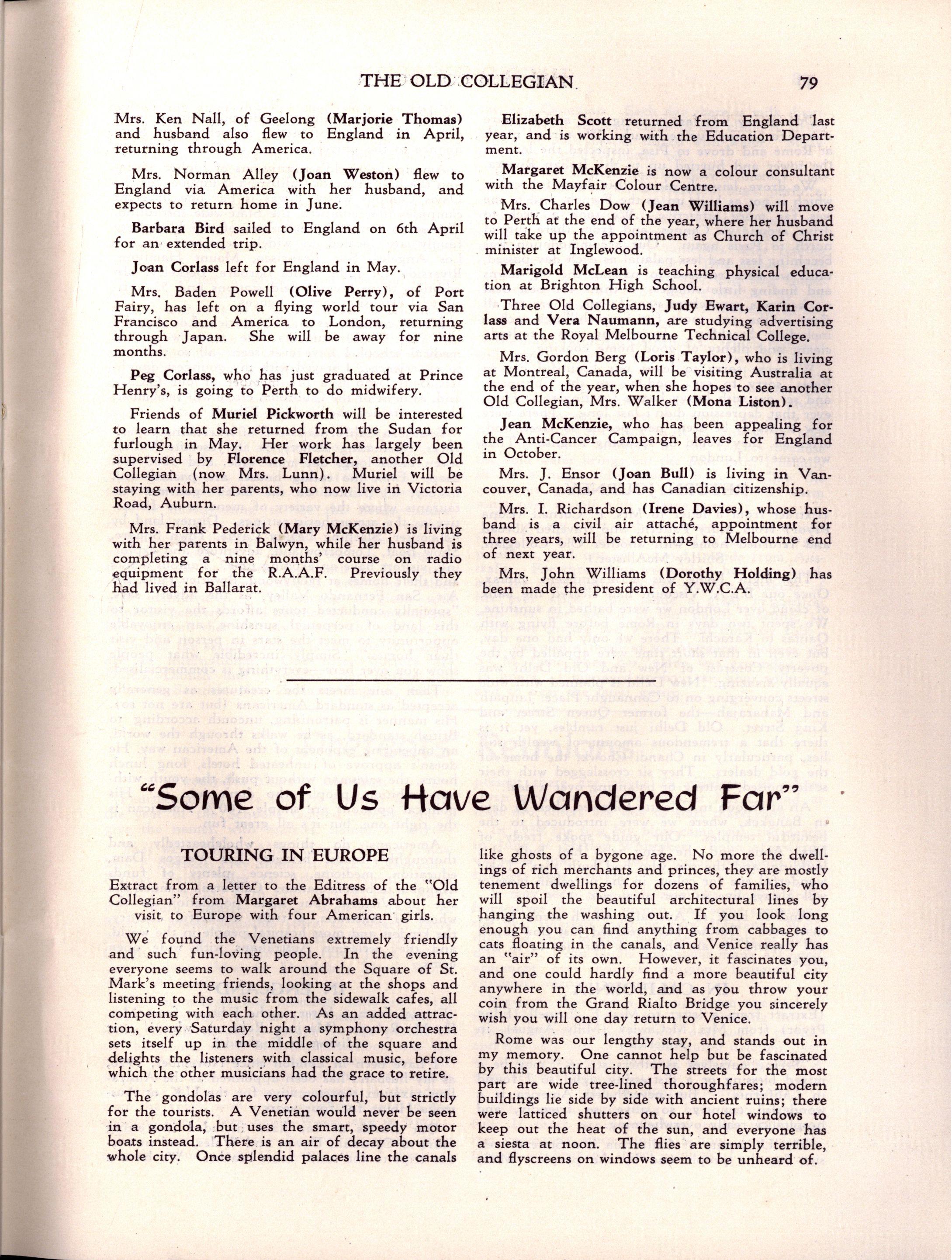
W e found the Venetians extremely friendly and such fun-loving people In the evening everyone seems to walk around the Square of St Mark's meeting friends, looking at the shops and listening to the music from the sidewalk cafes, all competing with each other As an added attrac tion, every Saturday night a symphony orchestra sets itself up in the middle of the square and delights the listeners with classical music, before which the other musicians had the grace to retire
The gondolas are very colourful, but strictly for the tourists A Venetian would never be seen in a gondola, but uses the smart, speedy motor boats instead There is an air of decay about the whole city. Once splendid palaces line the canals
like ghosts of a bygone age N o more the dwell ings of rich merchants and princes, they are mostly tenement dwellings for dozens of families, who will spoil the beautiful architectural lines by hanging the washing out. If you look long enough you can find anything from cabbages to cats floating in the canals, and Venice really has an "air" of its own However, it fascinates you, and one could hardly find a more beautiful city anywhere in the world, and as you throw your coin from the Grand Rialto Bridge you sincerely wish you will one day return to Venice
Rome was our lengthy stay, and stands out in my memory One cannot help but be fascinated by this beautiful city. The streets for the most part are wide tree-lined thoroughfares; modern buildings lie side by side with ancient ruins; there were latticed shutters on our hotel windows to keep out the heat of the sun, and everyone has a siesta at noon. The flies are simply terrible, and flyscreens on windows seem to be unheard of
Our money was fast running out, and we were scared to go any further south. W e turned north at Rome and drove to Pisa, inspected the lean in the tower and hurried up to the Italian Riviera
W e drove leisurely along this beautiful coast, which is not as built up as the French, and to me was far more attractive W e took a week to drive around to Cannes, and from there turned north to Paris again Our accommodation was becoming less and less palatial as each day passed, until we were reduced to passing the big towns and finding little villages I think the best deal we had was somewhere near Lyons, where we all slept in the one room for four shillings each— including breakfast. Everything was spotlessly clean, and plenty of good home cooking
W e were sorry to leave our beautiful car in Paris, sorry to say good-bye to the Continent, and set out with heavy hearts for England. How ever that depression didn't last long There were new sights to be seen, new people to meet, and, after all, they would be speaking English Thus we came to London
(Extract from a letter to Mrs F Cornell (Edna Pryor) from Mary Pattern, who travelled abroad and returned home with another Old Collegian, Shirley McAllister.)
The flight home was a magnificent climax Once our B.E.A. Viscount had cleared the bank of cloud over London we were bathed in sunshine W e spent two days in Rome before flying with Qantas to Karachi There we only had one day, but even in that short time were appalled by the poverty. Contrast of New and Old Delhi was equally amazing New Delhi is planned with wide streets converging on to Connaught Place Janpath and Maharajah—the former Queen Street and King Street Old Delhi just rambles, yet it is there that a tremendous amount of wealth still lies, particularly in Chandi Chowk, the home of the gold dealers They sit crosslegged with their scales poised, waiting or balancing over a deal
A n afternoon in Calcutta followed, then 2 2 days in Bangkok, where we were introduced to the beautiful temples Our guide spoke freely of Mrs Anna and the king who had built this building, and the son who had built that Their wonderful eye for colour in the porcelain mosaics will always live in our memories
And so back to Australia, which seems better than ever But we have realised just how much will depend on all who work for her as to her success
(Extract from a letter to Mrs. F. Cornell (Edna Pryor) from Mrs McCawley (Milly Angus), in America.)
"Seeing ourselves as others see us," may be a mixed blessing or a distressing sight, so I found in California But nevertheless America is a wonderful country, so alive, so friendly, and hospitality really overwhelming.
The University of California is a State univer sity for the people and by the people Many
ranch owners, buriness and professional men donate large sums of money as well as the State finance to the university
Among the world's institutions of higher educa tion the University of California is unique, for the Davis Campus where I was is but one of eight campuses that comprise the State-wide institution The seven remaining members of the University family are located in widely separated cities— Los Angeles, San Francisco, Mount Hamilton, Riverside, La Jolla, Santa Barbara, Berkeley. In addition there are six field stations and 52 agri cultural extension services offices
It's so colossal, as is all America, Los Angeles with its 17,000 students, the most wonderful medical school I have ever seen—all so thrilling to experience I stayed with my youngest daugh ter Betty, who is a life member of our O.C.C., and, as most of the Clubroom circle will remember, she entertained the circle at Kilsyth
Southern California is full of interesting experi ences, fascinating scenery, as in Josemite Valley, seven miles long, one mile wide, and 3000 feet deep Even the eating houses are packed with history, all printed on the menu—gourmet res taurants where the variety of menu is as distinc tive as the atmospheric settings Disney land by helicopter, Sleeping Beauty Castle, Town Square, Show Boat, Tomorrowland, adventure and explor ing visitors have an exciting time Famous actors and their homes at Hollywood, Beverley Hills, Bel Air, San Fernando Valley, as the advert, says, "specially conducted tours affords the visitor to this land of perpetual sunshine, an enjoyable opportunity to meet the stars in person and visit their homes." Simply incredible what people show you over here—everything is commercialised.
Then one meets the creatures as generally accepted as standard Americans (but are not so) His manner is patronising, uncouth according to British standard, as he walks through the world, an unbending exponent of the American way He doesn't approve of unheated hotels, long lunch hours, the salesman without push, the youth with out ambition, people who don't join in. His political opinions ar£ simple, 100 % American is the right one, but it's all great fun
Americans do things wholeheartedly and thoroughly—roads, bridges, Les Vergos Dam, education, medicine, science, plenty of funds available to benefit nation California is much the size of Victoria, but same population as the whole of Australia, a truly wonderful country, the kindest and most hospital people in the world, and they welcome Australians with wide open arms
(Extract from a letter to the Editress from Mrs D M Roberts (Marjory Roberts), who is now living in England.)
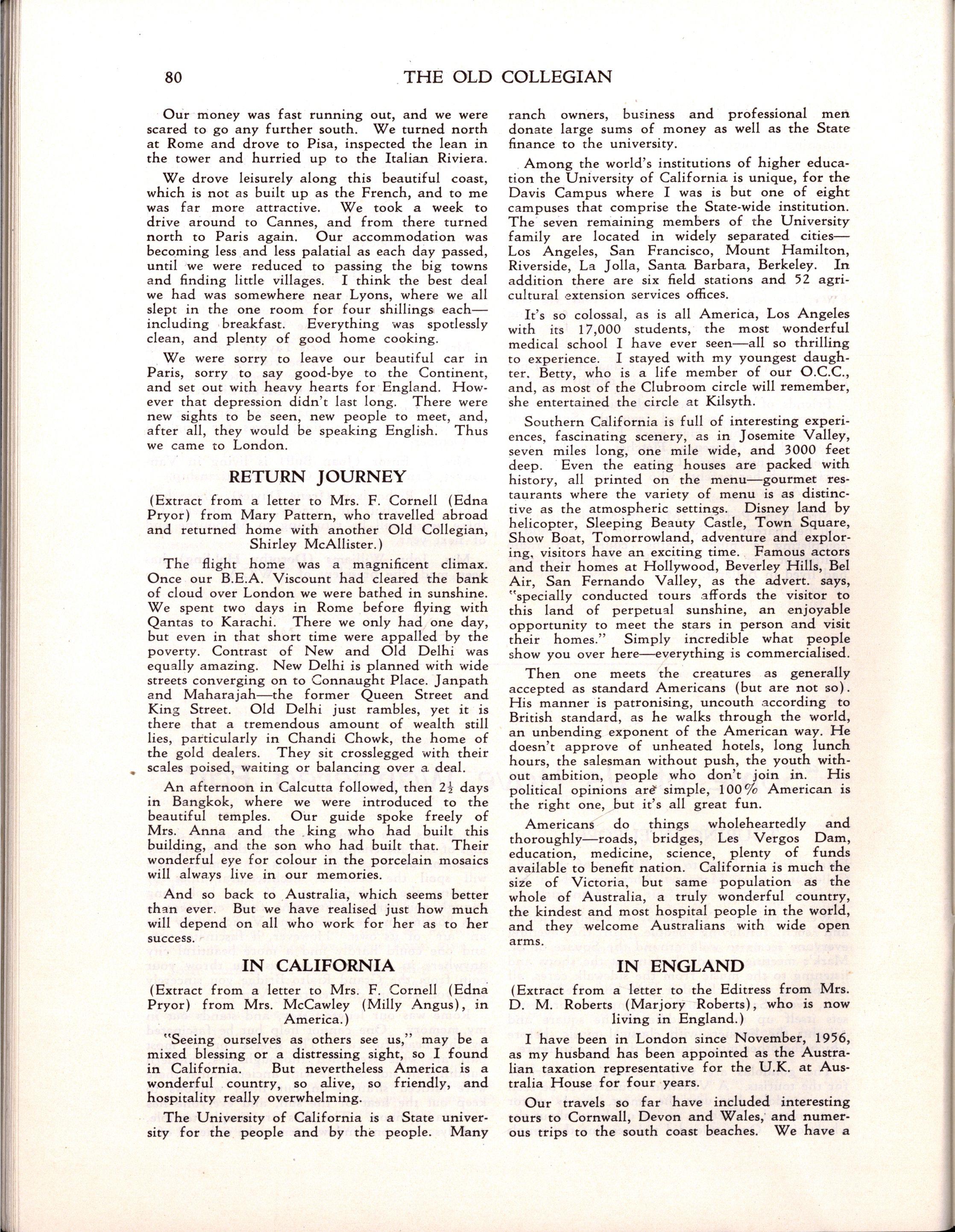
I have been in London since November, 1956, as my husband has been appointed as the Austra lian taxation representative for the U.K at Aus tralia House for four years
Our travels so far have included interesting tours to Cornwall, Devon and Wales, and numer ous trips to the south coast beaches W e have a
tour planned for the French Riviera in August, and are hoping for lots of hot sunshine there.
We expect to return to Australia late in 1960 in time for our little daughter, Julie, now eight years old, to take her place at M.L.C at the beginning of 1961
(Extract of a letter from Mary Fox, in Karachi, where she is the General Secretary of the Y.W.C.A. there.)
When I sailed from Melbourne for Karachi, to become the General Secretary of the Y.W.C.A in this city, I thought in my innocence that not having to do any cooking, cleaning, ironing, shopping for food, strap-hanging in trams and buses, etc., would give me time to keep in touch with my friends round the world, and that surely I should have a little time to catch up with some serious reading, and even a little study What a vain hope!
On Monday and Thursday mornings Joseph, our van driver, fills up the van with medicines, powdered milk, aspirin, etc., and collects the voluntary doctors, nurses and midwives who man the clinic in the Y.W.C.A centre in the camp
It is heartrending to see the needs—under nourished babies with ricketts, nursing mothers with abscessed breasts, children with sores, infected eyes, ears and fever, twelve-year-olds trying to bring up the baby after the death of the mother in childbirth, fifteen-year-olds with tiny babies with malnutrition The service is given with firmness, gentleness and absence of sentimentalism, but one feels that we only scratch the surface
One of the exciting things is that the volunteers are so international Our three doctors are Dutch, Danish and Yugoslav, our nurses and midwives Scottish, New Zealand, English, Ameri
can and Canadian Each day there is milk distri bution, when children come to the clinic to drink a cup of milk-powder mixed with water Some times we distribute butter oil
On Saturday mornings we have a literacy class at the camp, and on Tuesdays a work party at the Y.W.C.A., where volunteers—mainly Parsi women and Muslim—teach widows from the camp to sew and embroider W e sell their products and buy more materials after paying the women for their labour This adds a little income to their other earnings, and also rouses interest in the work of the Y.W.C.A by the sale of the goods each Saturday morning in the leading chemist shop Bliss!
W e have "attached bathrooms," which instantly will conjure up to you all visions of luxury hotels; but not so in the East All floors are cement or tiles; but as we cannot run to tiles in the Y.W.C.A., one stands in a corner under the wall shower and lets the water run away on the cement floor. But as it is unwise to take too many cold showers in the tropics because the cold water brings out the heat rash, I usually sit in a huge old-fashioned bath tub like the ones our grandmothers used, and pour warm water over myself with a large mug
I must say what a thrill it was to have a visit from Dr. Una Porter, World Y.W.C.A. Vice president, and one of my old friends from Aus tralia. For three days we worked her very hard, and the community has not stopped speaking of her ever since She made a great impression with her fine speech at our public meeting, to which we invited the V.I.P.'s and Embassy folk
It was also a thrill to see Margaret Holmes, of S.C.M fame when her 'plane was grounded for 36 hours I managed to have a.n hour with her and to hear the latest gossip.
Fourteen of us were Prefects together in 1932, the year of the School's Golden Jubilee, and I give the names, with married names, if any:—
They were Yvonne Miles (Senior Prefect), now Mrs F Nicholl; Frey Shimmin (Mrs D Switson) ; Norma Smith (Mrs G Atkins) ; Norma Allan (Mrs. F. Lovell); Ruth Fry (Mrs. R. Fry); Mary Fox; Ruth Bennett; Anne Watkins (Mrs E Smart); Mavis Moulton (Mrs G Baker); Betty Nicholas (Mrs E Alcock); Rita Blair (Mrs D Langham); Shirley Whittaker (died June, 1939); Jean Aubrey (Mrs. G. Dugdale); Mavis Wicks (Mrs A Hall)
W e commenced our meetings early in 1933, and have always met in each other's homes by turns, mostly at night, except for the period of the blackouts, when Saturday afternoon was the time. At first we met about once every four weeks, but now it is more often at six-weekly intervals, as the number has necessarily dwindled over the years, with three members living in the country, one in New South Wales, and so forth
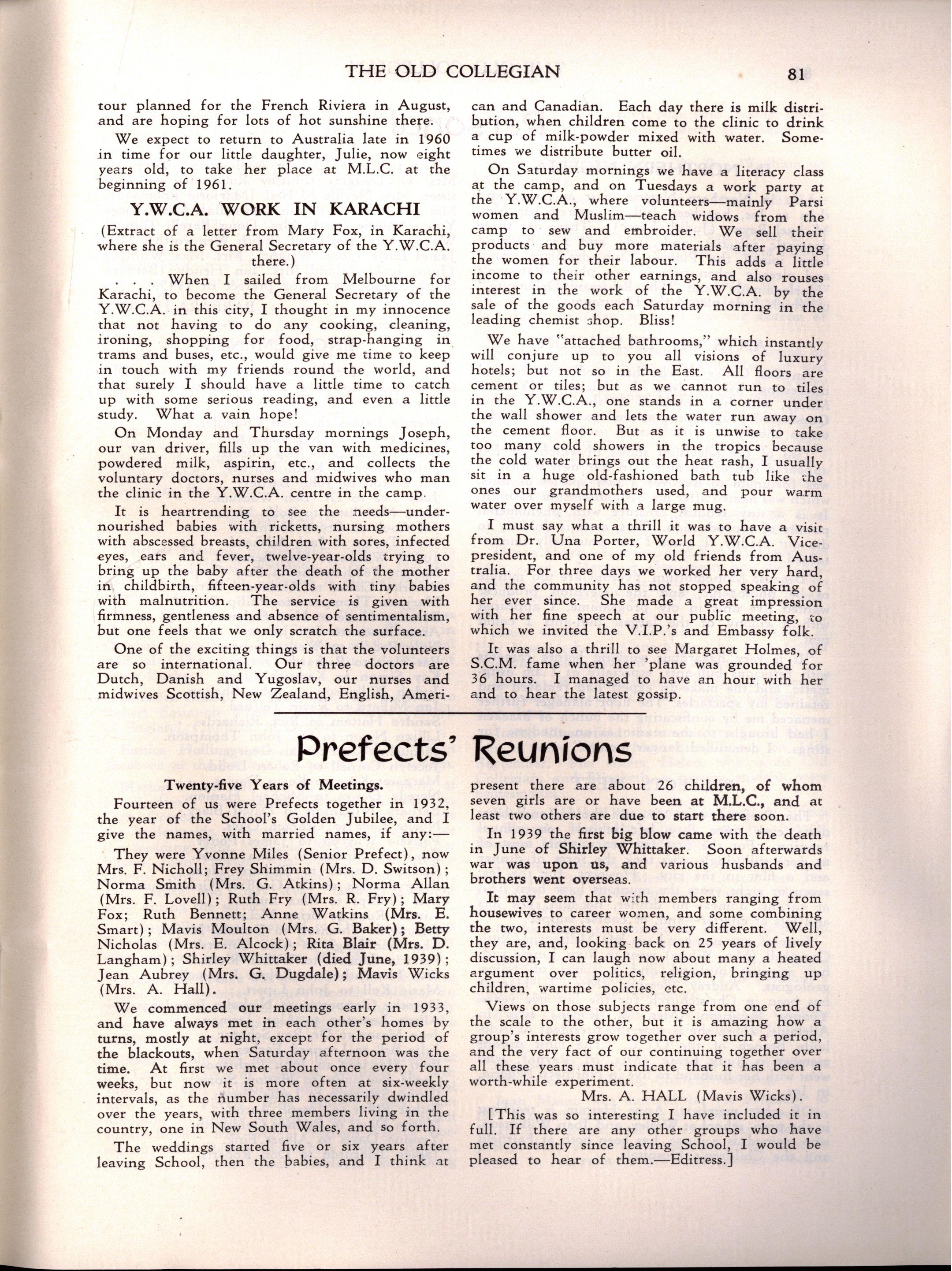
The weddings started five or six years after leaving School, then the babies, and I think at
present there are about 26 children, of whom seven girls are or have been at M.L.C., and at least two others are due to start there soon
In 1939 the first big blow came with the death in June of Shirley Whittaker Soon afterwards war was upon us, and various husbands and brothers went overseas
It may seem that with members ranging from housewives to career women, and some combining the two, interests must be very different Well, they are, and, looking back on 25 years of lively discussion, I can laugh now about many a heated argument over politics, religion, bringing up children, wartime policies, etc
Views on those subjects range from one end of the scale to the other, but it is amazing how a group's interests grow together over such a period, and the very fact of our continuing together over all these years must indicate that it has been a worth-while experiment
Mrs. A. HALL (Mavis Wicks).
[This was so interesting I have included it in full If there are any other groups who have met constantly since leaving School, I would be pleased to hear of them.—Editress.]
Life in Northern Nigeria, first at Lagos and then at Jos, has been full of interest for Mrs Michael Reyne (Judith Leask) There are three dramatic societies, and Judy and her husband have joined the Plateau Club dramatic group and already taken part in two plays—Rattigan's "Harlequinade" and "Th e Reluctant Debutante," in which Judy played the Debutante
A n Old Collegian who has lived a varied and interesting life is Mrs. F. Nicholls (Yvonne Miles), who has appeared in the A.B.C 'An y Questions" programme, as well as in a few tele vision shows
Two of the television shows in which she has appeared concerned ants In her own words, " I was fortunate to discover a new species of ants, which was named after me—Monomorium Yvonnu It is a tiny reddish creature with phenomenal powers of reproduction. Thus, as it is unlikely to die out readily, I guess I am practically immor talised."
"Because Monomorium Yvonnii are too minute to be photogenic, and the television producer wanted live ants in my programme, I appeared with a colony of the largest bull-ants I could nest."
"It is very hazardous working before cameras with ferocious bull-ants, especially as I am astig matic, and the make-up expert had removed and retained my spectacles The floor manager further menaced me by confiscating the bunch of bracken I had brought to the studio as an anodyne for stings I demanded danger money."
The Prefects of 1945 still hold (and have done ever since they left school) an annual reunion For the first few years, while most of us were still single, this took the form of dinner and a film in the city However,, for the last seven or eight years the reunions have been held at various homes—no dinner, no film, just lots and lots of chatter—and, of course, supper
Four of our number have left Melbourne Ruth Campbell (Mrs White) went to Rum Jungle with her scientist husband and a party of fellow geologists Audrey Fleming (Mrs T Harris) has been in Christchurch for the last five years Yvonne Robinson (Mrs W Roden) lives in Adelaide, where she is now the president of Ade laide Branch of the O.C.C. The most distant member is Judy Leask (Mrs M Reyne), who went with her husband to live in Northern Nigeria, in Jos
Of other members, Anne Hattam is teaching in the prep, school at Wesley, and Joan Wilkinson, who trained as a nurse, has been both at Fairfield and the Children's Hospitals.
The remainder live in Melbourne They are Mrs G Douglas (Shirley Robinson) and her sister, Mrs Neville McNeil (Marjorie Robinson), Mrs John Woo d (Phyllis Trewhella), Mrs George Yule (Valerie East), Mrs. Doug Barelli (Linnel Wood) , Mrs Ken Lyall (Edith Wentworth), Mrs James Earle (Joan Wright), Mrs Max Williams (June Jenkin), and Mrs Ian Hendy (Barbara Smith), who was senior prefect in 1945.
BARBAR A HENDY .The Club offers best wishes to the following Old Collegians, who have announced their engage ments:—
Wendy Parkes to Allan Chandler.
Sue Peverill to Reg Larner
Eve McLennan to Max Corbett
Julie Miller to Keith Murray
Jill Hilton to John Bartley
Judy Lee to Dr Ben Wadham
Mary McAllister to Rolfe Mann
Jill Cook to Bryan Fitchell
Joan Taylor to Jack Adshead
Judith Wilson to Max Bennetts
Margot Featherstone to Eric Cooper
Beverley Clarke to Archibald Burns
Marjorie Thompson to Philip Pearce. Beverley Hosie to Noel Sedawie
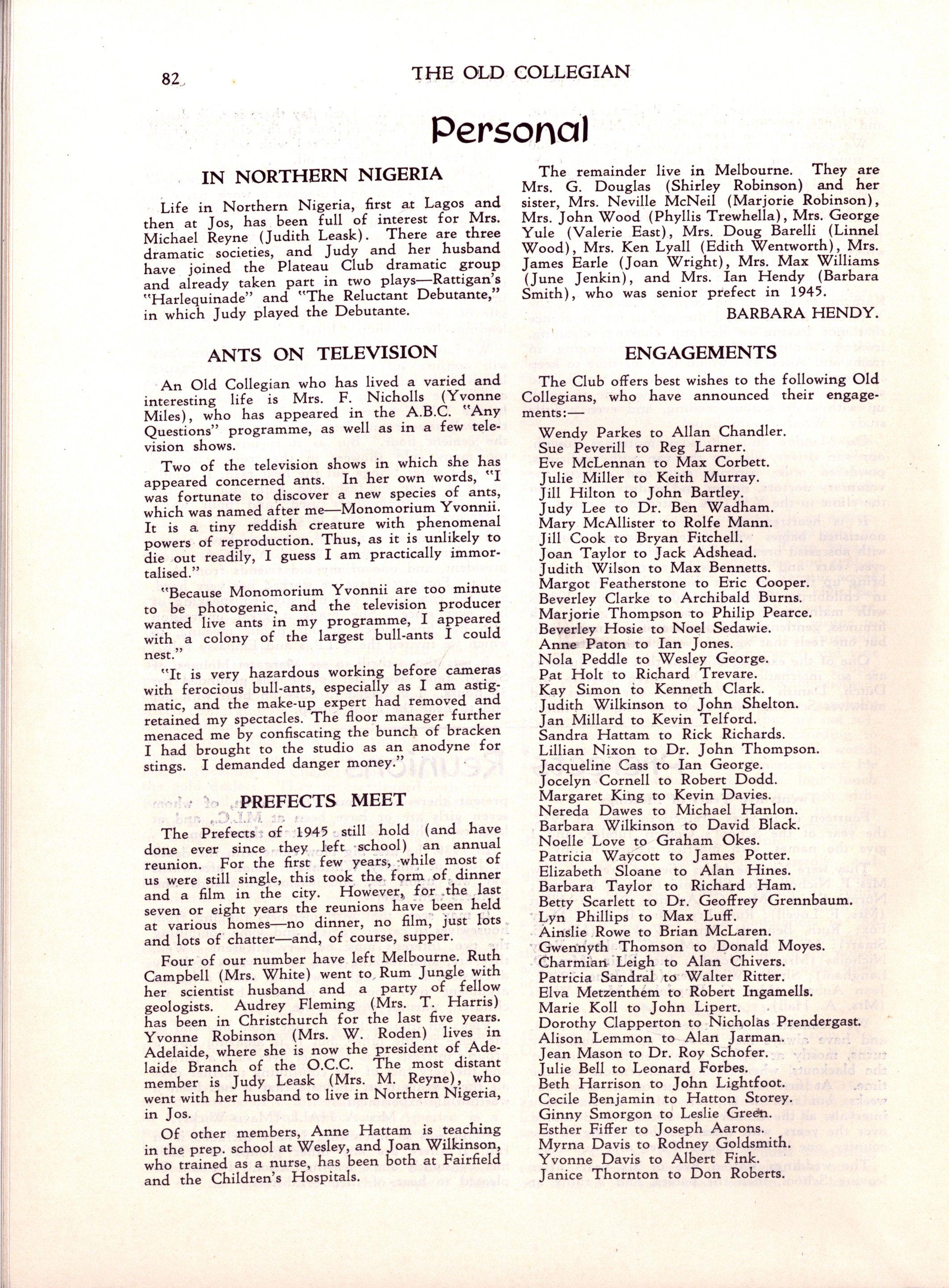
Anne Paton to Ian Jones
Nola Peddle to Wesley George Pat Holt to Richard Trevare Kay Simon to Kenneth Clark.
Judith Wilkinson to John Shelton Jan Millard to Kevin Telford
Sandra Hattam to Rick Richards
Lillian Nixon to Dr John Thompson
Jacqueline Cass to Ian George
Jocelyn Cornell to Robert Dodd
Margaret King to Kevin Davies Nereda Dawes to Michael Hanlon.
Barbara Wilkinson to David Black Noelle Love to Graham Okes
Patricia Waycott to James Potter
Elizabeth Sloane to Alan Hines
Barbara Taylor to Richard Ham
Betty Scarlett to Dr. Geoffrey Grennbaum. Lyn Phillips to Max Luff
Ainslie Rowe to Brian McLaren
Gwennyth Thomson to Donald Moyes
Charmian Leigh to Alan Chivers
Patricia Sandral to Walter Ritter
Elva Metzenthem to Robert Ingamells.
Marie Koll to John Lipert
Dorothy Clapperton to Nicholas Prendergast Alison Lemmon to Alan Jarman
Jean Mason to Dr Roy Schofer
Julie Bell to Leonard Forbes
Beth Harrison to John Lightfoot
Cecile Benjamin to Hatton Storey
Ginny Smorgon to Leslie Greein
Esther Fiffer to Joseph Aarons
Myrna Davis to Rodney Goldsmith.
Yvonne Davis to Albert Fink
Janice Thornton to Do n Roberts
Barbara Galbraith to Donald McKenzie
Judith Pittard to David Godfrey
Elaine Lincoln to Michael Cornell
Patricia Wallace to Allan Miller.
Lois Taylor to Donald Boyd
Bernice Hargrave to John Norman
Elaine Joseph to Raymond Breakey
Diana Yorston to Frank Coulter
Pamela Sinclair to Ian Bennett
Jennifer Dugdale to Laurence Hine.
Ruth Harless to Herbert Bowden
Margaret Adamson to Keith Olsen
Yvonne Casemore to Mervyn Dundas
Ann Ducat to John Henderson
Rosalie Alexander to John Henderson
Ruth Merritt to Donald Thomson
Jocelyn Woo d to William Neilson
Valerie Christian to John Mitchell
Rosalie Pomroy to Ian Lurati.
Helene Thompson to John Sutherland
Judith Bade to Philip Beresford
Anne Collett to John Williams
Pat Stocker to David Tredinnick
Janice Ferguson to Ronald Lucas
Nola Peddle to Peter Wyatt
Lorraine Barnes to George Dow
Thelma Haslam, of Burwood, was married to Barry Page Day, of Nedlands, W.A. , at Hartwell Presbyterian Church Thelma is the daughter of Hessie Graham.
Julie Sparrow was married to William Thomas Dawson Beams at Toorak Presbyterian Church in October. Julie had formerly been on the editorial staff of "Th e Argus." She is the daughter of Esme Darby
Jennifer Stamp, of Glen Iris, was married to Robert Eastaugh Ramsay at St Mary's Church of England, Caulfield, in October
Eunice Hollingsworth was married to Owen Jacobson at the Methodist Church, East Malvern.
Marion Nixon was married to Keith Palmer at St Andrew's Presbyterian Church, Corowa, on 12th October Lillian and Esme Nixon were the bridesmaids Amon g the Old Collegians at the wedding were Marigold McLennan, Heather Nixon, Joan Hanson, Mrs Fred Duncan (Mary Da vies), Mrs Donald McCready (Helen Davies), and Janice and Judy Roe. Glennys Granger sang during the service
Lillian Nixon was married to Dr John Evelyn Thompson, of Largs Bay, South Australia. They were married in Corowa on 2nd May
Jacqueline Lomax was married to Ian Gelden at Littlejohn Memorial Chapel, Scotch College, on 27th December Nance Lomax, who has recently returned from a trip to England, attended the wedding of her sister
Shirley Cole was married to Bill Matthews at St James Church of England, Ivanhoe, on 11th January Old Collegians who attended included Mrs John Purvis (Ella Pizzey), Mrs Max Robinson (Dorothy Purvis), Mrs Bill Carroll (Jean Boyd), Mrs Alan Paterson (Joyce Bot tomer), Mrs Barrie McLoghlin (Marie Beard), Mrs Len Lanyon (Judy Healey), Mrs Doug
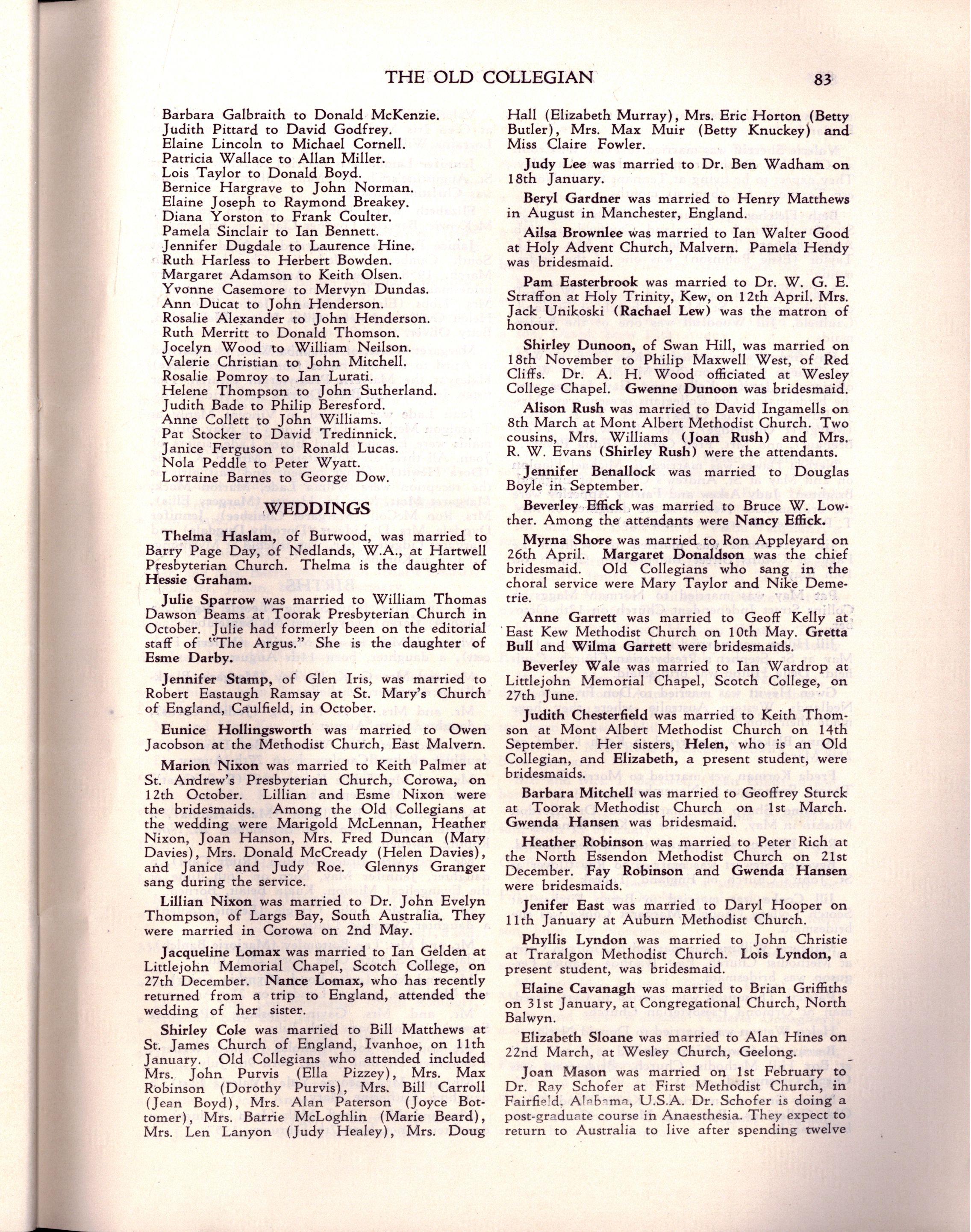
Hall (Elizabeth Murray), Mrs Eric Horton (Betty Butler), Mrs. Max Muir (Betty Knuckey) and Miss Claire Fowler
Judy Lee was married to Dr Ben Wadham on 18th January
Beryl Gardner was married to Henry Matthews in August in Manchester, England.
Ailsa Brownlee was married to Ian Walter Good at Holy Advent Church, Malvern Pamela Hendy was bridesmaid
Pam Easterbrook was married to Dr W G E Straffon at Holy Trinity, Kew, on 12th April. Mrs. Jack Unikoski (Rachael Lew) was the matron of honour
Shirley Dunoon, of Swan Hill, was married on 18th November to Philip Maxwell West, of Red Cliffs. Dr. A. H. Woo d officiated at Wesley College Chapel Gwenne Dunoon was bridesmaid
Alison Rush was married to David Ingamells on 8th March at Mont Albert Methodist Church Two cousins, Mrs Williams (Joan Rush) and Mrs R. W . Evans (Shirley Rush) were the attendants.
Jennifer Benallock was married to Douglas Boyle in September
Beverley Effick was married to Bruce W Low ther Amon g the attendants were Nancy Effick
Myrna Shore was married to Ron Appleyard on 26th April. Margaret Donaldson was the chief bridesmaid Old Collegians who sang in the choral service were Mary Taylor and Nike Deme trie
Anne Garrett was married to Geoff Kelly at East Kew Methodist Church on 10th May Gretta Bull and Wilma Garrett were bridesmaids
Beverley Wale was married to Ian Wardrop at Littlejohn Memorial Chapel, Scotch College, on 27th June
Judith Chesterfield was married to Keith Thom son at Mont Albert Methodist Church on 14th September Her sisters, Helen, who is an Old Collegian, and Elizabeth, a present student, were bridesmaids
Barbara Mitchell was married to Geoffrey Sturck at Toorak Methodist Church on 1st March. Gwenda Hansen was bridesmaid
Heather Robinson was married to Peter Rich at the North Essendon Methodist Church on 21st December Fay Robinson and Gwenda Hansen were bridesmaids
Jenifer East was married to Daryl Hooper on 11th January at Auburn Methodist Church
Phyllis Lyndon was married to John Christie at Traralgon Methodist Church Lois Lyndon, a present student, was bridesmaid.
Elaine Cavanagh was married to Brian Griffiths on 31st January, at Congregational Church, North Balwyn
Elizabeth Sloane was married to Alan Hines on 22nd March, at Wesley Church, Geelong
Joan Mason was married on 1st February to Dr Ray Schofer at First Methodist Church, in Fairfie'd A!"b^ma, U.S.A Dr Schofer is doing a post-graduate course in Anaesthesia. They expect to return to Australia to live after spending twelve
months in Alabama and twelve months in England
Valerie Sherriff was married to Peter W Crohn at Glen Iris Presbyterian Church on 1st May They expect to be living at Tennant Creek, North ern Territory, for about six months.
Beth Fletcher was married to Ken Norton at St Mary's Church of England, Caulfield, on 19th April Barbara Taylor, daughter of Mrs W I Taylor (Essie Robinson) was one of the brides maids
Judy Ankerson was married to John Woodfull on 26th April, at St Mary's Church of England, Caulfield Jill Woodfull was one of the brides maids.
Kay Simon was married to Ken Clark at Wes ley College Chapel on 5th March. Dr. Woo d officiated Jenifer Kelley and Gay Jagger were the bridesmaids Old Collegians present were Mrs J Edwards (Esme Clark), Mrs T P Dawes (Margaret Guthridge), Mrs P Winter (Vera Brehaut), and Mrs. Fred Cornell (Edna Pryor).
Nereda Dawes was married to Michael Hanlon on 2nd May at St Andrew's Church of England, Brighton Judy Askew and Fairley Apperley were the bridesmaids. Nereda is the daughter of Mrs. T P Dawes (Margaret Guthridge)
Jill McConnall was married to William Le Page at Collins Street Independent Church on 10th May
Pat May was married to Norman Maggs at Collins Street Independent Church on 12th Octo ber.
Jill Hilton was married to John Bartley on 10th May at St Stephen's Presbyterian Church, Caul field. Delia Hilton was bridesmaid.
Gwen Hewitt was married to Don Frearson, of Nedlands, Western Australia, where they have made their home
Anne Blakely was married to Keith Pittard on 21st March.
Freda Korman was married to Morris Green at Toorak Synagogue in November
Yvonne Sharp was married to Dr Gordon Mushin in May, 1957, at the St Kilda Synagogue
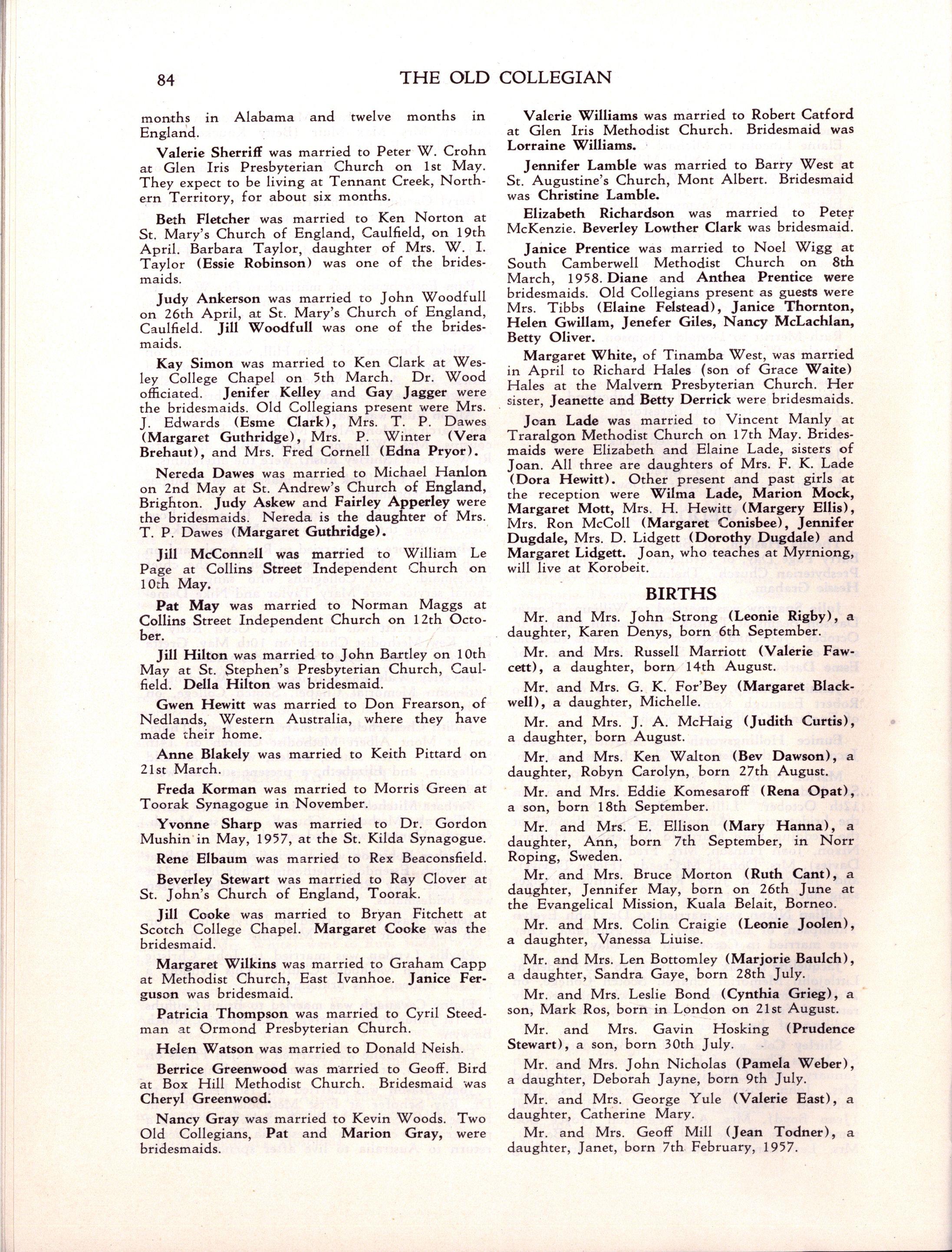
Rene Elbaum was married to Rex Beaconsfield
Beverley Stewart was married to Ray Clover at St. John's Church of England, Toorak.
Jill Cooke was married to Bryan Fitchett at Scotch College Chapel Margaret Cooke was the bridesmaid
Margaret Wilkins was married to Graham Capp at Methodist Church, East Ivanhoe Janice Fer guson was bridesmaid
Patricia Thompson was married to Cyril Steed man at Ormond Presbyterian Church.
Helen Watson was married to Donald Neish.
Berrice Greenwood was married to Geoff Bird at Box Hill Methodist Church. Bridesmaid was Cheryl Greenwood
Nancy Gray was married to Kevin Woods Two Old Collegians, Pat and Marion Gray, were bridesmaids
Valerie Williams was married to Robert Catford at Glen Iris Methodist Church. Bridesmaid was Lorraine Williams
Jennifer Lamble was married to Barry West at St Augustine's Church, Mont Albert Bridesmaid was Christine Lamble.
Elizabeth Richardson was married to Peter McKenzie Beverley Lowther Clark was bridesmaid
Janice Prentice was married to Noel Wigg at South Camberwell Methodist Church on 8th March, 1958 Diane and Anthea Prentice were bridesmaids Old Collegians present as guests were Mrs Tibbs (Elaine Felstead), Janice Thornton, Helen Gwillam, Jenefer Giles, Nancy McLachlan, Betty Oliver.
Margaret White, of Tinamba West, was married in April to Richard Hales (son of Grace Waite) Hales at the Malvern Presbyterian Church Her sister, Jeanette and Betty Derrick were bridesmaids.
Joan Lade was married to Vincent Manly at Traralgon Methodist Church on 17th May Brides maids were Elizabeth and Elaine Lade, sisters of Joan. All three are daughters of Mrs. F. K. Lade (Dora Hewitt) Other present and past girls at the reception were Wilma Lade, Marion Mock, Margaret Mott, Mrs H Hewitt (Margery Ellis), Mrs Ron McColl (Margaret Conisbee), Jennifer Dugdale, Mrs. D. Lidgett (Dorothy Dugdale) and Margaret Lidgett Joan, who teaches at Myrniong, will live at Korobeit
Mr and Mrs John Strong (Leonie Rigby), a daughter, Karen Denys, born 6th September
Mr and Mrs Russell Marriott (Valerie Faw cett), a daughter, born 14th August
Mr and Mrs G K For'Bey (Margaret Black well), a daughter, Michelle
Mr and Mrs J A McHaig (Judith Curtis), a daughter, born August
Mr. and Mrs. Ken Walton (Bev Dawson), a daughter, Robyn Carolyn, born 27th August
Mr. and Mrs. Eddie Komesaroff (Rena Opat) , a son, born 18th September
Mr and Mrs E Ellison (Mary Hanna), a daughter, Ann, born 7th September, in Norr Roping, Sweden
Mr. and Mrs. Bruce Morton (Ruth Cant), a daughter, Jennifer May, born on 26th June at the Evangelical Mission, Kuala Belait, Borneo
Mr and Mrs Colin Craigie (Leonie Joolen), a daughter, Vanessa Liuise.
Mr. and Mrs. Len Bottomley (Marjorie Baulch), a daughter, Sandra Gaye, born 28th July
Mr and Mrs Leslie Bond (Cynthia Grieg), a son, Mark Ros, born in London on 21st August
Mr and Mrs Gavin Hosking (Prudence Stewart), a son, born 30th July
Mr and Mrs John Nicholas (Pamela Weber), a daughter, Deborah Jayne, born 9th July
Mr and Mrs George Yule (Valerie East), a daughter, Catherine Mary
Mr. and Mrs. Geoff Mill (Jean Todner), a daughter, Janet, born 7th February, 1957
Mr and Mrs Bill Newton (Margaret Todner), a son, Michael, born 21st September.
Mr and Mrs Duncan Phillips (Stephanie Elliott), a son
Mr and Mrs Geoff Douglas (Shirley Robin son), a daughter, Suzanne Elizabeth, born 21st December
Mr and Mrs F T Spriggs (Margaret Holds worth), a daughter, Elizabeth Helen, born 21st November.
Mr. and Mrs. Geoff Brown (Marjorie Morton), a son, Haydn, born 14th January
Mr and Mrs Ray Delarue (Dorothy Kerwin), a son, Brian Raymond, born 10th December
Mr and Mrs Ken Gaze (Rhonda Fish), a son, David John, born 31st January
Mr. and Mrs. Neville McNeal (Marjorie Rob inson), a daughter, Claire Elizabeth, born 7th February
Mr and Mrs Robert Fuller (April Adams), a son, Mark Ashley, born 12th February
Mr. and Mrs. Jack Batten (Ruth Turner), a son, Andrew George, born November.
Mr and Mrs Lindsay Waller (Elva Marriott), a son, Mark
Mr. and Mrs. Douglas Hall (Elizabeth Murray), a son, Stewart, born 26th January.
Mr and Mrs Barrie McLoghlin (Marie Beard), a daughter, Jillian, born 6th January
Mr. and Mrs. Dion Good (Betty Le Pine), a daughter, Elizabeth Frances, born 17th December.
Mr and Mrs Ken Lynch (Enid Sherry), a daughter, born 6th February
Mr and Mrs T Harris (Audrey Fleming), a son, Phillip, born November, in Christchurch, New Zealand
Mr. and Mrs. Ken Williams (Betty Matthews), a son, Robert Kenneth, born 14th December
Dr. and Mrs. F. A. Stenning (Bronwyn Wolla cott), a son, born on 3rd November
Mr and Mrs R W Evans (Shirley Rush), a daughter, Lynette Rae, born 2nd June
Mr and Mrs R Long (Estelle Binns), a son, Peter
Mr and Mrs Howard (Barbara Kemp), a son, born in July
Mr and Mrs H Hammond (Beverley Kiddle), a son, born in July.
Mr and Mrs O Pigdon (Barbara Ward) , a son, Miles Jon, born 29th September
Mr and Mrs J Barber (Constance Williams), a son, Christopher James, born 3rd December
Dr. and Mrs. Len Farragher (Noni Rentoul), a daughter, born 28th June
Mr and Mrs Egil Slang (Nancy Dufty), a daughter, born at Red Cross Clinic, Oslo, Norway, in June.
Mr and Mrs R E Pepper (Jenny McConchie), a daughter, Wendy Anne, born 3rd October.
Mr and Mrs G Baker (Nancy Wheaton), a son, John Stanley, born 26th November
Mr. and Mrs. G. Piper (Dulcie Wheaton), a son, Robert George, born 24th November
Mr and Mrs Alan Gollings (Ruth Pizzy), a son, Alan Guy, born 20th February
Mr and Mrs Stride (Dorothy Colemann), a son, Ross Alan, born 28th September
Mr and Mrs Ian Clarke (Heather Murdoch), a son, born 25th February
Mr and Mrs Robin McFarlane (Alison Sand bach), a daughter, Heather Anne, born 9th July
Mr and Mrs Peter Dunn (Peggy Barlow), a son, Robert Douglas, born 28th July
Mr and Mrs Neville Montague (Enid Rowe), a son, David, born 12th August.
Mr and Mrs Gavin Hamley (Noelle Judkins), a daughter, Susan Elizabeth, born 27th August
Mr. and Mrs. Norman Beurle (Margaret Bar ber), a daughter, born 25th September
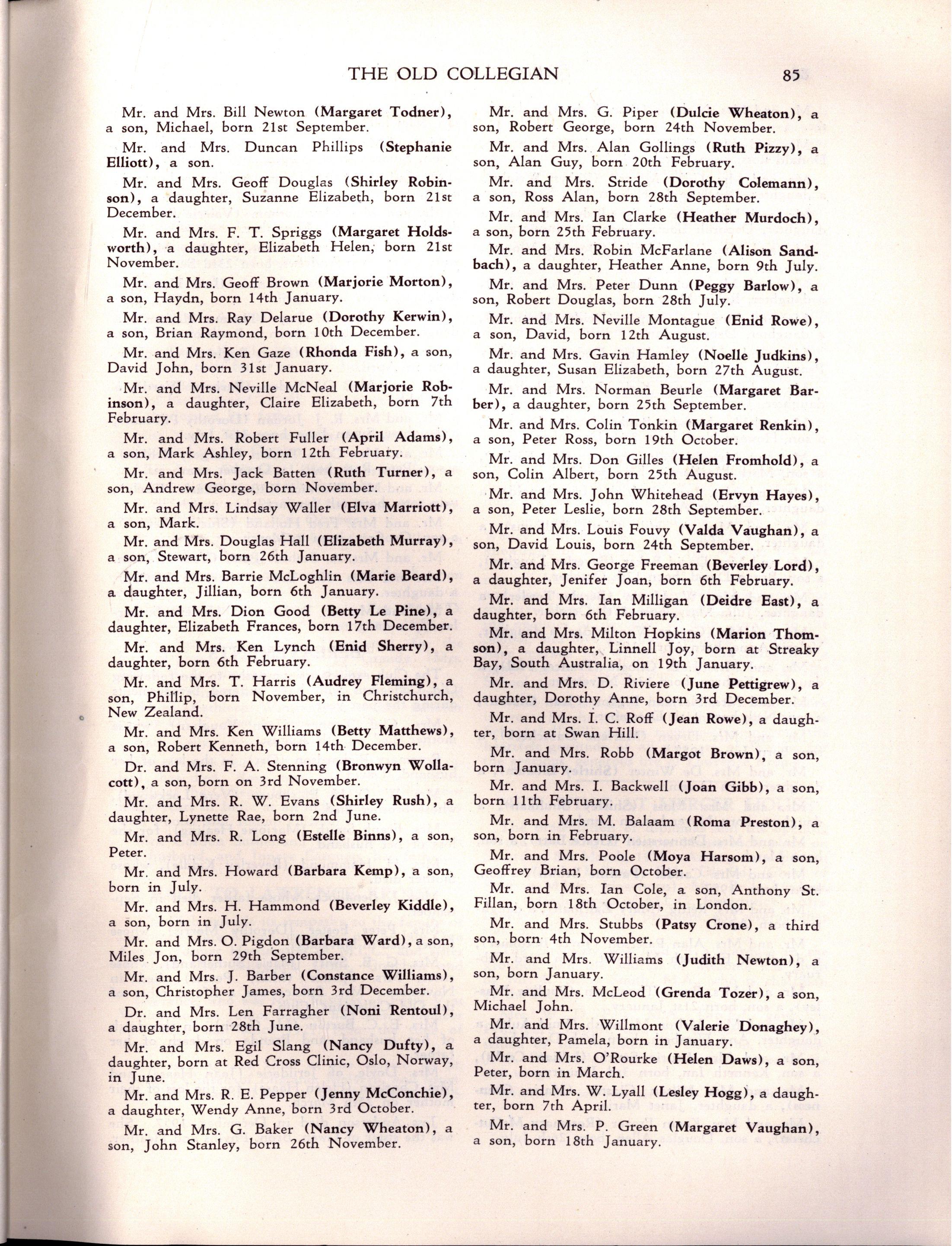
Mr and Mrs Colin Tonkin (Margaret Renkin), a son, Peter Ross, born 19th October
Mr and Mrs Do n Gilles (Helen Fromhold), a son, Colin Albert, born 25th August
Mr. and Mrs. John Whitehead (Ervyn Hayes), a son, Peter Leslie, born 28th September
Mr and Mrs Louis Fouvy (Valda Vaughan), a son, David Louis, born 24th September
Mr and Mrs George Freeman (Beverley Lord), a daughter, Jenifer Joan, born 6th February
Mr and Mrs Ian Milligan (Deidre East), a daughter, born 6th February
Mr and Mrs Milton Hopkins (Marion Thom son), a daughter, Linnell Joy, born at Streaky Bay, South Australia, on 19th January
Mr and Mrs D Riviere (June Pettigrew), a daughter, Dorothy Anne, born 3rd December
Mr and Mrs I C Roff (Jean Rowe), a daugh ter, born at Swan Hill
Mr and Mrs Robb (Margot Brown), a son, born January
Mr. and Mrs. I. Backwell (Joan Gibb), a son, born 11th February.
Mr and Mrs M Balaam (Roma Preston), a son, born in February
Mr and Mrs Poole (Moya Harsom), a son, Geoffrey Brian, born October
Mr and Mrs Ian Cole, a son, Anthony St Fillan, born 18th October, in London
Mr and Mrs Stubbs (Patsy Crone), a third son, born 4th November
Mr and Mrs Williams (Judith Newton), a son, born January
Mr and Mrs McLeod (Grenda Tozer), a son, Michael John
Mr and Mrs Willmont (Valerie Donaghey), a daughter, Pamela, born in January
Mr. and Mrs. O'Rourke (Helen Daws), a son, Peter, born in March
Mr and Mrs W Lyall (Lesley Hogg) , a daugh ter, born 7th April
Mr and Mrs P Green (Margaret Vaughan), a son, born 18th January.
Mr and Mrs Nicholls (Pam Weber), a daugh ter
Mr and Mrs Gibbons (Pat Dufty), a son, Donald Ross, born March, 1957.
Mr and Mrs Gilby Morrell (Robyn Wright), a daughter, Penelope Jane, born 12th September
Mr and Mrs Ken Inglis (Judy Betheras), a daughter, Deborah Louise, born 9th January
Mr and Mrs Colin Marlin (Dorothy Vineer), a son
Mr and Mrs John Inglis (Janet Reardon), a daughter, Robin Mary
Mr. and Mrs. Joe Cooper (Deidre Manning), a daughter, Deborah Jane
Mr. and Mrs. Graham Dodson (Audrey Pearce), a daughter, Alison Joan
Mr and Mrs Henry Kirk (Isobel Schultz), a daughter, Joanne
Mr and Mrs Marsden Banks (Jocelyn Dawson), a son, Howard Noel, born 25th December
Mr and Mrs Malcolm Pascoe (Kay Forbes), a son, Mark MacKenzie, born in May
Mr and Mrs Leon Pedrick (Iris Arnold), a daughter, Heather Anne
Mr and Mrs A Hill (Kath Williams), a daughter, Jennifer
Mr and Mrs David Baker (Beverley Laugher), a son, Bryan David, born 17th October.
Mr. and Mrs. W . Urwin (Beryle Towler), a daughter, Julia Mary, born 27th October.
Mr. and Mrs. George Woodbridge, a daughter, Valerie Anne, born April, 1957
Mr. and Mrs. J. B. Gilbert (Frances Hill), a daughter, Kathryn, born 13 th November
Mr and Mrs Norman Piggott (Jean Gibson), a son, Neil, born 11th December
Mr and Mrs Dryen (Marlene Dabscheck), a son, born June, 1957
Mr. and Mrs. De Winter (Shirley Elbaum), a daughter, born December
Mr. and Mrs. Moss (Shirley Shulman), a daughter, born November, in London
Mr and Mrs Dennerstien (Grace Barr), a son, born March.
Mr and Mrs Candel (Pauline Brown), a son, born June, 1957
Mr. and Mrs. Rettig (Mary Zalcman), a daugh ter, born April
Mr. and Mrs. Alan Paterson (Joyce Bottomer), a daughter, Elizabeth Margaret, born 23 rd Feb ruary.
Mr and Mrs Bruce Thompson (Pauline Beas ley), a son, born 21st January
Mr and Mrs Melton Mcintosh (Enid Ault), a daughter, An n Elizabeth, born 26th December
Mr and Mrs Laurie Smith (Lillian Cocks), a son, Kenneth Ian, born 3rd January.
Mr and Mrs Milton Gloster (Marie Gren ness), a daughter, Janet Marie
Mr and Mrs Kevin Frazer (Rosemary McCut cheon), a son, Douglas Allen, born 26th July
Mr and Mrs Noel Burley (Joan Lenne), a son, Michael Noel, born 16th January
Mr and Mrs Douglas Hall (Elizabeth Murray), a son, Stuart Douglas, born 26th January
Mr and Mrs David Lancaster (Shirley Lugton), a son, John, born in London on 30th May.
Mr. and Mrs. Max Latham (Valerie Rowe), a daughter, born 10th November
Mr. and Mrs. Frank Pederick (Mary Macken zie), a son, Ross Andrews, born 23rd September
Mr and Mrs Albert Stanton (Lois Haase), a daughter, born 30th April
Mr and Mrs B Day (Thelma Haslam), a daughter, Michele Lee, born in Perth on 2nd May.
Mr. and Mrs. R de (Doris Bugh), a daughter, born in April
Mr and Mrs O Pigdon (Barbara Ward) , a son, Miles
Mr and Mrs R J Jordan (Dorothy Pilbeam), a daughter, Susan Jane, born 31st July
Mr. and Mrs. Colin Tonkin (Margery Renkin), a son, Peter Ross, born 1st October
Mr and Mrs Warwick Kittson (Marie Hakely), twin sons, born 6th January
Mr and Mrs Fred Holland (Shirley Stevens), a son, Geoffrey, born in March
Mr. and Mrs. A. Stubbs (Patsy Crome), a son.
Mr. and Mrs. Ken Brown (Barbara McCoy) , a daughter.
Mr and Mrs E R Eastman (Jeneve Suther land), a daughter.
The Club extends its sympathy to the following Old Collegians who have suffered bereavements during the past year
Mrs Cliff Tapner (Jean Vaughan), whose mother died on 6th August.
Rosemary Richardson (Orr), in the loss of her husband, David.
Mrs. W . C. H. Blackburn (Vera Lockwood), whose brother died Mrs Frank Smith (Marjorie Healing), for the loss of her husband
Mrs H Hammond (Beverley Kiddle), whose mother died.
Miss J Benallock, whose father died in Sep tember
Mrs. Peter Foster (Dorothy Morris), whose father died in November
Mrs G B Swift (Marie Sutherland), whose sister, Mrs Spence (Molly Pearse) died in November Mrs Spence was a life member of the Old Collegians' Club.
Mrs E C Burton (Ida Green), on the death of her husband, and Brenda on death of her father
Mrs. Doyle, of Jerilderie (Joan Haase) and Mrs Charlton (Helen Haase), for the loss of their mother on 25th March.
Jess Anderson died in December, 1957. She was the sister of Gwen, Bron, Phyllis and Heather
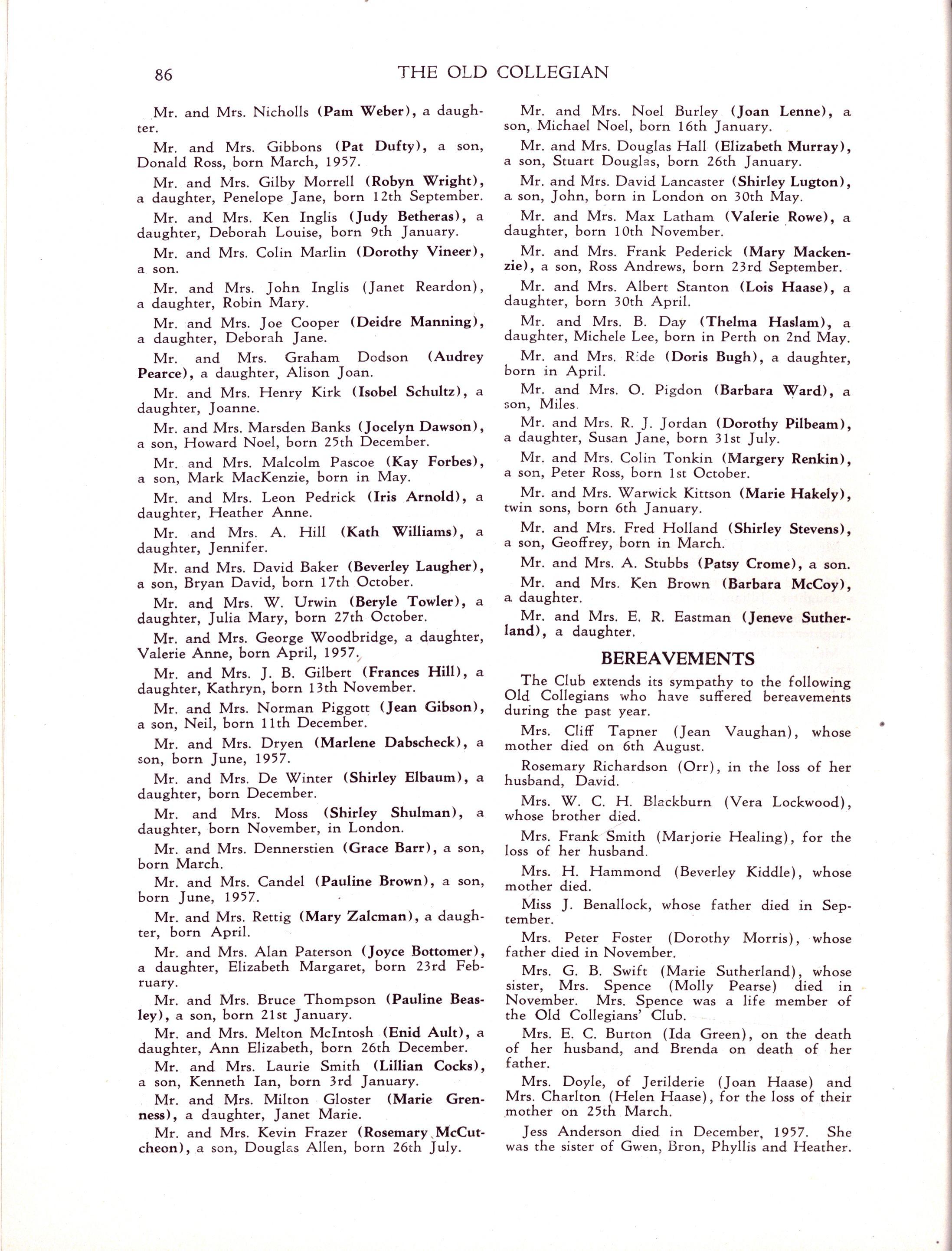
Evely Rutter, who was an Old Collegian, died on 11th March She had worked with the Brother hood of St Laurance
Another Old Collegian, Margaret Anne Ker rison, who was at school in 1951, died in Brisbane at the end of June, 1957, aged 23 years.
Marie Rendle, for the loss of her father on 11th September
Brightie and Minnie Beckett, for the loss of their mother on 2nd January
Miss Dorothea Cerutty, whose mother died on 29th April
Miss Mavis Aspinall, for the loss of her mother on 22nd April
The Gadsen family, Helen, Clare and Gwen, for the loss of their father on 25th July
Mrs Edward Jones (Violet Sutton), for the loss of her husband on 4th August, and Gwenyth, for the loss of her father
Miss Yutha Thiemeyer (Mrs Holliday), whose father died on 5th October
Miss Jessie Delbridge (Earl Robert), for the loss of her mother on 18th September
Lucy, Aileen and Phyllis (Mrs. Field) Kellaway, whose father died on 27th October
Miss Doris Bew, for the loss of her mother on 19th January.
Win Everett and her mother and brother, on the loss of their father
Margery Pettigrew, whose sister, Fay (Mrs D Chisholm, of Yallourn), died in June, 1957
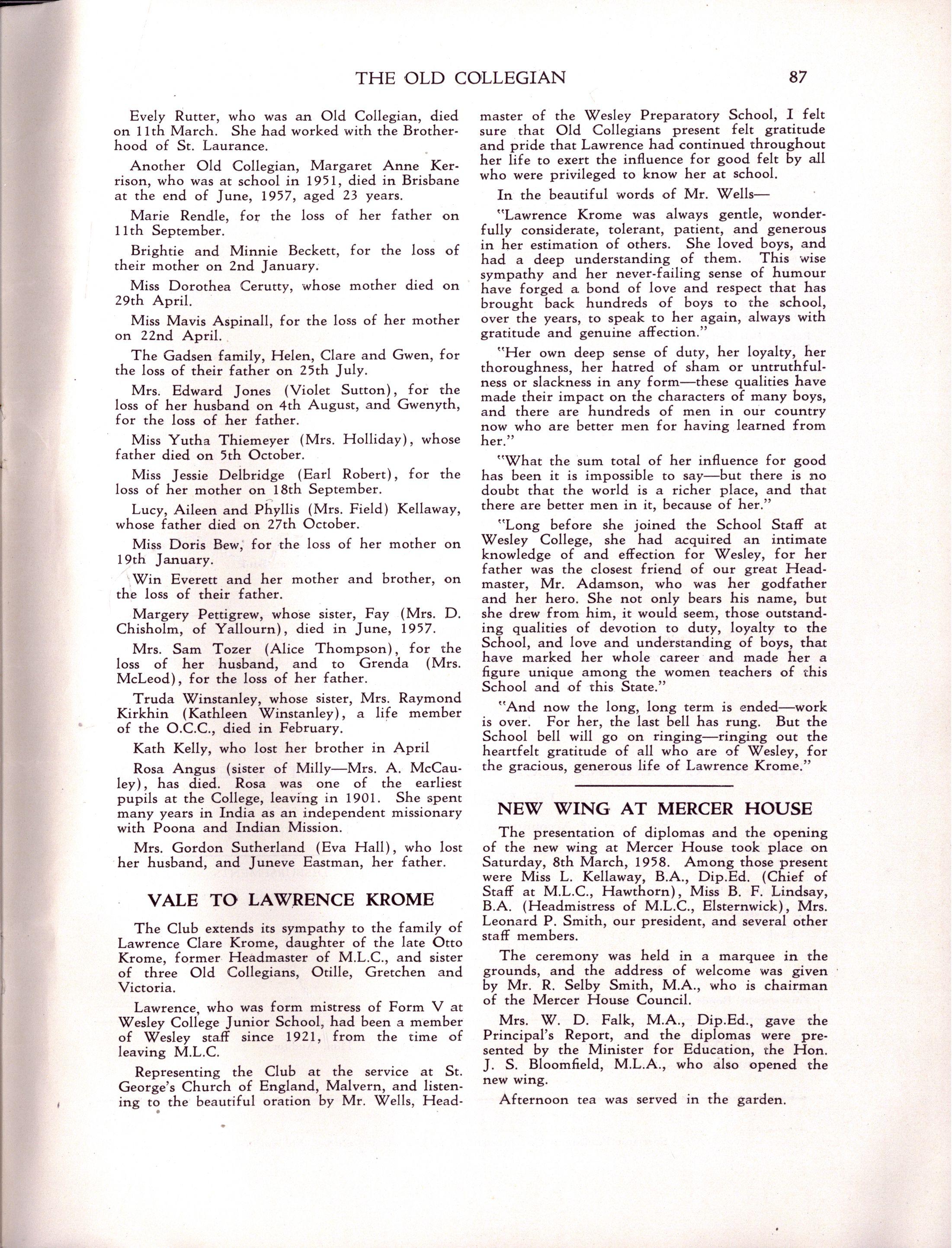
Mrs Sam Tozer (Alice Thompson), for the loss of her husband, and to Grenda (Mrs McLeod), for the loss of her father
Truda Winstanley, whose sister, Mrs Raymond Kirkhin (Kathleen Winstanley), a life member of the O.C.C., died in February
Kath Kelly, who lost her brother in April
Rosa Angus (sister of Milly—Mrs A McCau ley), has died Rosa was one of the earliest pupils at the College, leaving in 1901. She spent many years in India as an independent missionary with Poona and Indian Mission
Mrs Gordon Sutherland (Eva Hall), who lost her husband, and Juneve Eastman, her father.
The Club extends its sympathy to the family of Lawrence Clare Krome, daughter of the late Otto Krome, former Headmaster of M.L.C., and sister of three Old Collegians, Otille, Gretchen and Victoria
Lawrence, who was form mistress of Form V at Wesley College Junior School, had been a member of Wesley staff since 1921, from the time of leaving M.L.C
Representing the Club at the service at St George's Church of England, Malvern, and listen ing to the beautiful oration by Mr. Wells, Head
master of the Wesley Preparatory School, I felt sure that Old Collegians present felt gratitude and pride that Lawrence had continued throughout her life to exert the influence for good felt by all who were privileged to know her at school
In the beautiful words of Mr Wells—
"Lawrence Krome was always gentle, wonder fully considerate, tolerant, patient, and generous in her estimation of others She loved boys, and had a deep understanding of them This wise sympathy and her never-failing sense of humour have forged a bond of love and respect that has brought back hundreds of boys to the school, over the years, to speak to her again, always with gratitude and genuine affection."
"Her own deep sense of duty, her loyalty, her thoroughness, her hatred of sham or untruthful ness or slackness in any form—these qualities have made their impact on the characters of many boys, and there are hundreds of men in our country now who are better men for having learned from her."
"What the sum total of her influence for good has been it is impossible to say—but there is no doubt that the world is a richer place, and that there are better men in it, because of her."
"Long before she joined the School Staff at Wesley College, she had acquired an intimate knowledge of and effection for Wesley, for her father was the closest friend of our great Head master, Mr Adamson, who was her godfather and her hero She not only bears his name, but she drew from him, it would seem, those outstand ing qualities of devotion to duty, loyalty to the School, and love and understanding of boys, that have marked her whole career and made her a figure unique among the women teachers of this School and of this State."
"An d now the long, long term is ended—work is over. For her, the last bell has rung. But the School bell will go on ringing—ringing out the heartfelt gratitude of all who are of Wesley, for the gracious, generous life of Lawrence Krome."
The presentation of diplomas and the opening of the new wing at Mercer House took place on Saturday, 8th March, 1958 Among those present were Miss L Kellaway, B.A., Dip.Ed (Chief of Staff at M.L.C., Hawthorn), Miss B. F. Lindsay, B.A (Headmistress of M.L.C., Elsternwick), Mrs Leonard P Smith, our president, and several other staff members
The ceremony was held in a marquee in the grounds, and the address of welcome was given by Mr R Selby Smith, M.A., who is chairman of the Mercer House Council
Mrs W D Falk, M.A., Dip.Ed., gave the Principal's Report, and the diplomas were pre sented by the Minister for Education, the Hon J S Bloomfield, M.L.A., who also opened the new wing
Afternoon tea was served in the garden
Statement of Receipts and Payments for Year Ended 31st December, 1957
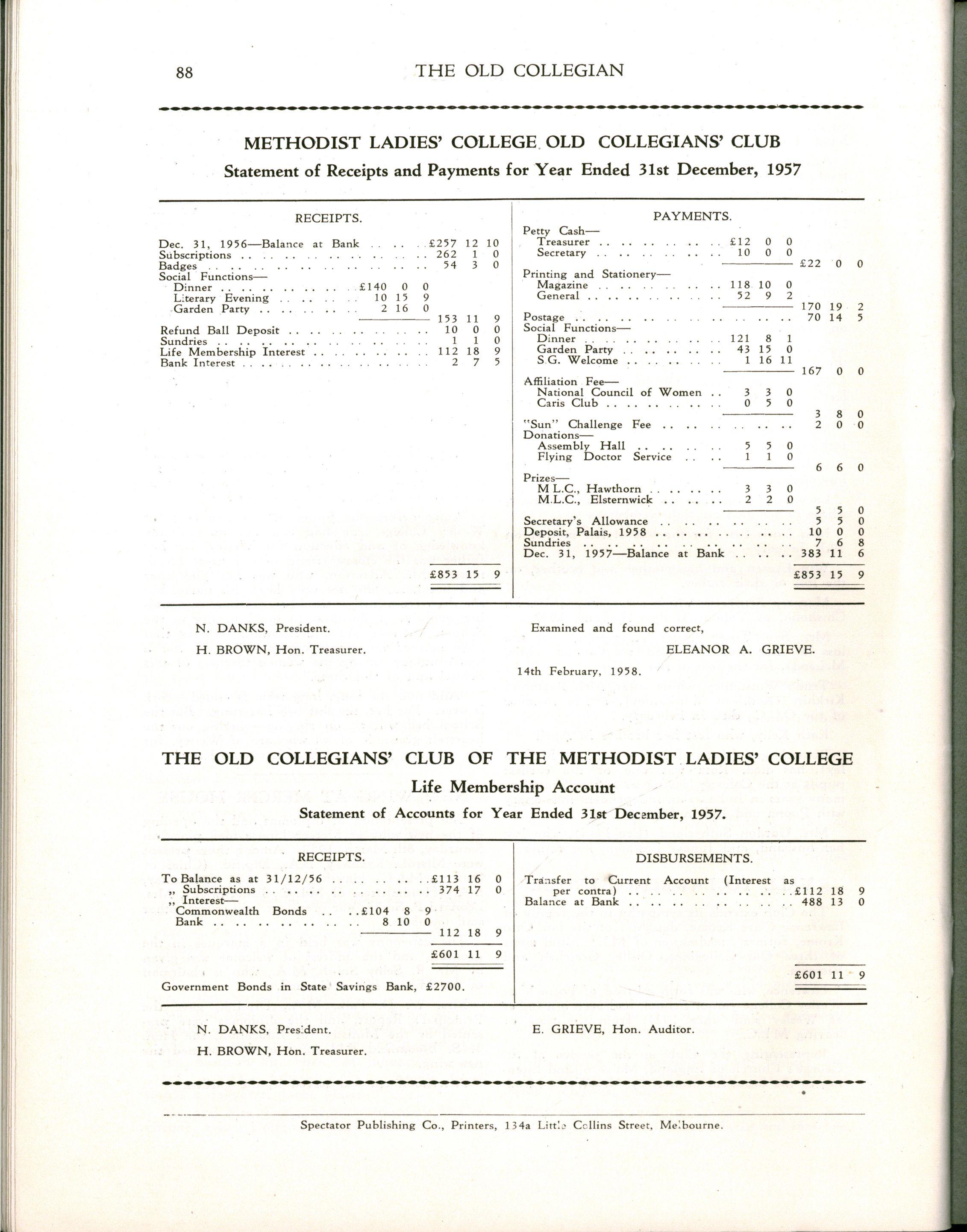
RECEIPTS.
Dec 31, 1956—Balance at Bank £257 12 10 Subscriptions 262 1 0 Badges 54 3 0 Social Functions— Dinner £140 0 0 Literary Evening 101 5 9 Garden Party 21 6 0 153 11 9
Refund Ball Deposit 10 0 0 Sundries 1 1 0 Life Membership Interest 112 18 9 Bank Interest 2 7 5 £853 15 9
Petty Cash— Treasurer Secretary
Printing and Stationery— Magazine General Postage Social Functions— Dinner Garden Party S.G. Welcome
Affiliation Fee— National Council of Women Caris Club "Sun " Challenge Fee . . Donations— Assembly Hall Flying Doctor Service
Prizes— M L.C., Hawthorn M.L.C., Elsternwick
Allowance
Palais,
Dec. 31, 1957—Balance at Bank 383 11 £853 15 9
Examined and found correct, H BROWN , Hon Treasurer ELEANOR A GRIEVE
N DANKS , President
N DANKS , President H BROWN , Hon Treasurer
14th February, 1958.
E GRIEVE, Hon Auditor
Spectator Publishing Co., Printers, 134a Little Ccllins Street, Melbourne

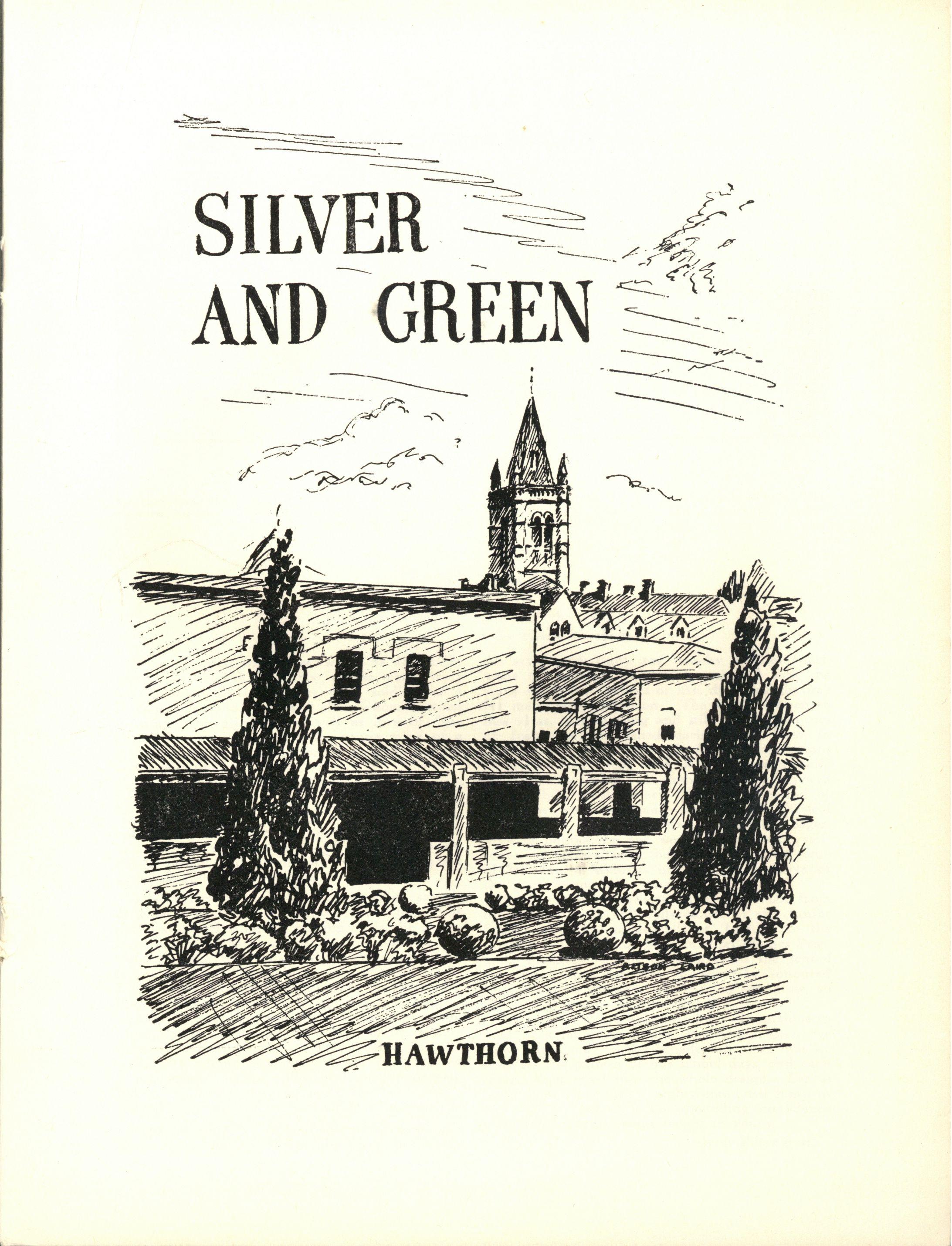
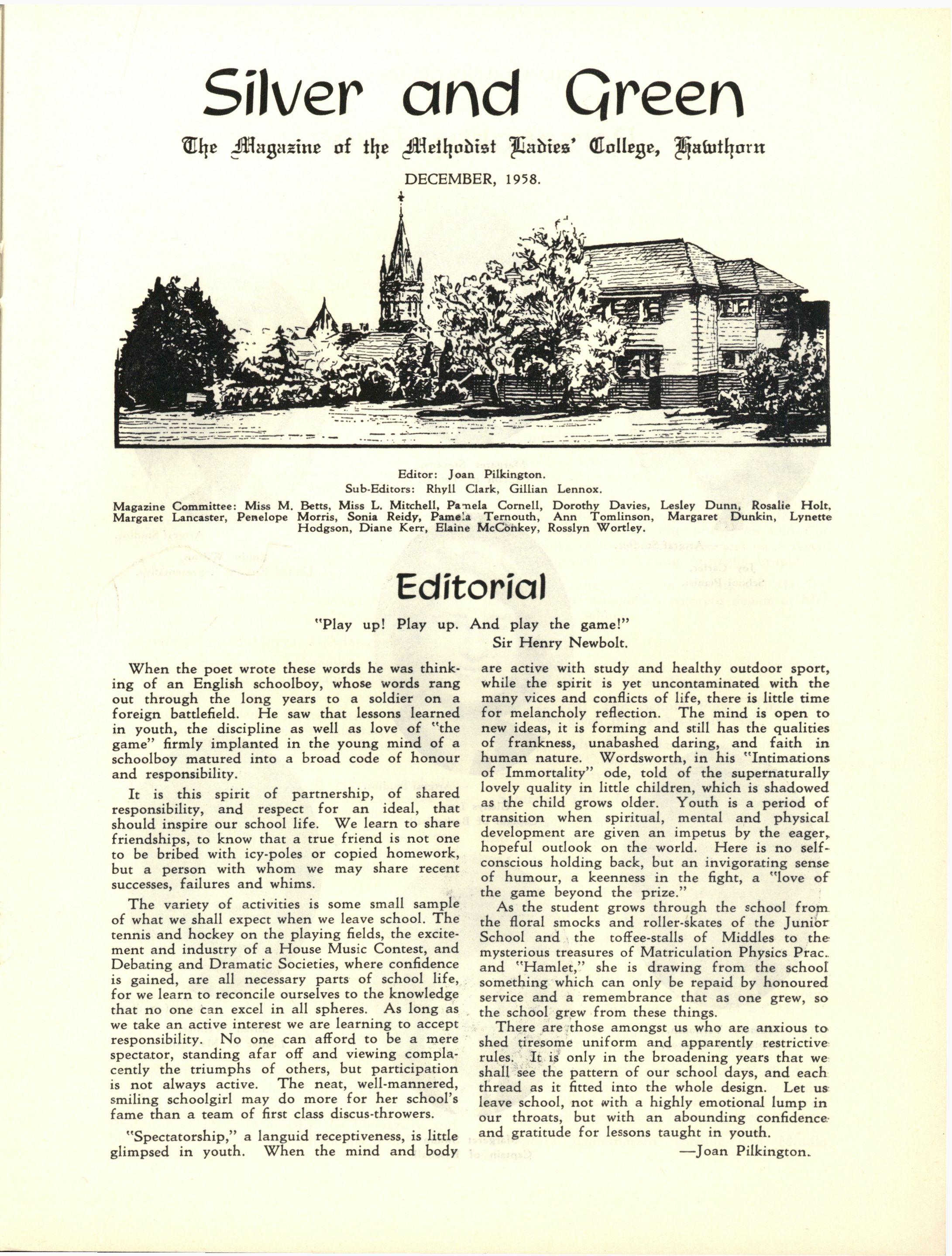
Editor: Joan Pilkington
Sub-Editors: Rhyll Clark, Gillian Lennox
Magazine Committee: Miss M Betts, Miss L Mitchell, Pa-nela Cornell, Dorothy Davies, Lesley Dunn, Rosalie Holt, Margaret Lancaster, Penelope Morris, Sonia Reidy, Pamela Ternouth, Ann Tomlinson, Margaret Dunkin, Lynette Hodgson, Diane Kerr, Elaine McConkey, Rosslyn Wortley
"Play up! Play up. And play the game!"
EditorialSir Henry Newbolt.
When the poet wrote these words he was think ing of an English schoolboy, whose words rang out through the long years to a soldier on a foreign battlefield. He saw that lessons learned in youth, the discipline as well as love of "the game" firmly implanted in the young mind of a schoolboy matured into a broad code of honour and responsibility
It is this spirit of partnership, of shared responsibility, and respect for an ideal, that should inspire our school life We learn to share friendships, to know that a true friend is not one to be bribed with icy-poles or copied homework, but a person with whom we may share recent successes, failures and whims.
The variety of activities is some small sample of what we shall expect when we leave school. The tennis and hockey on the playing fields, the excite ment and industry of a House Music Contest, and Debating and Dramatic Societies, where confidence is gained, are all necessary parts of school life, for we learn to reconcile ourselves to the knowledge that no one can excel in all spheres. As long as we take an active interest we are learning to accept responsibility. No one can afford to be a mere spectator, standing afar off and viewing compla cently the triumphs of others, but participation is not always active. The neat, well-mannered, smiling schoolgirl may do more for her school's fame than a team of first class discus-throwers.
"Spectatorship," a languid receptiveness, is little glimpsed in youth. When the mind and body
are active with study and healthy outdoor sport, while the spirit is yet uncontaminated with the many vices and conflicts of life, there is little time for melancholy reflection The mind is open to new ideas, it is forming and still has the qualities of frankness, unabashed daring, and faith in human nature. Wordsworth, in his "Intimations of Immortality" ode, told of the supernaturally lovely quality in little children, which is shadowed as the child grows older Youth is a period of transition when spiritual, mental and physical development are given an impetus by the eager, hopeful outlook on the world. Here is no self conscious holding back, but an invigorating sense of humour, a keenness in the fight, a "love of the game beyond the prize."
As the student grows through the school from the floral smocks and roller-skates of the Junior School and the toffee-stalls of Middles to the mysterious treasures of Matriculation Physics Prac. and "Hamlet," she is drawing from the school something which can only be repaid by honoured service and a remembrance that as one grew, so the school grew from these things.
There are those amongst us who are anxious to shed tiresome uniform and apparently restrictive rules. It is only in the broadening years that we shall see the pattern of our school days, and each thread as it fitted into the whole design Let us leave school, not with a highly emotional lump in our throats, but with an abounding confidence and gratitude for lessons taught in youth.
—Joan Pilkington.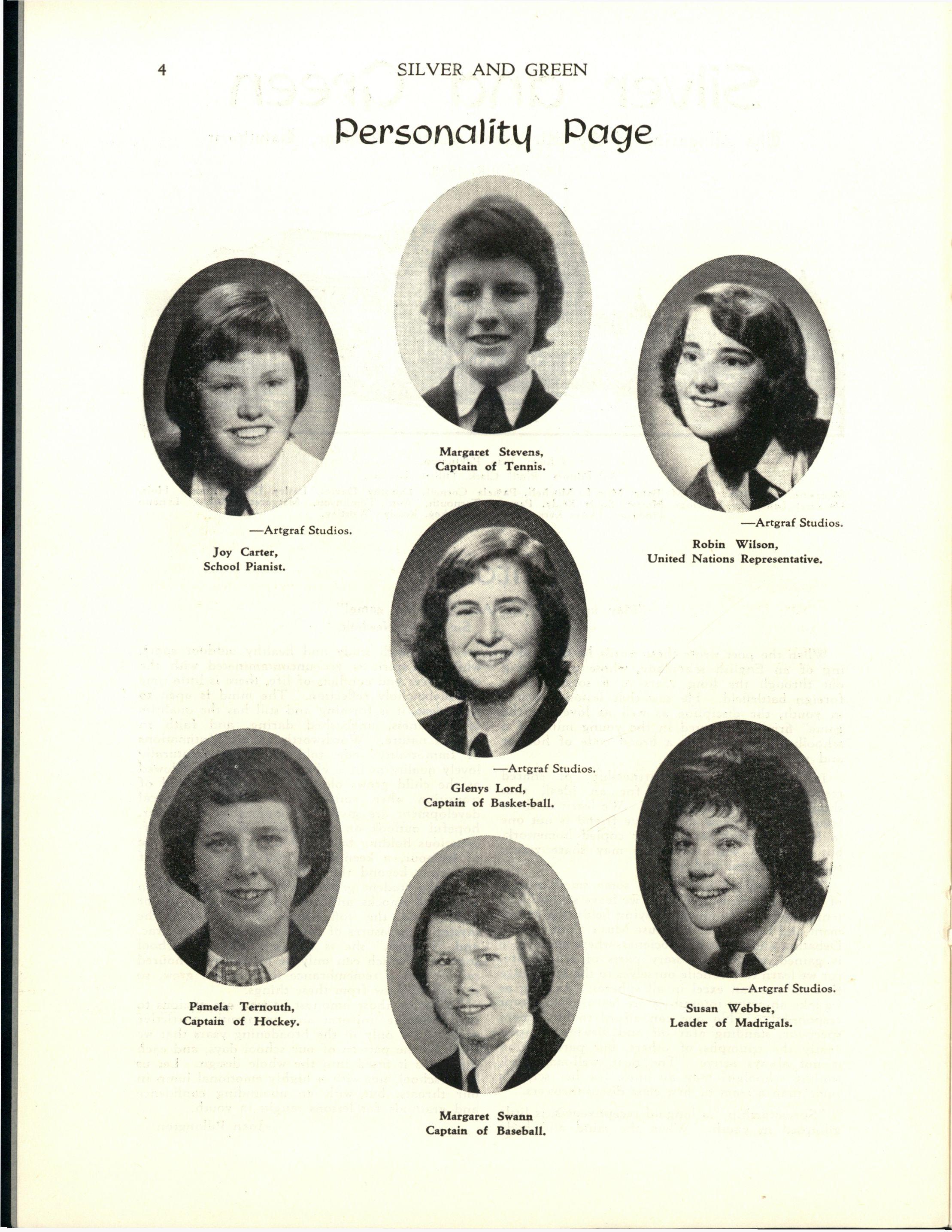
Tuesday, 3rd: Beginning of Term II.
Wednesday, 18th: A party of Matriculation Literature girls attended the stirring South African racial drama, "Cry, the Beloved Coun try" at the Union Theatre.
Friday, 27th: Parents' Association met in the Assembly Hall
Wednesday, 2nd: Matriculation Expression girls attended a lecture given by Mr. Philip Law, direc tor of Australian Antarctic Research Division at Queen's College.
Friday, 4th: Mrs. Laxton, under auspices of the U.N.A., spoke of the work of the Save the Children Fund in Open Period
S.C.M. Inter-school Tea and Service was held at M.L.C.
Matriculation members of the Debating Society attended a round-table debate at Scotch College.
Middle and Lower Middle Examinations began.
Friday, 11th: Scripture Examination Monday, 14th: Mid-term Holiday
Friday, 18th: A party of members of the Debat ing Society enjoyed a round-table debate at Cam berwell High School.
Wednesday, 23rd: Matriculation Chemistry students attended a lecture on Qualitative Analysis given by Dr O'Donnell at the Marson Lecture Theatre
Friday, 25th: The Rev. T. B. Harvey, Methodist Chaplain of Pentridge, under the auspices of S.C.M , addressed us in Open Period.
Monday, 28th: A representative of the World Federalist Society spoke to us on Vietnam and Cambodia, and showed us some very interesting coloured slides
Friday, 1st: Senior Music Recital was held in Assembly Hall.
Monday, 4th: Canon Bryan Green, eminent English preacher, gave an inspiring address in Assembly Hall
Afternoon: Recess for Senior School Examina tions.
Friday, 15th: Miss Joan Ashton gave a lunch time Piano Recital in the Assembly Hall.
Wednesday, 27th: Reverend Professor Trigge, Professor of Divinity at Brisbane University and Secretary-General of the Methodist Conference, attended assembly.
Thursday, 28th: An exciting Senior House Choral Contest was narrowly won by Fitchett.
The Matriculation Dance at Tudor Court proved pleasant relaxation after examinations. Friday, 29th: End of Term II.
Term III. September:
Tuesday, 16th: We returned for a vigorous final term's work
Friday, 19th: School Service.
Wednesday, 24th: Music Theory Examinations.
Thursday, 25th: We welcomed Old Collegians on Back to School Day at a pleasant meeting in the Assembly Hall.
Friday, 26th: In Open Period, under the aus pices of S.C.M., Diane Humphrey, an Old Col legian, spoke to us of her experiences on a recent trip abroad with the Young Australia League
In the evening a party of Leaving and Matricu lation debaters attended a vigorous debate at Mel bourne High School.
October:
Wednesday, 1st: Music Examinations
Friday, 3rd: The School Play, "The Ivory Door," was given in the Assembly Hall.
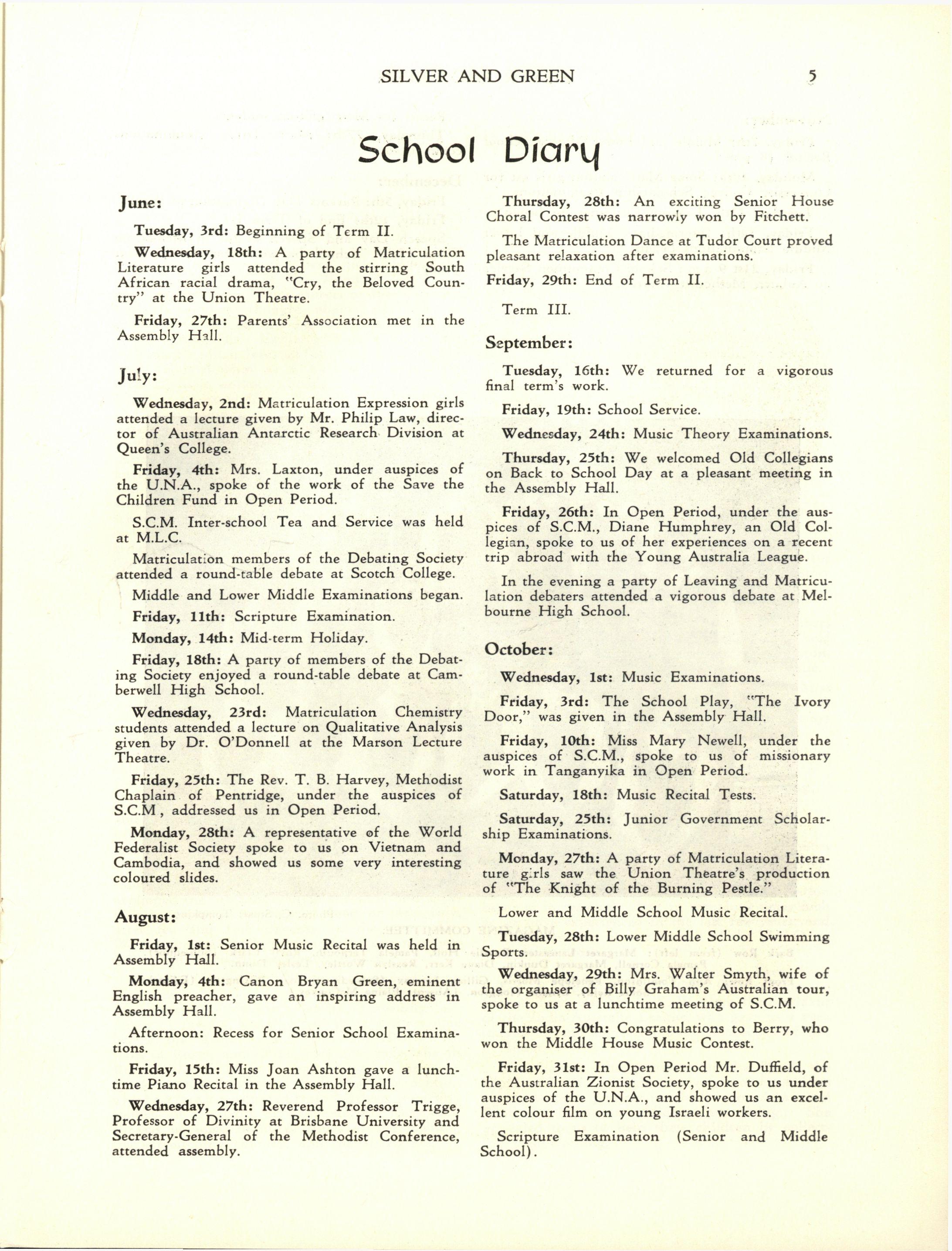
Friday, 10th: Miss Mary Newell, under the auspices of S.C.M., spoke to us of missionary work in Tanganyika in Open Period.
Saturday, 18th: Music Recital Tests.
Saturday, 25th: Junior Government Scholar ship Examinations.
Monday, 27th: A party of Matriculation Litera ture g'rls saw the Union Theatre's production of "The Knight of the Burning Pestle."
Lower and Middle School Music Recital.
Tuesday, 28th: Lower Middle School Swimming Sports.
Wednesday, 29th: Mrs. Walter Smyth, wife of the organiser of Billy Graham's Australian tour, spoke to us at a lunchtime meeting of S.C.M
Thursday, 30th: Congratulations to Berry, who won the Middle House Music Contest.
Friday, 31st: In Open Period Mr. Duffield, of the Australian Zionist Society, spoke to us under auspices of the U.N.A., and showed us an excel lent colour film on young Israeli workers.
Scripture Examination (Senior and Middle School).
Friday, 7th: Middle and Lower Middle School Recital (8 p.m.).
Monday, 10th: Some Matriculation girls sat for University College Scholarship Examinations
Tuesday, 11th: Leaving Examinations began.
Friday, 14th: Intermediate, Middle and Lower Middle Examinations began.
Friday, 21st 9 a.m.: School Communion Service at Auburn Methodist Church
Recess for Matriculation students. Thursday, 27th: Matriculation Examinations commenced.
December:
Friday, 5th: Parents' Day (Exhibition of Work).
Friday, 12th: End of Term III Speech Day and Speech Night in Melbourne Town Hall. "School be with them, keep them steady."
—JP .
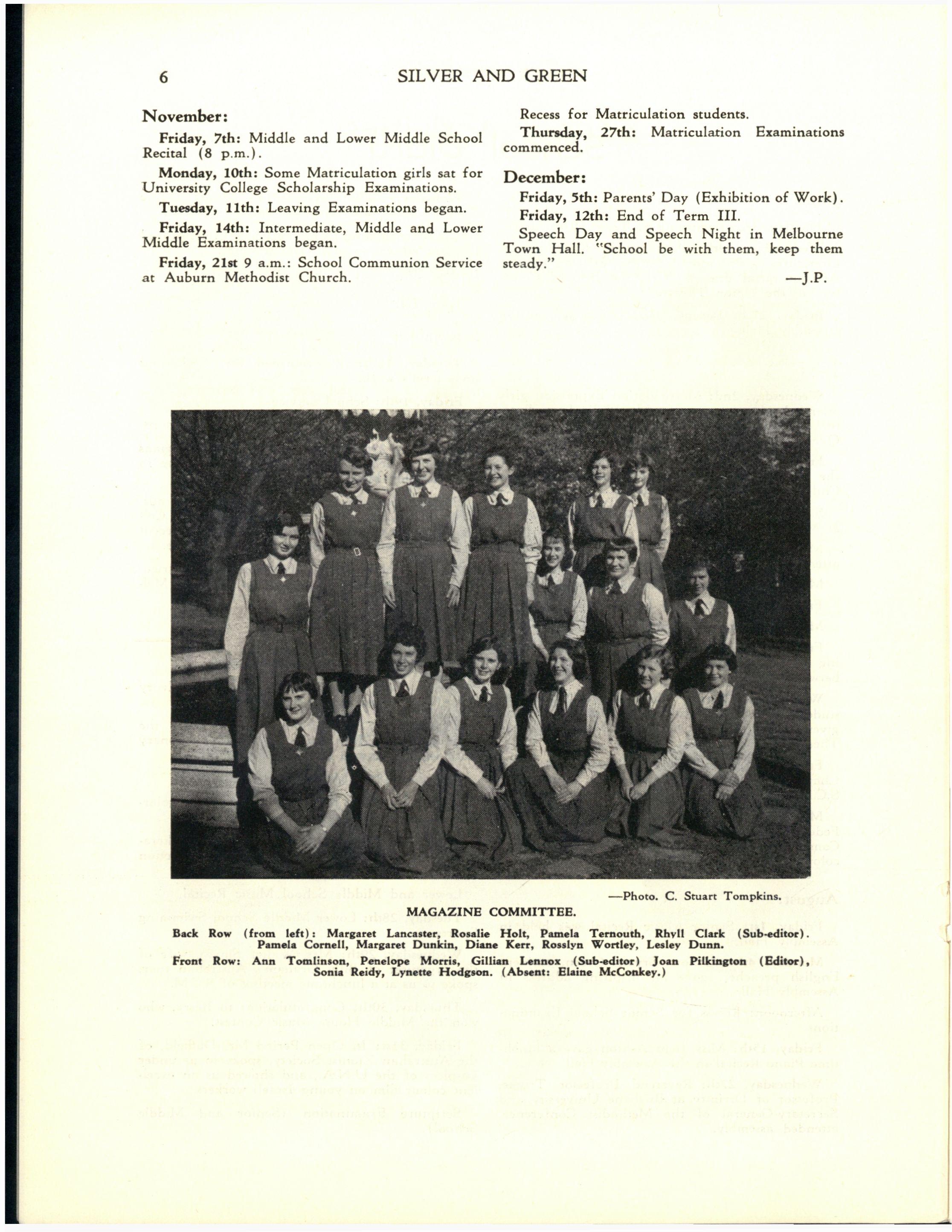
"And this is life eternal, that they might know Thee, the only true God, and Jesus Christ, whom Thou hast sent."
Devotional has again been held under the inspiring leadership of Dr Wood, to whom we are very grateful Many aspects of the Christian faith have been thought about, especially in reference to the present day world situation and Middle East crisis. Earlier, the main theme was the example which Jesus set for each one of us, and which showed Him as a teacher, as a philan thropist, as a worker, worshipping among hypo crites, as an example in the home and home life, and when misunderstood by His brothers. These were very helpful to all present. Another theme which has been developed is Prayer, and its vital importance in every person's life. Some parables have been discussed, including the two on prayer, and also some humble ways in which we, as schoolgirls, can be willing to serve God. Sunday school teaching, for both country and city girls, is one particular way in which this is possible. Evangelism has been stressed, and sharing our Christianity with other people. This was especially helpful with Dr. Graham's campaign in mind. We appreciate the time and work which Dr Wood puts into Devotional, and we should like to thank him very sincerely for the spiritual help given to us.
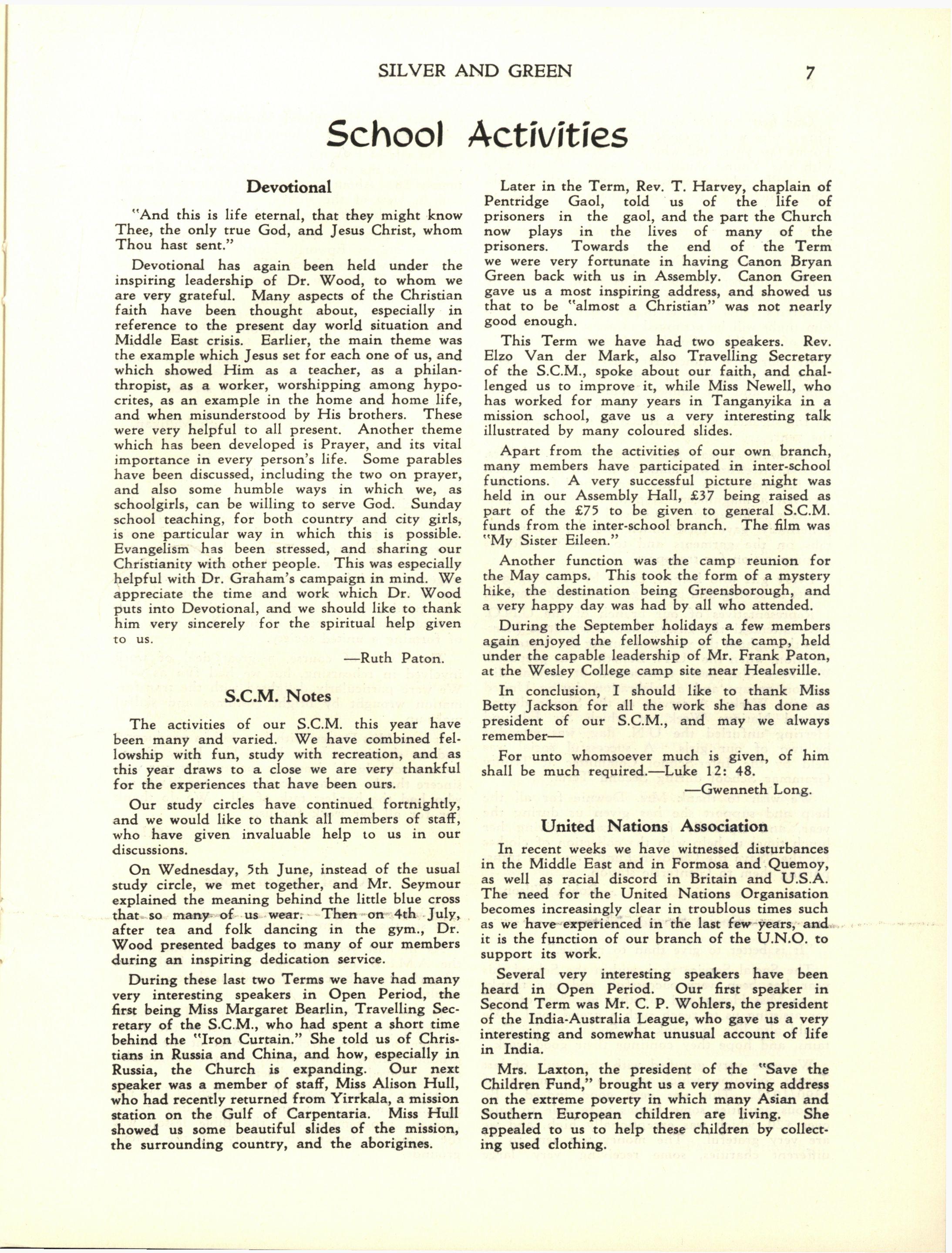 —Ruth Paton
—Ruth Paton
Later in the Term, Rev T Harvey, chaplain of Pentridge Gaol, told us of the life of prisoners in the gaol, and the part the Church now plays in the lives of many of the prisoners. Towards the end of the Term we were very fortunate in having Canon Bryan Green back with us in Assembly Canon Green gave us a most inspiring address, and showed us that to be "almost a Christian" was not nearly good enough.
This Term we have had two speakers. Rev. Elzo Van der Mark, also Travelling Secretary of the S.C.M., spoke about our faith, and chal lenged us to improve it, while Miss Newell, who has worked for many years in Tanganyika in a mission school, gave us a very interesting talk illustrated by many coloured slides.
Apart from the activities of our own branch, many members have participated in inter-school functions. A very successful picture night was held in our Assembly Hall, £37 being raised as part of the £75 to be given to general S.C.M. funds from the inter-school branch. The film was "My Sister Eileen."
Another function was the camp reunion for the May camps. This took the form of a mystery hike, the destination being Greensborough, and a very happy day was had by all who attended.
During the September holidays a few members again enjoyed the fellowship of the camp, held under the capable leadership of Mr. Frank Paton, at the Wesley College camp site near Healesville.
The activities of our S.C.M this year have been many and varied We have combined fel lowship with fun, study with recreation, and as this year draws to a close we are very thankful for the experiences that have been ours.
Our study circles have continued fortnightly, and we would like to thank all members of staff, who have given invaluable help to us in our discussions.
On Wednesday, 5th June, instead of the usual study circle, we met together, and Mr Seymour explained the meaning behind the little blue cross that so many of us wear. Then on 4th July, after tea and folk dancing in the gym., Dr. Wood presented badges to many of our members during an inspiring dedication service
During these last two Terms we have had many very interesting speakers in Open Period, the first being Miss Margaret Bearlin, Travelling Sec retary of the S.C.M., who had spent a short time behind the "Iron Curtain." She told us of Chris tians in Russia and China, and how, especially in Russia, the Church is expanding. Our next speaker was a member of staff, Miss Alison Hull, who had recently returned from Yirrkala, a mission station on the Gulf of Carpentaria Miss Hull showed us some beautiful slides of the mission, the surrounding country, and the aborigines.
In conclusion, I should like to thank Miss Betty Jackson for all the work she has done as president of our S.C.M., and may we always remember—
For unto whomsoever much is given, of him shall be much required.—Luke 12: 48.
—Gwenneth Long.
In recent weeks we have witnessed disturbances in the Middle East and in Formosa and Quemoy, as well as racial discord in Britain and U.S.A. The need for the United Nations Organisation becomes increasingly clear in troublous times such as we have experienced in the last few years, and it is the function of our branch of the U.N.O to support its work.
Several very interesting speakers have been heard in Open Period. Our first speaker in Second Term was Mr. C. P. Wohlers, the president of the India-Australia League, who gave us a very interesting and somewhat unusual account of life in India.
Mrs Laxton, the president of the "Save the Children Fund," brought us a very moving address on the extreme poverty in which many Asian and Southern European children are living. She appealed to us to help these children by collect ing used clothing.
Our first speaker this Term was Diane Hum phrey, who was a member of one of our Leaving Forms last year, and who has since been overseas with the Young Australia League. Diane gave us a full and interesting account of the Y.A.L. tour, which was very comprehensive indeed, in the countries and places which it visited
At one of our fortnightly lunch-time meetings we were interested to hear Miss Leya speak of her native country, Switzerland
Mrs. Kathleen Sloane told us of the work being done by the "Women of the University Fund" for children's relief. It is hoped that next year a film night will be arranged to assist in the educa tion of a child in Southern Greece.
At our first lunch-tme meeting this Term Gwenneth Long told us about the school tour to Canberra and the Snowy Mountains during the September vacation. We wish to thank her and all the speakers who interested us so much during the year.
Following appeals from Mrs. Laxton and Mrs. Sloane, an effort was made to help those children less fortunate than we are. An appeal for clothes received a magnificent response—over 1000 gar ments were brought. For several weeks many girls generously gave their lunch times to help sew tabs on the garments and to pack the clothes in preparation for transport
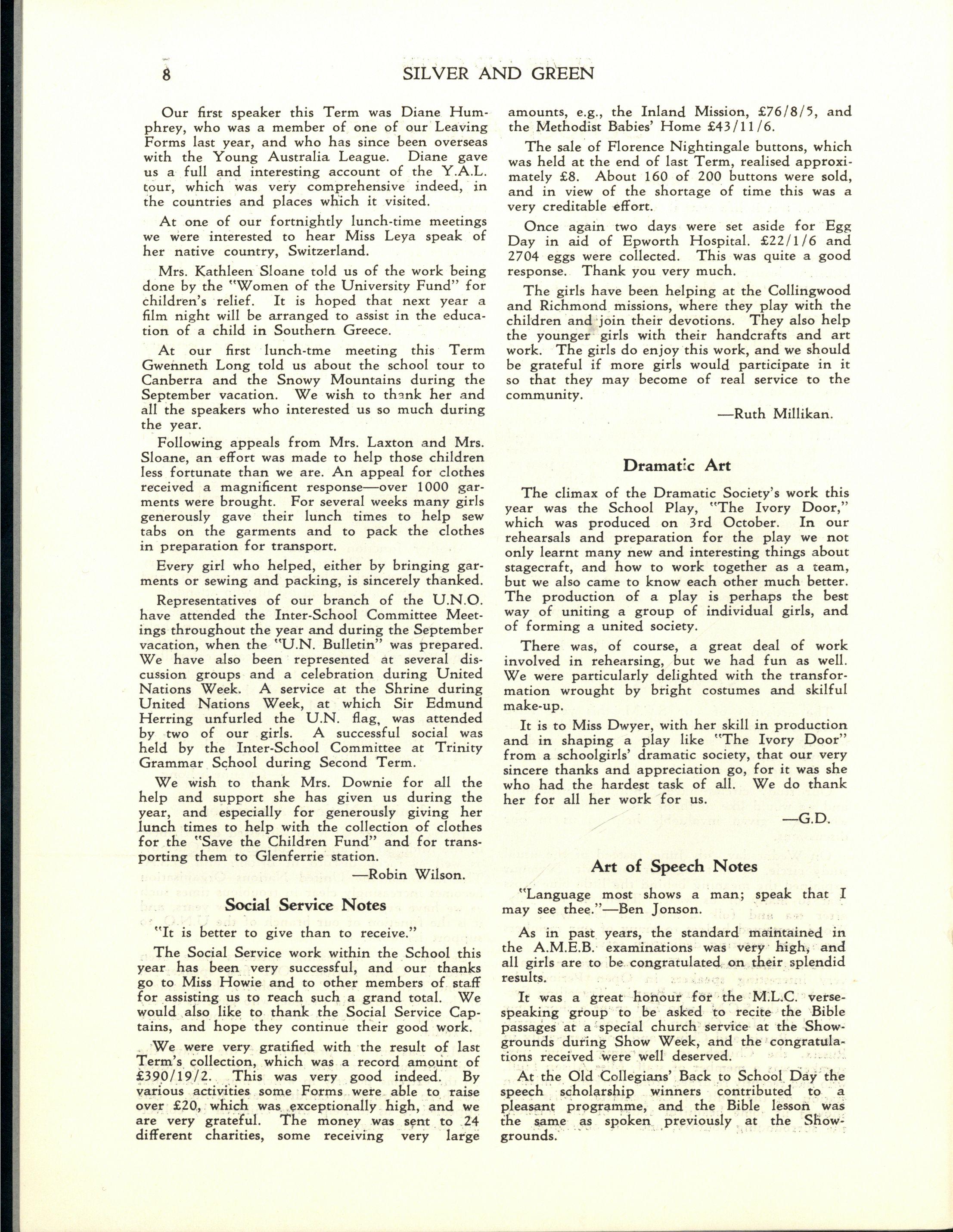
Every girl who helped, either by bringing gar ments or sewing and packing, is sincerely thanked
Representatives of our branch of the U.N.O have attended the Inter-School Committee Meet ings throughout the year and during the September vacation, when the "U.N. Bulletin" was prepared. We have also been represented at several dis cussion groups and a celebration during United Nations Week. A service at the Shrine during United Nations Week, at which Sir Edmund Herring unfurled the U.N flag, was attended by two of our girls A successful social was held by the Inter-School Committee at Trinity Grammar School during Second Term.
We wish to thank Mrs Downie for ail the help and support she has given us during the year, and especially for generously giving her lunch times to help with the collection of clothes for the "Save the Children Fund" and for trans porting them to Glenferrie station.
—Robin Wilson."It is better to give than to receive."
The Social Service work within the School this year has been very successful, and our thanks go to Miss Howie and to other members of staff for assisting us to reach such a grand total. We would also like to thank the Social Service Cap tains, and hope they continue their good work
We were very gratified with the result of last Term's collection, which was a record amount of £390/19/2. This was very good indeed. By various activities some Forms were able to raise over £20, which was exceptionally high, and we are very grateful. The money was sent to 24 different charities, some receiving very large
amounts, e.g., the Inland Mission, £76/8/5, and the Methodist Babies' Home £43/11/6.
The sale of Florence Nightingale buttons, which was held at the end of last Term, realised approxi mately £8. About 160 of 200 buttons were sold, and in view of the shortage of time this was a very creditable effort.
Once again two days were set aside for Egg Day in aid of Epworth Hospital. £22/1/6 and 2704 eggs were collected. This was quite a good response Thank you very much
The girls have been helping at the Collingwood and Richmond missions, where they play with the children and join their devotions. They also help the younger girls with their handcrafts and art work The girls do enjoy this work, and we should be grateful if more girls would participate in it so that they may become of real service to the community.
—Ruth Millikan.The climax of the Dramatic Society's work this year was the School Play, "The Ivory Door," which was produced on 3rd October. In our rehearsals and preparation for the play we not only learnt many new and interesting things about stagecraft, and how to work together as a team, but we also came to know each other much better. The production of a play is perhaps the best way of uniting a group of individual girls, and of forming a united society
There was, of course, a great deal of work involved in rehearsing, but we had fun as well We were particularly delighted with the transfor mation wrought by bright costumes and skilful make-up.
It is to Miss Dwyer, with her skill in production and in shaping a play like "The Ivory Door" from a schoolgirls' dramatic society, that our very sincere thanks and appreciation go, for it was she who had the hardest task of all We do thank her for all her work for us.
—G.D"Language most shows a man; speak that I may see thee."—Ben Jonson.
As in past years, the standard maintained in the A.M.E.B. examinations was very high, and all girls are to be congratulated on their splendid results.
It was a great honour for the Ml.C verse speaking group to be asked to recite the Bible passages at a special church service at the Show grounds during Show Week, and the congratula tions received were well deserved.
At the Old Collegians' Back to School Day the speech scholarship winners contributed to a pleasant programme, and the Bible lesson was the same as spoken previously at the Show grounds
The School would like to thank Miss Dwyer and the Speech Staff very sincerely for the help and guidance they have untiringly given through out the year Especially would we like to wish Miss Dwyer a wonderful trip to England next year. It is hard to imagine how the School will manage without her, but we shall all be looking forward to her return to M.L.C.
—M.L.
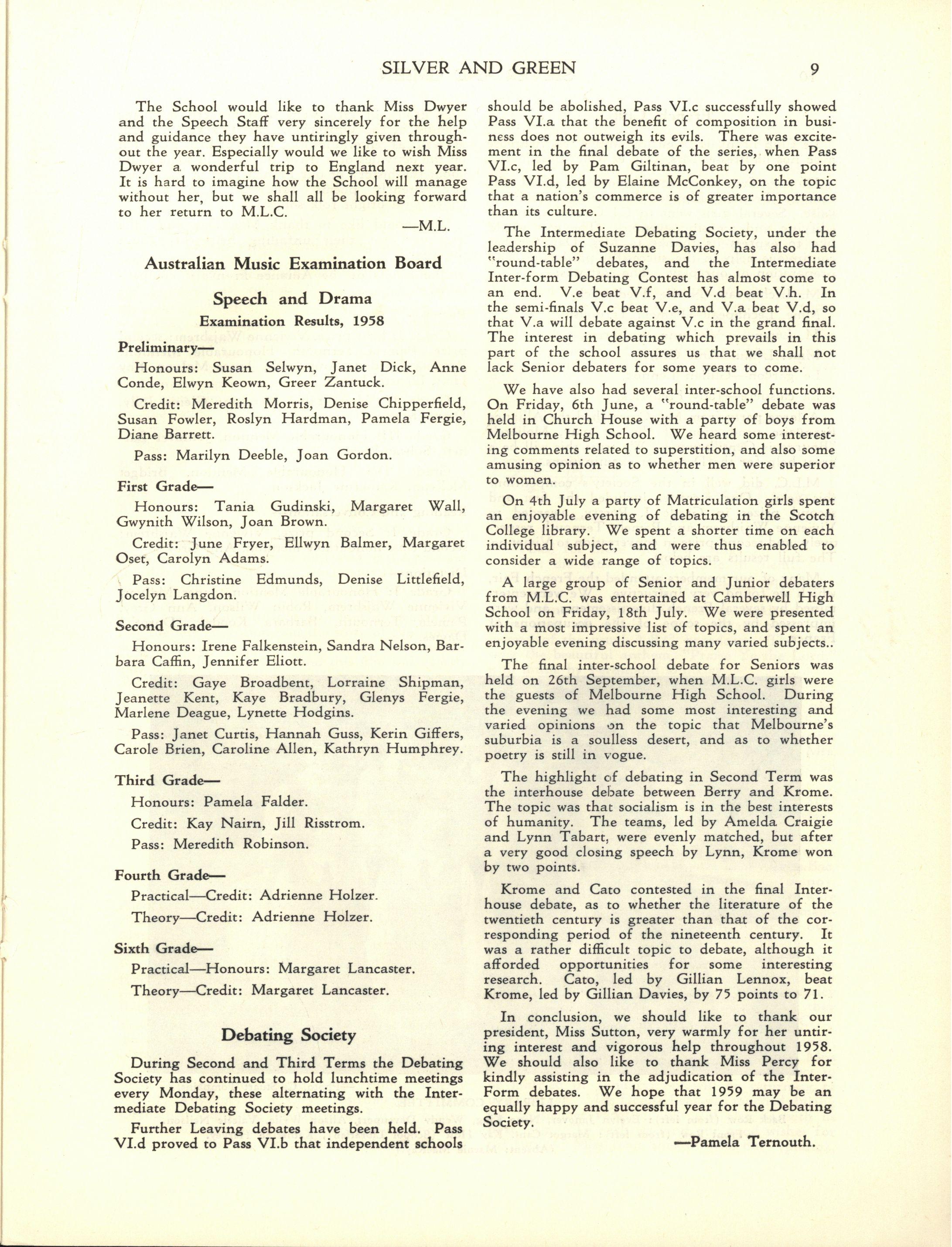
Honours: Susan Selwyn, Janet Dick, Anne Conde, Elwyn Keown, Greer Zantuck
Credit: Meredith Morris, Denise Chipperfield, Susan Fowler, Roslyn Hardman, Pamela Fergie, Diane Barrett.
Pass: Marilyn Deeble, Joan Gordon
First Grade—
Honours: Tania Gudinski, Margaret Wall, Gwynith Wilson, Joan Brown.
Credit: June Fryer, Ellwyn Balmer, Margaret Oset, Carolyn Adams.
Pass: Christine Edmunds, Denise Littlefield, Jocelyn Langdon.
Second Grade—
Honours: Irene Falkenstein, Sandra Nelson, Bar bara Caffin, Jennifer Eliott
Credit: Gaye Broadbent, Lorraine Shipman, Jeanette Kent, Kaye Bradbury, Glenys Fergie, Marlene Deague, Lynette Hodgins
Pass: Janet Curtis, Hannah Guss, Kerin Giffers, Carole Brien, Caroline Allen, Kathryn Humphrey.
Third Grade—
Honours: Pamela Falder.
Credit: Kay Nairn, Jill Risstrom. Pass: Meredith Robinson
Fourth Grade—
Practical—Credit: Adrienne Holzer
Theory—Credit: Adrienne Holzer.
Sixth Grade—
Practical—Honours: Margaret Lancaster.
Theory—Credit: Margaret Lancaster.
During Second and Third Terms the Debating Society has continued to hold lunchtime meetings every Monday, these alternating with the Inter mediate Debating Society meetings.
Further Leaving debates have been held. Pass VI.d proved to Pass VI.b that independent schools
should be abolished, Pass VI.c successfully showed Pass VI.a that the benefit of composition in busi ness does not outweigh its evils. There was excite ment in the final debate of the series, when Pass VI.c, led by Pam Giltinan, beat by one point Pass VI.d, led by Elaine McConkey, on the topic that a nation's commerce is of greater importance than its culture
The Intermediate Debating Society, under the leadership of Suzanne Davies, has also had "round-table" debates, and the Intermediate Inter-form Debating Contest has almost come to an end V.e beat V.f, and V.d beat V.h In the semi-finals V.c beat V.e, and V.a beat V.d, so that V.a will debate against V.c in the grand final. The interest in debating which prevails in this part of the school assures us that we shall not lack Senior debaters for some years to come.
We have also had several inter-school functions. On Friday, 6th June, a "round-table" debate was held in Church House with a party of boys from Melbourne High School. We beard some interest ing comments related to superstition, and also some amusing opinion as to whether men were superior to women
On 4th July a party of Matriculation girls spent an enjoyable evening of debating in the Scotch College library. We spent a shorter time on each individual subject, and were thus enabled to consider a wide range of topics.
A large group of Senior and Junior debaters from M.L.C. was entertained at Camberwell High School on Friday, 18th July We were presented with a most impressive list of topics, and spent an enjoyable evening discussing many varied subjects.
The final inter-school debate for Seniors was held on 26th September, when M.L.C. girls were the guests of Melbourne High School. During the evening we had some most interesting and varied opinions on the topic that Melbourne's suburbia is a soulless desert, and as to whether poetry is still in vogue
The highlight of debating in Second Term was the interhouse debate between Berry and Krome. The topic was that socialism is in the best interests of humanity. The teams, led by Amelda Craigie and Lynn Tabart, were evenly matched, but after a very good closing speech by Lynn, Krome won by two points
Krome and Cato contested in the final Inter bouse debate, as to whether the literature of the twentieth century is greater than that of the cor responding period of the nineteenth century. It was a rather difficult topic to debate, although it afforded opportunities for some interesting research. Cato, led by Gillian Lennox, beat Krome, led by Gillian Davies, by 75 points to 71
In conclusion, we should like to thank our president, Miss Sutton, very warmly for her untir ing interest and vigorous help throughout 1958. We should also like to thank Miss Percy for kindly assisting in the adjudication of the Inter Form debates. We hope that 1959 may be an equally happy and successful year for the Debating Society.
—Pamela Ternouth.
Le Club FranQais a eu une annee tres heureuse avec nos maltresses Mrs. Day et Mile. Bracquart.
During first term some members acted the comedy "Franches Lippees" for the Alliance Fran Saise Several girls went to C.L.C and spent an edifying and amusing evening. The cast would like to express its thanks to Mrs. Day for her continuous help in the successful production and preparation of our play. The cast was:
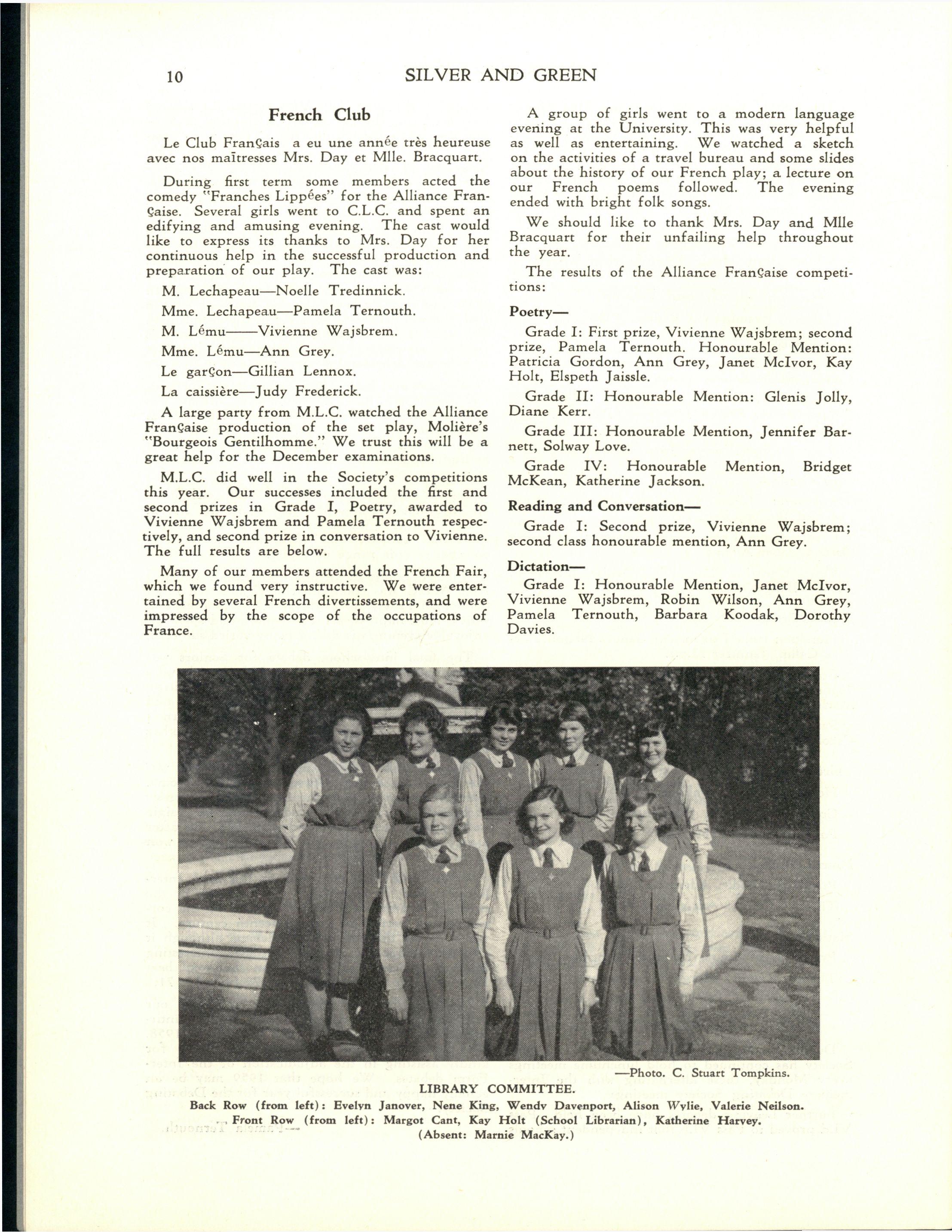
M. Lechapeau—Noelle Tredinnick.
Mme. Lechapeau—Pamela Ternouth.
M Lemu —Vivienne Wajsbrem
Mme L^mu—Ann Grey
Le garCon—Gillian Lennox.
La caissiere—Judy Frederick.
A large party from M.L.C. watched the Alliance FranQaise production of the set play, Moliere's "Bourgeois Gentilhomme." We trust this will be a great help for the December examinations
M.L.C. did well in the Society's competitions this year. Our successes included the first and second prizes in Grade I, Poetry, awarded to Vivienne Wajsbrem and Pamela Ternouth respec tively, and second prize in conversation to Vivienne The full results are below.
Many of our members attended the French Fair, which we found very instructive. We were enter tained by several French divertissements, and were impressed by the scope of the occupations of France
A group of girls went to a modern language evening at the University. This was very helpful as well as entertaining. We watched a sketch on the activities of a travel bureau and some slides about the history of our French play; a lecture on our French poems followed The evening ended with bright folk songs
We should like to thank Mrs. Day and Mile Bracquart for their unfailing help throughout the year
The results of the Alliance FranQaise competi tions:
Poetry—
Grade I: First prize, Vivienne Wajsbrem; second prize, Pamela Ternouth. Honourable Mention: Patricia Gordon, Ann Grey, Janet Mclvor, Kay Holt, Elspeth Jaissle.
Grade II: Honourable Mention: Glenis Jolly, Diane Kerr.
Grade III: Honourable Mention, Jennifer Bar nett, Solway Love.
Grade IV: Honourable Mention, Bridget McKean, Katherine Jackson
Reading and Conversation—
Grade I: Second prize, Vivienne Wajsbrem; second class honourable mention, Ann Grey.
Dictation—
Grade I: Honourable Mention, Janet Mclvor, Vivienne Wajsbrem, Robin Wilson, Ann Grey, Pamela Ternouth, Barbara Koodak, Dorothy Davies
Grade II: Second prize, Elaine McConkey Honourable Mention: Glenis Jolly.
Grade III: Second Class Honourable Mention, Solway Love.
—v.w —A.G. —D.D.
In the latter part of the year we have dealt with the practical as well as the theoretical side of film appreciation.
Taking advantage of the few favourable days this Term, and having been instructed by Mr. Seymour on the use of the Paillex Bollard 16 mm. movie camera and other filming equipment and on the operation of a projector, some of us have been filming scenes around the school such as the staff leaving the Hall after morning Assembly
The school is most fortunate in having a modern projection room in the Assembly Hall, with a De Brie 16 mm arc projector The lunch-time films for the whole school, as well as full-length films for film appreciation, are shown from here.
Two full-length films shown were "Earth Versus Flying Saucers" and "The Jolson Story." The former, which excited and appealed to the younger members of the audience, was about the invasion of earth by men in flying saucers from another planet in outer space. "The Jolson Story," starring Larry Parks, who incidentally looked remarkably like the late A1 Jolson, was the story of the famous singer from the time of his stage debut to the end of his first marriage, and this film was greatly enjoyed by all
Two shorter films were "Metropolis," an older film, and "The Clue of the Missing Ape," which was the story of some children living at Gibraltar who foiled an attempt by the British to destroy all the apes living in that area.
We are most grateful to Mr. Seymour for all the time he has put into the course this year, making it so interesting and enjoyable
—Diana Bartak.
Clue of the Missing Ape; Work of the Kidneys; Alcohol and the Human Body; Life in an Aqua rium; It's the Brain that Counts; Une Famille Martin; Nervous System; Desperate Heart; First Steps; Jungle Book; Marriage of Figaro; Solar Family; German Language, Part I; Magic of Electricity; Magnetic Effects of Electricity; Metro polis; It Comes from Coal; Images Medievales; Energy and its Transformations; Brown Coal to Kilowatts; Brown Coal to Briquettes; Heredity; The Rocket; The Colour of Life; Birth of a Nation; Hydro-electric Power; Electrons; Flowers at Work; Digestion; Manufacture of Gas; Story of a Violin; The Sound Man; Public Enemy No. 1; Rhythm of a City; Instruments of the Orchestra; Exploring the Universe; Farmer Fisher men of Norway; Schubert and his Music; Angotee: Story of an Eskimo Boy; Plants and Light; John
Wesley; Earth v. Flying Saucers; Light; Nature of Light; Science in the Orchestra; Barber of Seville; Grieg's Peer Gynt Suite; Introduction to Sound; Body Defence Against Disease; Let's See; Marvels in Miniature; Hobart Town; Mother Goose Rhymes; Cadet Rouselle; Colour; Dough and Dynamite; The Champion; One Little Indian; Born to Boats; Basket-ball Fundamentals; The Jolson Story; Road to Canterbury; Music and Architecture Through the Ages; Fundamentals of Diet; Coronation Day; Percussion Group; Sibelius; Critic and the Film No. 1; Animated Cartoons; The Caine Mutiny; Laughing Gas; No Indians, Please; A Charles Dickens Christmas; Learning and Living Together; The Painted Men; Queen of the Border; Beethoven and Boogie; The Medieval Manor; Moneta Romana; The Opening of Canberra; A Queen Who Returned; The Silent World.
i i Y
i e *
"Alas! for those who never sing, But die with all their music in them!"
—Oliver Wendell HolmesThe Annual Church Service was held on 11th May, part of which was broadcast over 3DB instead of the usual A.B.C. broadcast. The choir sang the beautiful anthem, "Praise Ye the Lord," with music by Ferdinand Dunkley.
On 15 th May a Lunch-hour Recital was pre sented in the New Assembly Hall The pro gramme was given by the Middle School Choir, conducted by Miss Betty Scarlett; the Senior Madrigals and Pamela Giltinan (piano), with Mrs. Ron Farren Price playing the orchestral part on the second piano.
The Madrigal Singers were broadcast over 3LO in the Young Australia programme on 19th May.
There were several unavoidable staff changes at the beginning of Term II. Miss Betty Chisholm, Mus.Bac. (piano); Miss Margaret Leahy, Mus.Bac. (piano), Miss Pauline Goldie, Mus.Dip. (piano), and Miss Beth Doery, Mus.Dip (piano) were unable to return to us We thank all these mem bers of staff for all they have done for us over the years, and we wish them well.
Recently we have welcomed to our staff Miss Violet Vernon, Mus.Dip (piano); Miss Judith Carnegie, Mus.Bac. (piano), and Miss Beverley Shepherd, Mus.Dip. (piano). We hope they enjoy being part of our Music School at M.L.C.
We expect to lose Miss Doris Slatter (piano), who is to be married at the end of the year Miss Betty Scarlett and Miss Pat Elliot both expect to be married in January, but will be returning to us next year. Miss Denise Lear was married during the September vacation, but will also be with us next term. To each we send our good wishes for the future. Miss Joan Shewan, Mus.Bac. (piano),
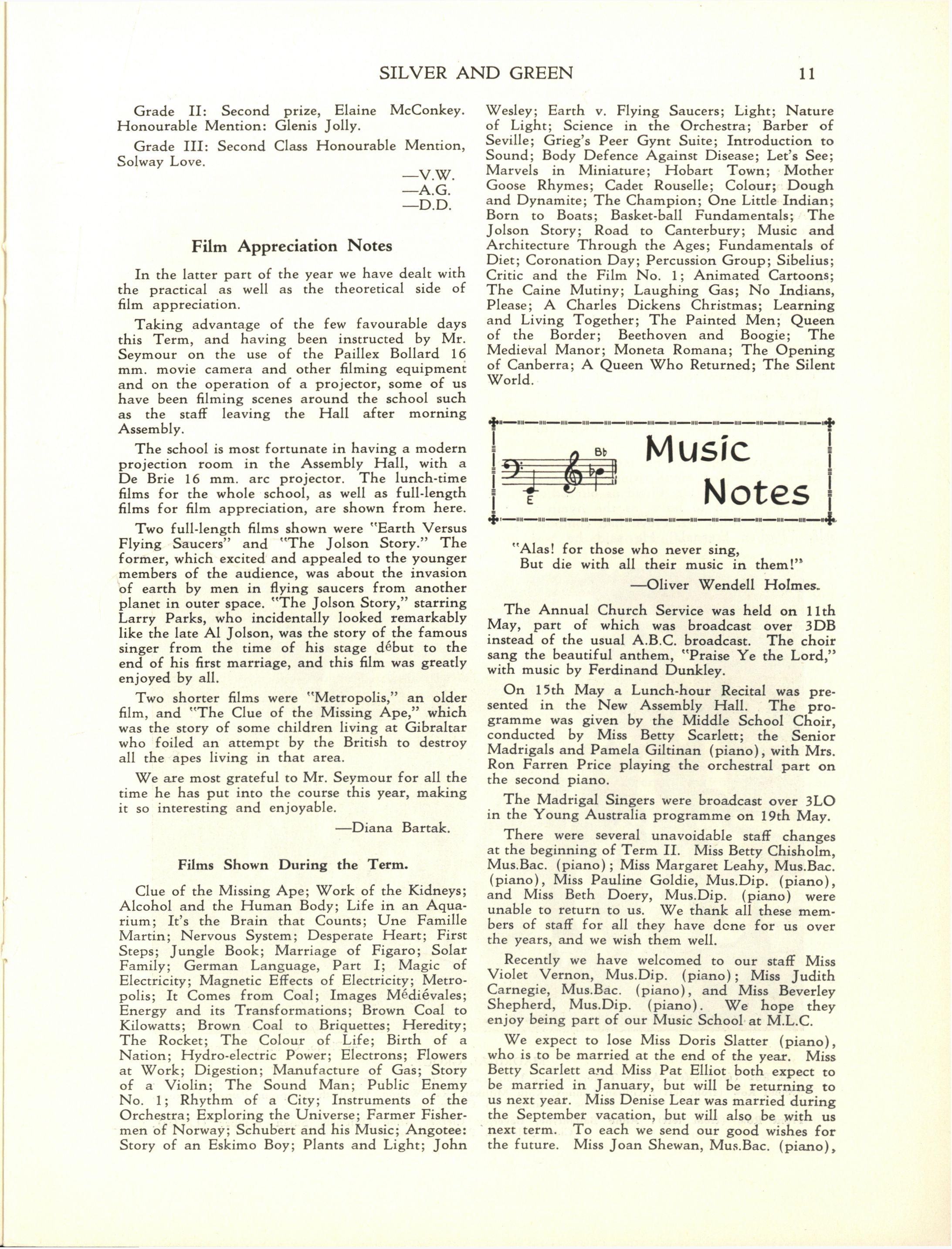
has been given leave of absence to visit England next year; Miss Louise Piper ('cello)) expects to be engaged in A.B.C. work, and Miss Ivy White, Mus.Dip (piano) will not be able to return next year.
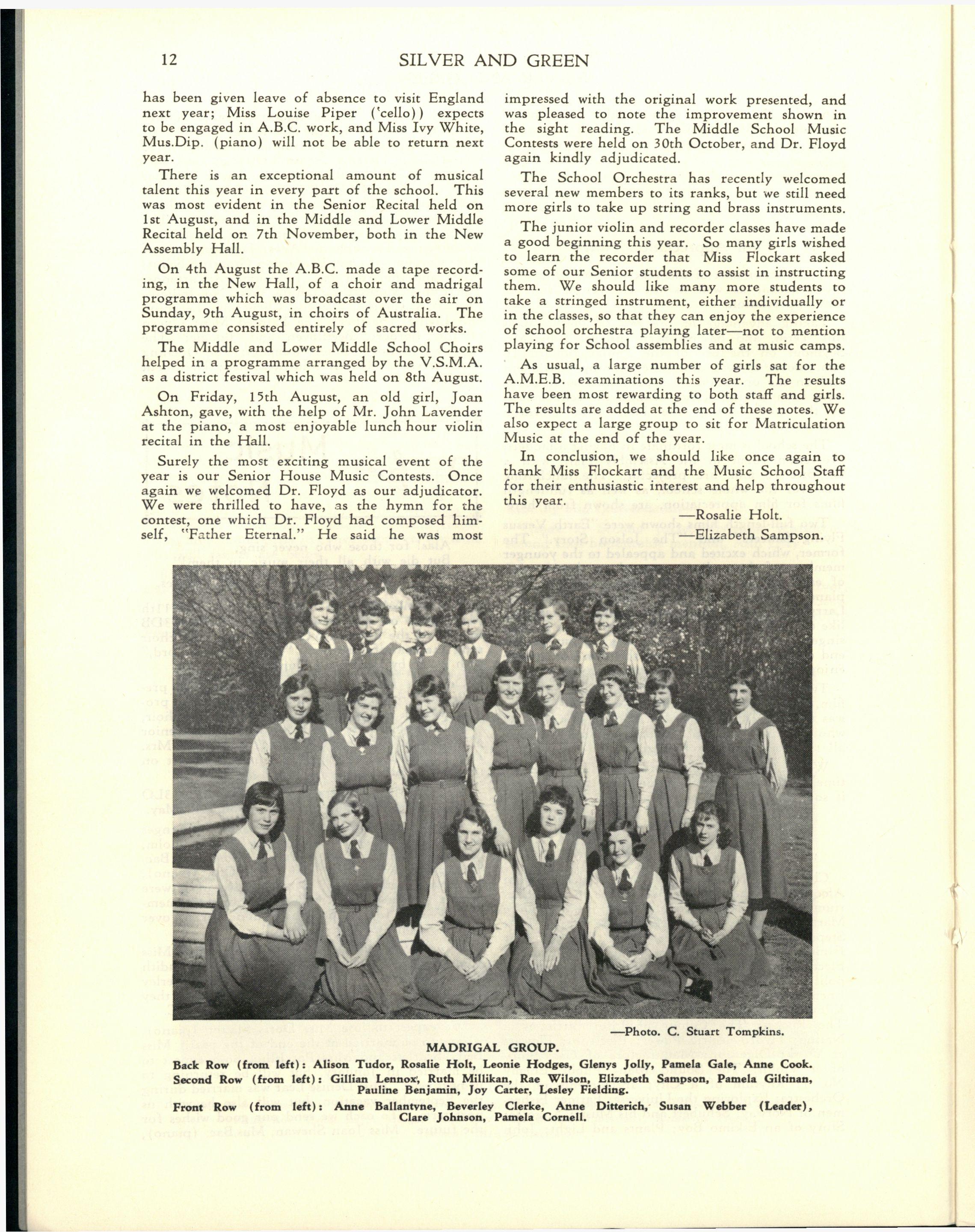
There is an exceptional amount of musical talent this year in every part of the school. This was most evident in the Senior Recital held on 1st August, and in the Middle and Lower Middle Recital held on 7th November, both in the New Assembly Hall.
On 4th August the A.B.C. made a tape record ing, in the New Hall, of a choir and madrigal programme which was broadcast over the air on Sunday, 9th August, in choirs of Australia The programme consisted entirely of sacred works.
The Middle and Lower Middle School Choirs helped in a programme arranged by the V.S.M.A as a district festival which was held on 8th August
On Friday, 15th August, an old girl, Joan Ashton, gave, with the help of Mr John Lavender at the piano, a most enjoyable lunch hour violin recital in the Hall.
Surely the most exciting musical event of the year is our Senior House Music Contests Once again we welcomed Dr Floyd as our adjudicator We were thrilled to have, as the hymn for the contest, one which Dr. Floyd had composed him self, "Father Eternal." He said he was most
impressed with the original work presented, and was pleased to note the improvement shown in the sight reading. The Middle School Music Contests were held on 30th October, and Dr Floyd again kindly adjudicated
The School Orchestra has recently welcomed several new members to its ranks, but we still need more girls to take up string and brass instruments
The junior violin and recorder classes have made a good beginning this year. So many girls wished to learn the recorder that Miss Flockart asked some of our Senior students to assist in instructing them. We should like many more students to take a stringed instrument, either individually or in the classes, so that they can enjoy the experience of school orchestra playing later—not to mention playing for School assemblies and at music camps
As usual, a large number of girls sat for the A.M.E.B examinations this year The results have been most rewarding to both staff and girls. The results are added at the end of these notes. We also expect a large group to sit for Matriculation Music at the end of the year.
In conclusion, we should like once again to thank Miss Flockart and the Music School Staff for their enthusiastic interest and help throughout this year
—Rosalie Holt. —Elizabeth Sampson.
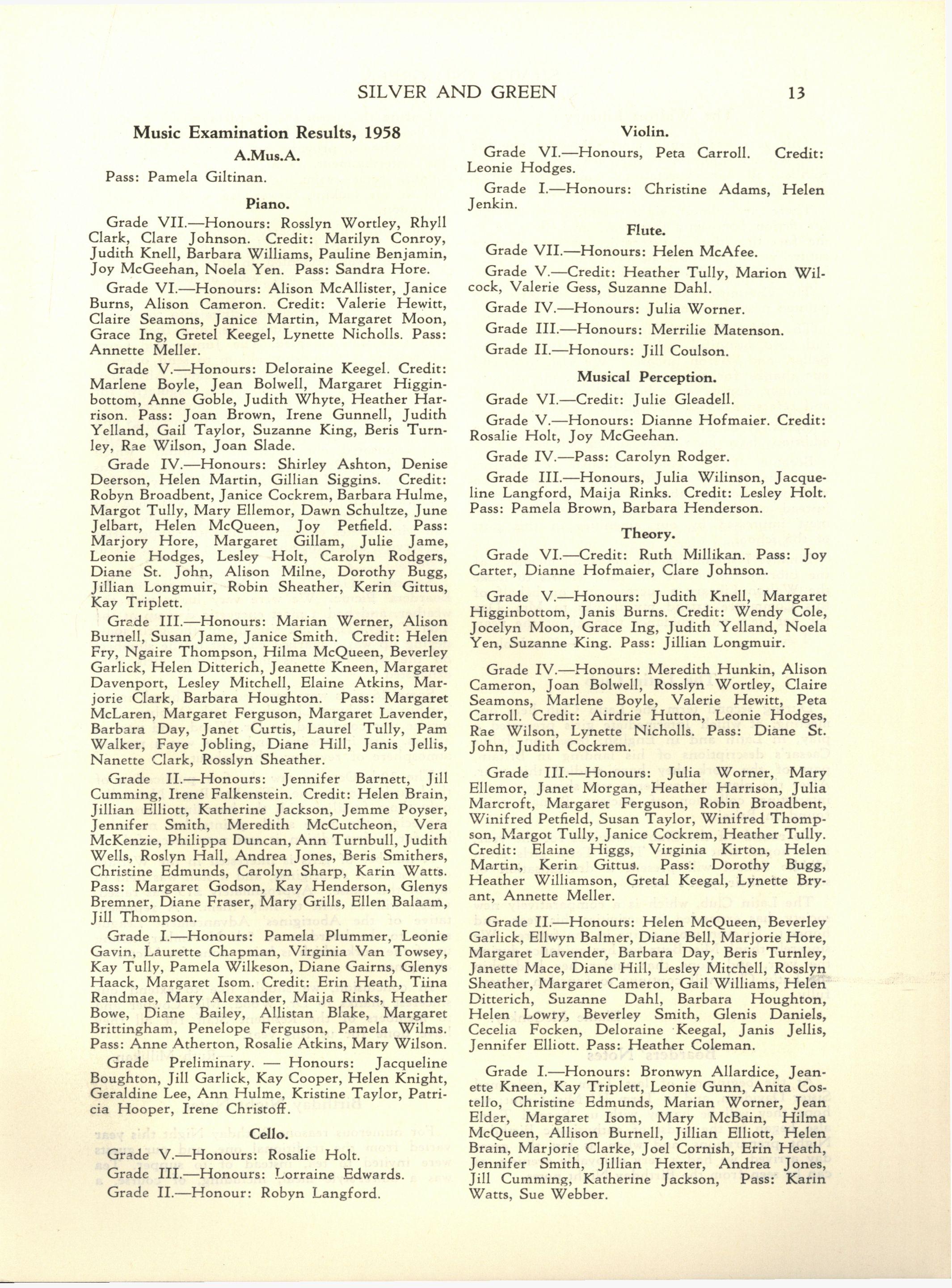
A.Mus.A.
Pass: Pamela Giltinan.
Piano.
Grade VII.—Honours: Rosslyn Wortley, Rhyll Clark, Clare Johnson. Credit: Marilyn Conroy, Judith Knell, Barbara Williams, Pauline Benjamin, Joy McGeehan, Noela Yen. Pass: Sandra Hore.
Grade VI.—Honours: Alison McAllister, Janice Burns, Alison Cameron. Credit: Valerie Hewitt, Claire Seamons, Janice Martin, Margaret Moon, Grace Ing, Gretel Keegel, Lynette Nicholls. Pass: Annette Meller.
Grade V.—Honours: Deloraine Keegel. Credit: Marlene Boyle, Jean Bolwell, Margaret Higgin bottom, Anne Goble, Judith Whyte, Heather Har rison. Pass: Joan Brown, Irene Gunnell, Judith Yelland, Gail Taylor, Suzanne King, Beris Turn ley, Rae Wilson, Joan Slade.
Grade IV.—Honours: Shirley Ashton, Denise Deerson, Helen Martin, Gillian Siggins. Credit: Robyn Broadbent, Janice Cockrem, Barbara Hulme, Margot Tully, Mary Ellemor, Dawn Schultze, June Jelbart, Helen McQueen, Joy Petfield. Pass: Marjory Hore, Margaret Gillam, Julie Jame, Leonie Hodges, Lesley Holt, Carolyn Rodgers, Diane St John, Alison Milne, Dorothy Bugg, Jillian Longmuir, Robin Sheather, Kerin Gittus, Kay Triplett.
Grade III.—Honours: Marian Werner, Alison Burnell, Susan Jame, Janice Smith. Credit: Helen Fry, Ngaire Thompson, Hilma McQueen, Beverley Garlick, Helen Ditterich, Jeanette Kneen, Margaret Davenport, Lesley Mitchell, Elaine Atkins, Mar jorie Clark, Barbara Houghton Pass: Margaret McLaren, Margaret Ferguson, Margaret Lavender, Barbara Day, Janet Curtis, Laurel Tully, Pam Walker, Faye Jobling, Diane Hill, Janis Jellis, Nanette Clark, Rosslyn Sheather.
Grade II.—Honours: Jennifer Barnett, Jill Cumming, Irene Falkenstein Credit: Helen Brain, Jillian Elliott, Katherine Jackson, Jemme Poyser, Jennifer Smith, Meredith McCutcheon, Vera McKenzie, Philippa Duncan, Ann Turnbull, Judith Wells, Roslyn Hall, Andrea Jones, Beris Smithers, Christine Edmunds, Carolyn Sharp, Karin Watts Pass: Margaret Godson, Kay Henderson, Glenys Bremner, Diane Fraser, Mary Grills, Ellen Balaam, Jill Thompson.
Grade I.—Honours: Pamela Plummer, Leonie Gavin, Laurette Chapman, Virginia Van Towsey, Kay Tully, Pamela Wilkeson, Diane Gairns, Glenys Haack, Margaret Isom. Credit: Erin Heath, Tiina Randmae, Mary Alexander, Maija Rinks, Heather Bowe, Diane Bailey, Allistan Blake, Margaret Brittingham, Penelope Ferguson, Pamela Wilms Pass: Anne Atherton, Rosalie Atkins, Mary Wilson
Grade Preliminary. — Honours: Jacqueline Boughton, Jill Garlick, Kay Cooper, Helen Knight, Geraldine Lee, Ann Hulme, Kristine Taylor, Patri cia Hooper, Irene Christoff
Grade V.—Honours: Rosalie Holt
Grade III.—Honours: Lorraine Edwards.
Grade II.—Honour: Robyn Langford.
Violin.
Grade VI.—Honours, Peta Carroll. Credit: Leonie Hodges.
Grade I.—Honours: Christine Adams, Helen Jenkin
Flute.
Grade VII.—Honours: Helen McAfee
Grade V.—Credit: Heather Tully, Marion Wil cock, Valerie Gess, Suzanne Dahl. Grade IV.—Honours: Julia Worner.
Grade III.—Honours: Merrilie Matenson. Grade II.—Honours: Jill Coulson
Grade VI.—Credit: Julie Gleadell.
Grade V.—Honours: Dianne Hofmaier. Credit: Rosalie Holt, Joy McGeehan.
Grade IV.—Pass: Carolyn Rodger.
Grade III.—Honours, Julia Wilinson, Jacque line Langford, Maija Rinks Credit: Lesley Holt Pass: Pamela Brown, Barbara Henderson. Theory.
Grade VI.—Credit: Ruth Millikan. Pass: Joy Carter, Dianne Hofmaier, Clare Johnson.
Grade V.—Honours: Judith Knell, Margaret Higginbottom, Janis Burns. Credit: Wendy Cole, Jocelyn Moon, Grace Ing, Judith Yelland, Noela Yen, Suzanne King. Pass: Jillian Longmuir.
Grade IV.—Honours: Meredith Hunkin, Alison Cameron, Joan Bolwell, Rosslyn Wortley, Claire Seamons, Marlene Boyle, Valerie Hewitt, Peta Carroll Credit: Airdrie Hutton, Leonie Hodges, Rae Wilson, Lynette Nicholls. Pass: Diane St. John, Judith Cockrem.
Grade III.—Honours: Julia Worner, Mary Ellemor, Janet Morgan, Heather Harrison, Julia Marcroft, Margaret Ferguson, Robin Broadbent, Winifred Petfield, Susan Taylor, Winifred Thomp son, Margot Tully, Janice Cockrem, Heather Tully. Credit: Elaine Higgs, Virginia Kirton, Helen Martin, Kerin Gittus. Pass: Dorothy Bugg, Heather Williamson, Gretal Keegal, Lynette Bry ant, Annette Meller
Grade II.—Honours: Helen McQueen, Beverley Garlick, Ellwyn Balmer, Diane Bell, Marjorie Hore, Margaret Lavender, Barbara Day, Beris Turnley, Janette Mace, Diane Hill, Lesley Mitchell, Rosslyn Sheather, Margaret Cameron, Gail Williams, Helen Ditterich, Suzanne Dahl, Barbara Houghton, Helen Lowry, Beverley Smith, Glenis Daniels, Cecelia Focken, Deloraine Keegal, Janis Jellis, Jennifer Elliott. Pass: Heather Coleman.
Grade I.—Honours: Bronwyn Allardice, Jean ette Kneen, Kay Triplett, Leonie Gunn, Anita Cos tello, Christine Edmunds, Marian Worner, Jean Elder, Margaret Isom, Mary McBain, Hilma McQueen, Allison Burnell, Jillian Elliott, Helen Brain, Marjorie Clarke, Joel Cornish, Erin Heath, Jennifer Smith, Jillian Hexter, Andrea Jones, Jill Cumming, Katherine Jackson, Pass: Karin Watts, Sue Webber
This year has been a most successful one for the Walton Library. The new building has fulfilled all our expectations, and has given a great deal of pleasure to all borrowers.
There are almost eight hundred enrolments for fiction borrowing this year, and, in spite of the fact that this is a record, I believe that in future years there will be even more. Reference borrowing has also gone well.
The Committee wishes to thank all girls who painted posters for our notice board and displays.
The Old Collegians' Club presented our library with two beautiful volumes of "Baron at the Ballet" and "Baron Encore." We wish to extend our thanks for this generous gift, and also to all other donors who have given both fiction and reference books throughout the year.
Apart from donations, however, many more additions have been made to the shelves.
Because of the greater number of students from the Faculty of Education this year, two visits were paid by them to the Walton Library, instead of the usual one. The students were most impressed by our amenities in this part of the school.
Finally, I should like to thank all members of the Library Committee for their efforts to make the Walton Library a success, and on behalf of this Committee extend my thanks to Mrs. Day for her help and guidance throughout the year —Kay Holt.
During second term the Latin Club held one meeting, at which Intermediate girls presented a play, in Latin and in English, based on Julius Caesar's descriptions of his landing in Britain, part of the work they have studied this year. After the play, the audience was shown a very interesting collection of ancient Roman coins found in Britain
To round off the Club's activities for the year, it is hoped that during Third Term girls from Middle School will present a dramatisation of some of their year's work.
The Latin Club, which is a comparatively new society, has expanded its activities this year, and hopes to be even more active in the future. We sincerely thank Miss Betts for her guidance during the year, and hope that under her leadership the Latin Club will continue to function success fully.
—Elaine McConkeyAt the beginning of last Term we welcomed Sister Davidson, and in Term III Miss Grant: we hope they will be happy with us. Second Term also began in the midst of enthusiastic Birthday Night preparations, and when at last the great day arrived, we had a very enjoyable evening, as can be seen from the Birthday Night notes.
During the Term the boarders' basket-ball and hockey teams have had several matches with other schools, providing them with both sport and entertainment On 8th November we are holding some swimming sports against Ruyton, and we are looking forward to a very successful afternoon.
On 26th July a party of boarders went to the New York Ballet and had a lovely afternoon "Iolanthe" was presented in the Assembly Hall that evening, and was well attended by the boarders.
Last Term we introduced clubs into the curri culum of boarding school life, and these have been very well accepted. The Junior Red Cross are making a friendship album to send overseas to another club, telling them about Australian life. The Dramatic Club meets regularly for play readings, and these are most successful, while the Music Club have frequent meetings and listen to both jazz and classical records. This club sponsored our "Halloween Night," which was held on 22nd August in the gym It was well attended, and the girls enjoyed it very much
Once again the Chapel Service was held at Wesley, and approximately forty girls went. Dr. and Mrs. Coates entertained us with supper after the service, and altogether it was a very successful evening
Saturday, 11th October, was the day of the Boarders' Picnic. We were very lucky with the weather, and had a most energetic day up at the You Yangs. The loud singing of the girls jour neying up was a marked contrast to the slumbers on the way home, as most of the girls were exhausted.
Some 26 girls were received into Church mem bership at Auburn Church on 26th October. The service was conducted by Dr. Wood, and was, as always, very impressive, and there was a marked atmosphere of reverence throughout.
The 30th October saw the first publication of the boarders' magazine, "The Red Rag." Naturally, only those familiar with the boarding house can appreciate the more subtle points, but neverthe less for a first edition it was very successful.
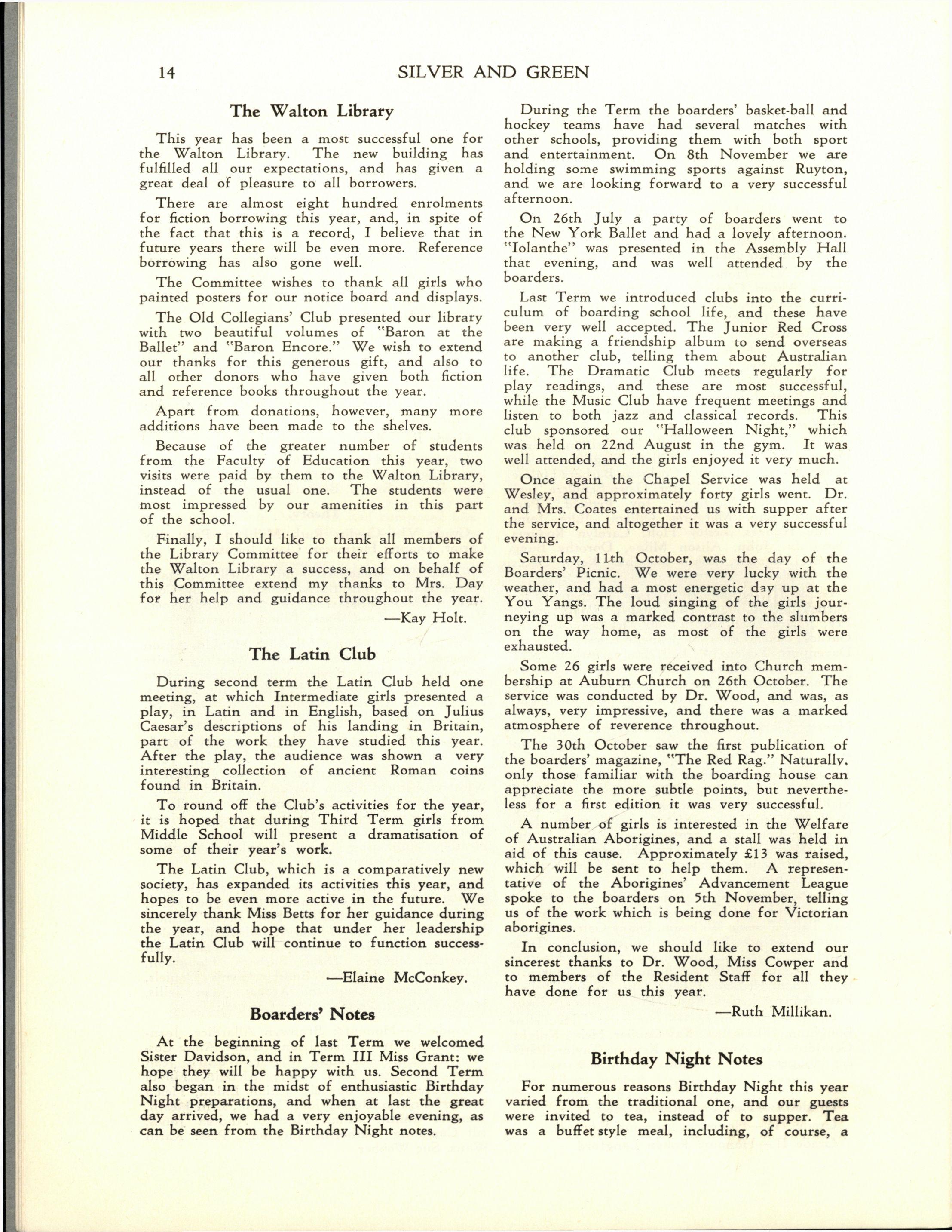
A number of girls is interested in the Welfare of Australian Aborigines, and a stall was held in aid of this cause. Approximately £13 was raised, which will be sent to help them. A represen tative of the Aborigines' Advancement League spoke to the boarders on 5th November, telling us of the work which is being done for Victorian aborigines.
In conclusion, we should like to extend our sincerest thanks to Dr. Wood, Miss Cowper and to members of the Resident Staff for all they have done for us this year.
—Ruth Millikan.
For numerous reasons Birthday Night this year varied from the traditional one, and our guests were invited to tea, instead of to supper. Tea was a buffet style meal, including, of course, a
three-tiered birthday cake, and was eagerly demol ished and greatly appreciated When the food had vanished and the noise risen from a busy hum to a dull roar, Dr. Wood rose to read the telegrams from past boarders. As usual, the signatures were in a form of code more appre ciated by girls than staff
After tea our guests were shown the film "The Flying Eye," while the boarders transformed themselves from beautiful hostesses to anything from Chinamen to ghosts. Soon after the film finished the concert began. Again this differed from former years, in that the items were not presented by the Boarding House wings, but by three groups, namely, the music, dramatic, and junior groups.
The programme opened with a very amusing Chinese comedy, "The Doubtful Misfortune of Le Sing," acted by a section of the dramatic group The next item was an operetta, "The Travelling Musicians," which showed both the acting ability and the musical talent of the juniors. "The Stratford Lad," which followed, was both educational and entertaining, and was enjoyed by all The last item was another operetta, "Shades of Night," which was hilariously funny, and the climax of a most entertaining evening.
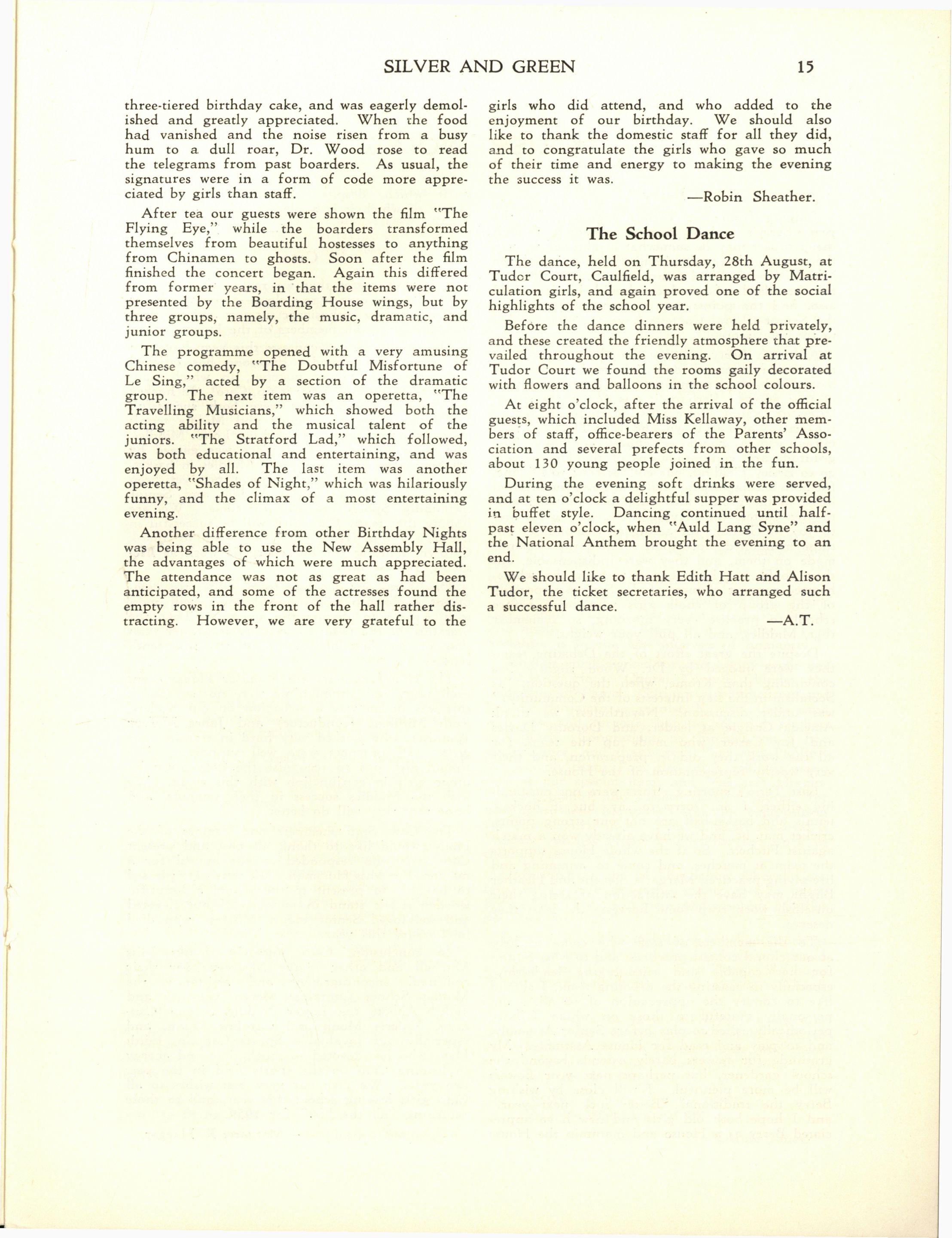
Another difference from other Birthday Nights was being able to use the New Assembly Hall, the advantages of which were much appreciated. The attendance was not as great as had been anticipated, and some of the actresses found the empty rows in the front of the hall rather dis tracting. However, we are very grateful to the
girls who did attend, and who added to the enjoyment of our birthday We should also like to thank the domestic staff for all they did, and to congratulate the girls who gave so much of their time and energy to making the evening the success it was
-—Robin SheatherThe dance, held on Thursday, 28th August, at Tudcr Court, Caulfield, was arranged by Matri culation girls, and again proved one of the social highlights of the school year.
Before the dance dinners were held privately, and these created the friendly atmosphere that pre vailed throughout the evening. On arrival at Tudor Court we found the rooms gaily decorated with flowers and balloons in the school colours.
At eight o'clock, after the arrival of the official guests, which included Miss Kellaway, other mem bers of staff, office-bearers of the Parents' Asso ciation and several prefects from other schools, about 130 young people joined in the fun.
During the evening soft drinks were served, and at ten o'clock a delightful supper was provided in buffet style Dancing continued until half past eleven o'clock, when "Auld Lang Syne" and the National Anthem brought the evening to an end.
We should like to thank Edith Hatt and Alison Tudor, the ticket secretaries, who arranged such a successful dance
—A.T
Judging from last Term's aggregate for the year, Berry's outlook is rather gloomy, though the prospect may be somewhat brighter if we win the cricket, the two swimming contests and the Middle School choral competition! Naturally, our fair standard of conduct should be improved also, and the points for our second position in the Senior Choral Contests have yet to be added to the total score
Although Berry was not actually victorious in the Senior contests, our sight-reading was the best, which was a wonderful achievement in view of past efforts Perhaps it was due to the stimu lation of Dianne Hofmaier's entertainment before the arrival of Dr. Floyd and Miss Flockart, with music seldom heard at choral contests. The gratitude and congratulations of the House must go to Lesley Fielding, our conductress; to Dianne, for both accompanying and composing the original item; to the group, who sang the original items; to Joy Carter, for playing the special item; and to Joy McGeehan, for acting as vice-pianist. All those mentioned more than fulfilled the demands made on them, and they were indispensable, but they could not have coped without the whole hearted support of most of the Seniors, especially of the group of choir girls who came before school to practise every morning, so remember that, Middles, and all pull your weight.
Despite the great effort of the Debating team, they were judged by Dr. Wood slightly less convincing than Krome, when the question, "Is Socialism in the Best Interests of the Community?" was under discussion. Nevertheless, we thank Amelda Craigie as leader, and Dorothy Davies and Joy Carter, who made up the team, for all the work they did in preparation, and their very worthy representation of the House.
Last Term's sporting efforts were not outstand ing either, I am sorry to say, but if hockey, tennis and basket-ball are not our strong points, cricket may be, and we have already won a match against Fitchett. So if the whole House supports the team at matches, and come to swimming and life-saving practices, Margaret Stevens and Heather Blight may have the satisfaction of seeing their unselfish work reap some harvest—the least they deserve.
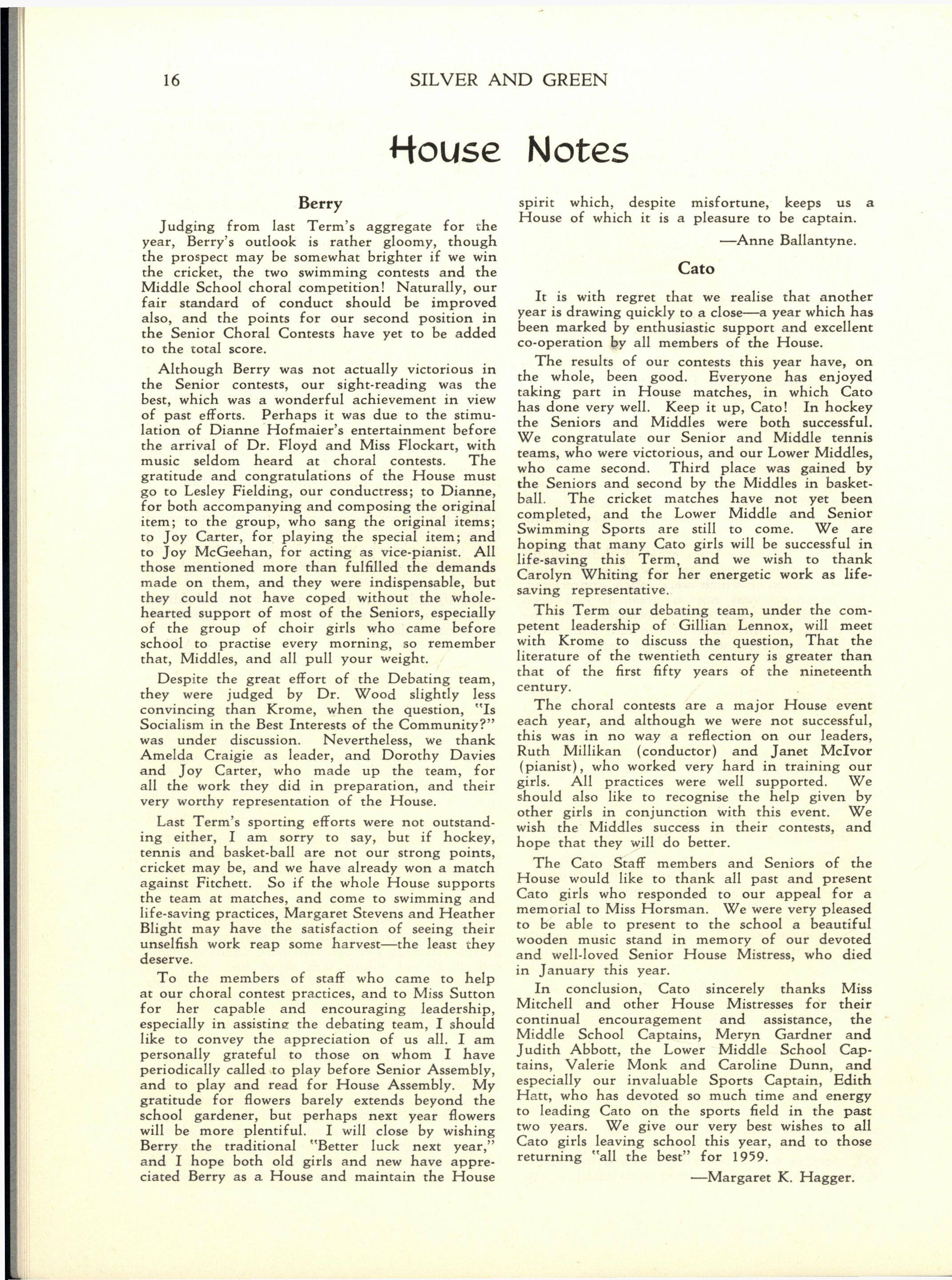
To the members of staff who came to help at our choral contest practices, and to Miss Sutton for her capable and encouraging leadership, especially in assistine the debating team, I should like to convey the appreciation of us all I am personally grateful to those on whom I have periodically called to play before Senior Assembly, and to play and read for House Assembly. My gratitude for flowers barely extends beyond the school gardener, but perhaps next year flowers will be more plentiful I will close by wishing Berry the traditional "Better luck next year," and I hope both old girls and new have appre ciated Berry as a House and maintain the House
spirit which, despite misfortune, keeps us a House of which it is a pleasure to be captain. —Anne Ballantyne.
It is with regret that we realise that another year is drawing quickly to a close—a year which has been marked by enthusiastic support and excellent co-operation by all members of the House.
The results of our contests this year have, on the whole, been good. Everyone has enjoyed taking part in House matches, in which Cato has done very well. Keep it up, Cato! In hockey the Seniors and Middles were both successful We congratulate our Senior and Middle tennis teams, who were victorious, and our Lower Middles, who came second. Third place was gained by the Seniors and second by the Middles in basket ball. The cricket matches have not yet been completed, and the Lower Middle and Senior Swimming Sports are still to come. We are hoping that many Cato girls will be successful in life-saving this Term, and we wish to thank Carolyn Whiting for her energetic work as life saving representative
This Term our debating team, under the com petent leadership of Gillian Lennox, will meet with Krome to discuss the question, That the literature of the twentieth century is greater than that of the first fifty years of the nineteenth century.
The choral contests are a major House event each year, and although we were not successful, this was in no way a reflection on our leaders, Ruth Millikan (conductor) and Janet Mclvor (pianist), who worked very hard in training our girls. All practices were well supported. We should also like to recognise the help given by other girls in conjunction with this event. We wish the Middles success in their contests, and hope that they will do better
The Cato Staff members and Seniors of the House would like to thank all past and present Cato girls who responded to our appeal for a memorial to Miss Horsman. We were very pleased to be able to present to the school a beautiful wooden music stand in memory of our devoted and well-loved Senior House Mistress, who died in January this year.
In conclusion, Cato sincerely thanks Miss Mitchell and other House Mistresses for their continual encouragement and assistance, the Middle School Captains, Meryn Gardner and Judith Abbott, the Lower Middle School Cap tains, Valerie Monk and Caroline Dunn, and especially our invaluable Sports Captain, Edith Hatt, who has devoted so much time and energy to leading Cato on the sports field in the past two years We give our very best wishes to all Cato girls leaving school this year, and to those returning "all the best" for 1959.
-—Margaret K HaggerThis year the girls of Fitchett House have shown willingness to do their best at all times. Although our efforts have not always been success ful, we have much pleasure in taking part, and the friendly association with other teams has been sufficient reward.
During the Second Term we scored first place in basket-ball, second in hockey, and third in tennis. Our congratulations go to Cato for their successes in these fields, and to all other Houses for the part they played. We also commend all girls who supported our teams
The day of the Senior Choral Contest was a most exciting one for all Houses, but perhaps more so for Fitchett Under the able leadership of Rhyll Clark, our conductor, and Clare Johnson, our pianist, Fitchett was led to victory. Dr. Floyd was there to adjudicate in his usual capable and entertaining manner.
Although Fitchett was not as successful as we had hoped in gaining Life-saving points during Second Term, we trust that more grls will co operate with Jenny to make Fitchett the top House in Third Term.
House colours were awarded this year to Rhyll Clark, Clare Johnson, Jennifer Pittard, Rosslyn Wortley, Angela Schafer, Carol Harris, Ruth Sanders, Jennifer Pond, Jane Randell, Lyn Rearden, Glenys Lord and Heather Stainsby, while School colours have been awarded to Jane Randell (baseball), Jennifer Pittard (basket-ball), Margaret Lancaster (basket-ball), Glenys Lord (captain of basket-ball), and Heather Stainsby (hockey) We congratulate them and thank them for their loyalty to House and School
The results of the cricket have not been finalised as yet, but it is fairly evident that both Cato and Krome have excelled in this particular sport We congratulate them also
Our thanks are extended to our Middle and Lower Middle School Captains, Margaret Johns and Anne Bowyer, Elwyn Balmer and Judy Tyquin, for their co-operation and leadership in their respective parts of the School In the Senior section we have been very fortunate to have Glenys Lord as our interested and conscien tious Sports Captain. She has shown her enthusi asm in every activity of the House. I am sure all girls in Fitchett House will join with me in thanking Glenys for her help
To Miss Betts, Mrs. Kelly, Miss E. J. Mitchell and all other House Mistresses, we wish to express our sincere thanks for all the help they have given us throughout the year We owe much to the kindness and understanding of our House Mistresses.
Best of luck for 1959, Fitchett, and keep the gold-flag flying high.
—Heather Stainsby
O Krome, Krome, to our hearts ever dear, Proudly we work, loudly we cheer, Every day of every week of every Term of this great year
For Krome, Krome, Krome
These lines could indeed be sung by many Krome girls, and we thank all those Krome-ites who have supported their House loyally and who have made this year so successful. We thank, especially, Miss Betty Jackson for her guidance and inspiration during the year, and also Mrs. McLeish and the other House Mistresses. We thank too our Prefects, our Middle School Cap tains, Cynthia Cook and Gillian Weeks; our Lower Middle School Captains, Betty Bristow and Jill Coulson, and our Form representatives. Last, but not least, we thank our efficient and energetic Sports Captain, Jan Taylor, who has led and encouraged our teams on to many victories
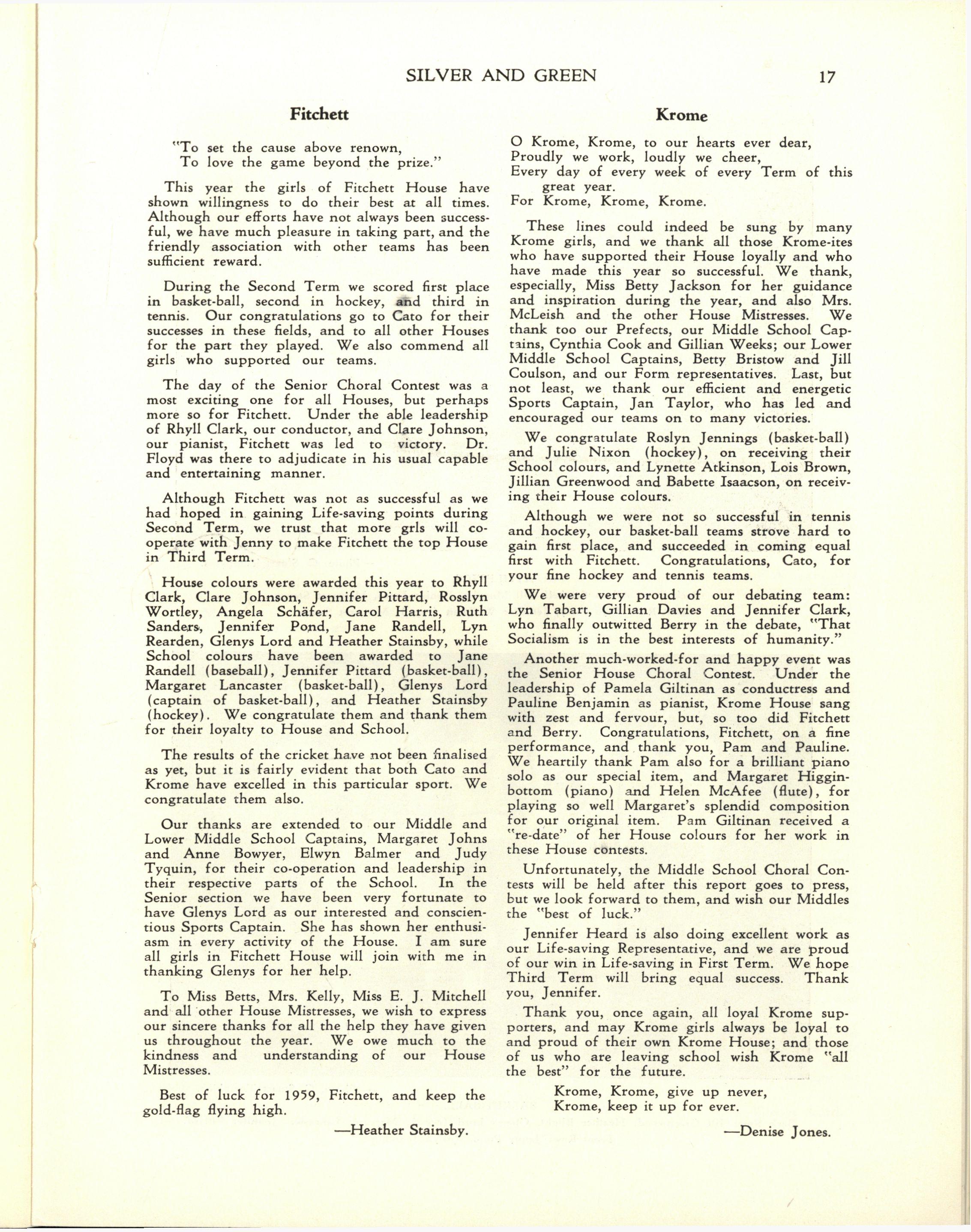
We congratulate Roslyn Jennings (basket-ball) and Julie Nixon (hockey), on receiving their School colours, and Lynette Atkinson, Lois Brown, Jillian Greenwood and Babette Isaacson, on receiv ing their House colours
Although we were not so successful in tennis and hockey, our basket-ball teams strove hard to gain first place, and succeeded in coming equal first with Fitchett Congratulations, Cato, for your fine hockey and tennis teams.
We were very proud of our debating team: Lyn Tabart, Gillian Davies and Jennifer Clark, who finally outwitted Berry in the debate, "That Socialism is in the best interests of humanity."
Another much-worked-for and happy event was the Senior House Choral Contest Under the leadership of Pamela Giltinan as conductress and Pauline Benjamin as pianist, Krome House sang with zest and fervour, but, so too did Fitchett and Berry. Congratulations, Fitchett, on a fine performance, and thank you, Pam and Pauline We heartily thank Pam also for a brilliant piano solo as our special item, and Margaret Higgin bottom (piano) .and Helen McAfee (flute), for playing so well Margaret's splendid composition for our original item. Pam Giltinan received a "re-date" of her House colours for her work in these House contests
Unfortunately, the Middle School Choral Con tests will be held after this report goes to press, but we look forward to them, and wish our Middles the "best of luck."
Jennifer Heard is also doing excellent work as our Life-saving Representative, and we are proud of our win in Life-saving in First Term We hope Third Term will bring equal success Thank you, Jennifer.
Thank you, once again, all loyal Krome sup porters, and may Krome girls always be loyal to and proud of their own Krome House; and those of us who are leaving school wish Krome "all the best" for the future.
Krome, Krome, give up never, Krome, keep it up for ever.
•—Denise Jones"To set the cause above renown, To love the game beyond the prize."

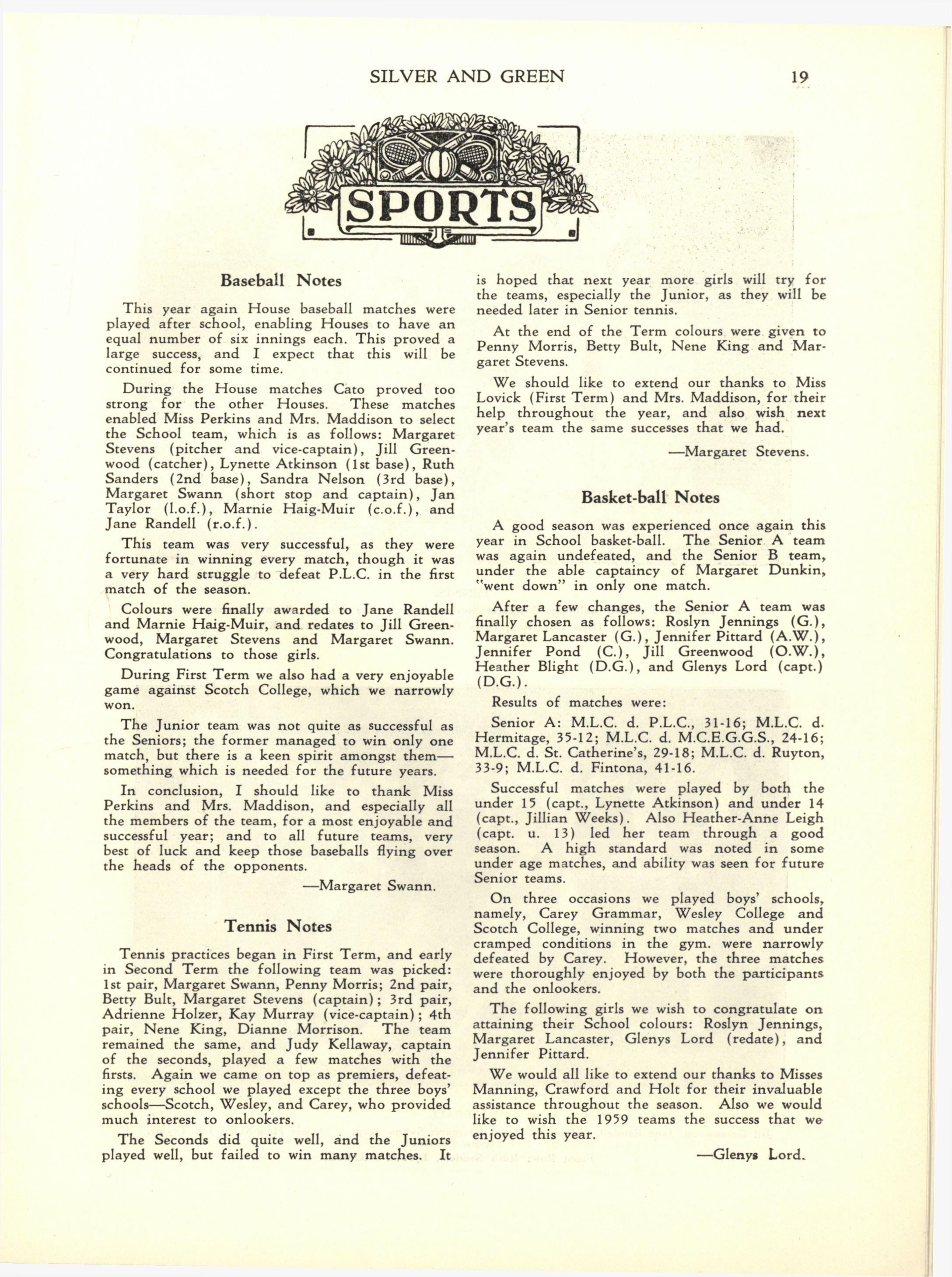
This year again House baseball matches were played after school, enabling Houses to have an equal number of six innings each. This proved a large success, and I expect that this will be continued for some time.
During the House matches Cato proved too strong for the other Houses These matches enabled Miss Perkins and Mrs. Maddison to select the School team, which is as follows: Margaret Stevens (pitcher and vice-captain), Jill Green wood (catcher), Lynette Atkinson (1st base), Ruth Sanders (2nd base), Sandra Nelson (3rd base), Margaret Swann (short stop and captain), Jan Taylor (l.o.f.), Marnie Haig-Muir (c.o.f.), and Jane Randell (r.o.f.).
This team was very successful, as they were fortunate in winning every match, though it was a very hard struggle to defeat P.L.C. in the first match of the season
Colours were finally awarded to Jane Randell and Marnie Haig-Muir, and redates to Jill Green wood, Margaret Stevens and Margaret Swann. Congratulations to those girls
During First Term we also had a very enjoyable game against Scotch College, which we narrowly won.
The Junior team was not quite as successful as the Seniors; the former managed to win only one match, but there is a keen spirit amongst them— something which is needed for the future years
In conclusion, I should like to thank Miss Perkins and Mrs. Maddison, and especially all the members of the team, for a most enjoyable and successful year; and to all future teams, very best of luck and keep those baseballs flying over the heads of the opponents.
—MargaretSwann.
is hoped that next year more girls will try for the teams, especially the Junior, as they will be needed later in Senior tennis.
At the end of the Term colours were given to Penny Morris, Betty Bult, Nene King and Mar garet Stevens.
We should like to extend our thanks to Miss Lovick (First Term) and Mrs. Maddison, for their help throughout the year, and also wish next year's team the same successes that we had.
—Margaret Stevens.
A good season was experienced once again this year in School basket-ball. The Senior A team was again undefeated, and the Senior B team, under the able captaincy of Margaret Dunkin, "went down" in only one match.
After a few changes, the Senior A team was finally chosen as follows: Roslyn Jennings (G.), Margaret Lancaster (G.), Jennifer Pittard (A.W.), Jennifer Pond (C.), Jill Greenwood (O.W.), Heather Blight (D.G.), and Glenys Lord (capt.) (D.G.).
Results of matches were:
Senior A: M.L.C. d. P.L.C., 31-16; M.L.C. d. Hermitage, 35-12; M.L.C d M.C.E.G.G.S., 24-16; M.L.C. d. St. Catherine's, 29-18; M.L.C. d. Ruyton, 33-9; M.L.C d Fintona, 41-16
Successful matches were played by both the under 15 (capt., Lynette Atkinson) and under 14 (capt., Jillian Weeks). Also Heather-Anne Leigh (capt. u. 13) led her team through a good season A high standard was noted in some under age matches, and ability was seen for future Senior teams
Tennis practices began in First Term, and early in Second Term the following team was picked: 1st pair, Margaret Swann, Penny Morris; 2nd pair, Betty Bult, Margaret Stevens (captain) ; 3rd pair, Adrienne Holzer, Kay Murray (vice-captain); 4th pair, Nene King, Dianne Morrison. The team remained the same, and Judy Kellaway, captain of the seconds, played a few matches with the firsts. Again we came on top as premiers, defeat ing every school we played except the three boys' schools—Scotch, Wesley, and Carey, who provided much interest to onlookers.
The Seconds did quite well, and the Juniors played well, but failed to win many matches. It
On three occasions we played boys' schools, namely, Carey Grammar, Wesley College and Scotch College, winning two matches and under cramped conditions in the gym. were narrowly defeated by Carey. However, the three matches were thoroughly enjoyed by both the participants and the onlookers.
The following girls we wish to congratulate on attaining their School colours: Roslyn Jennings, Margaret Lancaster, Glenys Lord (redate), and Jennifer Pittard.
We would all like to extend our thanks to Misses Manning, Crawford and Holt for their invaluable assistance throughout the season Also we would like to wish the 1959 teams the success that we enjoyed this year.
—Glenys Lord.
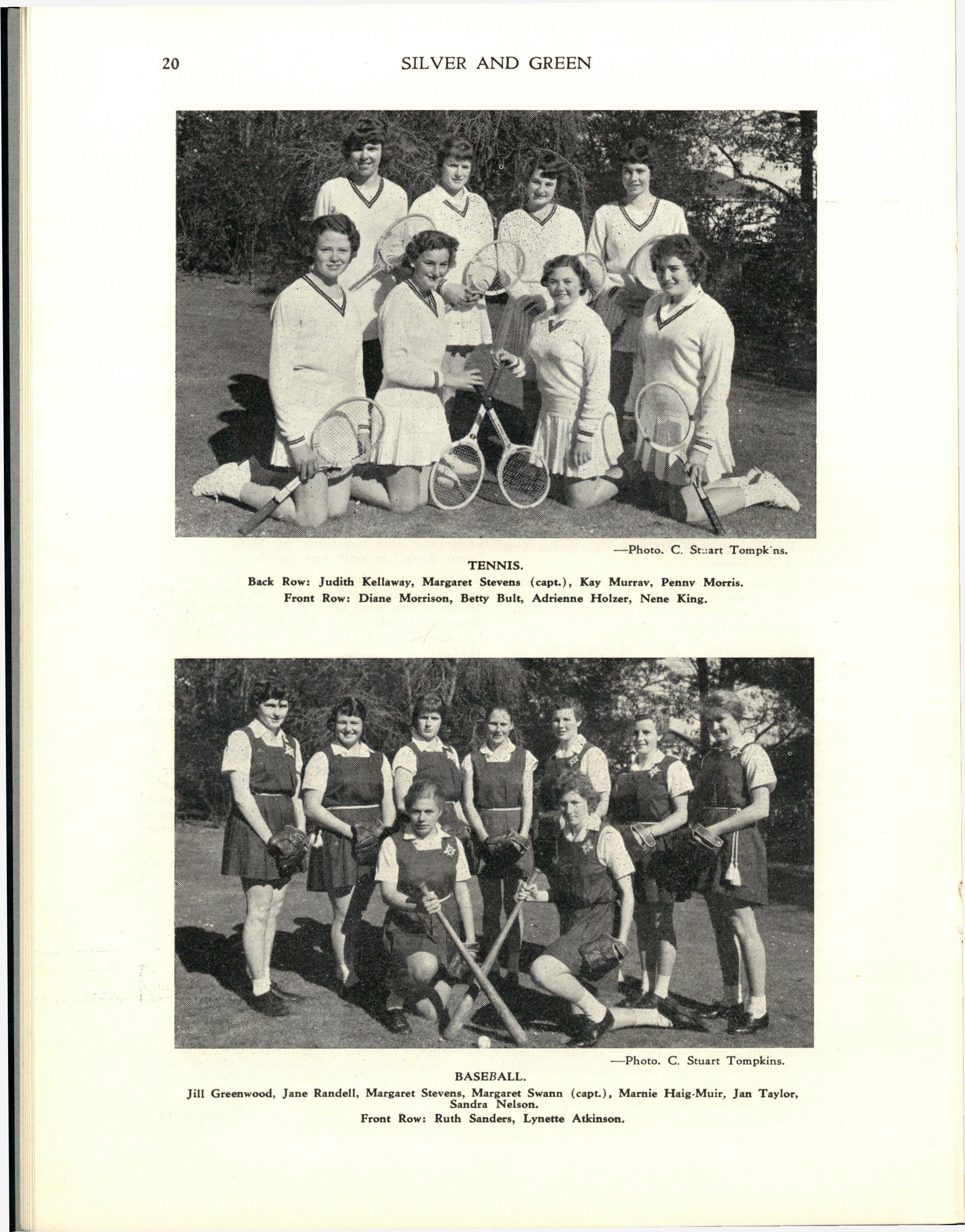
We were sorry that Miss Lovick left at the end of First Term, but with the vigorous training of Miss Tharle we had a successful season
After some changes, the first Senior hockey team was as follows:
Goalkeeper: Caroline Weber; Right Back: Penny Tillbrook; Left Back: Margaret Jenkin; Right Half Back: Elizabeth Barnes (vice-captain) ; Centre Half Back: Janice Orton; Left Half Back: Miriam Bilney; Right Wing: Fay Williams; Right Inner: Heather Stainsby; Centre Forward: Julie Nixon; Left Inner: Pamela Ternouth (captain) ; Left Wing: Noel Tredinnick
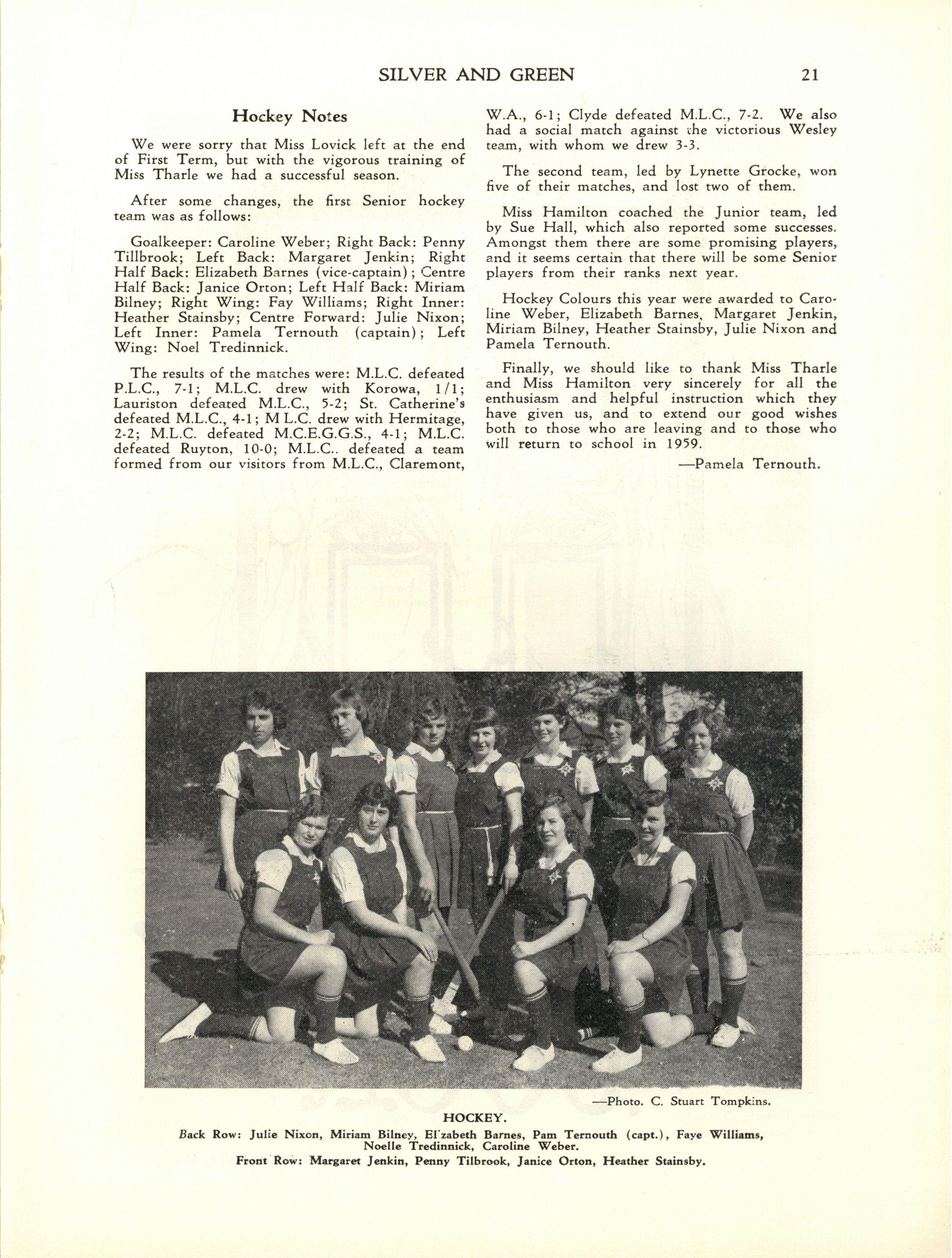
The results of the matches were: M.L.C. defeated P.L.C., 7-1; M.L.C. drew with Korowa, 1/1; Lauriston defeated M.L.C., 5-2; St. Catherine's defeated M.L.C., 4-1; M L.C drew with Hermitage, 2-2; M.L.C defeated M.C.E.G.G.S., 4-1; M.L.C defeated Ruyton, 10-0; M.L.C. defeated a team formed from our visitors from M.L.C., Claremont,
W.A., 6-1; Clyde defeated M.L.C., 7-2. We also had a social match against the victorious Wesley team, with whom we drew 3-3.
The second team, led by Lynette Grocke, won five of their matches, and lost two of them.
Miss Hamilton coached the Junior team, led by Sue Hall, which also reported some successes Amongst them there are some promising players, and it seems certain that there will be some Senior players from their ranks next year.
Hockey Colours this yea.r were awarded to Caro line Weber, Elizabeth Barnes, Margaret Jenkin, Miriam Bilney, Heather Stainsby, Julie Nixon and Pamela Ternouth.
Finally, we should like to thank Miss Tharle and Miss Hamilton very sincerely for all the enthusiasm and helpful instruction which they have given us, and to extend our good wishes both to those who are leaving and to those who will return to school in 1959.
-—Pamela Ternouth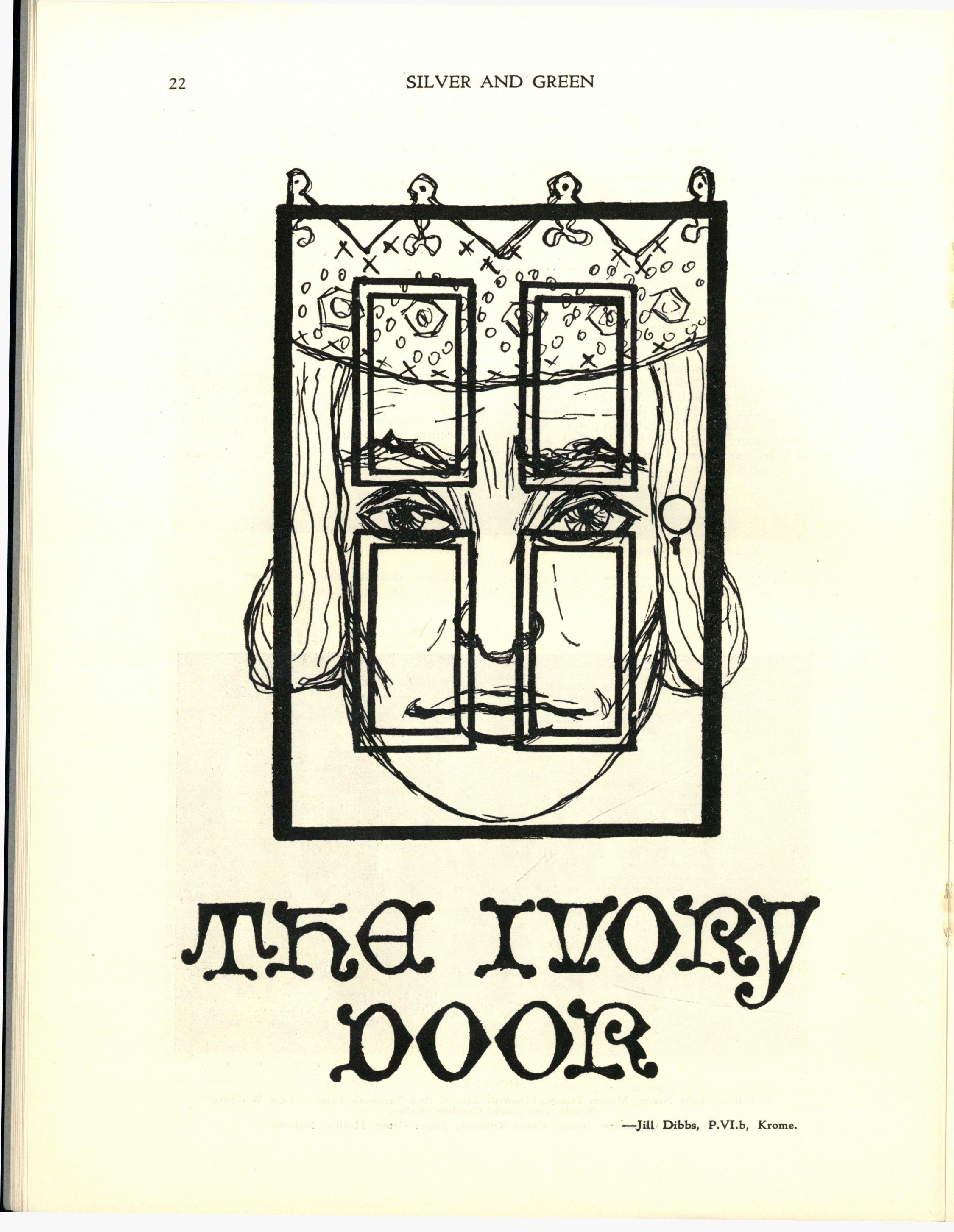
After months of very hard work on the part of the Dramatic Society, under the leadership of Miss Dwyer, once again this year we were pre sented with a School Play which maintained the usual high standard.
Those in the audience who were not aware of the allegorical qualities of the play were able to enjoy it as a simple fantasy. However, most of the audience were surely able to interpret the deeper meaning of the fairy tale and thus to gain a fuller enjoyment from it.
It was the story of King Perivale, who in all matters is considered by his superstitious subjects to excel them in every way. These people, when faced with the truth about him, find themselves unable to accept it It is clear from the play how superstitious, uneducated minds can contort the truth to support their mistaken beliefs.
Although the role of King Perivale was not an easy part to play convincingly, Wendy Buchanan achieved a very high standard in her portrayal of him.
The dithering Chancellor who tried to please everybody was the prototype of the over-diplomatic politician of to-day who is afraid to make a decision lest he should make himself less popular with either side. Lois Lyndon was extremely con vincing in this role and made the character very vivid.
The portrayal of the slow-witted, bullying Captain of the Guard, by Gillian Davies, was so realistic that it is believed that girls in a lower section of the school at first adopted a distinct dislike for the unfortunate girl.
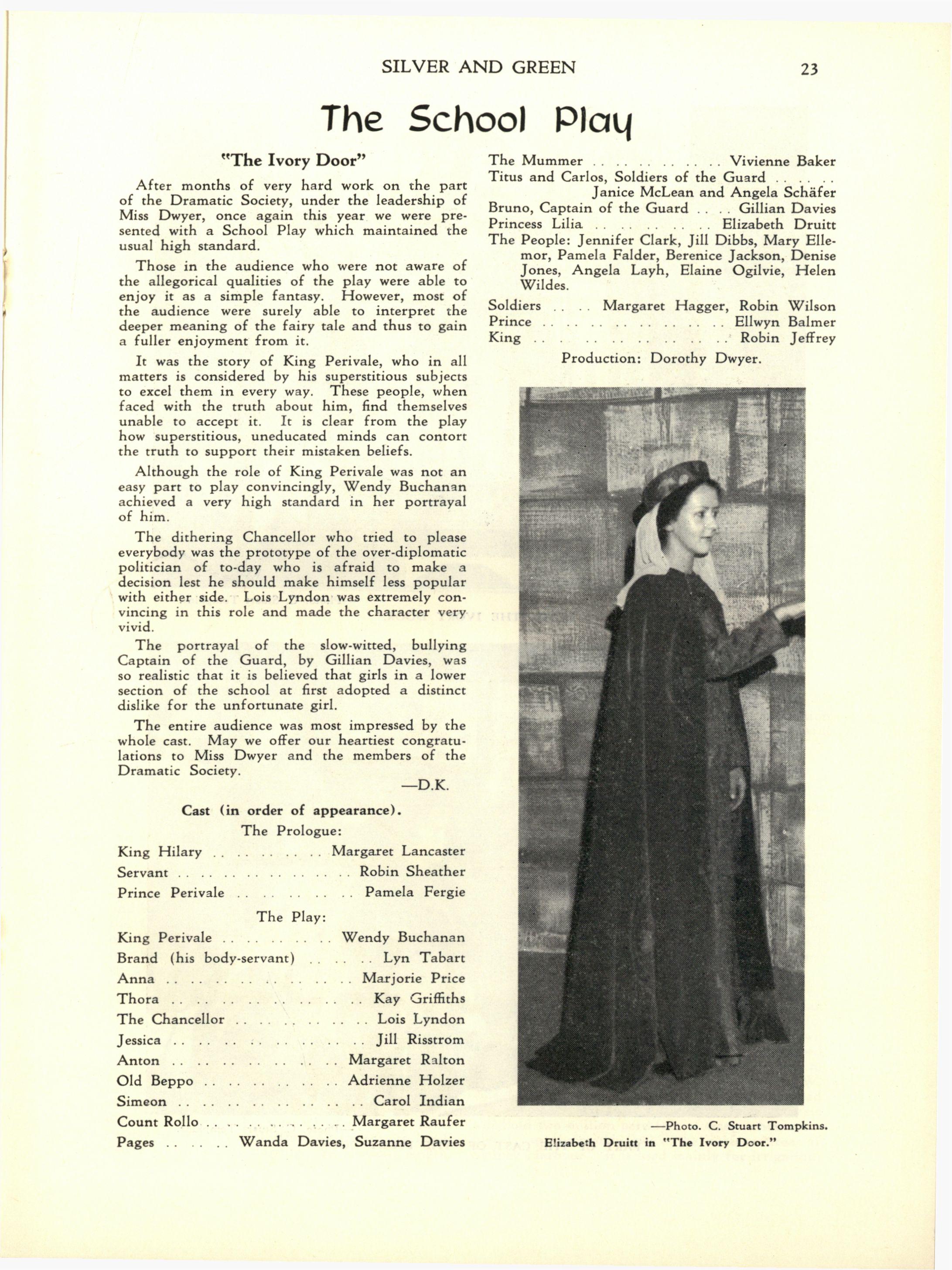
The entire audience was most impressed by the whole cast May we offer our heartiest congratu lations to Miss Dwyer and the members of the Dramatic Society.
—D.K.
Cast (in order of appearance)
The Prologue: King Hilary Margaret Lancaster Servant Robin Sheather Prince Perivale Pamela Fergie
The Play:
King Perivale Wendy Buchanan Brand (his body-servant) Lyn Tabart Anna Marjorie Price Thora Kay Griffiths
The Chancellor Lois Lyndon Jessica Jill Risstrom
Anton Margaret Ralton Old Beppo Adrienne Holzer Simeon Carol Indian Count Rollo Margaret Raufer Pages Wanda Davies, Suzanne Davies
The Mummer
Vivienne Baker
Titus and Carlos, Soldiers of the Guard Janice McLean and Angela Schafer
Bruno, Captain of the Guard . . . . Gillian Davies Princess Lilia Elizabeth Druitt
The People: Jennifer Clark, Jill Dibbs, Mary Elle mor, Pamela Falder, Berenice Jackson, Denise Jones, Angela Layh, Elaine Ogilvie, Helen Wildes.
Soldiers . . Margaret Hagger, Robin Wilson Prince Ellwyn Balmer King Robin Jeffrey
Production: Dorothy Dwyer.
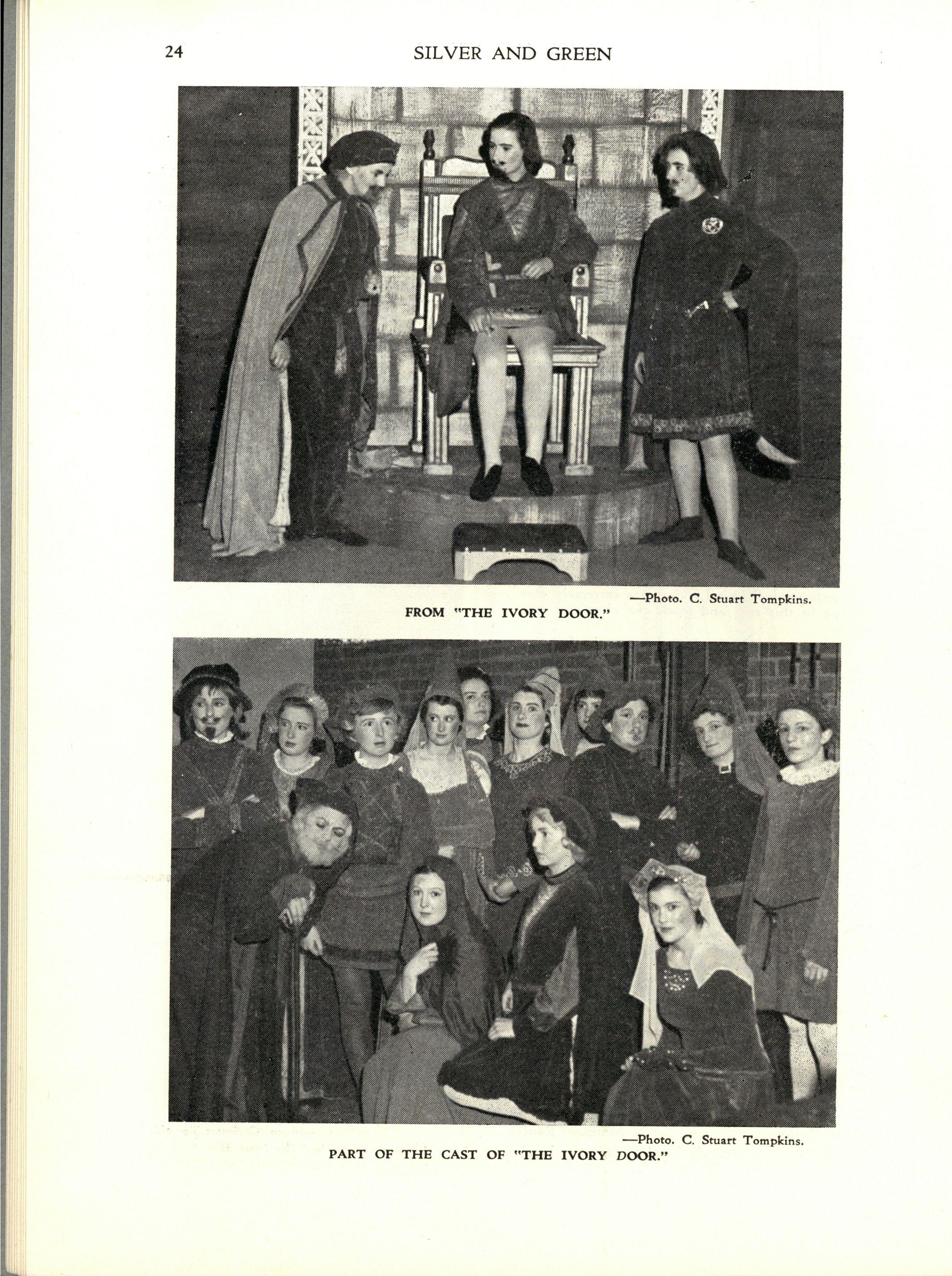 —Photo C Stuart Tompkins
FROM "TH E IVOR Y DOOR. "
—Photo C Stuart Tompkins
PART OF TH E CAST OF "TH E IVOR Y DOOR. "
—Photo C Stuart Tompkins
FROM "TH E IVOR Y DOOR. "
—Photo C Stuart Tompkins
PART OF TH E CAST OF "TH E IVOR Y DOOR. "
On the evening of the 21st and 22nd August the Sub-Intermediates presented Mozart's opera, "Barbarina," with great success in the New Assem bly Hall
The audience was delighted with the girls' sweet, clear voices, and followed the story with interest.
When the curtain rose, Susanna was seated in the garden of the castle, happily trimming a hat Her lover, Figaro, interrupted her work, and together they discussed their approaching wedding. The love of another couple was being thwarted by the Count's plan to send Cherubino to the wars and marry Barbarina himself. Th villagers were also concerned over the plight of Cherubino and Barbarina. That evening Barbarina, unhappy because of Cherubino's absence, heard from her maid, Susanna, that Cherubino was hiding in the castle. Barbarina and her maid planned to have the Count walking in the garden so that the two lovers could depart together. The Count left his castle in disgrace, and Cherubino and Bar barina returned midst the joy of the villagers.
We heartily congratulate Miss Scarlett on the excellent production of the opera, and the Sub Intermediate girls, who sang with such enthusiasm.
The main members of the cast were: Susanna Diane Hancock, Kaye Bradbury Figaro Janette Mace, Janet Morgan Chief Villagers . . . Susan Mues, Julia Wilkinson Villagers . . . . Forms L.V.a, L.V.c, L.V.e, L.V.h Cherubino Linda Matkovitch, Penelope Kraber Barbarina Nanette Mellor, Joan Brown Villagers
Sub-Intermediate Choir and group of girls Angelina Ula Jones Villagers . . Forms L.V.b, L.V.d, L.V.f, L.V.g Accompanists Julia Marcroft, Meredith Hunkin Mr. S. Seymour, Miss J. Illingworth and Miss G Lang gave much assistance during the produc tion, and we thank them sincerely —G.L.
aKSij
It was a bright, well-rugged assemblage of girls that departed one sunny morning, 3rd October, accompanied by Mrs Downie and Miss Kerr, for Canberra and the Snowy Mountains by coach Our obliging driver, Colin, showed us the finer points of the coach that would make our "home for the next eight days" more comfortable.
After climbing the Great Divide (1622 feet) we found ourselves in "Kelly country," passed through many towns associated with the notorious gang as well as the explorers Hume and Hovell; Kil more, a gold-rush town settled in 1837; Broadford, with its cairn to Hume and Hovell (1824); old and new Seymour, on the largest river in Victoria, the Goulburn; Mangalore, named after a place on the Malabar coast of India; and Euroa, where in 1878 the Kelly Gang held up the hotel. As we passed through pleasant grazing country Colin told us that the sheep were fed on sulphur of iron in order to produce steel wool. We passed through Benalla (misnamed from Benalta by a careless Titles Office clerk), on the Broken River, and then Glen rowan, where Ned Kelly and his gang were finally captured in 1880 Wangaratta lay in the rich grazing Ovens Valley. Velvet flats bounded by a line of bare basket willows swept up abruptly to the hills. Sun and shadow made interpla" on this pleasant valley. The tree-canopied Kiewa River enters the Murray just near Wodonga; its head waters are in Mount Bogong. As shadows length
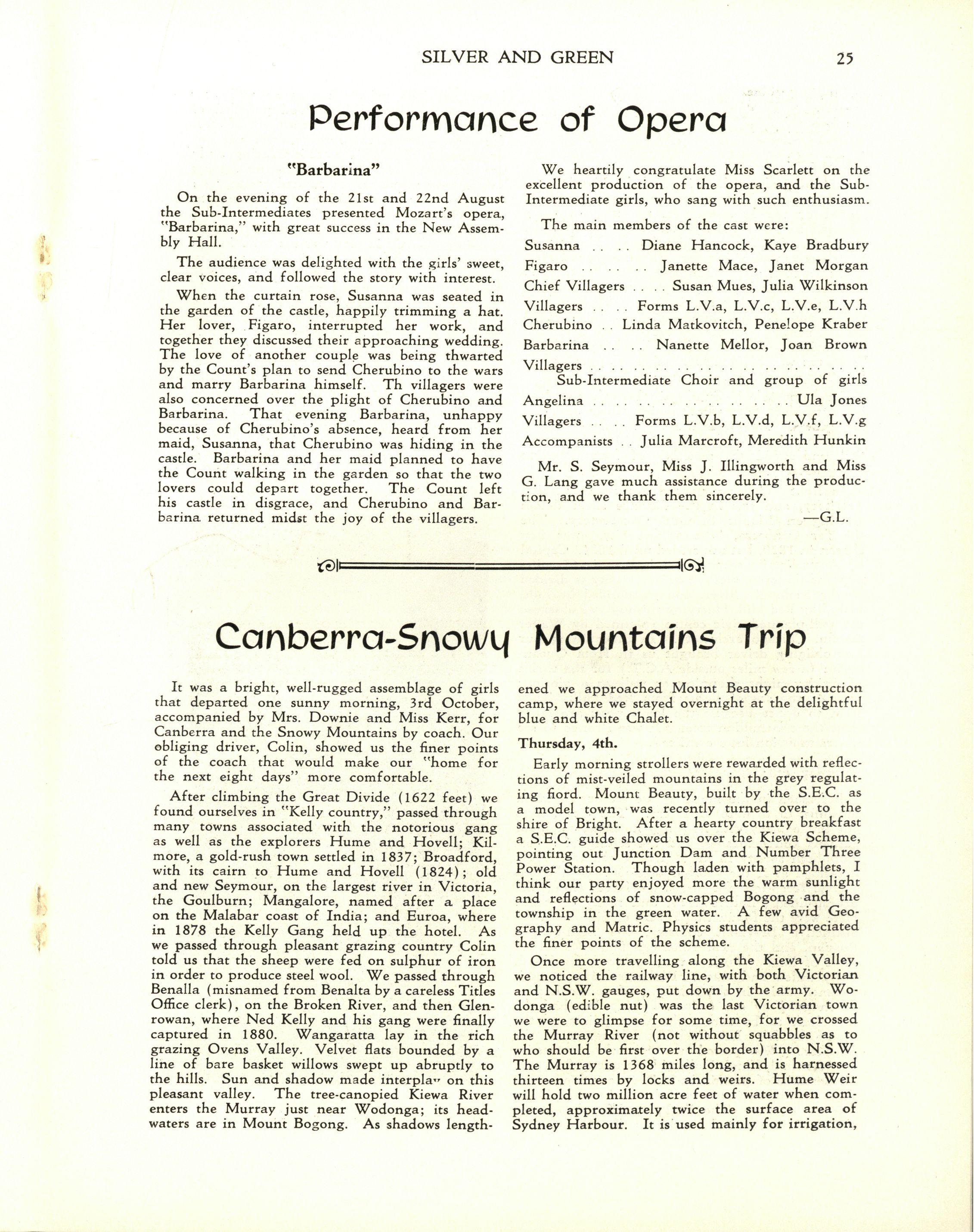
ened we approached Mount Beauty construction camp, where we stayed overnight at the delightful blue and white Chalet
Thursday, 4th.
Early morning strollers were rewarded with reflec tions of mist-veiled mountains in the grey regulat ing fiord. Mount Beauty, built by the S.E.C. as a model town, was recently turned over to the shire of Bright After a hearty country breakfast a S.E.C guide showed us over the Kiewa Scheme, pointing out Junction Dam and Number Three Power Station. Though laden with pamphlets, I think our party enjoyed more the warm sunlight and reflections of snow-capped Bogong and the township in the green water. A few avid Geo graphy and Matric. Physics students appreciated the finer points of the scheme
Once more travelling along the Kiewa Valley, we noticed the railway line, with both Victorian and N.S.W. gauges, put down by the army. Wo donga (edible nut) was the last Victorian town we were to glimpse for some time, for we crossed the Murray River (not without squabbles as to who should be first over the border) into N.S.W The Murray is 1368 miles long, and is harnessed thirteen times by locks and weirs. Hume Weir will hold two million acre feet of water when com pleted, approximately twice the surface area of Sydney Harbour. It is used mainly for irrigation,
but three turbines supply electricity to N.S.W There has been much controversy between Victoria and N.S.W. over ownership.
Travelling along the fringe of the Riverina, we passed through Wagga Wagga ("many birds"), capital of the Riverina. In the mist of early morning we saw fat sheep frozen on the low hills, glittering spiders' webs and yellow paddocks with a curious vapour rising from them Beyond Hoi brook (named after Commander Holbrook, V.C., of World War I), we glimpsed a low range of mountains signifying the boundary between Vic torian and N.S.W. breweries. As we climbed these ranges, banks exposed by erosion were evident Tarcutta (meaning hooped dress) we learnt was a popular all-night stopping place for transport drivers.
We approached Gundagai through the lush Murrumbidgee flats, where maize, wheat and oats are grown. As we learnt of the severe floods which wiped out the town twice in the past, we well understood the meaning of Murrumbidgee ("big water").
As light faded we entered Australian Capital Territory, and saw in the distance silver domes glinting on Mount Stromlo Observatory. The site for Canberra, "the golden city," was first chosen in 1820, but not settled until 1824. Capital of Australia, its seaport, Jervis Bay, is 67 miles away as the crow flies. The actual city is divided by the Molonglo River, and surrounded by hills, including Red Hill. Hurrying through, we observed the well-planned civic centre (planned by Walter Griffin, Chicago architect). In the evening our ever-obliging driver brought us in from Quean beyan (a few miles outside A.C.T.) for the thrills of Friday night shopping as well as a glorious view of the sea of lights from Red Hill. They seem to dance because the lamp posts are lower than the two million trees. It was strange to see no transmission lines overhead.
Saturday, 6th:
Refreshed in the morning, we set out in warm sunshine to explore Canberra The city strikes one immediately with its sunny neatness, colourful gardens and embassies, and the setting of a cos mopolitan society in hilly grazing country. Truly it seemed as if the weather officials had prepared a civic reception for us as we lazed along the prunus-lined Flinders Way, and many crescents Here were the fascinating abodes of diplomats, the distinctive Brazilian embassy, the high-hedged Russian, and the neat American buildings on six acres of land. Gardens were spacious, filled with pussy willow and wattle. Parliament House, as it gleamed white in the sunlight, of course had to be snapped by our camera fiends. We had the rare luck to be shown the finer points of the House by Mr. Ian Cochrane, Secretary to the Speaker. We passed through the impressive entrance hall, King's Hall, with parquetry floor and oil portraits of prominent M.P.'s along long corri dors, with mysteriously-named rooms, to the Prime Minister's suite The P.M., Speaker, Leader of the Government and Leader of the Senate each
have luxurious private rooms as well as their carpeted, maple and blackwood panelled offices. We were shown the Speaker's symbol of authority from the Crown, the large golden mace. The organisation of this big place is amazing, and there are numerous alarms and flash-bulb systems for summoning members A hushed group, we stood in the plushly furnished House of Representatives. The circular seats, heavily padded in green leather, and the Speaker's massive throne were tested by all. Of interest was the two-minute sand glass; after it has run out no more members are allowed to enter for a particular vote The Senate was also circular, but furnished in red. From this place of pageantry we passed to the Institute of Anatomy, where Phar Lap's heart, weighing 14 lb., is preserved, and the Museum which houses relics of aborigines and New Guinea natives. The University, looking like a sparkling block of flats, is more a research institution than a formal univer sity, a Fullbright scholar told us.
The American War Memorial reaches a height of 189 feet, with the eagle and sphere (weighing three tons) above It was erected in grateful memory of war service of American servicemen. But it was at the
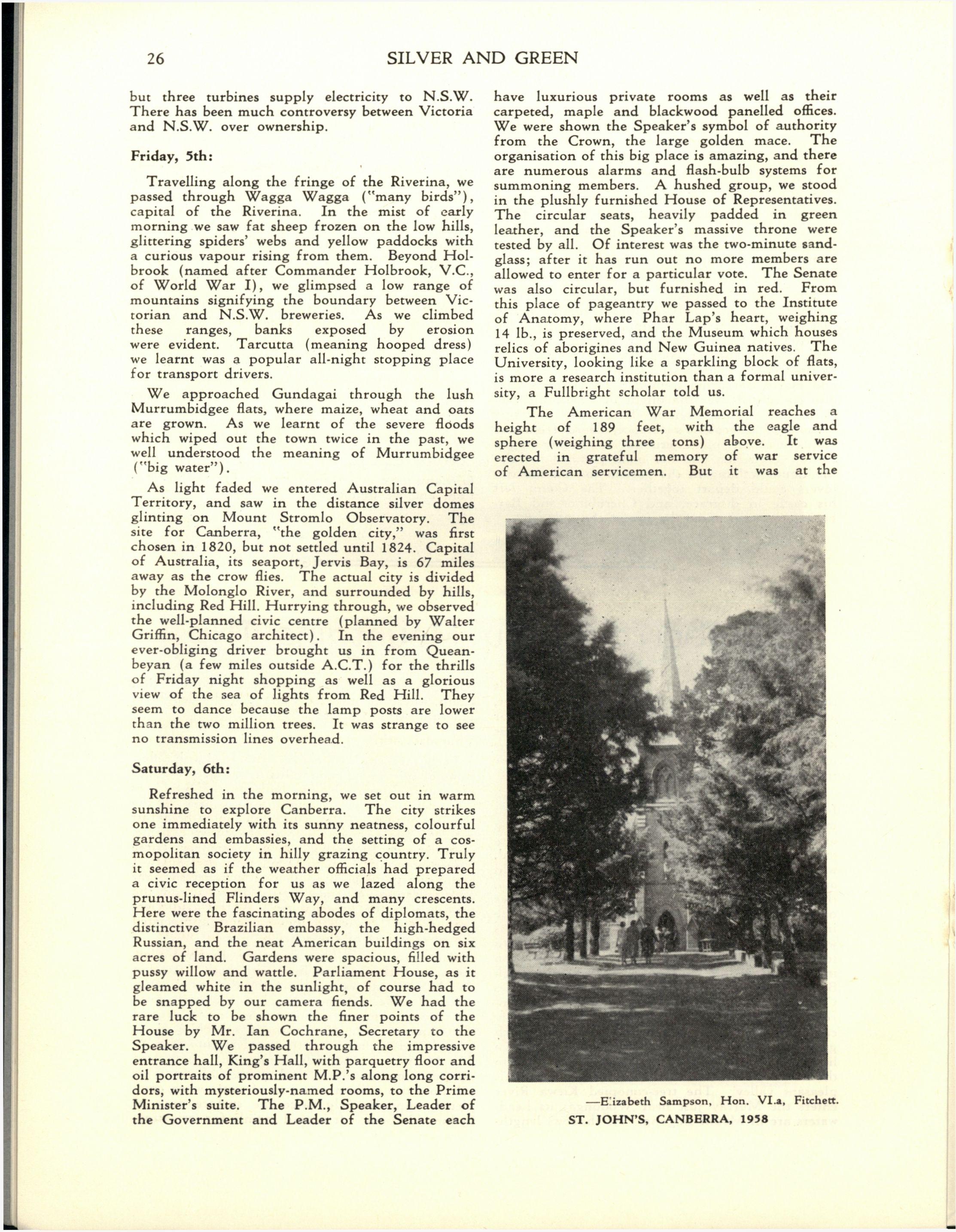
Australian National Memorial we walked in hushed wonderment. A dignified white building set on a green hill, it houses a museum of oddments from the wars. Amongst the paintings of war scenes, the various distinguished awards and maps, was the bomber " G for George," mentioned in "The Dam Busters." As I stood in the Hall of Memo ries, with its orange pink and grey half-inch mosaic tiles, Australian marble floor and lofty dome, with queer shapes striking up in patterns to a golden flame, I felt a sensation of pride and sorrow Mosaics formed the figures of a nurse, sailor, soldier and airman. Stained glass windows depicted the qualities found in our great warriors. We paid a hurried visit to Mount Stromlo and vast-lawned Yarralumla, Sir William Slim's resi dence.
The party bade farewell to Canberra. Climbing steadily through timbered hills, we left Quean beyan We could feel the coolness appreciably as we neared Cooma, and our appetites sharpened, although breakfast was only a few hours behind. However, before lunch we were introduced to our guide for the next two days at the S.M.A. head quarters. Several colour films, some pamphlets and learned words helped us to realise the impor tance to Australia of this vast scheme The idea of diverting the water from the east to the west dates back to the 1800's. Because in diverting the water it falls thousands of feet, it was decided to use it to generate power. Eventually a third of the power generated will go to New South Wales
During the afternoon we travelled up to the heart of the Australian Alps, passing through Berridale (population 500) and Jindabyne, which will be moved, as it is to be submerged A few miles from Jindabyne we passed over the Threadbo River, which later joins the Snowy River (the fastest flowing river in Australia), where Banjo Paterson probably wrote "The Man from Snowy River." Snow gum and mountain ash became more numerous, the drifts of snow thicker, and girls more excited as we reached the snow-line (4000 feet). Piling out of the coach, we frolicked in snow near the frozen Guthega Dam. It was a tired party that inspected Guthega Power Station, then returned to a cafeteria tea in the mess hut at Island Bend At a service that evening we thanked God for the beauty of the country and the fellow ship of our holiday.
Passing through Eaglehawk (4070 feet), we came to Lake Eucumbene, where we lunched on
board an S.M.A. launch and met our coach on the other side. On the Happy Jock's Plain we had a further frolic in the snow with an improvised toboggan. From Kiandra we climbed about 600 feet over snow-clad hills to the top of the Great Divide (5210 feet), and then down again to Cabramurra (4880 feet). After watching the pink orange sunset on the snow we retired in the very large huts containing warm, modern bedrooms.
It was strange to see the morning sun melt the heavy icicles on the roofs From near the mess hall we had a view over the whole construction camp; a typical S.M.A. development, with its zinc roofs scintillating in the sunlight, on "Australia's rooftop." As we passed near the French and American labourers, we lustily chanted the Mar seillaise and The Star-Spangled Banner There are about thirty nationalities employed along the four hundred miles of road.
Descending now along the S.M Highway, we reached Yarrangobilly, where we inspected the caves, discovered in 1834 by John Bowman, a drover. The frozen ballet of nature was won derful, although some of our party were stricken with claustrophobia On the way to the green Tumut Valley we stopped for a drink from a clear mountain stream. The valley, the first glimpsed for several days after our sojourn in the mountains, was comparable in lushness to the Kiewa Valley. In the picturesque township of Tumut are the tallest poplars in N.S.W (well over 100 feet high)
Our last night away from home!
Our hearts and eyelids were heavy as we departed from Tumut. To-day travel would be rapid, for we had to be in Melbourne by night fall Nevertheless, our Pioneer coach kept its wonted speed, and as we relaxed we tried to recall all the memories of our trip. To the Gundagai turnoff, and then to Albury we went on our way. Often crossing the border, we were in our Victoria again
We reached the twinkling suburbs singing, despite our tiredness, vigorous welcome to Mel bourne. As we alighted from "Carak" there was a mixture of pleasure of homecoming and wistfulness at the thought of unforgettable and hilarious experiences together All of us would like to thank Mrs. Downie and Miss Kerr for their care of us on a most enjoyable holiday, and give a special word of thanks to Colin Boundy, our guide.
—Joan Pilkington.
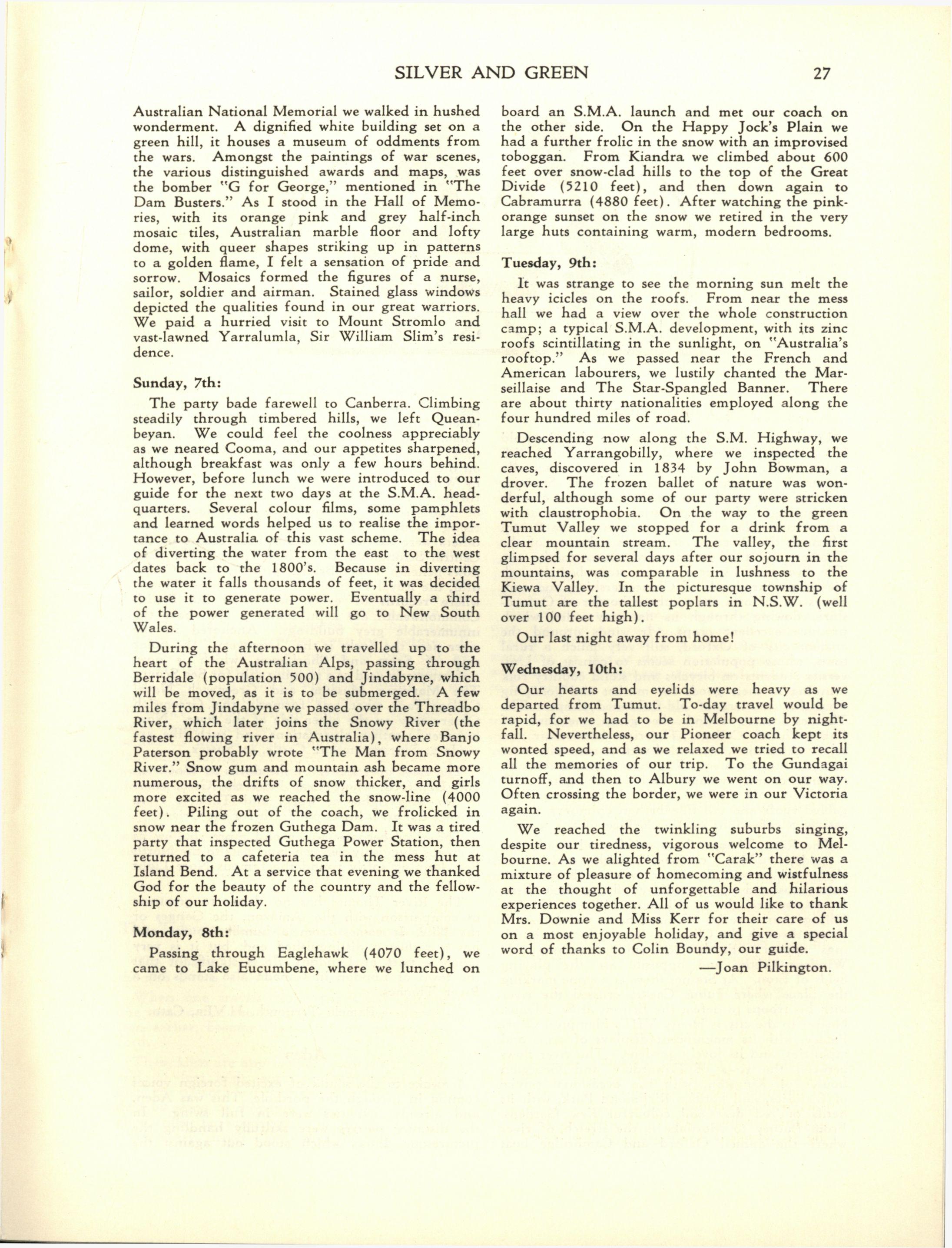
London's River Thames rises in the Cotswold Hills, amid pleasant farming country dotted with sheep and grey stone. The great river actually begins in a glade known as Seven Springs, although it is possible to see the confluence of only five springs It is interesting to note that in glacial times, before the formation of the Bristol Channel, the River Severn was a tributary of the Thames, and took its eastward course to the sea. The river rushes over a narrow stony bed through the sleepy farmlands of Gloucestershire, and con tinues on to form the southern border of Oxford shire, flowing through its flat clay vales, which produce excellent crops. It winds around the ancient city of Oxford, still very much a rural town, whose population seems to consist of Uni versity students on bicycles and stolid country folk bringing in their goods for market and gossiping over the counters of old-fashioned shops. The Thames curves round the green meadows of Christ Church College. The river here, clear and bright in summer, is crowded with punts and canoes and pleasure steamers. The river flows on through tranquil country villages, such as Abingdon, with its famous old church, its red brick houses with gabled roofs and tall Elizabethan chimneys, which cast firm reflections on the surface of the water.
The River Thames flows swiftly and steadily in a wide, curving course through undulating, chequered country, by water meadows bright with buttercups and young children flying their kites. It passes through the Chiltern Hills at Goring, falling over a series of magnificent weirs. As it passes through the Clivedon Reach, famous build ings appear. Further on stands on one side Windsor Castle, and opposite are the playing fields of Eton. At Staines there is a stone marking the place where Julius Caesar crossed the river with his troops to defeat the Britons at St Albans Nearer to the city is Henry VIII's Hampton Court Palace, with its magnificent displays of arms and tapestries, and its lovely gardens. The river flows between the rows of Edwardian and Georgian houses of Kingston, with the occasional smoke of factories, and borders Richmond Park, with its herds of red deer and colourful Kew Gardens. From Putney to Mortlake is the stretch of river where the annual Oxford and Cambridge boat
race takes place and then at Brentford the river enters Greater London. On the banks of the Thames stands the dignified building of the Houses of Parliament and Big Ben. Further downstream on the opposite side, is the Tower of London, built by William the Conqueror on the site of a Roman fortress. From the river one sees the shiny green of Traitors' Gate at water level, the black ravens rising about the green where Anne Boleyn and others were executed, and the four towers of the Central Stronghold, the White Tower The river flows beneath Tower Bridge, with St. Paul's Cathe dral, the Royal Festival Hall and Somerset House, where records of every person in the British Commonwealth are kept, standing out above the innumerable grey buildings Anchored in the river near the docks is the "Discovery," the polar ship of Scott and Shackleton, which is now, unfortunately used as a training ship for Sea Scouts. The Maritime Museum and Greenwich Naval College face what was formerly the Greenwich Observatory on the other side of the river. Now, however, weather observations and such like are made at Hurstmonceaux Castle, in Sussex.
The river goes slowly by the docks at Woolwich and Deptford, where Czar Peter the Great came to see shipwrights at work, and Tilbury, from whence the great liners put forth for the Orient.
The river becomes wider and more shallow as it creeps sluggishly between mud flats to the North Sea, lapping softly round the famous Nore Light Ship.
The River Thames has no claims to greatness in comparison with the Amazon, the Ganges or the Nile. It comes from a humble source and has a rather undistinguished end, but it is very much a part of London It is significant that the town of London in Canada also stands on a River Thames.
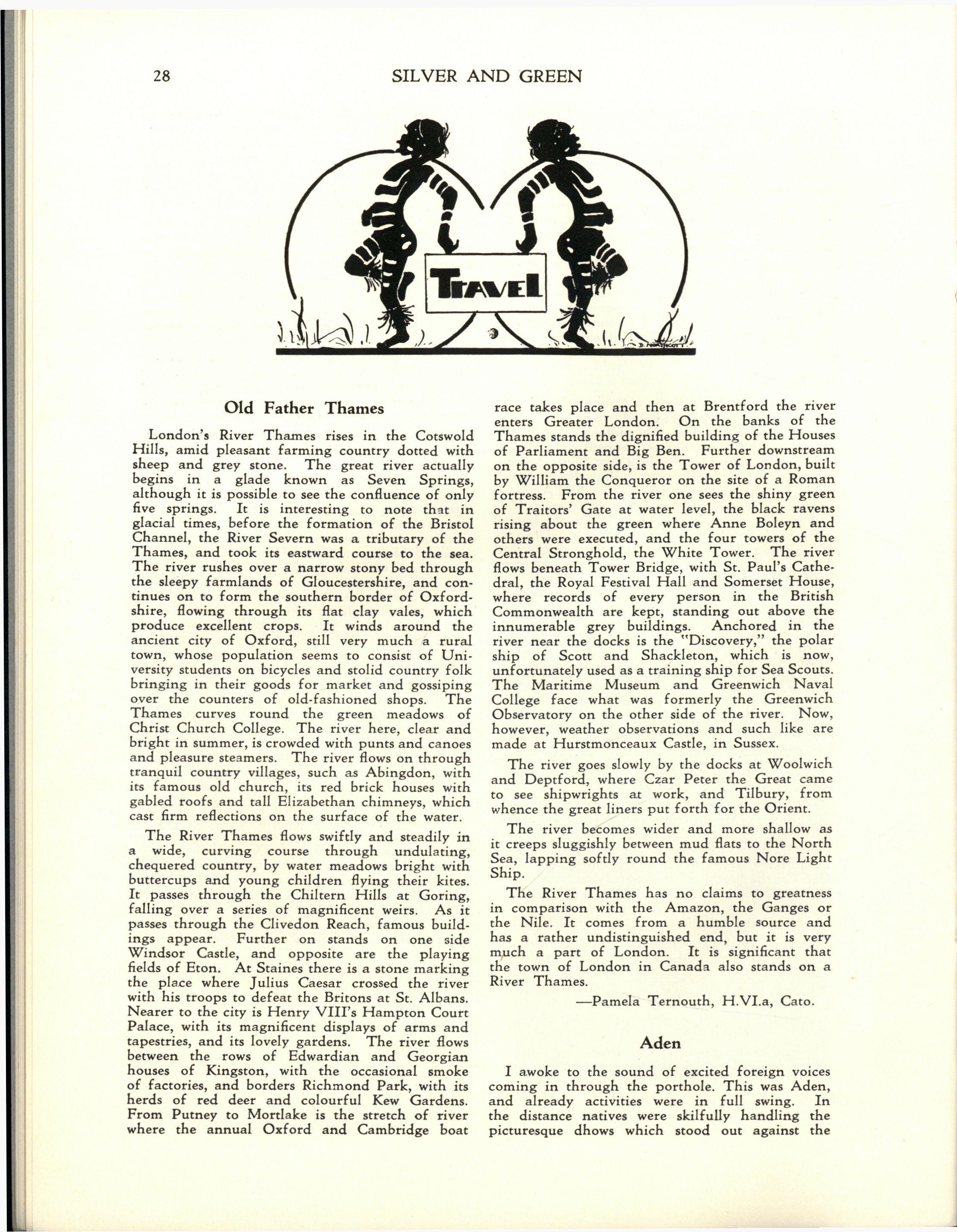
-—Pamela Ternouth, H.VI.a, Cato.
I awoke to the sound of excited foreign voices coming in through the porthole. This was Aden, and already activities were in full swing In the distance natives were skilfully handling the picturesque dhows which stood out against the
cloudless blue sky. Other natives in rowing boats were bartering their wares and delivering them by the means of a line thrown up to a porthole.
After breakfast we boarded a launch for the shore, where, once through the customs, we were immediately pestered by natives to buy their goods or to let them act as guides or taxi drivers. With much difficulty we tried to discourage them, but they would not take "No " for an answer, and we found it best to ignore them
We wandered along to the Tawahi shopping quarters, where we bought some souvenirs and looked at a leather suitcase.
The streets were a sight I shall never forget There were ragged people wandering along in the middle of the street. The noise of the traffic was deafening. Car drivers used their horns con tinually, and there seemed to be no traffic rules. There were ragged children following us, begging for food or silver coins. Coppers they would not accept. Many starved-looking people, blind or severely scarred, wandered around, barefooted, begging for money
The hot sun beat down and flying papers and dust added to the discomfort of our progress The bleating of wandering goats mingled with the raucous cries of colourfully dressed street pedlars.
At last it was time to return to the ship, and as we neared the jetty we found ourselves being followed by a native boy who asked us if we wanted that leather suitcase. We told him it was too dear but he insisted on our going back to the shop, where the salesman was smiling from the doorway. The boy disappeared, and the salesman offered the case at a price lower than before. It was still more than we wanted to pay, but we needed that suitcase, and when we were told our price would ruin him, we suggested tossing for the price. We won the toss, but offered to split the difference. The salesman sportingly refused the extra money, accepted it when pressed, and pre sented us with a beautifully coloured silk scarf, laughingly saying, "You drive a hard bargain." We knew then he would not be quite ruined, and, delighted, we returned to the ship
Sunburnt and exhausted, we sank into deck chairs, and as we moved out of the harbour we watched regretfully the parched and jagged-looking coastline dwindling in the distance —Elizabeth Knee, 15 yrs , V.d, Berry.
The dust-like seeds are planted in long narrow beds, covered at night by canvas to protect the young seedlings from the district's heavy frosts.
Around November the young plants are trans ferred from the beds to the paddocks by a tobacco planting machine The paddocks are the fertile river flats of the Ovens and Buffalo Rivers. This machine, which is towed behind a slow-moving tractor, is almost human in its action, as it adds a cupful of water and some superphosphate to each plant as it goes into the ground. The young plant grows rapidly but is the prey of many enemies. These include frosts, hail, blue mould, and many pests A grower could lose his whole crop in one night from a frost, or in a matter of minutes as the result of a hailstorm.
The plants must be watered heavily until it matures. A network of overhead sprays, which are supplied from near-by rivers, take care of this Chemicals are mixed into the water to combat many types of pests. There are no peace ful evenings in the district during the summer, as hundreds of pumps are working all night.
At maturity the plant is about seven feet high, with small pink flowers. The large leaves measure about eighteen inches along the mid-rib.
As the leaves turn yellow from the bottom up, they are picked from the bottom first. The frosts usually prevent the whole crop from being picked. Most of the picking is done by Italian women in the last months of summer and early autumn
The tobacco leaves are taken to the sheds where they are tied to sticks in bunches known as "hands." The speed of this tying is easily under standable, as this is done as piece work by the women. The leaves are transferred to the kilns to be cured.
After airing, the now dry brown leaf is taken to the sheds again to be graded. The tobacco is graded according to its size and colour. The graded tobacco is then put in large bales, not over 200 pounds, usually about 180 pounds per bale
Special trains come into Myrtleford for the sole purpose of transporting tobacco away to the city to be sold The tobacco is sold solely by "New Zealand Loan" at Kensington. An appraiser visits the sales and assesses the value of the tobacco per pound. He argues with the buyers if they under estimate his price The tobacco is sold in pence, as wool is, and a good crop brings up to 180 pence per pound.
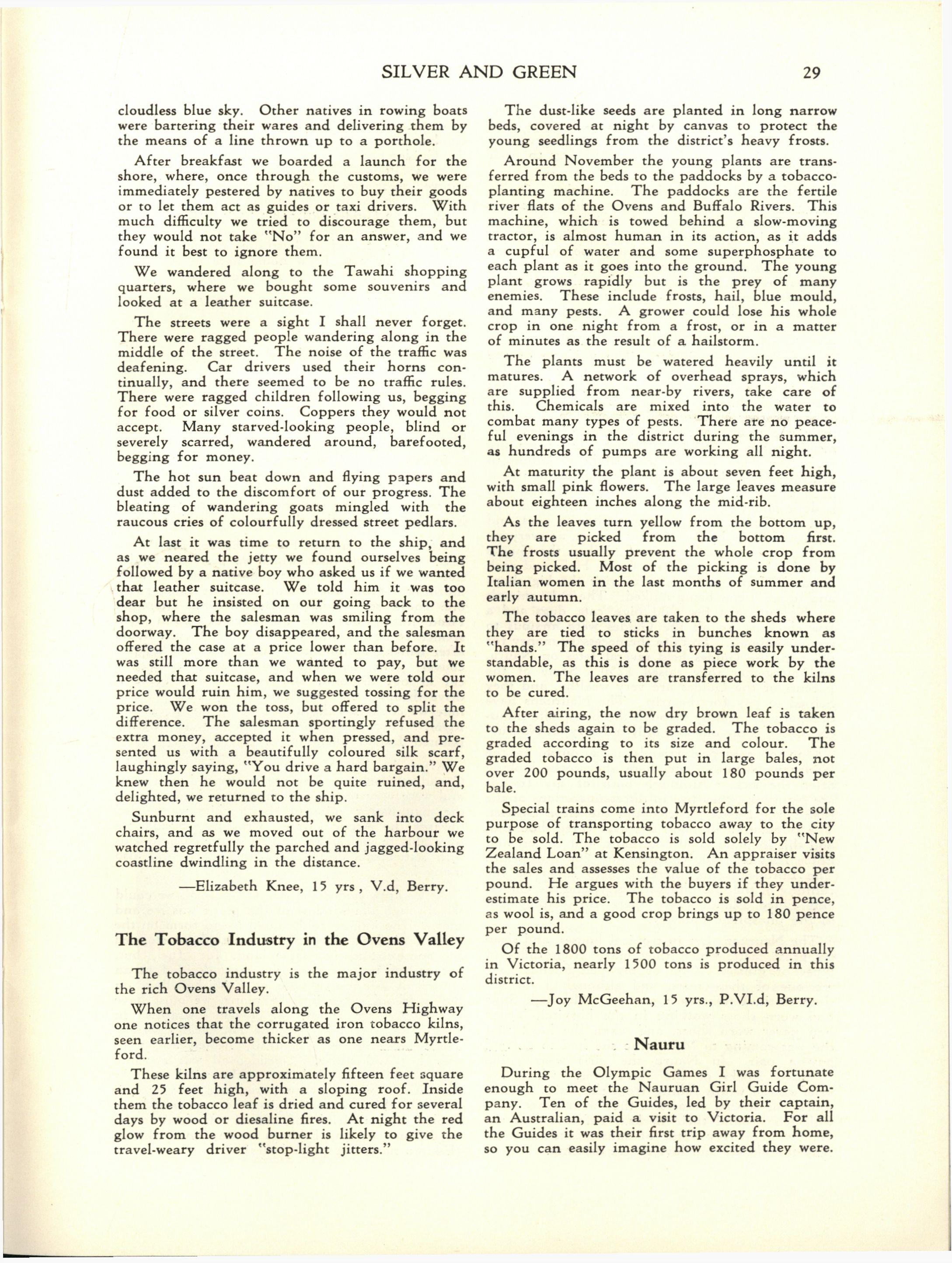
The tobacco industry is the major industry of the rich Ovens Valley.
When one travels along the Ovens Highway one notices that the corrugated iron tobacco kilns, seen earlier, become thicker as one nears Myrtle ford
These kilns are approximately fifteen feet square and 25 feet high, with a sloping roof Inside them the tobacco leaf is dried and cured for several days by wood or diesaline fires. At night the red glow from the wood burner is likely to give the travel-weary driver "stop-light jitters."
Of the 1800 tons of tobacco produced annually in Victoria, nearly 1500 tons is produced in this district.
—Joy McGeehan, 15 yrs., P.VI.d, Berry.
During the Olympic Games I was fortunate enough to meet the Nauruan Girl Guide Com pany Ten of the Guides, led by their captain, an Australian, paid a visit to Victoria. For all the Guides it was their first trip away from home, so you can easily imagine how excited they were.
I became very friendly with two of the Guides, and have been writing to them ever since they visited us The names of my two pen friends are Silva and Verna, and we enjoy writing to each other.
On the small island of Nauru, twelve miles in circumference, there are various clubs, but the main ones are Scouting and Guiding Scouting has been in operation on and off for the last twenty years. At the Scout Jamboree in Victoria some of the Naruan Scouts were present. Guide Companies were in existence before the war, then disbanded, and formed again in 1954 by an Australian. There are now fifty members in the Company The average age of the Guides is six teen, which is slightly higher than the average age of Australian Guides. The uniform of the Guides is similar to ours. They wear a bright blue dress, with matching sockettes, and ribbons around their heads. The Guides do not wear ties, as the weather is too hot, but wear scarves around their necks, like our camp scarves The Guide meetings are held on the beach, and these are much the same as ours, with slight variations to suit the girls and the climate. Although the island is so small, the Guides do go camping, and this is done about twice a year. The badges and tests that the Guides may pass are similar to ours, and my two friends had swimming badges, as everyone in Nauru is a good swimmer When the Guides visited us they camped in a Guide Hall, and each Guide had two ambitions—to visit the big shops and to see a cow being milked The only animals on Nauru are a few wild pigs, cats, dogs and a few chickens, so all the Guides were anxious to see our animals To raise the necessary money for the trip, the Guides held several fetes on Nauru, and altogether they raised £250. Some of the parents of the Guides are very wealthy, and they helped to pay for the trip The Nauruans have become very wealthy through the phosphate indus try, which is the one and only industry on Nauru.
One of my pen friends is a nurse at the Nauruan Hospital, and here she works looking after the sick Although both of my friends are Nauruans, they live in different sections of the island, the Buada District and the Groe District. The population of Nauru is over three thousand, and this includes 2000 Nauruans, 400 Gilbert and Ellice Islanders, 400 Chinese, and 200 Europeans. The Europeans are there to help supervise the running of the phosphate industry, and the Gilbert and Ellice Islanders are there for employment in the phosphate industry.
The Nauruans live in tropical houses, and sleep on grass mats, which they make from different types of grasses. One of my pen friends gave me one of these mats, and although I do not sleep on it, I treasure it greatly Although Silva had worn shoes working in the hospital, Verna had never worn shoes, and when she knew that she was coming to Melbourne she had to go and buy a pair. In Nauru the girls wear gaily coloured frocks or the "lava-lavas," which are brief cotton wraps falling from the waist Some times, for special occasions, they wear grass skirts with leis around their necks. I found that the Guides were very fond of music, and they all play the ukelele and love native dancing
The distance from Melbourne to Nauru is about 2300 miles, and this was a long trip for the Guides Although there is an airfield at Nauru, the Guides had to travel by a boat, which is run by the Phosphate Commission. The Guides enjoyed their stay in Melbourne, and all of them went back home to save up and come back again Perhaps the Guides will come back again, because the phosphate industry, on which Nauru depends, is running out, and as Australia "created" Nauru there will have to be a home here in Australia for the Nauruans in the next few years.
—Wendy Veitch, 16 yrs., P.VI.b, Cato.
Vast changes in temperature in addition to vast changes of scenery are observed on a flying trip to London via Fiji, Honolulu, Vancouver and the Arctic Circle route.
In May, 1956, it was my good fortune to travel this way to London As it was my birthday the day we crossed the International Date Line, and as we were flying northwards, there were two May the seventeenths, the day of my birthday.
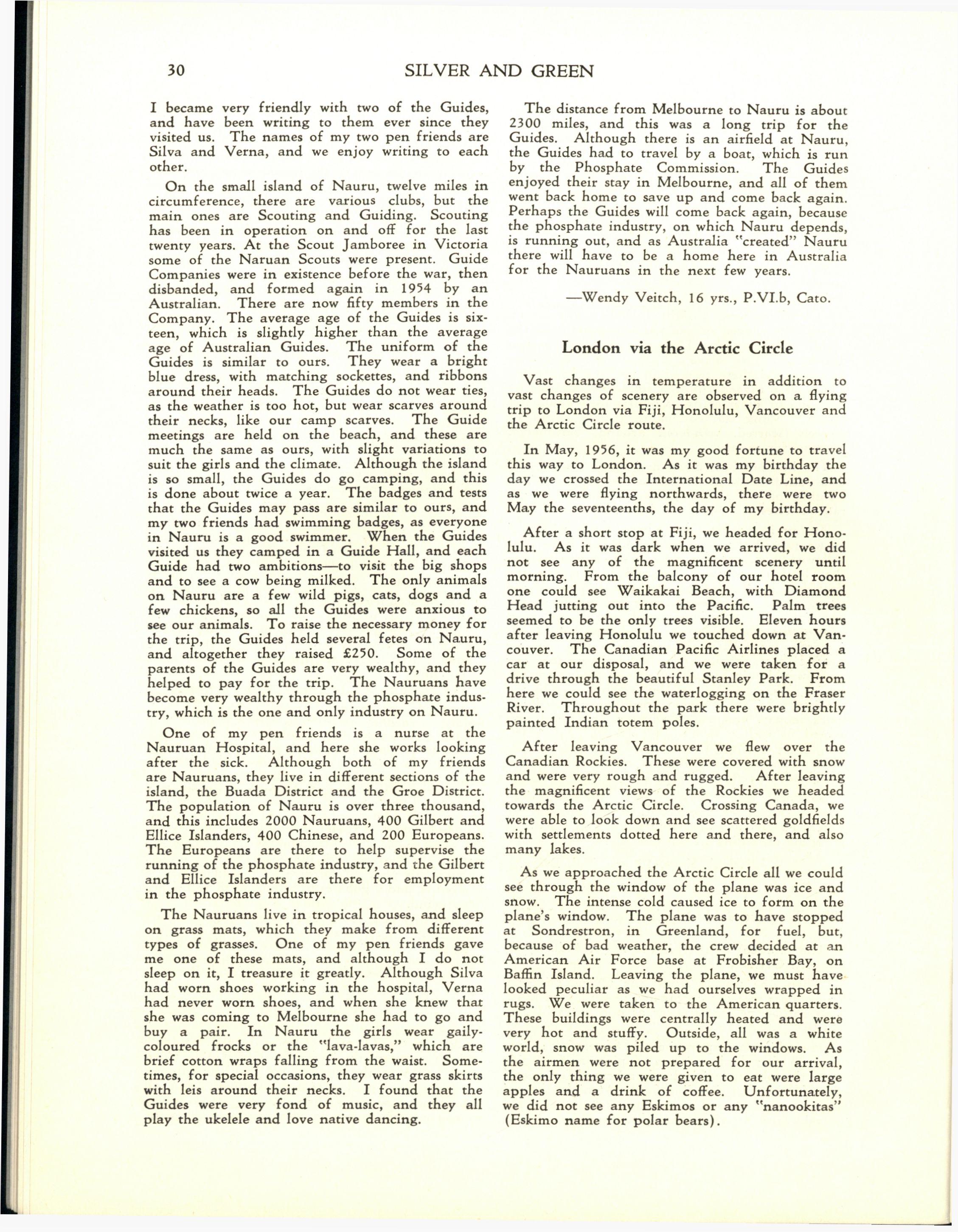
After a short stop at Fiji, we headed for Hono lulu. As it was dark when we arrived, we did not see any of the magnificent scenery until morning. From the balcony of our hotel room one could see Waikakai Beach, with Diamond Head jutting out into the Pacific Palm trees seemed to be the only trees visible. Eleven hours after leaving Honolulu we touched down at Van couver. The Canadian Pacific Airlines placed a car at our disposal, and we were taken for a drive through the beautiful Stanley Park. From here we could see the waterlogging on the Fraser River Throughout the park there were brightly painted Indian totem poles.
After leaving Vancouver we flew over the Canadian Rockies These were covered with snow and were very rough and rugged. After leaving the magnificent views of the Rockies we headed towards the Arctic Circle Crossing Canada, we were able to look down and see scattered goldfields with settlements dotted here and there, and also many lakes.
As we approached the Arctic Circle all we could see through the window of the plane was ice and snow. The intense cold caused ice to form on the plane's window. The plane was to have stopped at Sondrestron, in Greenland, for fuel, but, because of bad weather, the crew decided at an American Air Force base at Frobisher Bay, on Baffin Island. Leaving the plane, we must have looked peculiar as we had ourselves wrapped in rugs. We were taken to the American quarters. These buildings were centrally heated and were very hot and stuffy Outside, all was a white world, snow was piled up to the windows. As the airmen were not prepared for our arrival, the only thing we were given to eat were large apples and a drink of coffee Unfortunately, we did not see any Eskimos or any "nanookitas" (Eskimo name for polar bears).
In the air once more, we started our meal as the sun set. Half an hour later, as we finished our meal, the sun was rising again
Soon we were crossing the north of Scotland, and then the tulip fields of Holland. After landing at Amsterdam, a K.L.M plane took us the short distance to London—our destination
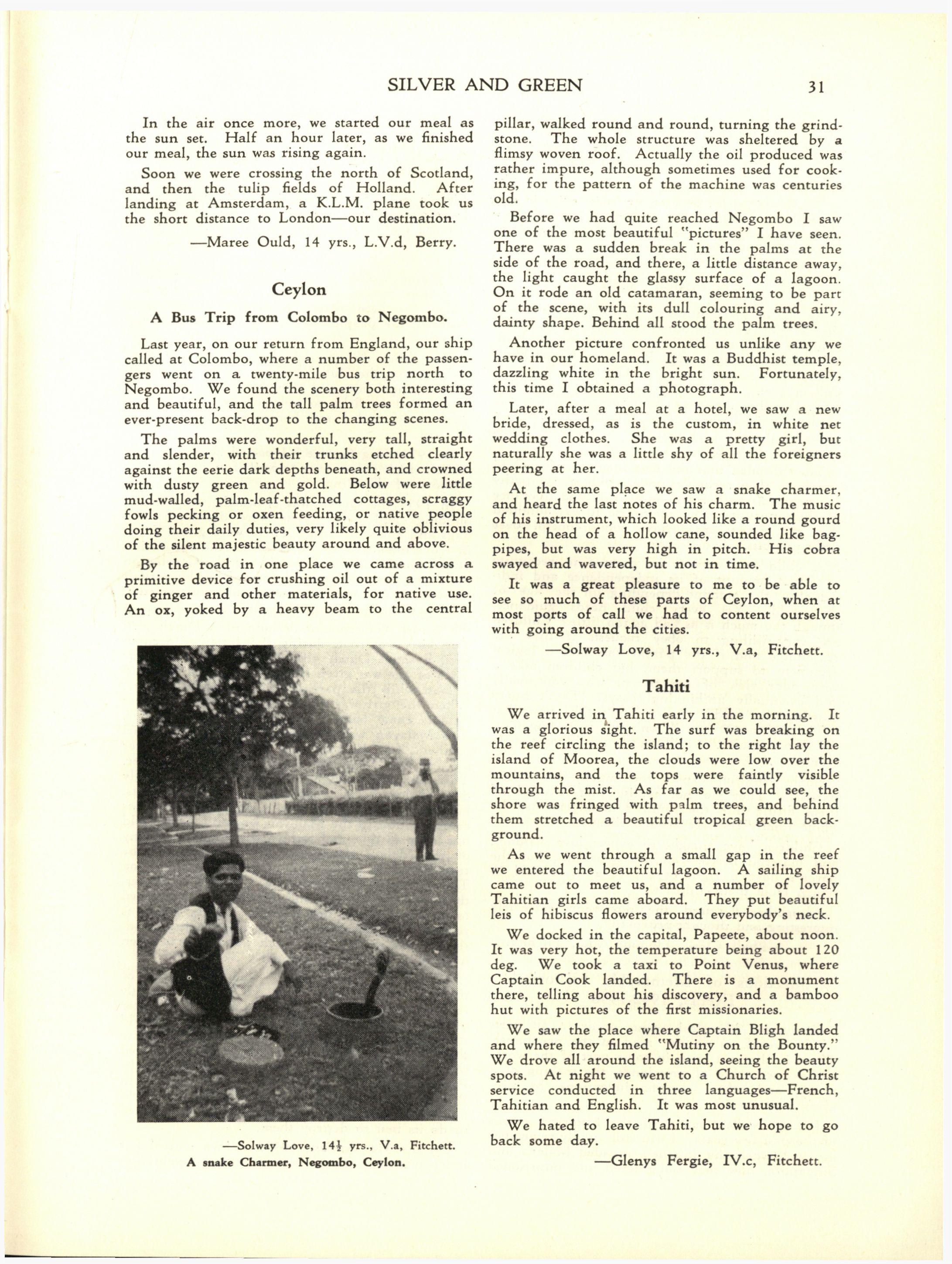
—Maree Ould, 14 yrs., L.V.d, Berry.
Last year, on our return from England, our ship called at Colombo, where a number of the passen gers went on a twenty-mile bus trip north to Negombo. We found the scenery both interesting and beautiful, and the tall palm trees formed an ever-present back-drop to the changing scenes.
The palms were wonderful, very tall, straight and slender, with their trunks etched clearly against the eerie dark depths beneath, and crowned with dusty green and gold. Below were little mud-walled, palm-leaf-thatched cottages, scraggy fowls pecking or oxen feeding, or native people doing their daily duties, very likely quite oblivious of the silent majestic beauty around and above.
By the road in one place we came across a primitive device for crushing oil out of a mixture of ginger and other materials, for native use. An ox, yoked by a heavy beam to the central
pillar, walked round and round, turning the grind stone. The whole structure was sheltered by a flimsy woven roof Actually the oil produced was rather impure, although sometimes used for cook ing, for the pattern of the machine was centuries old.
Before we had quite reached Negombo I saw one of the most beautiful "pictures" I have seen There was a sudden break in the palms at the side of the road, and there, a little distance away, the light caught the glassy surface of a lagoon On it rode an old catamaran, seeming to be part of the scene, with its dull colouring and airy, dainty shape. Behind all stood the palm trees.
Another picture confronted us unlike any we have in our homeland It was a Buddhist temple, dazzling white in the bright sun. Fortunately, this time I obtained a photograph.
Later, after a meal at a hotel, we saw a new bride, dressed, as is the custom, in white net wedding clothes. She was a pretty girl, but naturally she was a little shy of all the foreigners peering at her
At the same place we saw a snake charmer, and heard the last notes of his charm The music of his instrument, which looked like a round gourd on the head of a hollow cane, sounded like bag pipes, but was very high in pitch His cobra swayed and wavered, but not in time.
It was a great pleasure to me to be able to see so much of these parts of Ceylon, when at most ports of call we had to content ourselves with going around the cities.
—Solway Love, 14 yrs., V.a, Fitchett.
We arrived in Tahiti early in the morning. It was a glorious sight The surf was breaking on the reef circling the island; to the right lay the island of Moorea, the clouds were low over the mountains, and the tops were faintly visible through the mist As far as we could see, the shore was fringed with palm trees, and behind them stretched a beautiful tropical green back ground.
As we went through a small gap in the reef we entered the beautiful lagoon A sailing ship came out to meet us, and a number of lovely Tahitian girls came aboard. They put beautiful leis of hibiscus flowers around everybody's neck.
We docked in the capital, Papeete, about noon. It was very hot, the temperature being about 120 deg. We took a taxi to Point Venus, where Captain Cook landed There is a monument there, telling about his discovery, and a bamboo hut with pictures of the first missionaries.
We saw the place where Captain Bligh landed and where they filmed "Mutiny on the Bounty." We drove all around the island, seeing the beauty spots. At night we went to a Church of Christ service conducted in three languages—French, Tahitian and English It was most unusual
We hated to leave Tahiti, but we hope to go back some day.
—Glenys Fergie, IV.c, Fitchett.
It was decided to incorporate this section in our magazine in order to encourage interest in current events We hope that girls from Honour Sixth to Junior Forms will be encouraged to write of the problems of youth, controversial subjects in the community, as well as the more amusing comments and grouches on work, pleasure and interests
As one of the features of Child Welfare Week, the School was honoured in having its Joint Senior Prefect, Lynette Tabart, speak on television. With Alison Smith (MacRobertson Girls' High School), George Freynar (Christian Brothers' College), and Graeme Withers (Melbourne High School), she discussed the topic, "What the Modern Child Expects of its Parents," for half an hour, by the end of which they had reached some interesting conclusions
They decided that the first requisite of a child was love, then secondly understanding, sympathy for problems both small and large, and tolerance of their pursuits. But of course it was admitted that the parent must have some control over these pursuits.
A child also expects its parents to recognise a certain amount of its independence and indi viduality, the amount depending on the age of the child. Yet every child needs guidance, though too much is as bad as too little. Children are very willing to obey requests if they are reasonable and if the parent can give a logical argument to support them, but children take a very poor view of the parent who continually and eventually unthinkingly says: "Don't hurry crossing the road." "Don't take your hat off in the rain." . . . "Don't put your finger on the wet paint." . . . "Don't . . . "Don't . . . Don't." . . .
Some children expect too much from their parents. They do not realise that, instead of them fitting into the family's arrangements, the whole family revolves around them.
Children have a right to expect love, wisdom, and material needs from their parents, but the parents have a right to expect a great deal in return from their children.
Altogether I found the discussion extremely interesting and thought-provoking —Rhyll Clark, Honour Vl.a, Fitchett.
Every day historical events occur in all parts of the world, as we can read in the newspaper There is always a crisis in some part of the world —the discovering of new lands, the making of a treaty, and other scientific inventions, by pro gressive nations
I can recollect many of the historical events of the past few years. I can still vividly remember in 1942, when the Japanese invaded Malaya and Singapore, how they slaughtered and imprisoned
the people without mercy. Many happy families were thus broken and people lived in fear and hunger for three years. At last the Japanese were defeated, the people rejoiced and celebrated their release.
Then came the time when the Duchess of Kent and her son, the Duke of Kent, visited Singapore. All the school boys and girls danced square dances in the Padang field, to welcome her. She was a lovely lady, and I saw her as she passed by us in a car.
In 1952 King George VI passed away. All the schools and shops were closed for one day in memory of the King.
In 1953 the Queen was crowned. All the big buildings and busy streets were decoratcd with flags and coats of arms. There were grand feasts in Government House to celebrate the coronation of the Queen. During the day of the Coronation there were long processions formed by the various Chinese, Indian and European clubs and societies
In 1950 the Malays in Singapore rebelled against the British Government because of a Dutch girl. The story was that, during the Japanese occupa tion, a small Dutch girl of about three or four years of age was given into the care of a Malayan woman while the parents were prisoners of war When the girl was about thirteen years old her parents came back from Holland to claim her. The Malayan woman refused to return the girl to them, for she said that she had brought her up and had cared for her as her own daughter This case was brought to court. It was finally decided that the girl should go back to the parents, but that they should give a sum of money as compensation to the Malayan woman She would not listen to this, and wanted the girl back Many of the Malays sided with her, so some of the trouble-makers took this opportunity to riot. There were riots everywhere. Finally, however, the trouble was settled, and the Dutch girl returned to Holland with her parents This event is recorded because there was much shameful blood shed in the rioting, and much publicity was given it both at home and abroad
In 1956, Chin Ping, the secretary of the Communist Party, came out from the jungle to have a peaceful talk with the chief minister of Malaya, Tenku Abdul Rahman. He would stop fighting if the government would recognise the Communist Party The chief minister refused this request, as he would not allow this Communist Party in Malaya. The talks ended, and Chin Ping returned to the jungle, saying that he would fight to the end The Government was determined to do its best to destroy them
On the 31st August, 1957, Malaya gained her independence There was a grand celebration
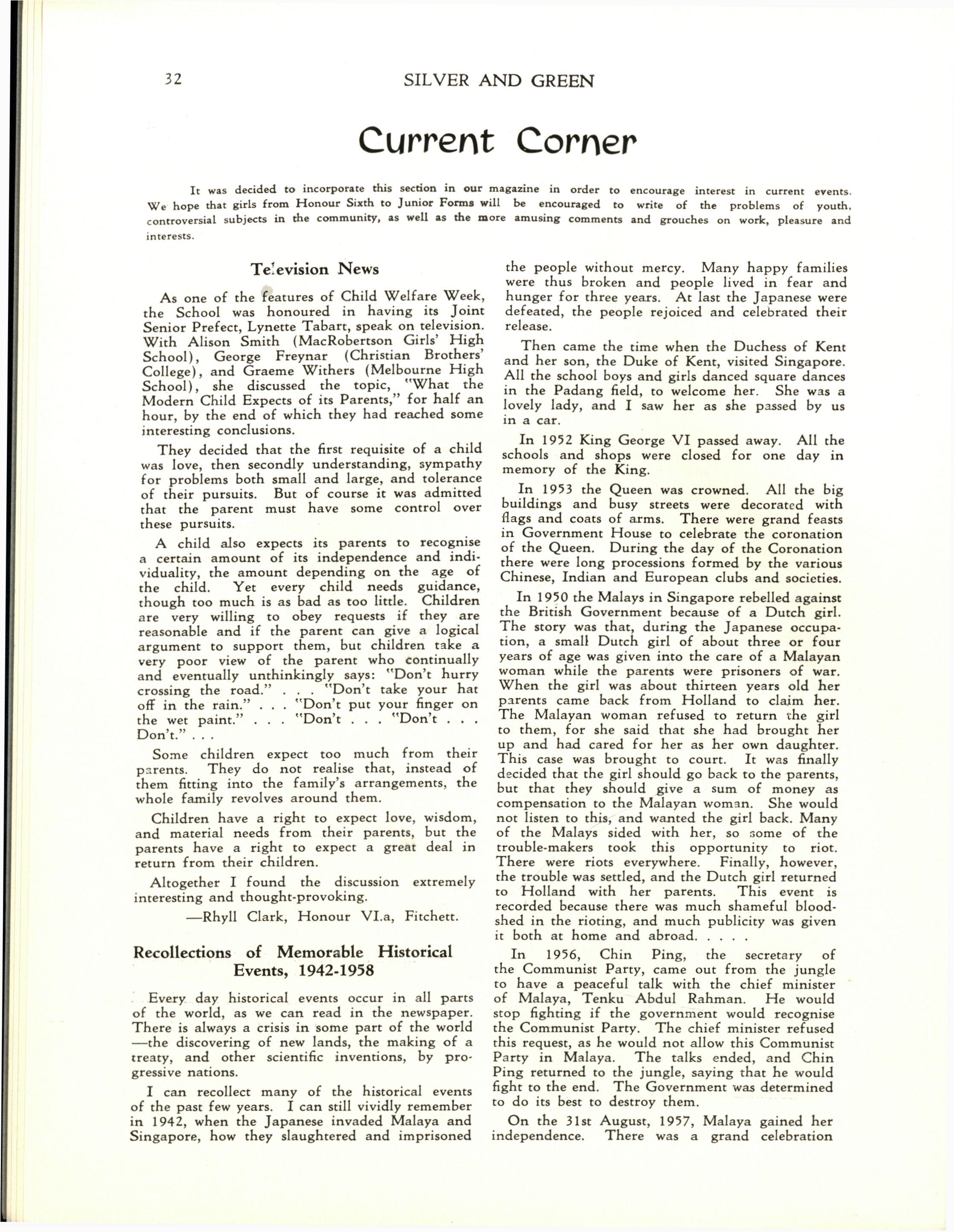
over this. Representatives from over sixty coun tries were invited to attend the ceremonies
When the Queen Mother visited Australia I caught a glimpse of her as the car came out from Government House. She is a very charming lady.
It is interesting to have lived in two countries and through historical events in both places.
—LilieLai, Hon VI.c, Cato
Although we Chinese also live in the age of rock and roll, many of the old customs have still been kept. The "blind marriage," in which the bride and bridegroom meet for the first time on the day of the wedding, has been dropped. But the "matchmaking marriage" is still carried on in many parts of China.
When a young man reaches marriageable age (about 20 to 21 years), steps are taken to choose him a suitable bride, generally a girl of eighteen or nineteen A "moi yen," or woman match maker, will come knocking at the door with the information that such-and-such a young man in such-and-such a family is looking for a wife.
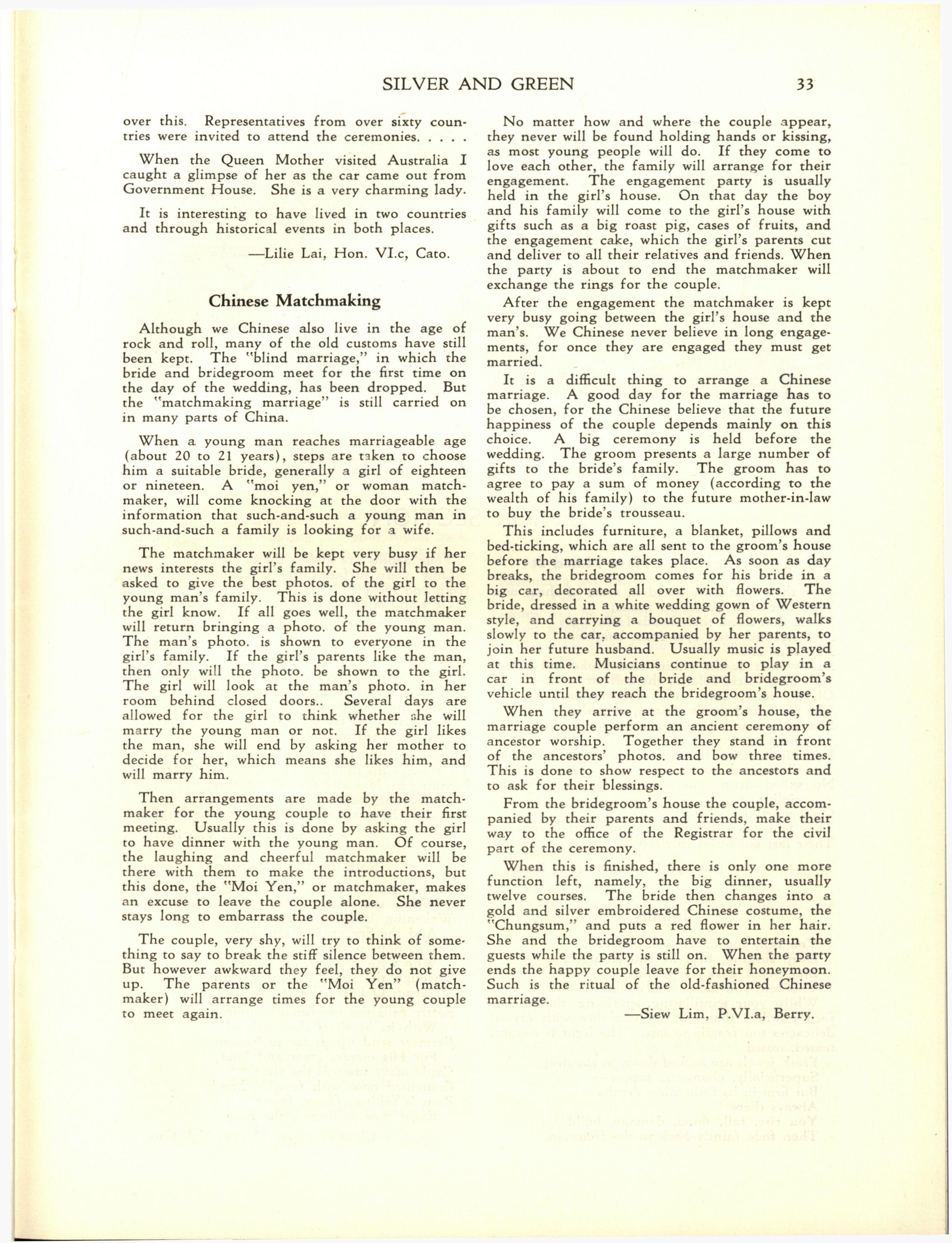
The matchmaker will be kept very busy if her news interests the girl's family. She will then be asked to give the best photos, of the girl to the young man's family. This is done without letting the girl know If all goes well, the matchmaker will return bringing a photo, of the young man. The man's photo, is shown to everyone in the girl's family. If the girl's parents like the man, then only will the photo, be shown to the girl The girl will look at the man's photo, in her room behind closed doors.. Several days are allowed for the girl to think whether she will marry the young man or not. If the girl likes the man, she will end by asking her mother to decide for her, which means she likes him, and will marry him.
Then arrangements are made by the match maker for the young couple to have their first meeting. Usually this is done by asking the girl to have dinner with the young man Of course, the laughing and cheerful matchmaker will be there with them to make the introductions, but this done, the "Moi Yen," or matchmaker, makes an excuse to leave the couple alone She never stays long to embarrass the couple
The couple, very shy, will try to think of some thing to say to break the stiff silence between them. But however awkward they feel, they do not give up The parents or the "Moi Yen" (match maker) will arrange times for the young couple to meet again.
No matter how and where the couple appear, they never will be found holding hands or kissing, as most young people will do If they come to love each other, the family will arrange for their engagement. The engagement party is usually held in the girl's house. On that day the boy and his family will come to the girl's house with gifts such as a big roast pig, cases of fruits, and the engagement cake, which the girl's parents cut and deliver to all their relatives and friends. When the party is about to end the matchmaker will exchange the rings for the couple
After the engagement the matchmaker is kept very busy going between the girl's house and the man's. We Chinese never believe in long engage ments, for once they are engaged they must get married
It is a difficult thing to arrange a Chinese marriage A good day for the marriage has to be chosen, for the Chinese believe that the future happiness of the couple depends mainly on this choice. A big ceremony is held before the wedding. The groom presents a large number of gifts to the bride's family The groom has to agree to pay a sum of money (according to the wealth of his family) to the future mother-in-law to buy the bride's trousseau.
This includes furniture, a blanket, pillows and bed-ticking, which are all sent to the groom's house before the marriage takes place. As soon as day breaks, the bridegroom comes for his bride in a big car, decorated all over with flowers. The bride, dressed in a white wedding gown of Western style, and carrying a bouquet of flowers, walks slowly to the car. accompanied by her parents, to join her future husband Usually music is played at this time Musicians continue to play in a car in front of the bride and bridegroom's vehicle until they reach the bridegroom's house.
When they arrive at the groom's house, the marriage couple perform an ancient ceremony of ancestor worship. Together they stand in front of the ancestors' photos, and bow three times. This is done to show respect to the ancestors and to ask for their blessings
From the bridegroom's house the couple, accom panied by their parents and friends, make their way to the office of the Registrar for the civil part of the ceremony.
When this is finished, there is only one more function left, namely, the big dinner, usually twelve courses. The bride then changes into a gold and silver embroidered Chinese costume, the "Chungsum," and puts a red flower in her hair She and the bridegroom have to entertain the guests while the party is still on. When the party ends the happy couple leave for their honeymoon. Such is the ritual of the old-fashioned Chinese marriage.
—Siew Lim, P.VI.a, Berry.
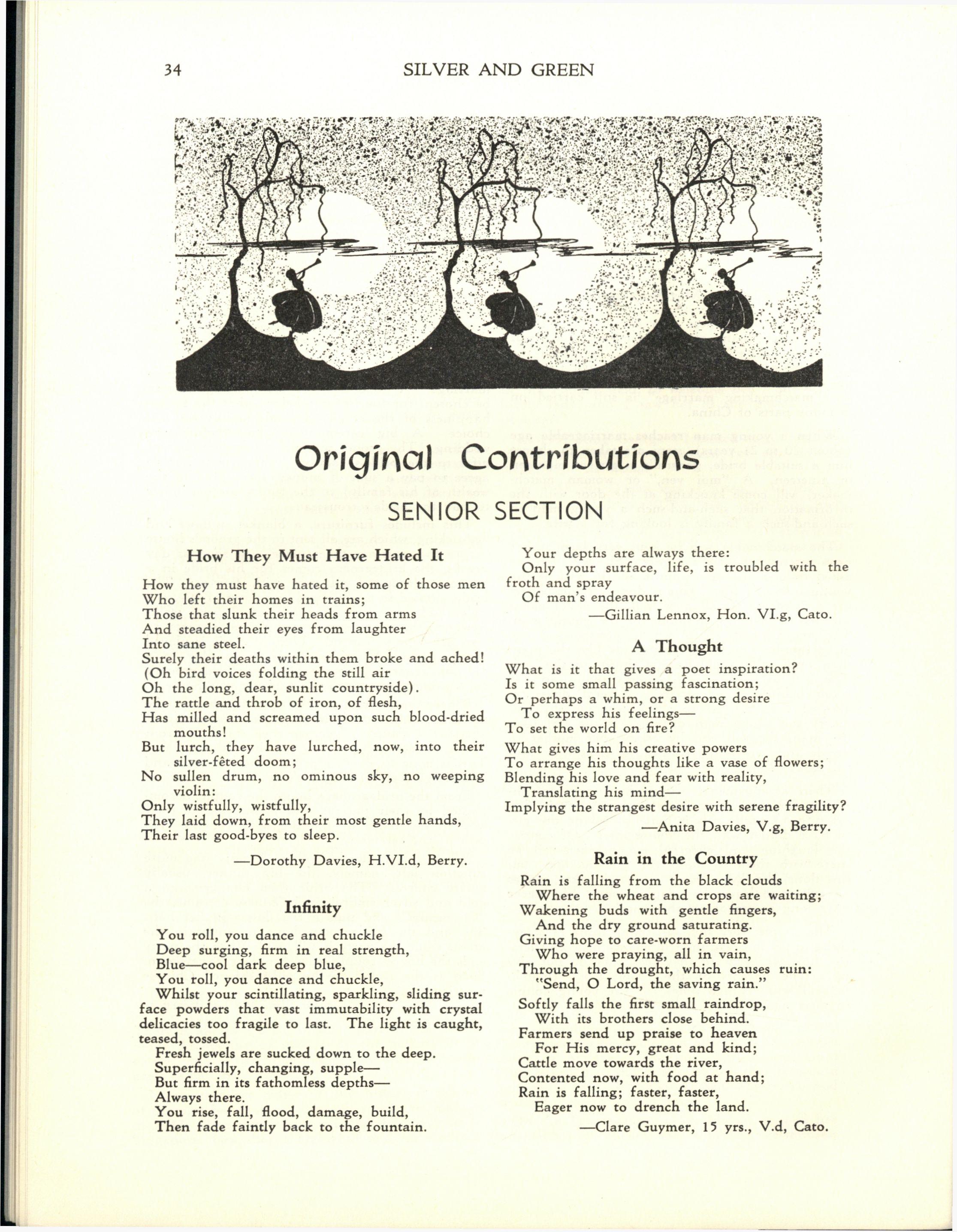
How they must have hated it, some of those men Who left their homes in trains; Those that slunk their heads from arms And steadied their eyes from laughter Into sane steel.
Surely their deaths within them broke and ached! (Oh bird voices folding the still air Oh the long, dear, sunlit countryside). The rattle and throb of iron, of flesh, Has milled and screamed upon such blood-dried mouths!
But lurch, they have lurched, now, into their silver-feted doom; No sullen drum, no ominous sky, no weeping violin:
Only wistfully, wistfully, They laid down, from their most gentle hands, Their last good-byes to sleep
—Dorothy Davies, H.VI.d, Berry
You roll, you dance and chuckle Deep surging, firm in real strength, Blue—cool dark deep blue, You roll, you dance and chuckle, Whilst your scintillating, sparkling, sliding sur face powders that vast immutability with crystal delicacies too fragile to last. The light is caught, teased, tossed
Fresh jewels are sucked down to the deep Superficially, changing, supple— But firm in its fathomless depths— Always there.
You rise, fall, flood, damage, build, Then fade faintly back to the fountain.
Your depths are always there: Only your surface, life, is troubled with the froth and spray Of man's endeavour.
—Gillian Lennox, Hon. VI.g, Cato.
What is it that gives a poet inspiration? Is it some small passing fascination; Or perhaps a whim, or a strong desire To express his feelings— To set the world on fire? What gives him his creative powers To arrange his thoughts like a vase of flowers; Blending his love and fear with reality, Translating his mind— Implying the strangest desire with serene fragility?
—Anita Davies, V.g, Berry.
Rain in the Country
Rain is falling from the black clouds Where the wheat and crops are waiting; Wakening buds with gentle fingers, And the dry ground saturating Giving hope to care-worn farmers Who were praying, all in vain, Through the drought, which causes ruin: "Send, O Lord, the saving rain."
Softly falls the first small raindrop, With its brothers close behind. Farmers send up praise to heaven For His mercy, great and kind; Cattle move towards the river, Contented now, with food at hand; Rain is falling; faster, faster, Eager now to drench the land.
—Clare Guymer, 15 yrs., V.d, Cato
Out of such grief as I have known—Oh, what's the good?
Out of such grief, perhaps, I could lend this resignation
(Sings the bird-flower, snowdrop, white and thick Chalked against the fence.)
Must I try? Oh, can't you see: I know this is lost mumbling to you, choked under the earth.
Hands, arms, feet, oh our bodies, Perhaps we could pray (Were snowdrops ever whiter?)
No, I feel too sad, and God can't accept Not Him, not now . . .
What can I say? What is there to say? Warm flesh presses its poor comfort And surely the lights were sweet that shone but once for us!
I want to say these words: Before you spin down, in the dusk, and weary: Before you spin down to ashes, Before you spin down—I've forgotten now. Let us cling to this green grass, for Fear, fear as earth is turning!
If we could understand. If we could understand— Nothing, oh love! Nothing . . . your round back.
—Dorothy Davies, H.VI.d, 17 yrs., Berry.
Taken from the warm earth long ago, And placed upon this icy, windswept hill, Lonely, silent stones, do not despair, Picturesque, we find your grey walls still
But greater worth than beauty has your rock, It is a living monument of yesterday, Which reveals sad sorrow, long hours of toil, As men like monsters worked, their debt to pay
Human lives were wrecked, that you might stand, Tortured by cruelty, depraved by hate, Of soldiers who flatteringly thought themselves civilised, Crumble not grey walls, lest we forget their fate.
A desperate tale of broken hearts your granite tells, Of aching, bleeding backs which were heavy fee To pay, to rid the homeland of its ills, And smear with bloody stains our history.
—Rhyll Clark, Honour Vl.a, Fitchett.
The fever which springtime excites in the heart, That turbulent urge which bids winter depart, Has never in words more expressive been found, Than those of the pre. who said, "Let's clean out Pound!"
A wave of sheer horror surged through every breast At the thought of this conflict, proclaimed with such zest, But where duty was calling, they'd not turn and fly, They faced it like martyrs, with never a sigh
And with faces determined, they entered the fray, United they stood, till the end of the day, When the Comm. was quite spotless, as never before, And for once in their lives they could get in the door.
And the gymn bags and blouses and books and the rest, They piled in a cupboard and hoped for the best, And the purses and combs and shoes without laces, They poked into any convenient spaces.
But the problem remained: they couldn't stay there— A burden for Pres. of the future to bear. So a great consultation was held in the place A reward must be offered to settle the case!
So if you feel you're ready to tackle the task Of washing and ironing, you've only to ask. The reward will be yours, a fantastic prize, If you'll only move Pound from under our eyes!
—Janet Mclvor, Hon Vl.a, Cato
(With apologies to Lewis Carroll.)
"Will you walk a little faster?" said the Doctor to the School.
"Assembly's getting later, which is quite against my rule, Lessons will be shorter, which will start the day off wrong, So please see that in the future you do not take so long.
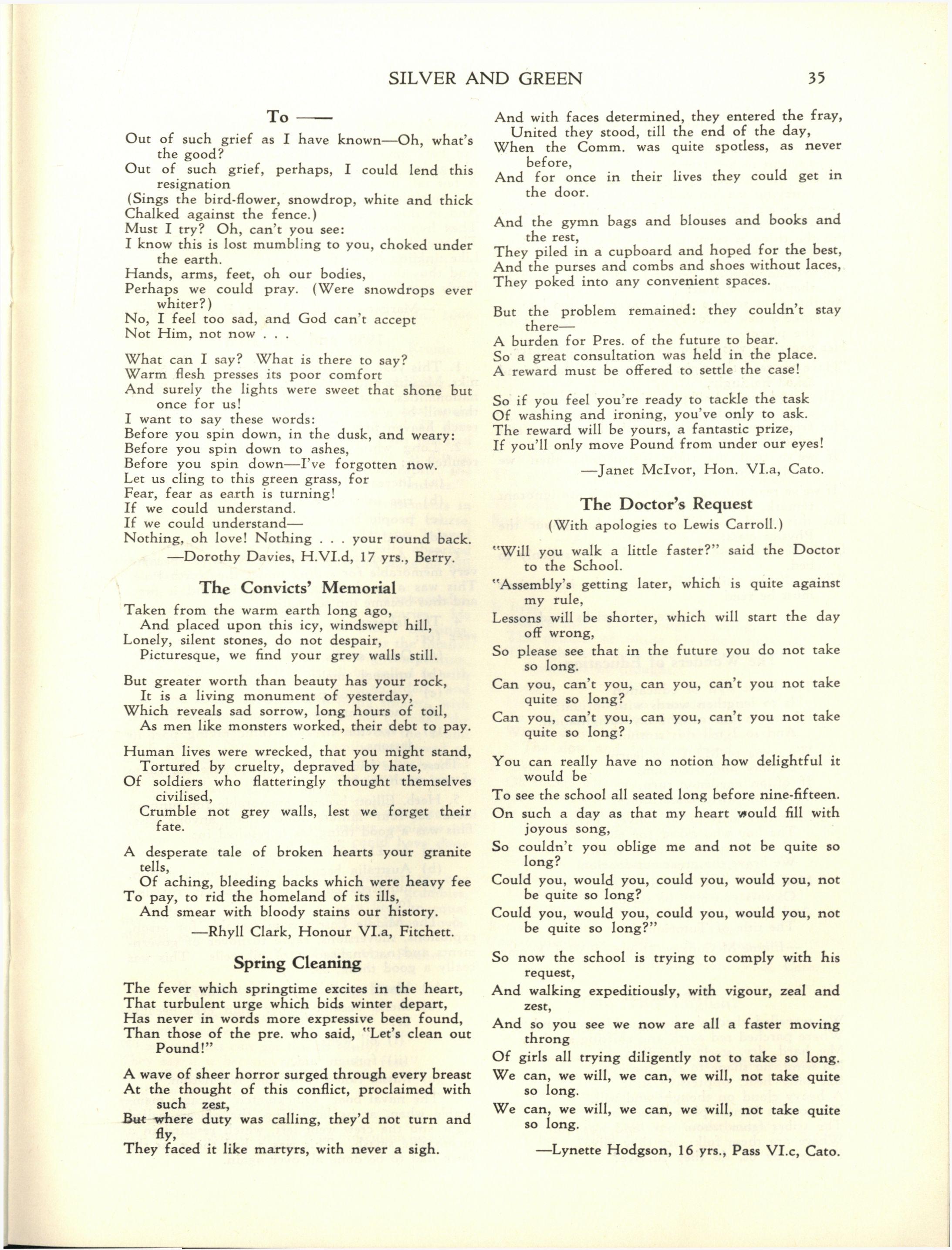
Can you, can't you, can you, can't you not take quite so long?
Can you, can't you, can you, can't you not take quite so long?
You can really have no notion how delightful it would be
To see the school all seated long before nine-fifteen On such a day as that my heart would fill with joyous song, So couldn't you oblige me and not be quite so long?
Could you, would you, could you, would you, not be quite so long?
Could you, would you, could you, would you, not be quite so long?"
So now the school is trying to comply with his request,
And walking expeditiously, with vigour, zeal and zest, And so you see we now are all a faster moving throng
Of girls all trying diligently not to take so long. We can, we will, we can, we will, not take quite so long
We can, we will, we can, we will, not take quite so long.
—Lynette Hodgson, 16 yrs., Pass VI.c, Cato
"Will you turn the current off now?" said a scientist to her friend, "There are ghastly popping noises which are worrying me 'no end', There's a strange solution forming which I know should not be there, But the thing is turning so red hot I'm sure that I don't dare!"
Her friend replied demurely that she thought they'd better wait: Anything for science and it never was too late To make a new discov'ry which would really rock the place:
Her eagerness was obvious all over her pale face. "Have we read the right instructions?" her friend asked haltingly, (The clock said half-past six, and she thought sadly of her tea),
Her friend was most sarcastic, the experiment still ailed, "If we've read the right instructions, then we surely have not failed."
"If we've read the right instructions"—an ignorant remark, But this need is sadly noticed throughout the Physics class; Don't be like these failures and creep sullenly to bed, When all else fails, oh scientists, the instructions must be read —Frustrated Fizzicks Student
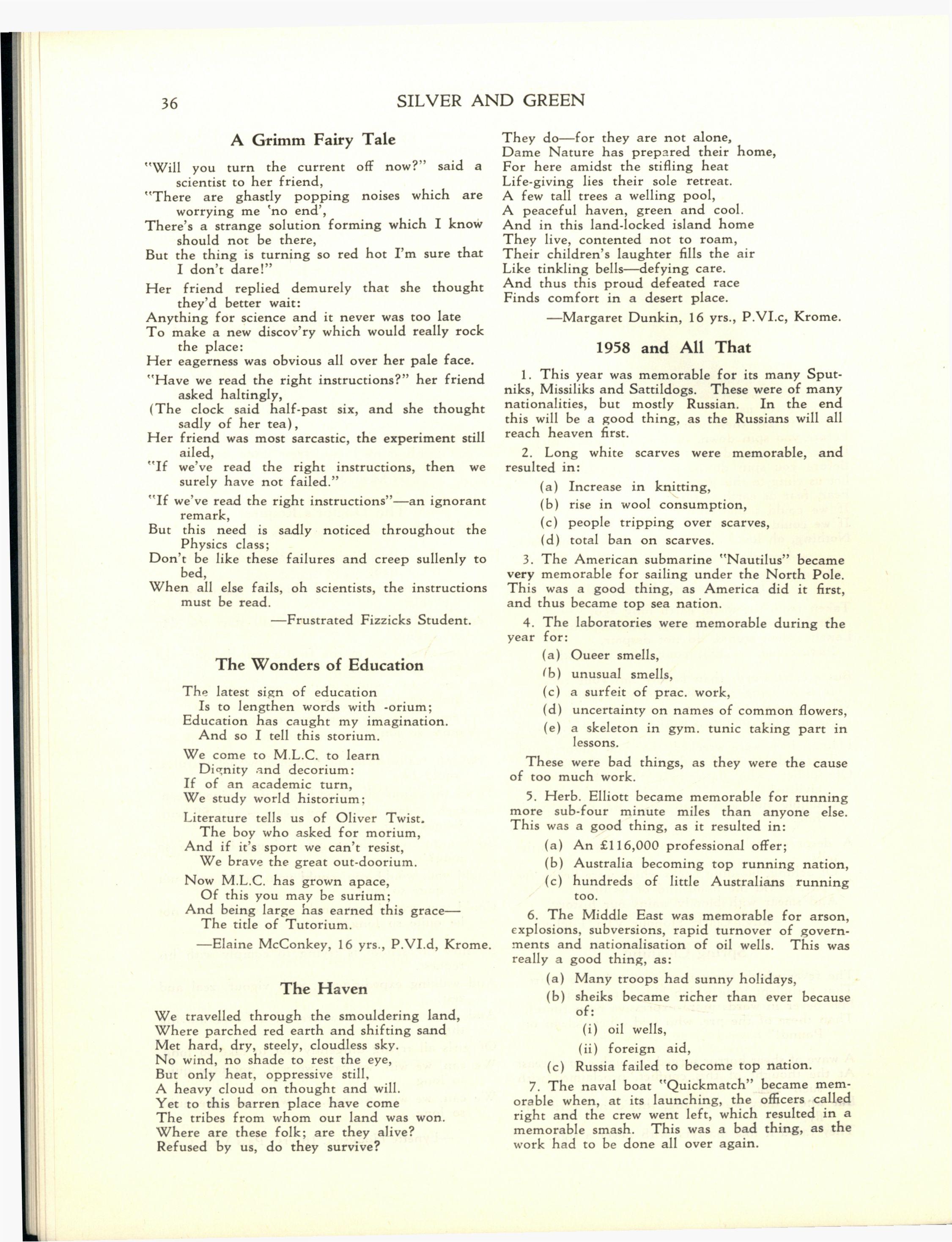
The latest sign of education Is to lengthen words with -orium; Education has caught my imagination. And so I tell this storium. We come to M.L.C to learn Dignity and decorium: If of an academic turn, We study world historium: Literature tells us of Oliver Twist. The boy who asked for morium, And if it's sport we can't resist, We brave the great out-doorium. Now M.L.C. has grown apace, Of this you may be surium; And being large has earned this grace— The title of Tutorium.
—Elaine McConkey, 16 yrs., P.VI.d, KromeWe travelled through the smouldering land, Where parched red earth and shifting sand Met hard, dry, steely, cloudless sky
No wind, no shade to rest the eye, But only heat, oppressive still, A heavy cloud on thought and will.
Yet to this barren place have come The tribes from whom our land was won Where are these folk; are they alive?
Refused by us, do they survive?
They do—for they are not alone, Dame Nature has prepared their home, For here amidst the stifling heat Life-giving lies their sole retreat A few tall trees a welling pool, A peaceful haven, green and cool And in this land-locked island home They live, contented not to roam, Their children's laughter fills the air Like tinkling bells—defying care. And thus this proud defeated race Finds comfort in a desert place.
—Margaret Dunkin, 16 yrs., P.VI.c, Krome
1 This year was memorable for its many Sput niks, Missiliks and Sattildogs. These were of many nationalities, but mostly Russian In the end this will be a good thing, as the Russians will all reach heaven first.
2. Long white scarves were memorable, and resulted in: (a) Increase in knitting, (b) rise in wool consumption, (c) people tripping over scarves, (d) total ban on scarves.
3. The American submarine "Nautilus" became very memorable for sailing under the North Pole. This was a good thing, as America did it first, and thus became top sea nation.
4 The laboratories were memorable during the year for:
(a) Oueer smells, 'b) unusual smells, (c) a surfeit of prac work, (d) uncertainty on names of common flowers, (e) a skeleton in gym. tunic taking part in lessons
These were bad things, as they were the cause of too much work.
5 Herb Elliott became memorable for running more sub-four minute miles than anyone else. This was a good thing, as it resulted in: (a) An £116,000 professional offer; (b) Australia becoming top running nation, (c) hundreds of little Australians running too
6 The Middle East was memorable for arson, explosions, subversions, rapid turnover of govern ments and nationalisation of oil wells This was really a good thing, as: (a) Many troops had sunny holidays, (b) sheiks became richer than ever because of:
(i) oil wells, (ii) foreign aid, (c) Russia failed to become top nation
7. The naval boat "Quickmatch" became mem orable when, at its launching, the officers called right and the crew went left, which resulted in a memorable smash. This was a bad thing, as the work had to be done all over again
1. Which do you consider the most important: Sputniks, missiliks, or sattildogs?? (Be explosive.)
2 Which were longer: White scarves, foreign aid, or the sub-four minute mile? Give answer in millimetres (Be exact.)
3. Discuss the importance of: Sheiks—Arabs or Lebanese. (Attempt only one.)
An inmate of the laboratory. (Avoid libel.)
4. What do you consider too much work? (Six reasons only.)
With apologies to Sellars and Yeatman, 1066 and all that.
—Jenny Seccombe, P.VI.b, KromeWhen the amateur photographer has spent many pounds on black and white, and 35 mm. slides, he decides that he is tired of his pictured forms being immobile, and he turns to almost the most expensive branch of photography, the 8 mm. colour films, usually known as "movies."
After following the classified advertisements in the paper, he buys a camera. Then, of course, he must have a new projector. Having "played at" this for a while, he becomes really absorbed in his hobby When he reaches this stage he will not turn back.
His next purchase in this field is a tape-recorder, on which he can record his commentaries He joins a movie club, and attends weekly meetings. Then comes a time of great tension for the family: his first competition. If it is a big competition, all his movie-making friends wll be called in with their records, record-players, tape-recorders, and even stop-watches. They also bring splicers, with which the film can be joined so as to make the story continuous. Then the work on the sound track starts None of the family is allowed to make any noise. If the dog next door barks (and he usually does), the whole tape must be wiped off and the work started again.
After all this, the family is towed along to see it shown, while the proud maker explains to anyone who will listen what he could have done if . . .
This is true, and I am a member of one long-suffering family, but, despite all my grumbles, I firmly believe that there is very little to equal the pleasure and amusement which home-movie making gives.
—Barbara Duke, V.a, Fitchett.Why is it that the poets nowadays Delight to make their lines a sort of maze Where students can get lost so easily? They say it is because they "wander free." But with our poems sprouting Like a tree, With many twigs and branches Growing free, And hiding rhymes in the most ridiculous spaces,
So that it's a curse to make up verse with rhyme and rhythm in the right places, Are we supposed to appreciate Contemporary verse When,
If read aloud, It merely sounds like very awkward prose?
—Suzanne Davies, 14 yrs., V.a, Fitchett.
The white clouds fled, the grey came on, Dark, with foreboding, The blue sky faded, those grey clouds lowered, Fierce and corroding
The storm raged past, the lightning flashed, Wild and exciting The thunder rolled, the mountains shook, Grotesque and delighting.
The rain stabbed down, the wind howled round, Ripping and rending. The timbers creaked, the trees bowed down, Swaying and bending
The sea rose higher, the waves rushed by, Crushing and hurling
The rocks beneath it gleamed awhile, Sucking and swirling.
—Alison Wylie, 15 yrs., V.b, Fitchett
It lives . . .
Not in itself, but through a being, The pattern of whose life she's weaving, Through her many moods expressing Antithesis of thought It laughs
Her many follies so amusing To one, with power of perceiving Whose duty, 'tis but of obeying The slow and faltering hand. It loves . . .
Oh think! The life that needs perfecting Life in which failure, so detecting, Is but a means of man's aspiring To reach another world It lies . . .
Somehow forgotten, ne'er a stirring Through the house, e'er dark is falling The impulse and the answered yearning. Despairing, she has gone But she will return, for that is fate Comes inspiration. What joy to create!
—Ann Tomlinson, Hon. VI.a, Cato.
Call This English?
"Hail to thee, my pupils," Miss Mitchell blithely said "To-morrow bring your cups and spoons, And you will all be fed. Someone kind has made us A 'good old' recipe (From Hardy's tale on 'Casterbridge'), A brew called furmity.
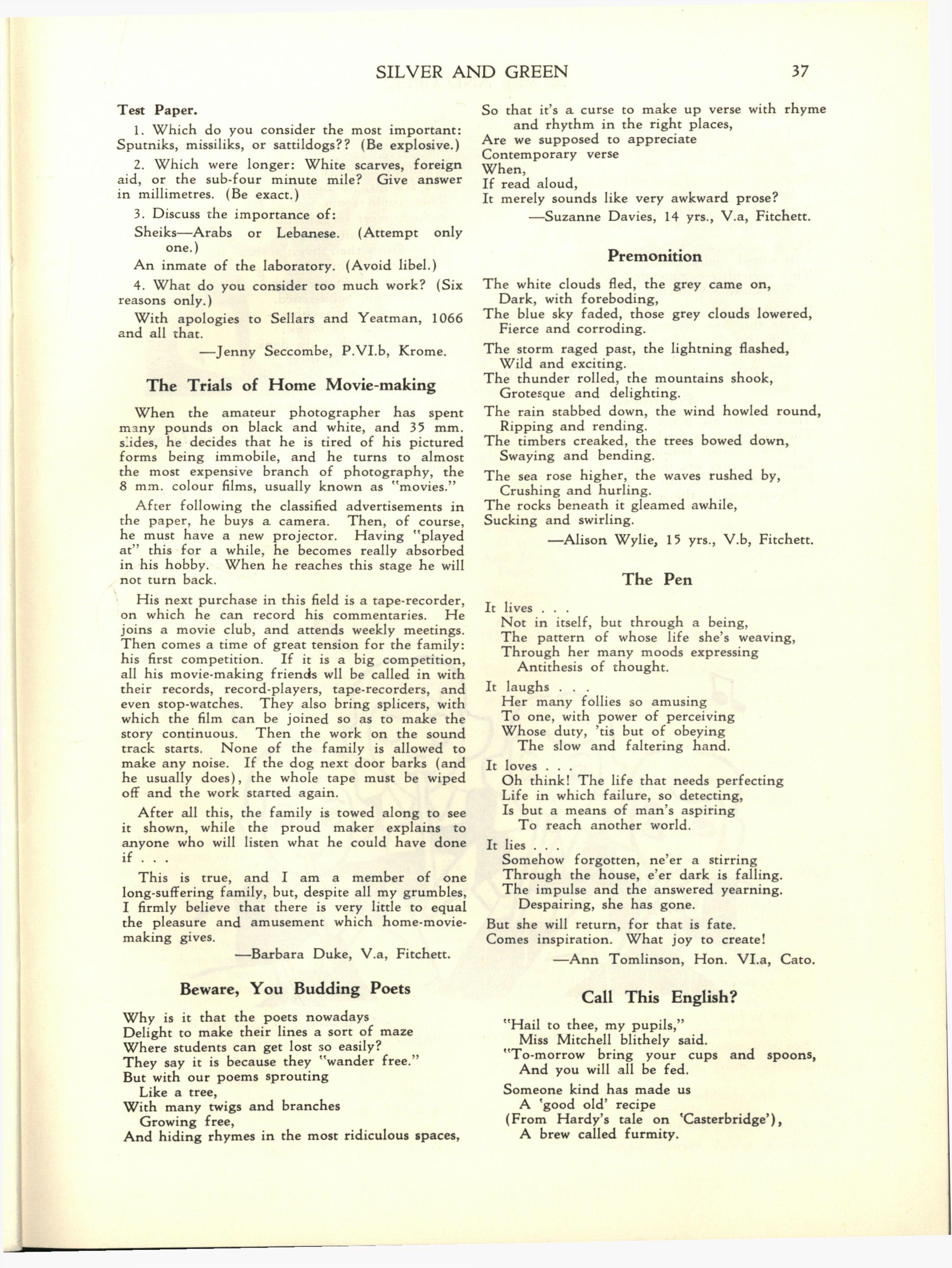
Our teacher did assure us That that which was to come Was not the same as Henchard drank, Because it had no rum.
The mistress, bold and gallant, Was first to make the test; Then came Marmie, Ros and Sue, And then came all the rest. Much to our amazement, It tasted "jolly good," This ancient, recommended "slop" Was quite a wholesome food.
Our thanks go to our teacher, For this fine recipe, Which she obtained for us to try, From Melbourne's —PaulinLibrary e Rosengarten, P.VI.b, Fitchett
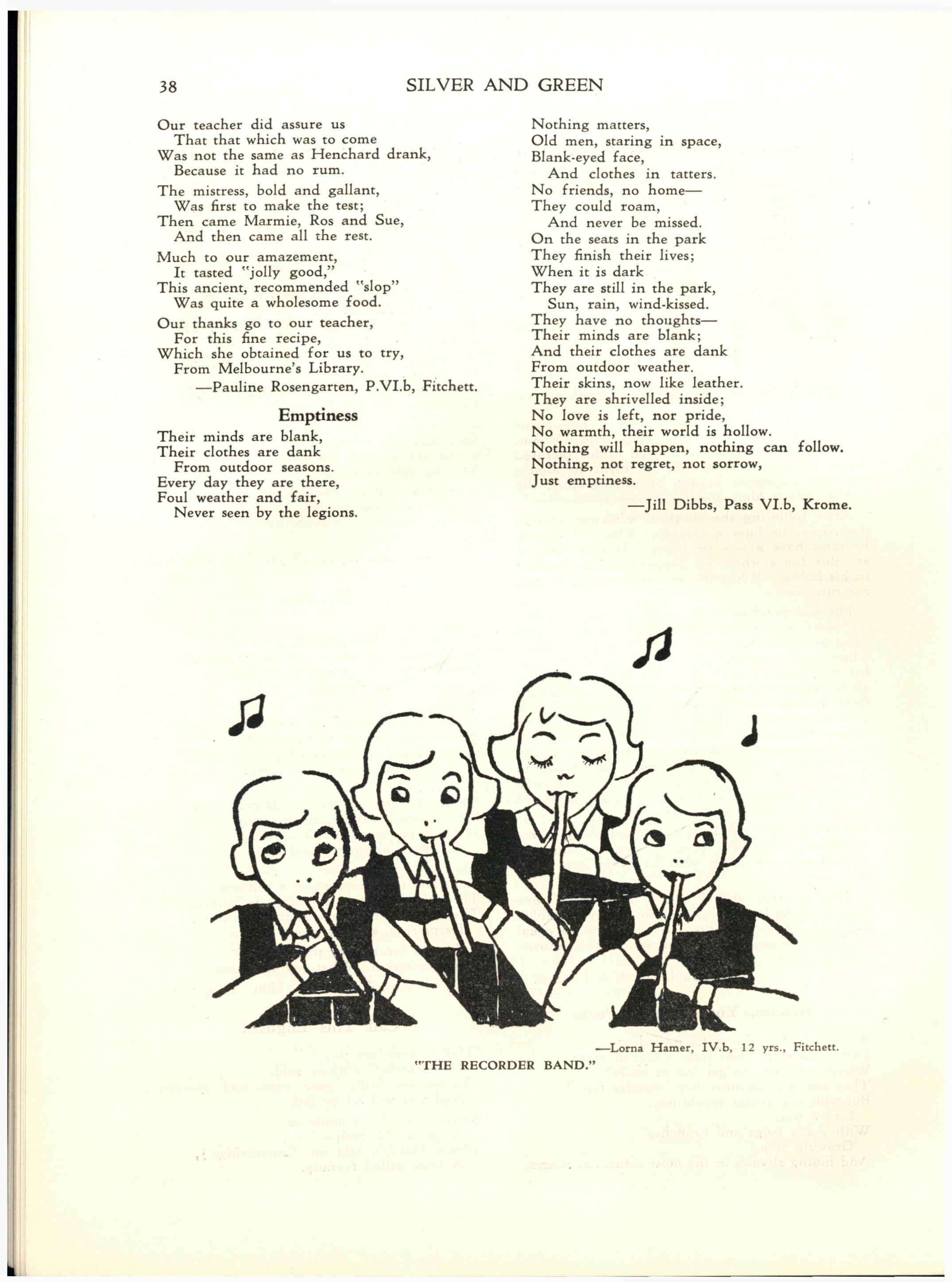
Their minds are blank, Their clothes are dank From outdoor seasons. Every day they are there, Foul weather and fair, Never seen by the legions.
Nothing matters, Old men, staring in space, Blank-eyed face, And clothes in tatters. No friends, no home— They could roam, And never be missed. On the seats in the park They finish their lives; When it is dark They are still in the park, Sun, rain, wind-kissed They have no thoughts— Their minds are blank; And their clothes are dank From outdoor weather. Their skins, now like leather They are shrivelled inside; No love is left, nor pride, No warmth, their world is hollow. Nothing will happen, nothing can follow. Nothing, not regret, not sorrow, Just emptiness.
—Jill Dibbs, Pass Vl.b, Krome
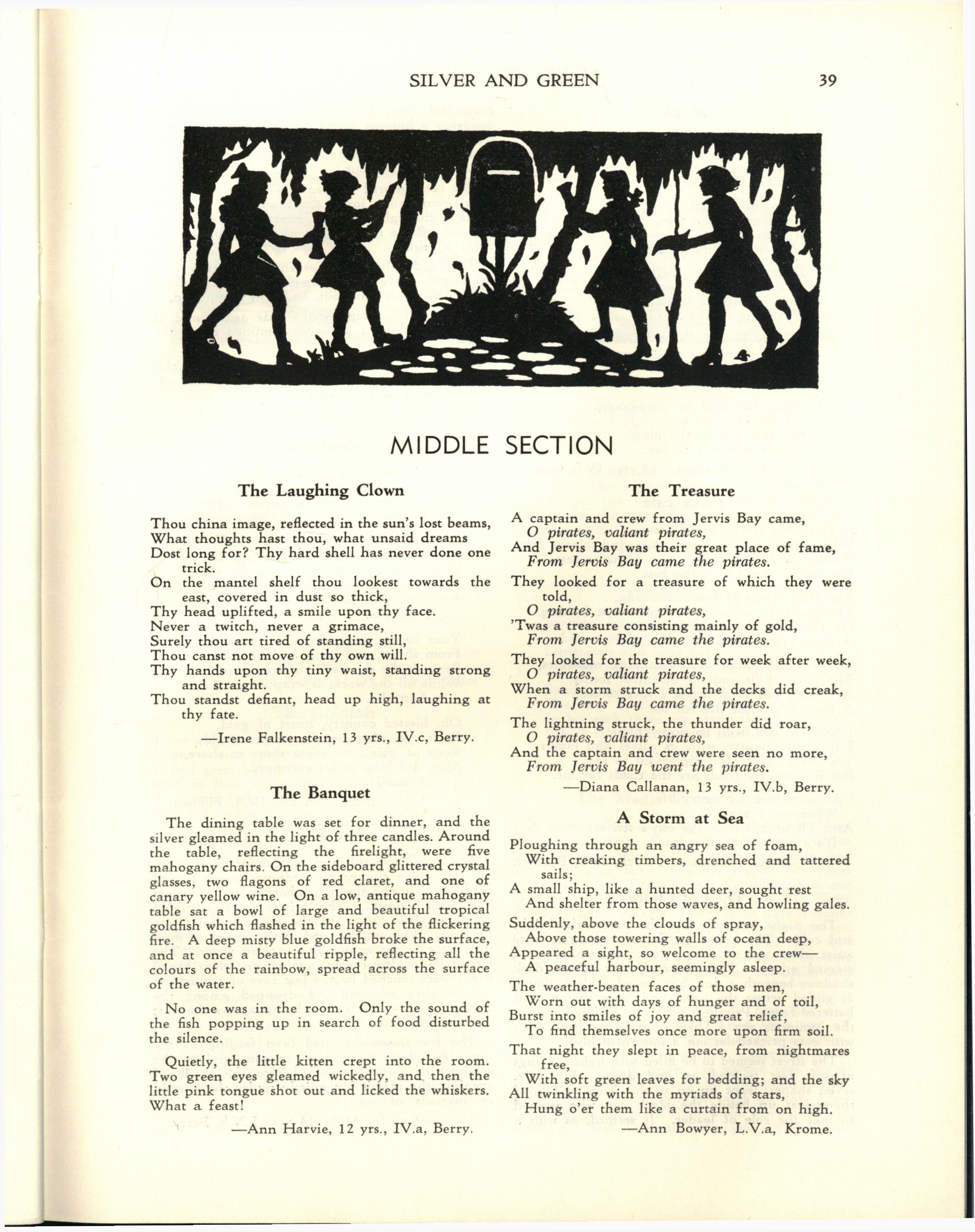
Thou china image, reflected in the sun's lost beams, What thoughts hast thou, what unsaid dreams Dost long for? Thy hard shell has never done one trick
On the mantel shelf thou lookest towards the east, covered in dust so thick, Thy head uplifted, a smile upon thy face Never a twitch, never a grimace, Surely thou art tired of standing still, Thou canst not move of thy own will. Thy hands upon thy tiny waist, standing strong and straight.
Thou standst defiant, head up high, laughing at thy fate
—Irene Falkenstein, 13 yrs., IV.e, Berry.
The dining table was set for dinner, and the silver gleamed in the light of three candles. Around the table, reflecting the firelight, were five mahogany chairs On the sideboard glittered crystal glasses, two flagons of red claret, and one of canary yellow wine. On a low, antique mahogany table sat a bowl of large and beautiful tropical goldfish which flashed in the light of the flickering fire. A deep misty blue goldfish broke the surface, and at once a beautiful ripple, reflecting all the colours of the rainbow, spread across the surface of the water
No one was in the room. Only the sound of the fish popping up in search of food disturbed the silence.
Quietly, the little kitten crept into the room Two green eyes gleamed wickedly, and then the little pink tongue shot out and licked the whiskers. What a feast!
—Ann Harvie, 12 yrs., IV.a, Berry
A captain and crew from Jervis Bay came, O pirates, valiant pirates, And Jervis Bay was their great place of fame, From Jervis Bay came the pirates.
They looked for a treasure of which they were told, O pirates, valiant pirates, 'Twas a treasure consisting mainly of gold, From Jervis Bay came the pirates.
They looked for the treasure for week after week, O pirates, valiant pirates, When a storm struck and the decks did creak, From Jervis Bay came the pirates.
The lightning struck, the thunder did roar, O pirates, valiant pirates, And the captain and crew were seen no more, From Jervis Bay went the pirates.
—Diana Callanan, 13 yrs., IV.b, Berry
Ploughing through an angry sea of foam, With creaking timbers, drenched and tattered sails;
A small ship, like a hunted deer, sought rest And shelter from those waves, and howling gales.
Suddenly, above the clouds of spray, Above those towering walls of ocean deep, Appeared a sight, so welcome to the crew— A peaceful harbour, seemingly asleep The weather-beaten faces of those men, Worn out with days of hunger and of toil, Burst into smiles of joy and great relief, To find themselves once more upon firm soil. That night they slept in peace, from nightmares free,
With soft green leaves for bedding; and the sky All twinkling with the myriads of stars, Hung o'er them like a curtain from on high.
—Ann Bowyer, L.V.a, Krome.
MagicOnce a little acorn Was lying on the ground; Now a long time after A big forest is found.
From an old grey twig, Hanging on a tree, Is a sweet white blossom There, for me to see
In a little oyster shell Was a piece of sand; Now a smooth, white pearl Is lying on my hand.
A dirty little bulb of brown Was planted a while ago; Now a golden daffodil Is waving to and fro.
Magic is found in story-books, Little children say; But you look at the magic In this world to-day.
—Anne Sterling, 13 yrs., IV.b, Cato.
A farm life is the life for me, Where nature rules, and the wind blows free: Where the lowing cattle come home to rest, For me a farm life is the best
The little Iambs so loudly bleating, The new-born calves their hearts fast beating On the land I want to be, A farm life is the life for me.
To hear the sound of the milking machines, The grassy hills and the beautiful scenes. A homely old farm house I love to see, A farm life is the life for me
I hate the city, with its noisy trams; I love the country, with its calves and lambs. The dirty streets are unpleasant to see, But the country roads are the roads for me
I'll always love a country life, Wherever I may be; And I'll always hate the city's strife: It's a country life for me •—Diana Thompson, 14 yrs., IV.a, Fitchett.
The night was still and the moonlight bright and cold The houses in the narrow street were quiet; there was not a movement, the whole world seemed asleep. Then suddenly out of the dark shadows beneath a dust bin moved a black shape. It glided across the street and leapt up on to a battered fence Primly it sat there, outlined against the luminous sky Then it lifted its head, and with ears pricked let out a mournful howl.
The street seemed to be filled with light rustlings as soft feet padded up and down Five, six, seven shapes, leapt up on to the fence and lined themselves up beside the black cat, who seemed to take the role of leader. It seemed, as with a
command from him, the cats stiffened. Then suddenly a hideous sound rent the pure, cold air. The cats were enjoying themselves, they sang loudly and with pure abandon. Windows shot up and heads were poked out.
The cats ignored the requests of the heads and sang even more loudly and sweetly. A boot hurtled through the air, nearly knocking one soprano off the fence. Groans and moans echoed from all sides
Then suddenly, without warning, a window shot up directly above the singing choir, a head bristling with curl papers came out, and with a muttered, "Cats, hah!" disappeared inside again, and in a minute a dish of water was emptied on to the singers
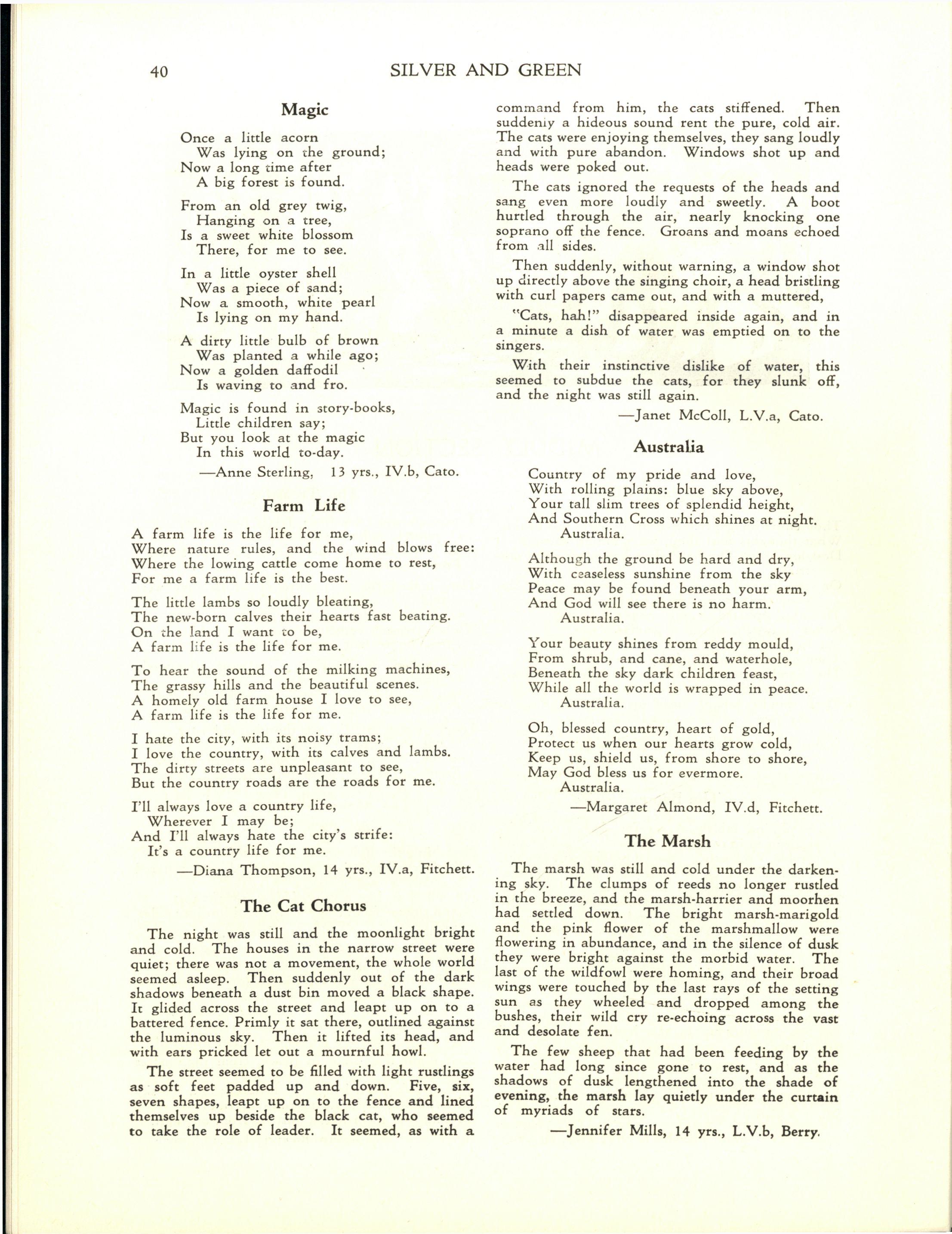
With their instinctive dislike of water, this seemed to subdue the cats, for they slunk off, and the night was still again.
—Janet McColl, L.V.a, Cato.
Country of my pride and love, With rolling plains: blue sky above, Your tall slim trees of splendid height, And Southern Cross which shines at night Australia
Although the ground be hard and dry, With ceaseless sunshine from the sky Peace may be found beneath your arm, And God will see there is no harm. Australia.
Your beauty shines from reddy mould, From shrub, and cane, and waterhole, Beneath the sky dark children feast, While all the world is wrapped in peace Australia
Oh, blessed country, heart of gold, Protect us when our hearts grow cold, Keep us, shield us, from shore to shore, May God bless us for evermore. Australia.
—MargaretAlmond, IV.d, Fitchett.
The marsh was still and cold under the darken ing sky. The clumps of reeds no longer rustled in the breeze, and the marsh-harrier and moorhen had settled down. The bright marsh-marigold and the pink flower of the marshmallow were flowering in abundance, and in the silence of dusk they were bright against the morbid water The last of the wildfowl were homing, and their broad wings were touched by the last rays of the setting sun as they wheeled and dropped among the bushes, their wild cry re-echoing across the vast and desolate fen
The few sheep that had been feeding by the water had long since gone to rest, and as the shadows of dusk lengthened into the shade of evening, the marsh lay quietly under the curtain of myriads of stars
—Jennifer Mills, 14 yrs., L.V.b, Berry.
Fluffy little golden bells Dance gently in the breeze, Which whispers, oh, so softly, Through the wattle trees.
A tiny creek winds slowly O'er its rocky bed.
The wattle bends to gaze at The reflection of her head.
The long green fronds of maiden-hair Swish softly on the brink, And a platypus so quietly Into the water sinks.
—Valerie Monk, 12 yrs., L.IV.d, Cato.
I saw a little fish in a big glass bowl, It was swimming around and it looked like gold, It had great big fins and a funny little head, And its little friend the water snail was on the sandy bed.
And as I looked into the bowl I saw to my surprise, The little fish looked up at me and winked its goggly eyes
—Carol Cox, 12 yrs., L.IV.c, Cato.
Amanda Ant was a nurse ant. She was busy all day long, attending to the wants of baby ants in the nursery, looking after grubs, and airing the sun-room, where the babies crawled about in the sun
There were seven other nurses, all very busy. Among the babies Amanda looked after was a bad ant called Ollymando When Amanda put him to bed, he kicked off his blankets and tipped his mug of aphis-milk on the mat. At five o'clock every morning, he followed the milkmen ants down to the aphis pasture, and kicked over the buckets of aphis-milk. Amanda spanked Ollymando for this and rang up her friend, Anetta Ant, who was rather magical
Anetta immediately started to mix a pot of ant-brew That night Amanda went to the nursery to put out the lights, and when she came to Olly's bed she tipped the brew over him, and in the morning he was a bright green aphis.
—Judith Wells, 11 yrs., 3.b, Berry.
In every little tiny bed Lies a sleepy golden head, Little girls and little boys, Dreaming of the next day's joys
Santa comes this cold old night, The snow is crisp and cold and white In his sack there are many things Which the children have asked him to bring.
—Sue Applegate, IH.b, Krome.
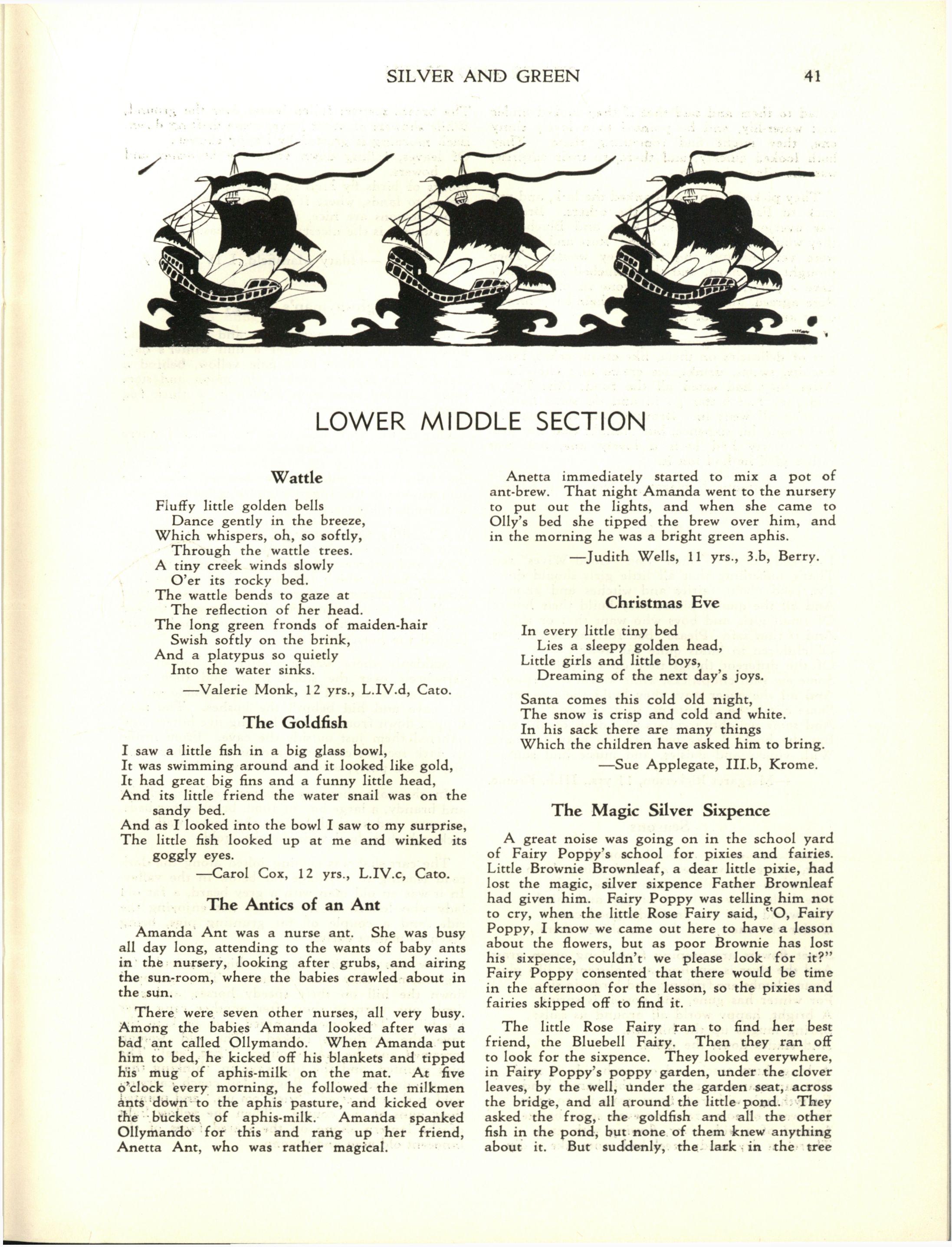
A great noise was going on in the school yard of Fairy Poppy's school for pixies and fairies. Little Brownie Brownleaf, a dear little pixie, had lost the magic, silver sixpence Father Brownleaf had given him. Fairy Poppy was telling him not to cry, when the little Rose Fairy said, "O, Fairy Poppy, I know we came out here to have a lesson about the flowers, but as poor Brownie has lost his sixpence, couldn't we please look for it?" Fairy Poppy consented that there would be time in the afternoon for the lesson, so the pixies and fairies skipped off to find it.
The little Rose Fairy ran to find her best friend, the Bluebell Fairy. Then they ran off to look for the sixpence. They looked everywhere, in Fairy Poppy's poppy garden, under the clover leaves, by the well, under the garden seat, across the bridge, and all around the little pond. They asked the frog, the goldfish and all the other fish in the pond, but none of them knew anything about it. But suddenly, the lark in the tree
called to them and said that if they looked under that water-lily, and he pointed to a lovely shiny one, they might find something there. They both looked quickly, and there, to their surprise, was the silver sixpence
They picked it up and thanked the lark, and ran back to Fairy Poppy and the others. Brownie was overjoyed, and asked Rose and Bluebell if they would like to make a wish. Rose and Bluebell were very happy, and said they would They thought very hard, and then Bluebell said, "Let's have a party, and invite everyone in the school." Rose agreed, and they both put their baby fingers on it and wished for the party
Up from the ground sprang toadstools with lots of delicacies on them, like cream cakes, fancy biscuits, sweets, drinks, ice cream and chocolates After they had eaten all the food, Miss Poppy said they had better go in and do some lessons, so they all went in. Brownie was very glad he had found his sixpence, but thought that the wish for a party had been a lovely one, and was rather glad he had lost it.
—Susanne Applegate, 11 yrs., Ill.b, KromeI've read "Little Women" and "Good Wives" too, That's something that all little girls should do.
I've read about fairies and witches and gnomes, And all the quaint places they build their homes, Of small girls and boys who want that or this, And if they said "Please" bad fortune they'd miss. Of children in lands quite far away, Of the different things they do each day
Some eat with chopsticks, while we eat with spoons, And all the queer ways they build their rooms.
Some climb the mountains, so grand and tall, And some naughty toddlers who draw on the wall But the books I like best are the beautiful ones, With violets and daisies, and music and suns.
—MargaretRicketson, 11 yrs., Ill.b, Krome
Winter has come, and all around Soft, white snowflakes come drifting down, And when they fall, and cover the earth, Like little snow maidens of joy and mirth The world is at rest in God's good care, Under the snow, till the sun shines there.
Sweet flowers are peeping from long green grass, And the river is rippling, and glistening like glass Young lambs are frisking, and birds do sing, For winter has gone, and now it is spring. A bright, happy world all around us sails; Spring laughs up the hilltops, And smiles down the dales.
A long dusty track and on each side is sand, The sun spares no mercy on this barren land Everything's withered, from grass up to trees, For want of some rain, or even some breeze. Instead of a wide river, flowing with grip, There's a dry sandy creek-bed more like a dip
The breeze scatters fallen leaves over the ground, While showers of other leaves come drifting down. Each morning is greeted by happy showers Of leaves, falling down from the branches and bowers
Flocks of birds fly high in the sky, Going to lands, where it's hot and dry.
Other seasons are nice, for various reasons, But autumn is the nicest of all the seasons
—Hilary Mansfield, L.IV.b, Berry.
It was a dark, foggy night, and the sun had gone to bed, very red after a dull winter's day, when he had shone in a pale yellow, behind a cloud. The sky got darker, the moon and stars came out, but were soon hidden by a thick fog which fell and covered the quiet world.
Out in the dark hills, close to the road, there was one spot that the moon's beams always missed. A cave, hidden by the blackness of the fold in the hills. But much more exciting than the solitariness of the foggy night was what or who was inside the cave.
A stealthy figure emerged. He was wearing a pair of riding breeches, a dark green coat, a cloak, mask, and a three-cornered hat. He crept towards a steep bank, which led to the top of the hill, where five horses were cropping the grass as they stood, tied to a fallen tree. The fog grew thicker and the man could just be distinguished as he bridled the horses
Suddenly there was a clatter of hooves and cartwheels over the stony road, and then four more figures hurried as quietly as possible out of the cave and hid behind the bushes The man slipped down from the hill, leading five horses, and tethered them just outside the cave. From inside its dark recesses came the groans of another man, one of the party, who had been wounded
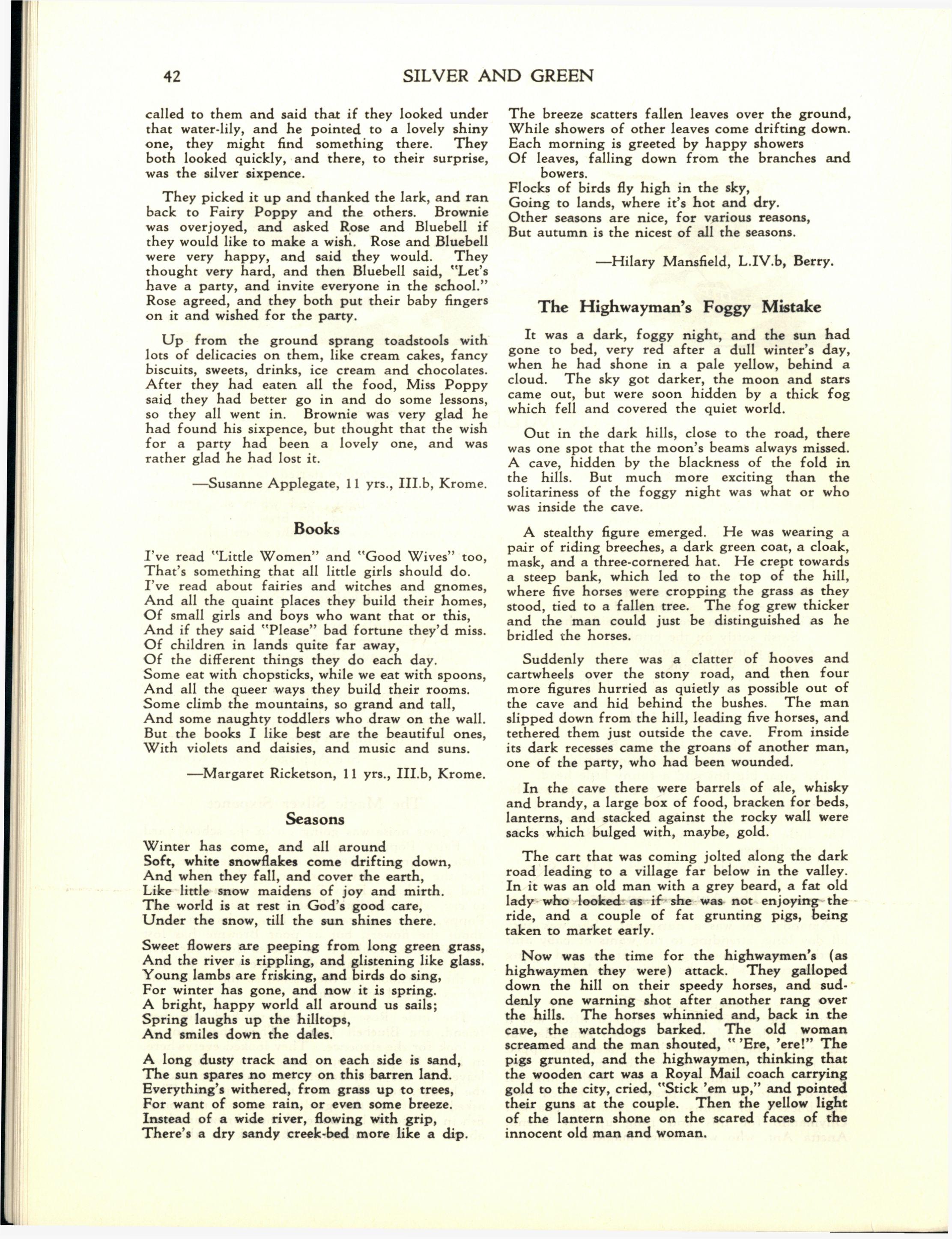
In the cave there were barrels of ale, whisky and brandy, a large box of food, bracken for beds, lanterns, and stacked against the rocky wall were sacks which bulged with, maybe, gold.
The cart that was coming jolted along the dark road leading to a village far below in the valley In it was an old man with a grey beard, a fat old lady who looked as if she was not enjoying the ride, and a couple of fat grunting pigs, being taken to market early
Now was the time for the highwaymen's (as highwaymen they were) attack. They galloped down the hill on their speedy horses, and sud denly one warning shot after another rang over the hills. The horses whinnied and, back in the cave, the watchdogs barked. The old woman screamed and the man shouted, " 'Ere, 'ere!" The pigs grunted, and the highwaymen, thinking that the wooden cart was a Royal Mail coach carrying gold to the city, cried, "Stick 'em up," and pointed their guns at the couple Then the yellow light of the lantern shone on the scared faces of the innocent old man and woman.
Soon it was the highwaymen's turn to look frightened, as they found, instead of a jewel-laden mail coach, a cart taking pigs to market So, with no more treasure and only a fright, they galloped back to the cave in the fog.
—Judith Wells, 11 yrs., Ill.b, Berry
Curled up in their little beds, Lie four sleepy, curly heads, Santa Claus will come to-night, And leave some toys, red, green, and bright
The children hung their socks at eight, They've been allowed to stay up late, Santa Claus and his reindeer gay, Will come and go before the day. In the morning when shines the sun, At the strike of the clock begins the fun. They find their toys at break of dawn, And play with them all Christmas morn
Mother is sorting out fruits nice and ripe, While father is puffing away at his pipe; The children's surprise in a corner wee Is a glistening, dainty Christmas tree.
—Ann Coates, 11 yrs., Ill.b, Fitchett.
(The first verse by C. Morley.)
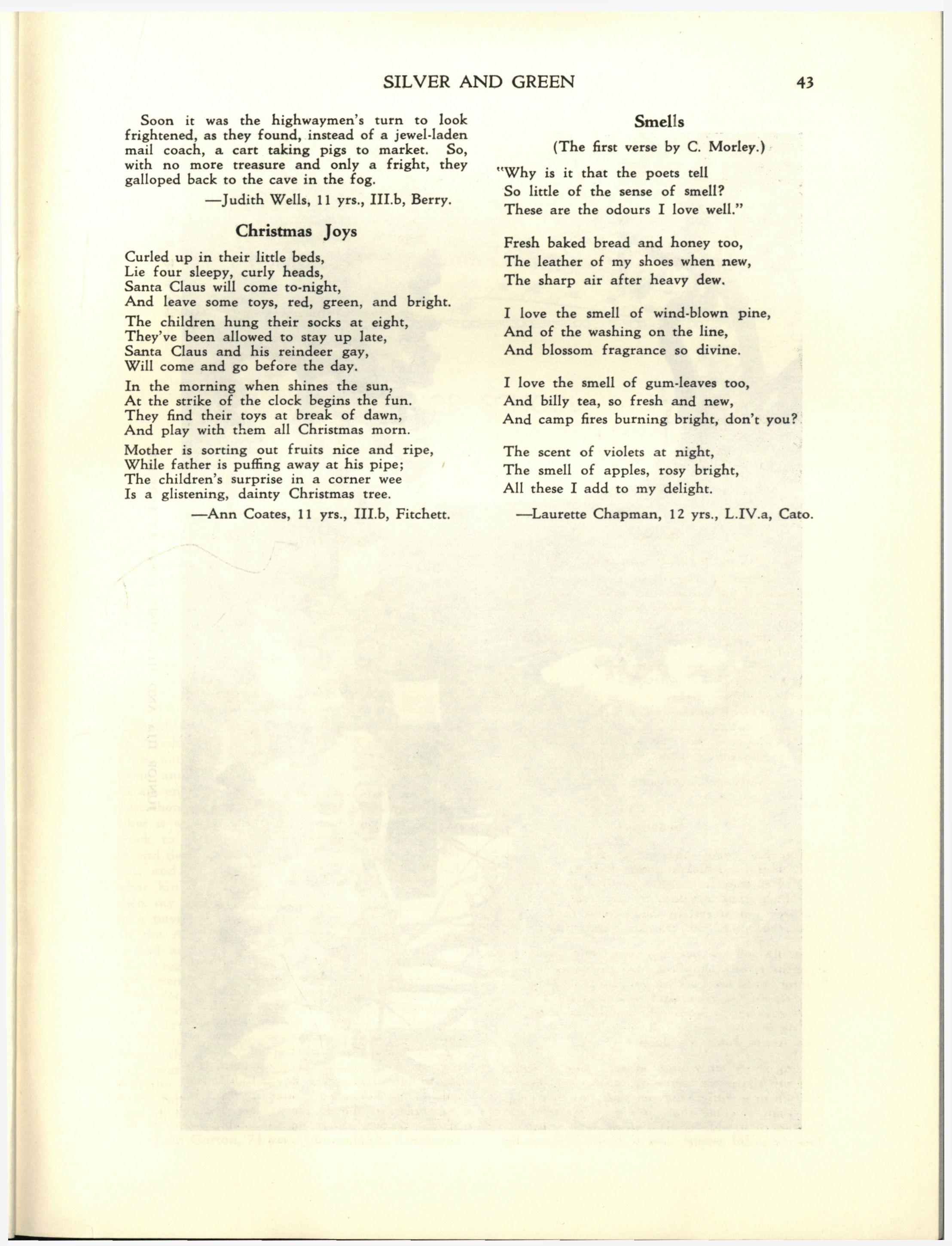
"Why is it that the poets tell So little of the sense of smell? These are the odours I love well."
Fresh baked bread and honey too, The leather of my shoes when new, The sharp air after heavy dew.
I love the smell of wind-blown pine, And of the washing on the line, And blossom fragrance so divine
I love the smell of gum-leaves too, And billy tea, so fresh and new, And camp fires burning bright, don't you?
The scent of violets at night, The smell of apples, rosy bright, All these I add to my delight.
—Laurette Chapman, 12 yrs., L.IV.a, Cato.
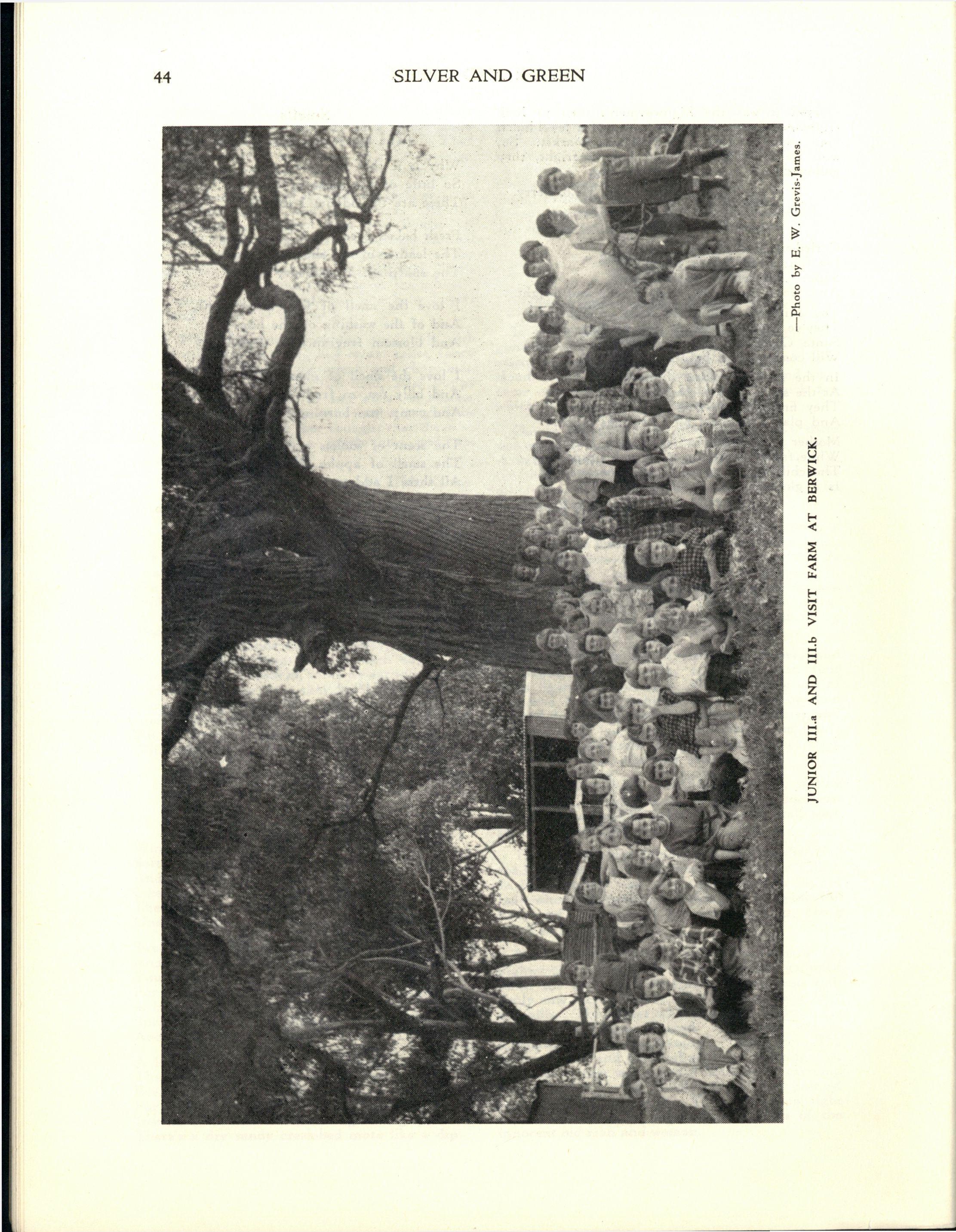
I had a little dog, And his name was Ben. He rounded up the sheep, And put them in a pen
He was very kind and gentle, And did what he was told He gathered up the little lambs, And put them in the fold.
—Jennifer McBean, 8 yrs., Junior III.a, Fitchett.
Moo! Moo! My name is Roland Pearl I am an Ayrshire, and I live at Narre Warren. When I was out in the field eating my lunch, my master came and thumped me on my back and said, " I am entering you in the Show." "Moo!" I said. Just then a truck was driven in and I wondered what it was for. Then I remembered it was the truck to take me to the Show I was helped in and tied up and after a little while I was helped out, and we arrived at the Show. I wondered what kind of pavilion I would have, and just then my master led me along, and there I was in a pavilion with lots of other cows too Then all the Ayrshires were taken to a big ring and walked around The judge was picking out the best three. I was first, then Gert and Daisy, my two friends. The judge said I had won first prize, and how everyone cheered. My master was very pleased. Then I went back to the pavilion. Every day people came to look at me, and every day I was very happy as I walked with my master around the arena At last came time to go home, and I was very excited. I had made lots of friends with the other cows, but my baby calf was home at the farm, and would want to see me again and hear all about the Royal Show.
—Joan Garton, 7i yrs., Junior Ill.b, Krome.
I have a nice white pussy cat, Who likes to sit on our sunroom mat. He likes to sleep beside the fire; Of stroking he will never tire
One day he was sitting on my knee, He stuck in his claws and frightened me, He fell in the fire and burnt his tail.
Poor pussy let out a great loud wail. He's very well now, I'm glad to say, And that is all I can tell you to-day.
—Rosemary Allen, 9 yrs., Junior IV.b, Cato.
Spring is here, Birds are near, I can hear them singing. Grass is green, Lambs are seen, All these the spring is bringing —Andrea Goldsmith, 8 yrs., Junior III.a, Krome
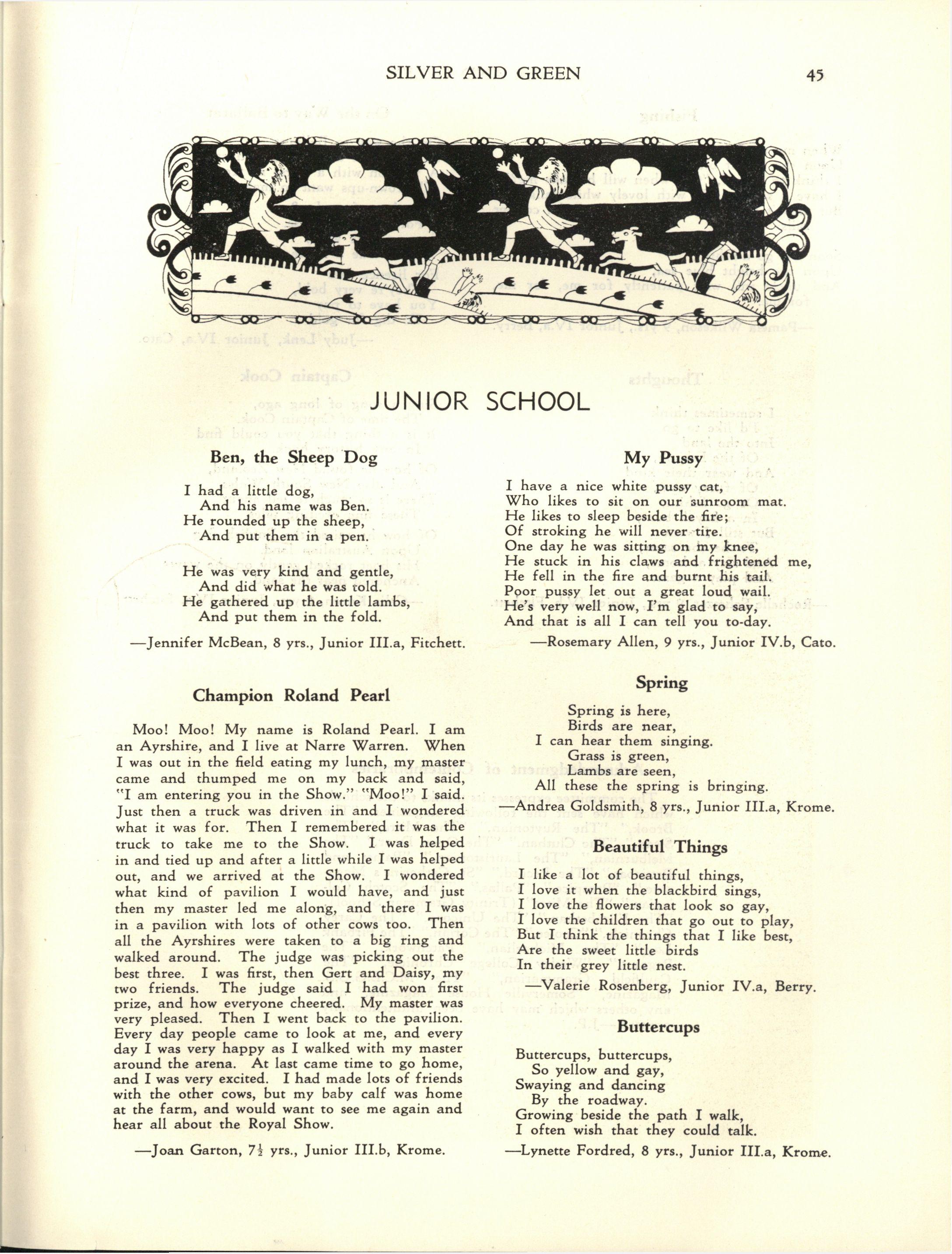
I like a lot of beautiful things, I love it when the blackbird sings, I love the flowers that look so gay, I love the children that go out to play, But I think the things that I like best, Are the sweet little birds In their grey little nest
—Valerie Rosenberg, Junior IV.a, Berry
Buttercups, buttercups, So yellow and gay, Swaying and dancing By the roadway Growing beside the path I walk, I often wish that they could talk. —Lynette Fordred, 8 yrs., Junior Ill.a, Krome
When my uncle goes a-fishing Upon the bright blue sea, I think to myself, "Oh, when will he take me?" I have a sailing ship with lovely white sails, But uncle's got a white one with beautiful copper rails
Soon I'll go a-fishing Upon the bright blue sea, And uncle will wait patiently for me, for me, for me.
—Pamela Wilkeson, 9 yrs., Junior IV.a, Berry.
I sometimes think I'd like to go Into the land
Of the Eskimo, And wear their kind Of furry coat, Or go fishing In a kayak boat; But still I want To be the same, And stay at home, And play a game
—Rochelle Schetzer, 9 yrs., Junior IV.b, Fitchett.
On the way to Ballarat, Some people and a dog and cat, A waggon with a horse in front, All grown-ups want to make the hunt.
They hunt for what? For gold, of course Some people walk, Some ride a horse.
For licence fees They're very bold, You have to pay To dig for gold
—Judy Lenk, Junior IV.a, Cato
Sing a song of long ago, The time of Captain Cook It is a thing that you could find In any history book. Of how he found New Zealand, And also New South Wales There is so much to tell about These fine exciting tales.
Of how he raised the English flag Upon Australian land. His boat rocked gently on the waves, Anchored near the sand.
—Celia Kneen, 9 yrs., Junior IV.a, Fitchett.
The committee expresses its thanks to the schools which have sent the following magazines: "The Brook," "The Ruytonian," "The Mitre," "The Swan," "The Ciuthan," "The Open Door," "The Melburnian," "The Lauristonian," "Palate and Petticoat," "The Record," "St. Catherine's Maga zine," "Prospice," "Pallas," "The Scotch Col legian," "The Mitre" (Trinity Grammar School), "The Elizabethan," "The Unicorn," "The Carey Chronicle," "Coo-ee," "The Corian," "The Firbank Log," "The Michaelian," "Patchwork," "The Pegasus," "Wesley College Chronicle," "The Caulfield Grammarian," "The M.C.E.G.G.S. Magazine," "Somerville House Magazine," and any others which may have been unintentionally omitted.—J.P
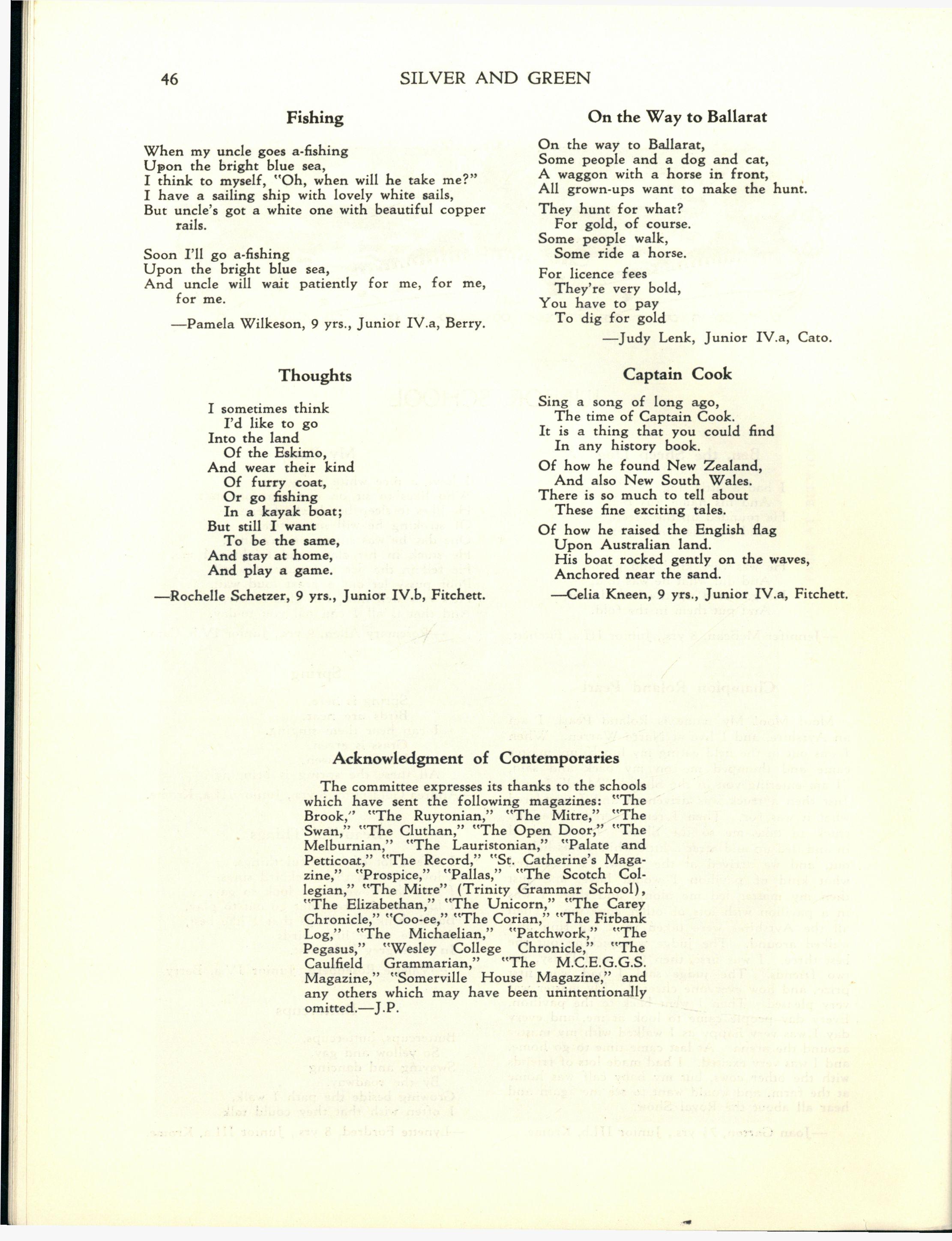
Spectator Publishing Co., Printers, 134a Little Collins Street, Melbourne
